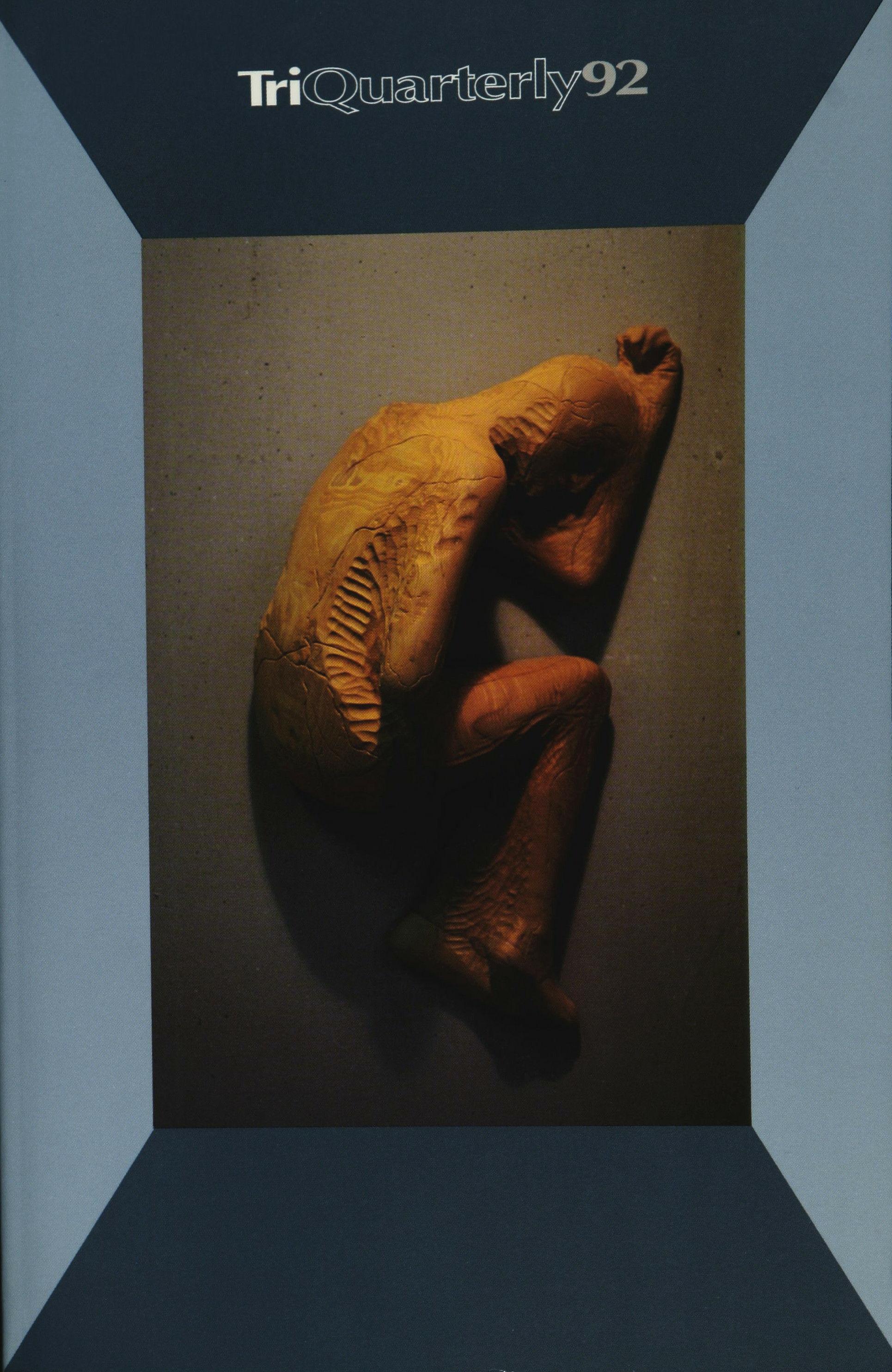
Publication of TriQuarterly is made possible in part by the donors of gifts and grants to the magazine. For their recent and continuing support, we are very pleased to thank the Illinois Arts Council, the Lannan Foundation, the John D. and Catherine T. MacArthur Foundation, the National Endowment for the Arts, the Sara Lee Foundation, the Wendling Foundation, and individual donors. Major new marketing initiatives at TriQuarterly have been made possible by the Lila Wallace Reader's Digest Literary Publishers Marketing Development Program, funded through a grant to the Council of Literary Magazines and Presses.

NOTE: TriQuarterly welcomes financial support in the form of donations, bequests and planned gifts. Please write to Reginald Gibbons, editor. Please see the last page and the inside back cover for names of individual donors to TriQuarterly.
Please sign me up for:
o a two-year subscription for $36.
o a one-year subscription for $20. Foreign subscribers please add $5 per year.
Please begin my subscription with issue#

Please
SUBSCRIBE TO TRIQUARTERLY!
o a life
o $ enclosed. o This is
Name Address Or call us toll-free at 800-832-3615 to charge it! BI92
TO TRIQUARTERLY!
subscription for $500.
a renewal.
SUBSCRIBE
for:
sign me up
two-year subscription for $36.
one-year subscription for $20.
subscribers please add $5 per year.
begin my subscription with issue# o a life subscription for $500. 0$, enclosed. o This is a renewal. Name Address Or call us toll-free at 800-832-3615 to charge it! BI92 GIVE TRIQUARTERLY! Buy your first TriQuarterly gift subscription for $20, and each additional gift subscription costs only $17!! 1st gift subscription ($20) Name Address Gift-card message Add $5/year forforeign subscriptions. o $ enclosed. Name Address 2nd gift subscription ($17) Name Address Gift-card message BG92
o a
o a
Foreign
Please
TriC02llilal[rQce?[f�y
NORTHWESTERN UNIVERSITY
2020 RIDGE AVENUE
EVANSTON, ILLINOIS 60208-4302

TriC02llilal[f'Q®[f�y
NORTHWESTERN UNIVERSITY
2020 RIDGE AVENUE
EVANSTON, ILLINOIS 60208-4302
TriC02llilal[f'Qce?[f�y
NORTHWESTERN UNIVERSITY
2020 RIDGE AVENUE
EVANSTON, ILLINOIS 60208-4302

1995 BOOKS AND BACKLIST

COMING IN SPRING 1995
WILLIAM GOYEN
In a Farther Country
Subtitled 1/ A Romance," In a Farther Country is an intense performance, both lyrical and colloquial, shaped as a series of meditative narratives. Set in a Spanish arts factory in New York City, the novel grows around the conflict of its main character's mixed ancestry. Marietta McGee-Chavez and her friends and acquaintances populate a world in which they experience dreams and reality, sexual desire and loneliness, triumph and defeat. This is the first paperback edition of Goyen's small neglected masterpiece.
WILLIAM GOYEN (1915-83) was a unique literary inventor whose work has been more widely appreciated abroad than in America. TriQuarterly Books and Northwestern University Press are reissuing his out-of-print work and recently published his lost novel, Half a Look ofCain, for the first time.
ISBN 0-8101-5039-5 PR I $13.95
CYRUS COLTER
A Chocolate Soldier
Cyrus Colter's fourth novel is a cautionary tale of revolutionary dreams, bitter realities, and the persistence of both hope and falsehood. A kind of historical fable about the possibilities and perils of black revolution within and against twentieth-century white America, this novel is brilliantly structured and voiced. It is Colter's greatest and crowning work, and no reader will forget the tale it tells.
A distinguished attorney and public servant, CYRUS COLTER took up writing in midlife and, after retiring from the law, devoted himself not only to his art but also to teaching. TriQuarterly Books and Northwestern University Press have reprinted his earlied novel, The Hippodrome. His other works include The Rivers ofEros, Night Studies and The Amoralist.
ISBN 0-8101-5038-7 PR I $14.95
DIANE GLANCY
Monkey Secret
This thoroughly original volume collects three short stories and a powerful novella by an award-winning Cherokee-German-English poet and prose writer. Diane Glancy's tales of Native American life explore that essential American territory, the border-between:
between past and present, between native and immigrant cultures, between self and society.
DIANE GLANCY'S collection of essays and poems, Claiming Breath, won the first North American Indian Prose Award, her poetry collection Iron Woman won the Capricorn Prize, and her short stories Trigger Dance won the Nilon Fiction Award. She teaches at Macalester College.
ISBN 0-8101-5016-6 CL I $19.95
THEODORE WEISS
Selected Poems
This new selection of poems by one of the most distinguished and original poets of a generation recovers work that is immensely contemporary and at the same time reaches back to the roots of this accomplished generation of American poets. Weiss's distinctive, idiosyncratic poems, noted for their syntactic compression and signature linking of intimate experience and historical incident, are a major poetic accomplishment.
THEODORE WEISS was born in 1916. Since 1943 he has edited, with Renee Weiss, the Quarterly Review ofLiterature, perhaps the single most distinguished American literary magazine of the century. The Weisses are currently at work on a collaborative volume of poems.
ISBN 0-8101-5037-9 CL I $49.95
ADRIAN C. LOUIS Vortex ofIndian Fevers

ISBN 0-8101-5040-9 PR I $15.95
Wordplay, metaphoric brilliance, technical virtuosity and a scathingly sardonic critique of self and society fill this new collection by Adrian C. Louis. He celebrates life amid hardship and self-destructiveness, and consecrates a part of the past as a source of ideals for the present. N. Scott Momaday has characterized Louis's work as "acceptance and defiance brought into delicate balance." Vortex ofIndian Fevers is fueled by both anger and irony; the result is psychologically and culturally complex, as Louis analyzes, excoriates, jests, prays and mourns.
ADRIAN c. LOUIS is an enrolled member of the Lovelock Paiute Indian tribe. Born and raised in Nevada and educated at Brown University, he has worked as a journalist, as the editor of four tribal newspapers, and as an English teacher at Oglala Lakota College on the Pine Ridge Reservation in South Dakota. His collection Fire Water World won the book award of the Poetry Center of San Francisco State University. Vortex ofIndian Fevers is his seventh book of poems.
ISBN 0-8101-5017-4 CL / $29.95
ISBN 0-8101-5042-5 PR / $11.95
TRUDYLE
Private Correspondences

Wi,lner oftile 1994 Willial11 Goyen Prizefor Fiction
'Ihis moral thunderclap of a novel portrays a teenage girl who, attacked by violent evil, chooses not to flee it but to face it, and then to embrace it. In prose that swings between lyrical moments of illumination and gritty sexual insight, Lewis explores the dark heart of a miso ,t culture.
Letois's shatteringstzldy ofsexual violence and indioidual uulnerabilitu is both timelu and unioersallu resonant. PUBLISHERS WEEKLY
5 x 8 / 196 pages $19.95, cloth (0-8101-5033-6)
CYRUS COLTER
TIle Hippodrome
Set in a Chicago seething with physical and psychological violence, TIle Hippodrome is an examination of power and exploitation and their entanglement with sexuality. -
III the tradition ofhisfictional ancestors, Dostoeosku and Faulkner. [Colter] has produced a uiork tohidi usee the uiorld of(?'l)eryday reality ill a manner beuond the scope of journalism or sociologu as all entree to the soul.
-James Park Sloan CHICAGO SUN-TIMES
51/2 x 81/2/21-1 pilges $13.95, paper (0-8101-5036-0)
TINO VILLANUEVA
Chronicle ofMy Worst Years I Crtmica de mis aiios peores TRANSLATED AND WITH AN AFTERWORD BY JAMES HOGGARD
In this bilingual edition, an established Chicano poet describes with passion and elegance some of the American realities that remain absent from mainstream poetry. Villanueva voices complex and compelling historical, literary and cultural questions as urgent personal utterances.
Tino Villanueva won the 1994 American Book Award for his recent book, Scenefrom theMovie GIANT.
51/8 x 7 3/4/96 pages
$29.95, cloth (0-8101-5009-3)
$10.95, paper (0-8101-5034-4)
MARC J. STRAUS One Word
This first collection of poems by a physician combines poetic craft, medical expertise and a keen sense of humanvulnerability to pain and suffering in an uncommon portrayal of the complex and often troubled relations between physician and patient. With directness and power, Straus confronts matters rarely encountered in poetry. These poems are a fine addition to the scant body of imaginative work that speaks with authority from within the medical world.

51/8 x 7 3/4/80 pages
$29.95, cloth (0-8101-5010-7)
$10.95, paper (0-8101-5035-2)
tlUSIlIlO AllII "Ilil AI .urnwou If IUts IIOG-GAlO
Tino Villanueva
ILLIA GOYEN
Arcadio
Completed while he was dying, William Goyen's Arcadia is one of the most affecting and imaginative farewells to life ever written. Arcadio, whose voice is inimitably Goyenesque, is a creature from beyond the normal walks of life.
Half man, half woman, raised in a whorehouse and for years the veteran exhibitionist of an itinerant circus sideshow, he has escaped from the show and has been wandering in a quest for his lost family. Speaking intimately and secretly to the reader, he tells the � bizarre and fantastic tale of his life.
148 pages $12.95, paper (0-8101-5006-9)
ILLIA GOYEN
Hal a Look 0 Cain: A Fantastical Narrative
Chris, whose leg is injured, and his lover Stella, with whom he lives in a ruined, abandoned house; Chris's male nurse; Marvello, the circus aerialist; a lighthouse keeper; a flagpole-sitter in small-town America these are the creatures of William Goyen's visionary fable of love, lust and loneliness. Because of its central focus on the erotic and its unusual novelistic form, Hal] a Look (JfCain was rejected in the 1950s by Coyen's publisher. The first publication of this novel inaugurates a TriQuarterly Books/Northwestern Universitv Press plan to publish and reprint all of Coyen's out-of-print work.
[Arcadio] tnrtuallupulses uiith life; it is both audacious and toise; a timelessfable that manages to be boltily contemporaru as uiell.
-Joyce Carol Oates

Gouen's paramount concern is uiith. the i{lays ill tohich people connect, C0111111111le and create, uiith the 1{lays theu hurt and heal one another and uiith the capacity of eueruone to do good or eoil [Half a Look of Cain] is the uiork of a gifted, intelligent artist.
-NEW YORK TIMES BOOK REVIEW
220 pages $22.50, cloth (O-RIOl-5031-X)
New Writingfrom Mexico
Edited by Reginald Gibbons
This large anthology is a carefully chosen and scrupulously translated sampling of the most vigorous and exciting new short fiction, poetry and essays being written in Mexico today.
Gibbons has been guided by a healthy eclecticism and a sense offreshness and authenticity ofconception and execution.
-HARVARD REVIEW
a feast ofreadingenjoyment. Gibbons's collection gives us people worth caring about and writing not afraid to be at once serious andjoyful.
-SMALL PRESS
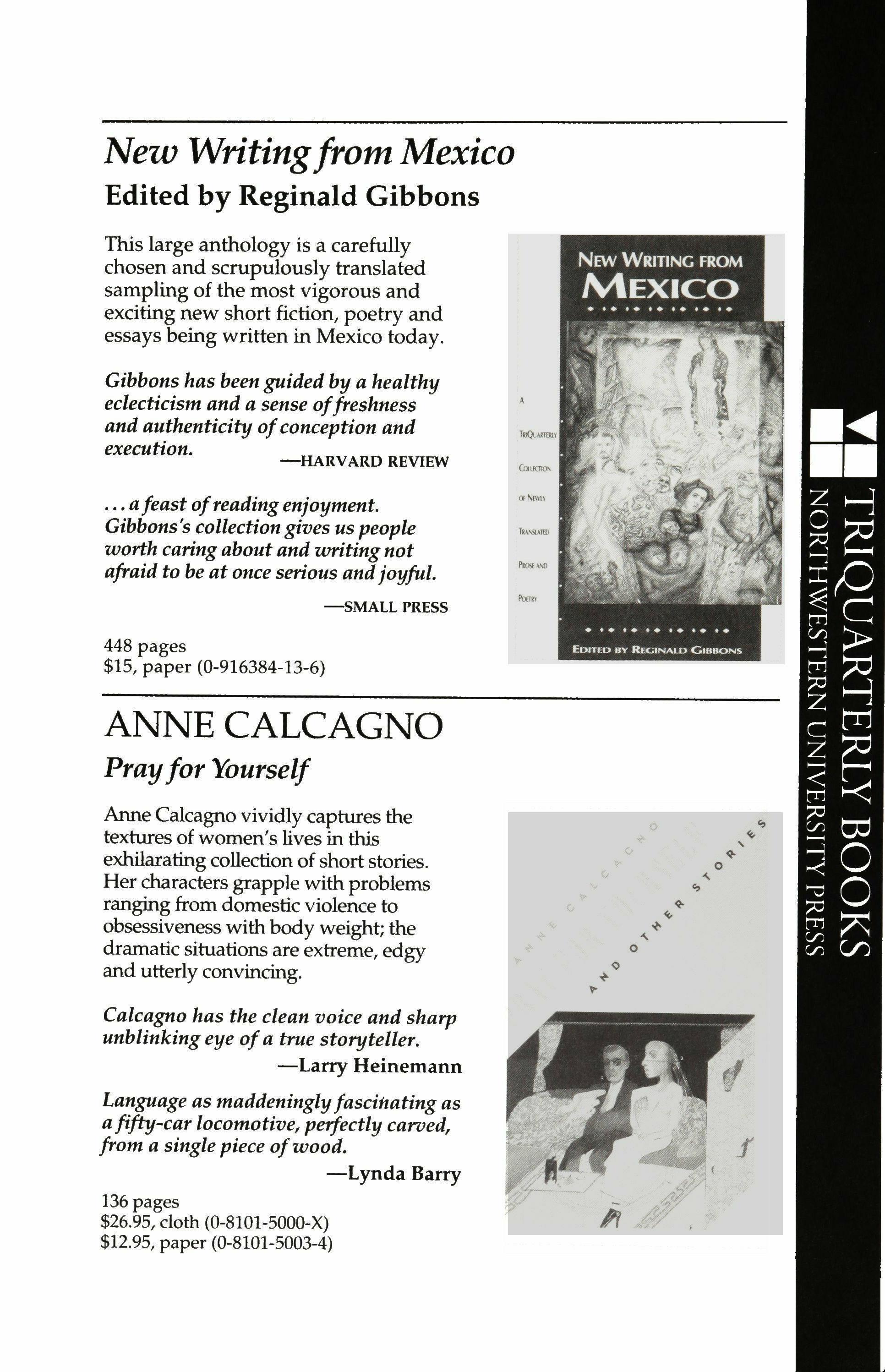
448 pages
$15, paper (0-916384-13-6)
ANNE CALCAGNO
Prayfor Yourself
Anne Calcagno vividly captures the textures of women's lives in this exhilarating collection of short stories. Her characters grapple with problems ranging from domestic violence to obsessiveness with body weight; the dramatic situations are extreme, edgy and utterly convincing.
Calcagno has the clean voice and sharp unblinking eye of a true storyteller.
-Larry Heinemann
Language as maddeninglyfascinating as a fifty-car locomotive, perfectly carved, from a single piece of wood.
136 pages
$26.95, cloth (0-8101-5000-X)
-Lynda Barry
$12.95, paper (0-8101-5003-4)
CAROL FROST
Pure

For all poetry collections.
-LIBRARY JOURNAL
PETER READING
A fierce, passionate series of meditations on experience and consciousness, morals and customs, and on the natural world that surrounds and shapes human life. Frost's poems bear the stamp of a thoroughly original artistic vision and style-they are discursive yet filled with concrete images; they inquire into moral issues (responsibility, pleasure, guilt, jealousy) without moralizing; they catch the echoes of western myths in domestic and quotidian events; they sharply diagnose relations between the sexes.
64 pages
$26.95, cloth (0-8101-5029-8)
$10.95, paper (0-8101-5004-2)
Ukulele Music • Perduta Gente
IThis double volume of poems is the first U.S. publication of an important English poet. "There is nothing safe about Peter Reading's work," one reviewer has written, and a storm of letters to the London Times and the Times Literary Supplement, attacking and defending Reading's work, has made him the most controversial English poet of the age. Rarely has any poet found a way to address the most appalling and dispiriting aspects of life with such astonishing artistic virtuosity, bitter humor and disconcerting honesty.
112 pages
$26.95, cloth (0-8101-5030-1)
$11.95, paper (0-8101-5005-0)
[O"o.-,o;::tedtn"".tw'!' r...oJ,.j�cn:I'n rln
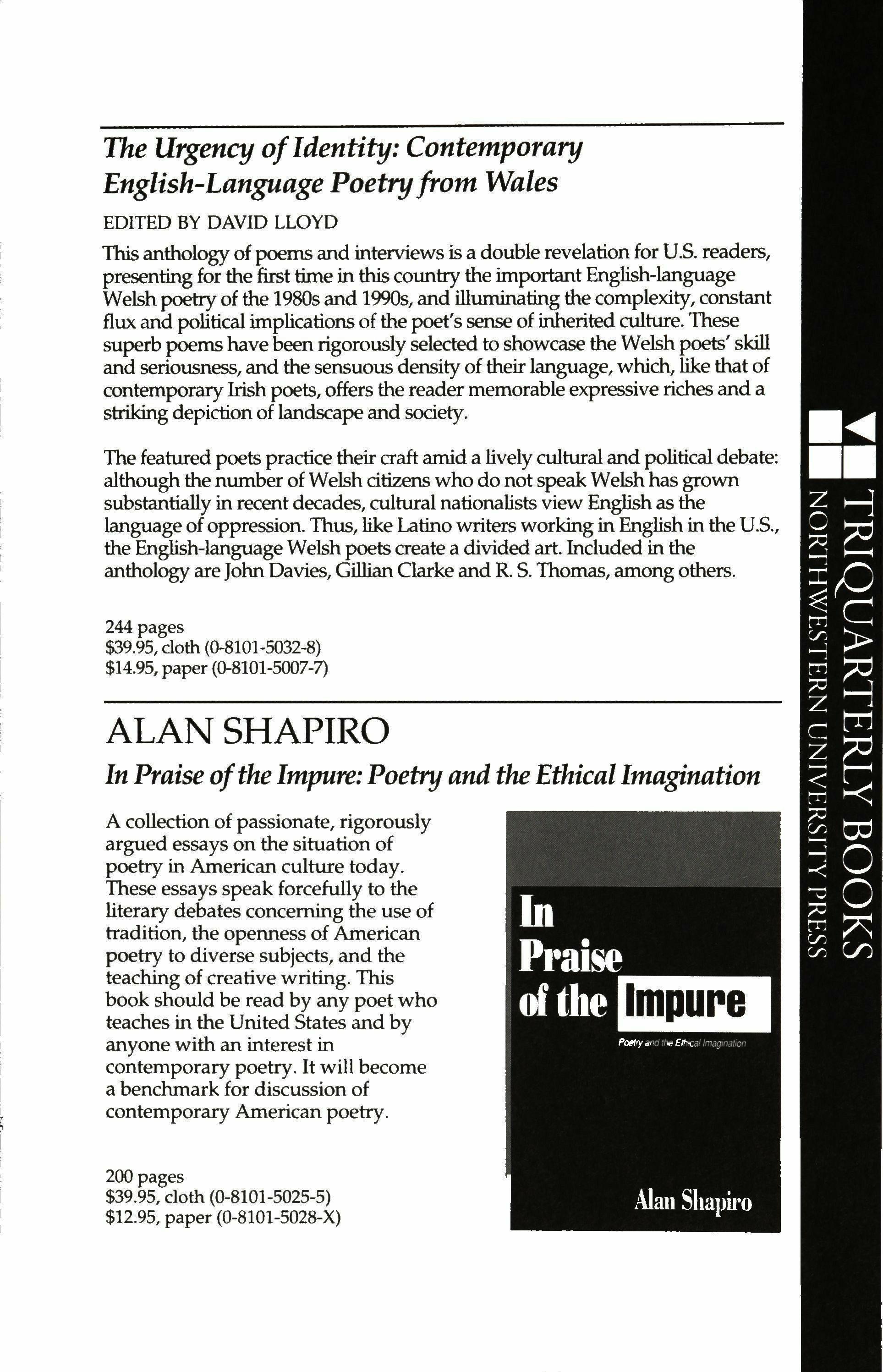
The Urgency ofIdentity: Contemporary
English-Language Poetryfrom Wales
EDITED BY DAVID LLOYD
This anthology of poems and interviews is a double revelation for U.S. readers, presenting for the first time in this country the important English-language Welsh poetry of the 1980s and 19908, and illuminating the complexity, constant flux and political implications of the poet's sense of inherited culture. These superb poems have been rigorously selected to showcase the Welsh poets' skill and seriousness, and the sensuous density of their language, which, like that of contemporary Irish poets, offers the reader memorable expressive riches and a striking depiction of landscape and society.
The featured poetspractice their craft amid a lively cultural and political debate: although the number of Welsh citizens who do not speak Welsh has grown substantially in recent decades, cultural nationalists view English as the language of oppression. Thus, like Latino writers working in English in the U.S., the English-language Welsh poets create a divided art. Included in the anthology are John Davies, Gillian Clarke and R. S. Thomas, among others.
244 pages
$39.95, doth (0-8101-5032-8)
$14.95, paper (0-8101-5007-7)
ALAN SHAPIRO
In Praise ofthe Impure:Poetry and the Ethical Imagination
A collection of passionate, rigorously argued essays on the situation of poetry in American culture today. These essays speak forcefully to the literary debates concerning the use of tradition, the openness of American poetry to diverse subjects, and the teaching of creative writing. This book should be read by any poet who teaches in the United States and by anyone with an interest in contemporary poetry. It will become a benchmark for discussion of contemporary American poetry.
200 pages
$39.95, cloth (0-8101-5025-5)
$12.95, paper (0-8101-5028-X)
ANGELA JACKSON
Dark Legs and Silk Kisses: The Beatitudes ofthe Spinners
Winnerofthe Carl SandburgAward andthe 1993 Chicago Sun-TImes Book ofthe YearAward in Poetry
AngelaJackson brings remarkable gifts to the articulation of African-American experience. Her poetry features an impressive variety of characters exploring social identity, the rituals of race relations, the female psyche, creativity and spiritual experience.
Angela Jackson has known,forlong, what is rightfor her attention and scrupulous investigation.
-Gwendolyn Brooks

120 pages
$25, cloth (0-8101-5026-3)
$10.95, paper (0-8101-5001-8)
TIMOTHY RUSSELL
Adversaria
Winner ofthe 1993 TerrenceDes Pres PrizeforPoetry
Adversaria celebrates the rough beauty of ordinary life and laments its inevitable decline. These poems, titled in Latin, combine colloquial style with a late imperial tone to capture the stark contrasts and contradictions of a life lived between a steel mill and the quiet, graceful natural world.
To read Adversaria is to be in the presence of a lively and supple and various mind, as tough as it is American.
104 pages
$25, cloth (0-8101-5027-1)
-Li-Young Lee
$10.95, paper (0-8101-5002-6)
wl r ( I"] Ttl.llEHCI DIS ""til. ",'z.1t FOil "OfT �'I' ImOlhYRussell

EVAN ZIMROTH
Dead, Dinner, or Naked
We hear in these poems a song of tenderness, anger, intelligence and wit. Evan Zimroth's erotic, intense poems are rooted in history, myth and everyday life. Her strong, singular voice makes us look where we might not have looked, see what we might have missed, face what we would avoid.
I love the combination ofsmartness, pain, and what one might call conscious postmodern trashiness in this book A profoundly urban book, ofharsh memory andfantasy, set in harsher reality. -Alicia Ostriker
80 pages
$15, cloth (0-916384-10-1)
$8.95, paper (0-916384-14-4)
BRUCE WEIGL
What Saves Us
In these wrenching, elegant poems Bruce Weigl writes out of uncompromising memory and vision. From bars and bedrooms, in Ohio and Nicaragua and Vietnam, his voice rises through the noise of history and habit to reach us with impeccable grace and remarkable invention.
Song of Napalm made almost everything else that has been written about the Vietnam War seem irrelevant. What Saves Us moves right alongfrom that achievement. Bruce Weigl has become one ofthe best poets now writing in America. -Denise Levertov
80 pages
$17, cloth (0-916384-08-X)
$10.95, paper (0-916384-09-8)
MURIEL RUKEYSER
Out ofSilence: Selected Poems
EDITED BY KATE DANIELS
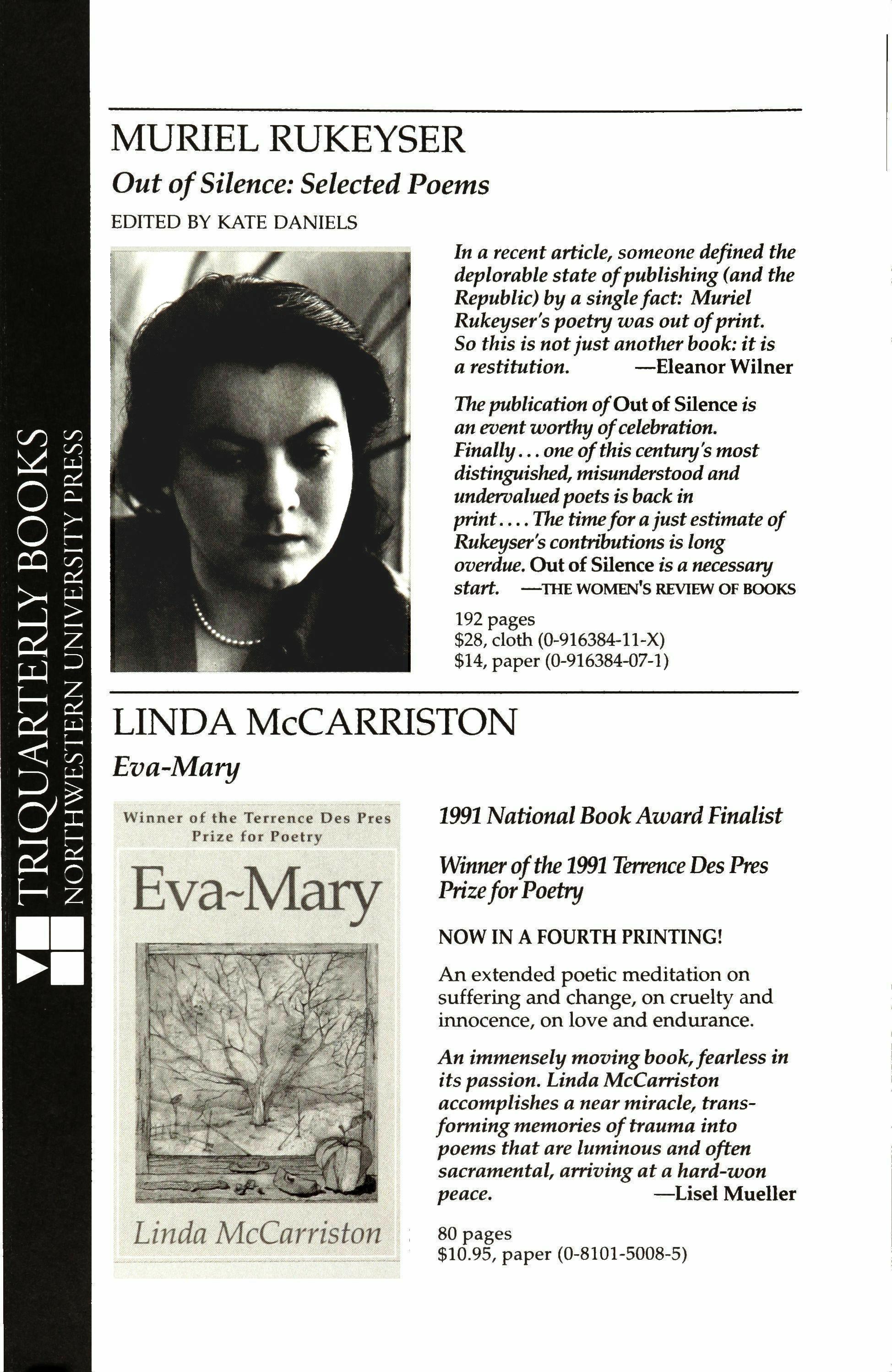
In a recent article, someone defined the deplorable state ofpublishing (and the Republic) by a singlefact: Muriel Rukeyser's poetry was out ofprint. So this is notjust another book: it is a restitution. -Eleanor Wilner
Thepublication ofOut of Silence is an event worthy ofcelebration. Finally one ofthis century's most distinguished, misunderstood and undervaluedpoets is back in print
The timefor a just estimate of Rukeyser's contributions is long overdue. Out of Silence is a necessary start. -THE WOMEN'S REVIEW OF BOOKS
192 pages
$28, cloth (0-916384-ll-X)
$14, paper (0-916384-07-1)
LINDA McCARRISTON
Eva-Mary
of the Terrence Des Pres Prize for Poetry
Eva-Mary
Winner ofthe 1991 Terrence Des Pres PrizeforPoetry
NOW IN A FOURTH PRINTING!
An extended poetic meditation on suffering and change, on cruelty and innocence, on love and endurance.
An immensely moving book,fearless in its passion. Linda McCarriston accomplishes a near miracle, transforming memories of trauma into poems that are luminous and often sacramental, arriving at a hard-won peace.
-Lisel Mueller
80 pages $10.95, paper (0-8101-5008-5)
�
Winner
Linda McCarriston
1991 National BookAward Finalist
Fiction ofthe Eighties
Edited by Reginald Gibbons and Susan Hahn
This landmark anthology honoring TriQuarterly's 25th anniversary includes 47 of the best short stories to have appeared in the magazine over the past decade. The stories range widely over the experience of modem life, and share a high level of artistry. An incomparable primer of the contemporary possibilities of fiction.
For contemporaryfiction [Fiction of the Eighties] is a standard-bearer The multiplicity and depth ofthefictional lives here are astonishing wisdom and wildness ofwriters too numerous to thank. -PUBLISHERS WEEKLY
592 pages
$26.95, cloth (0-916384-05-5)
$16.95, paper (0-916384-06-3)
Writersfrom South Africa
Based on the proceedings of a literary conference hosted by TriQuarterly magazine and Northwestern University in the autumn of 1987, this collection of speeches and dialogues by fourteen leading South African writers, poets and intellectuals opens up the world of contemporary South African literary culture to Ll.S. audiences, outlining such concerns as writing and censorship, worker poetry, the place of poetry in society and many others.
Writers from South Africa
CULTURE, POLITICS AND LITERARY THEORY AND ACTiVITY IN SOUTH AFRICA TODAY

128 pages
$6.50, paper (0-916384-03-9)
A stunning gift book with photos of Chicago over decades of change, including Deutch's Pulitzer-nominated photos from the Daih; NL'ZllS. This collection and analysis of Deutch's work, with plates both in duotone and in color, is the first full record of Deutch's achievement to be published.

144 pages
$45, cloth (0-929968-05-0)
$23.50, paper (0-929968-06-9)
Order Form ,,','{I,/I/II' '}{'/"{/,}{{{11,}. '\"rlh\\,'sl,'rn l ni\l'rsil\ Press Chi,'a�" I)isl rihul i"n Center 11 (';1(' S"ulh l.all�ll') \\I'nul' (:hi,'a�". 11.6('(,28
'\J(_llllt' .'I,(lllrt'S-; (;il� St(]tP Zlll ,'\utllllrffilip (;llllh/Pe111I'r (,lUalllitJ I nil Pril'p TIIlell
Subtotal Silililling and handline" 'f( IT.t..L I :tl(,,1 kill 1IIIIn.'\ 1ll'llt'r ("nl'lll�t'll _J �1,1'-.t("I'I',llll/\ 1'-.<1 numher
F:\[llr,jtillfll),ltt' Slgrl'1IIJrt': 'III}IIII"III-$:: r,lllll,1 til mk, :); 7> ,',;1 II ,1I11i111111101III1I1', '111I1'lgll $-1°,11111"111111". $1.11111',11'11 ,111111111,[\,;1111111'
Editor
Reginald Gibbons
Managing Editor
Kirstie Felland
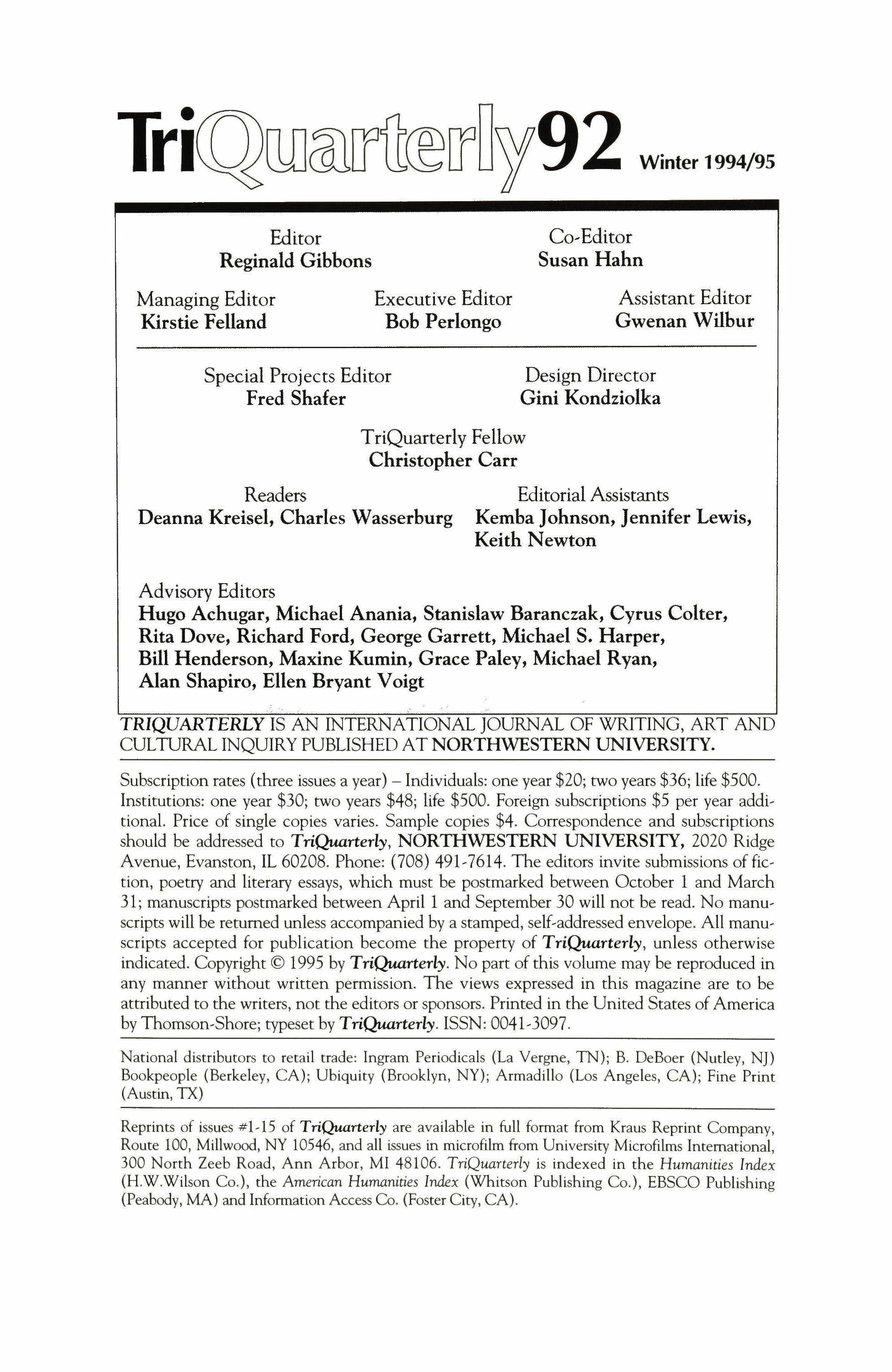
Executive Editor Bob Perlongo
Special Projects Editor
Fred Shafer
Co-Editor
Susan Hahn
Assistant Editor Gwenan Wilbur
Design Director Gini Kondziolka
TriQuarterly Fellow
Christopher Carr
Readers
Deanna Kreisel, Charles Wasserburg
Advisory Editors
Editorial Assistants
Kemba Johnson, Jennifer Lewis, Keith Newton
Hugo Achugar, Michael Anania, Stanislaw Baranczak, Cyrus Colter, Rita Dove, Richard Ford, George Garrett, Michael S. Harper, Bill Henderson, Maxine Kumin, Grace Paley, Michael Ryan, Alan Shapiro, Ellen Bryant Voigt
TRIQUARTERLY IS AN INTERNATIONAL JOURNAL OF WRITING, ART AND CULTURAL INQUIRY PUBLISHED AT NORTHWESTERN UNIVERSITY.
Subscription rates (three issues a year) - Individuals: one year $20; two years $36; life $500. Institutions: one year $30; two years $48; life $500. Foreign subscriptions $5 per year additional. Price of single copies varies. Sample copies $4. Correspondence and subscriptions should be addressed to TriQuarterly, NORTHWESTERN UNIVERSITY, 2020 Ridge Avenue, Evanston, IL 60208. Phone: (708) 491-7614. The editors invite submissions of fietion, poetry and literary essays, which must be postmarked between October 1 and March 31; manuscripts postmarked between April 1 and September 30 will not be read. No manuscripts will be returned unless accompanied by a stamped, self-addressed envelope. All manuscripts accepted for publication become the property of TriQuarterly, unless otherwise indicated. Copyright © 1995 by TriQuarterly. No part of this volume may be reproduced in any manner without written permission. The views expressed in this magazine are to be attributed to the writers, not the editors or sponsors. Printed in the United States ofAmerica by Thomson-Shore; typeset by TriQuarterly. ISSN: 0041-3097.
National distributors to retail trade: Ingram Periodicals (La Vergne, TN); B. DeBoer (Nutley, NJ) Bookpeople (Berkeley, CAl; Ubiquity (Brooklyn, NY); Armadillo (Los Angeles, CAl; Fine Print (Austin, TX)
Reprints of issues #1-15 of TriQuarterly are available in full format from Kraus Reprint Company, Route 100, Millwood, NY 10546, and all issues in microfilm from University Microfilms International, 300 North Zeeb Road, Ann Arbor, MI 48106. TriQuarterly is indexed in the Humanities Index (H.W.Wilson Co.), the American Humanities Index (Whitson Publishing Co.), EBSCO Publishing (Peabody, MA) and Information Access Co. (Foster City, CAl.
 Luna Crescente
Luna Crescente
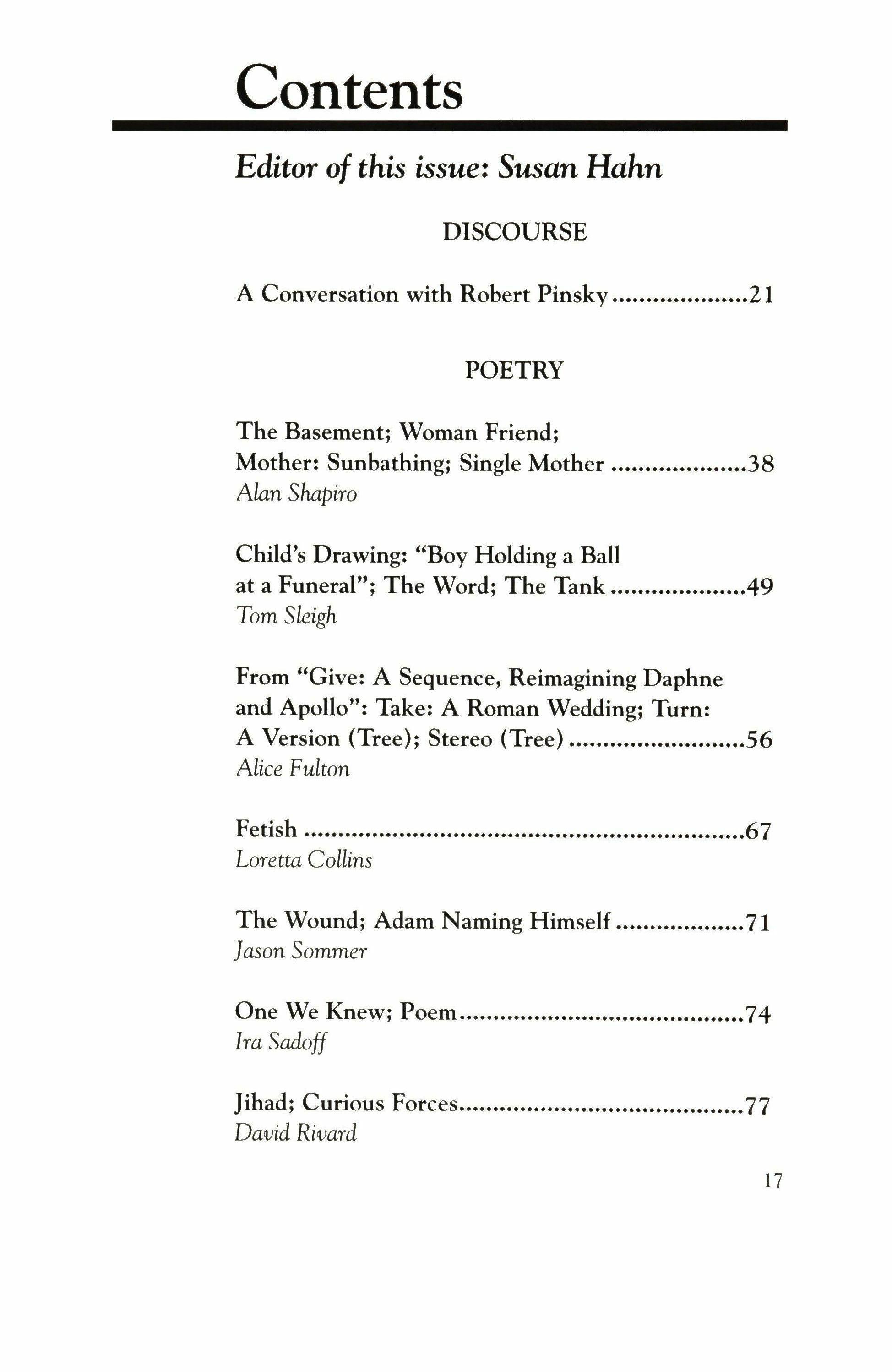
Editor of this issue: Susan Hahn
Contents
DISCOURSE A Conversation with Robert Pinsky •...•...••••.•..••.• 2l POETRY The Basement; Woman Friend; Mother: Sunbathing; Single Mother 38 Alan Shapiro Child's Drawing: "Boy Holding a Ball at a Funeral"; The Word; The Tank ....•.............. .49 Tom Sleigh From "Give: A Sequence, Reimagining Daphne and Apollo": Take: A Roman Wedding; Turn: A Version (Tree); Stereo (Tree) ••...........•••.......... 56 Alice Fulton Fetish 67 Loretta Collins The Wound; Adam Naming Himself •••.....••......••. 71 Jason Sommer One We Knew; Poem 74 Ira Sadoff Jihad; Curious Forces ..................................•.....•. 77 David Rivard 17

Trinity 81 Cathleen Calbert Lines on a Yankee Aphorism; Zooms and Pans ...• 84 David Barber Center; Design; Directions .........•..•••.................... 88 Billy Collins The Walking Stick ...•...••.............•••.......••••••••...... 93 Laura Newbern The Other Fear; On Silence ..•...••••.•.................. 256 Yannis Ritsos Translated from the Greek by Martin McKinsey PORTFOLIO The Arm and the Wing ••••••.•.•............................ 107 Meredith Bergmann Prints and Sculpture 111 Charles Wells MEMOIR Woodstock Puritan .................••••.....................• 139 Alan Shapiro 18
FICTION
Five Prose Pieces: Truth; Dare; Jean Rhys in Mexico; Why I'm in Vietnam: Answer 2/Bong
Sen Hotel, Saigon; Why I'm in Vietnam: Answer 4/lIue
Kathleene West

Edward Falco
Sharon Solwitz
Cover sculpture, Sleeper, and prints, Luna Crescente (page 16) and Luna Cadente (page 258), by Charles Wells
Cover design by Gini Kondziolka
96
Acid 165
Mercy 181
A Man-To-Be 189 Ha}in Some Say the World 199
Miles Away from Home 211
Susan Perabo
Comparing 220 Stephen Dixon In the Graveyard of Afterbirth 233
Kidd
239
Stuart CONTRIBUTORS 259
Robert S Nelsen
Sue Monk
Mariah
Dabney
19
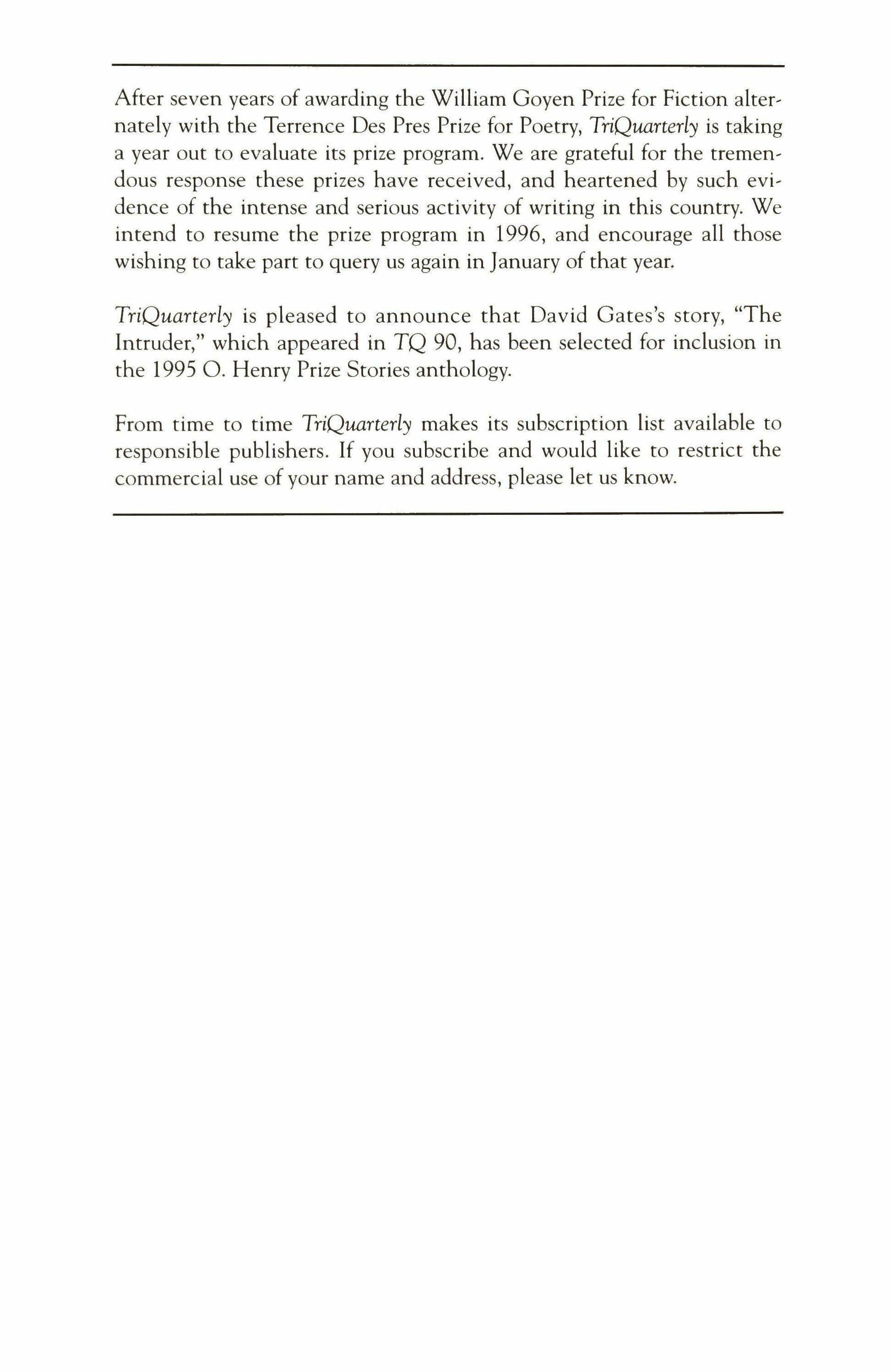
After seven years of awarding the William Goyen Prize for Fiction alternately with the Terrence Des Pres Prize for Poetry, TriQuarterly is taking a year out to evaluate its prize program. We are grateful for the tremendous response these prizes have received, and heartened by such evidence of the intense and serious activity of writing in this country. We intend to resume the prize program in 1996, and encourage all those wishing to take part to query us again in January of that year.
TriQuarterly is pleased to announce that David Gates's story, "The Intruder," which appeared in TQ 90, has been selected for inclusion in the 1995 O. Henry Prize Stories anthology.
From time to time TriQuarterly makes its subscription list available to responsible publishers. If you subscribe and would like to restrict the commercial use of your name and address, please let us know.
A Conversation with Robert Pinsky
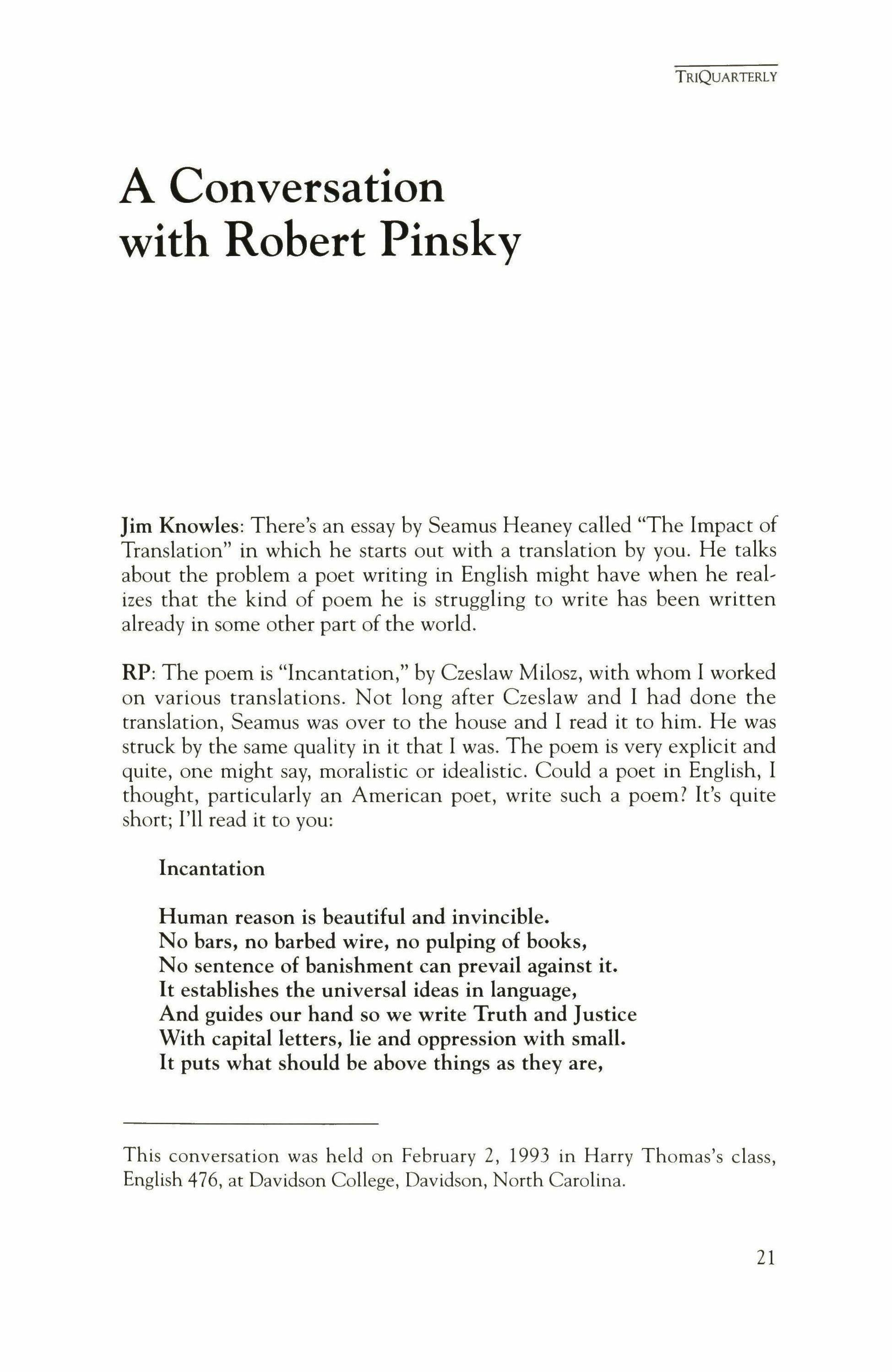
Jim Knowles: There's an essay by Seamus Heaney called "The Impact of Translation" in which he starts out with a translation by you. He talks about the problem a poet writing in English might have when he real, izes that the kind of poem he is struggling to write has been written already in some other part of the world.
RP: The poem is "Incantation," by Czeslaw Milosz, with whom I worked on various translations. Not long after Czeslaw and I had done the translation, Seamus was over to the house and I read it to him. He was struck by the same quality in it that I was. The poem is very explicit and quite, one might say, moralistic or idealistic. Could a poet in English, I thought, particularly an American poet, write such a poem? It's quite short; I'll read it to you:
Incantation
Human reason is beautiful and invincible. No bars, no barbed wire, no pulping of books, No sentence of banishment can prevail against it. It establishes the universal ideas in language, And guides our hand so we write Truth and Justice With capital letters, lie and oppression with small. It puts what should be above things as they are,
This conversation was held on February 2, 1993 in Harry Thomas's class, English 476, at Davidson College, Davidson, North Carolina.
TRIQUARTERLY
21
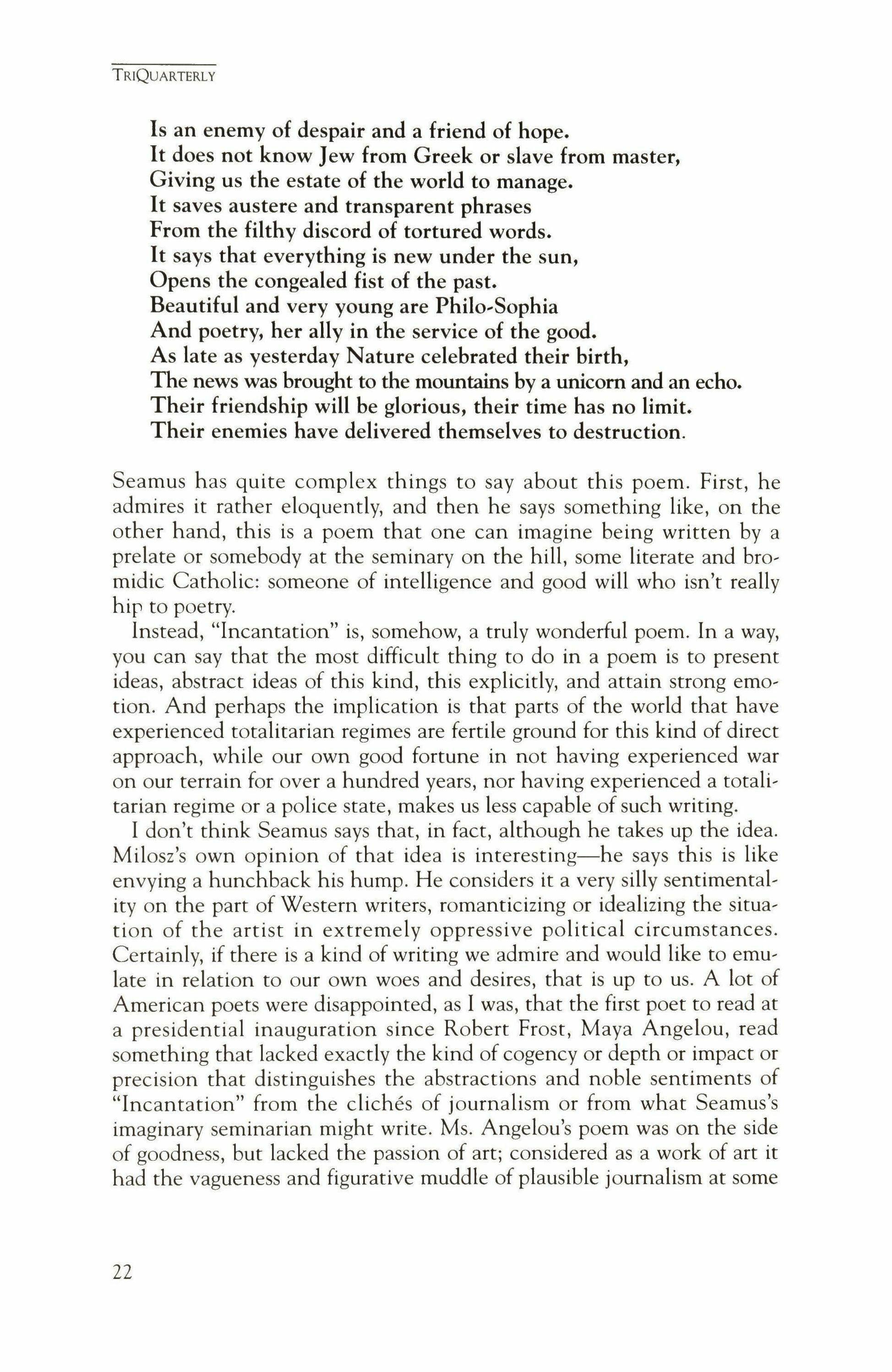
Is an enemy of despair and a friend of hope. It does not know Jew from Greek or slave from master, Giving us the estate of the world to manage. It saves austere and transparent phrases From the filthy discord of tortured words. It says that everything is new under the sun, Opens the congealed fist of the past.
Beautiful and very young are Philo-Sophia And poetry, her ally in the service of the good. As late as yesterday Nature celebrated their birth, The news was brought to the mountains by a unicorn and an echo. Their friendship will be glorious, their time has no limit. Their enemies have delivered themselves to destruction.
Seamus has quite complex things to say about this poem. First, he admires it rather eloquently, and then he says something like, on the other hand, this is a poem that one can imagine being written by a prelate or somebody at the seminary on the hill, some literate and bromidic Catholic: someone of intelligence and good will who isn't really hip to poetry.
Instead, "Incantation" is, somehow, a truly wonderful poem. In a way, you can say that the most difficult thing to do in a poem is to present ideas, abstract ideas of this kind, this explicitly, and attain strong emotion. And perhaps the implication is that parts of the world that have experienced totalitarian regimes are fertile ground for this kind of direct approach, while our own good fortune in not having experienced war on our terrain for over a hundred years, nor having experienced a totalitarian regime or a police state, makes us less capable of such writing.
I don't think Seamus says that, in fact, although he takes up the idea. Milosz's own opinion of that idea is interesting-he says this is like envying a hunchback his hump. He considers it a very silly sentimentality on the part of Western writers, romanticizing or idealizing the situation of the artist in extremely oppressive political circumstances. Certainly, if there is a kind of writing we admire and would like to emulate in relation to our own woes and desires, that is up to us. A lot of American poets were disappointed, as I was, that the first poet to read at a presidential inauguration since Robert Frost, Maya Angelou, read something that lacked exactly the kind of cogency or depth or impact or precision that distinguishes the abstractions and noble sentiments of "Incantation" from the cliches of journalism or from what Seamus's imaginary seminarian might write. Ms. Angelou's poem was on the side of goodness, but lacked the passion of art; considered as a work of art it had the vagueness and figurative muddle of plausible journalism at some
TRIQUARTERLY
22
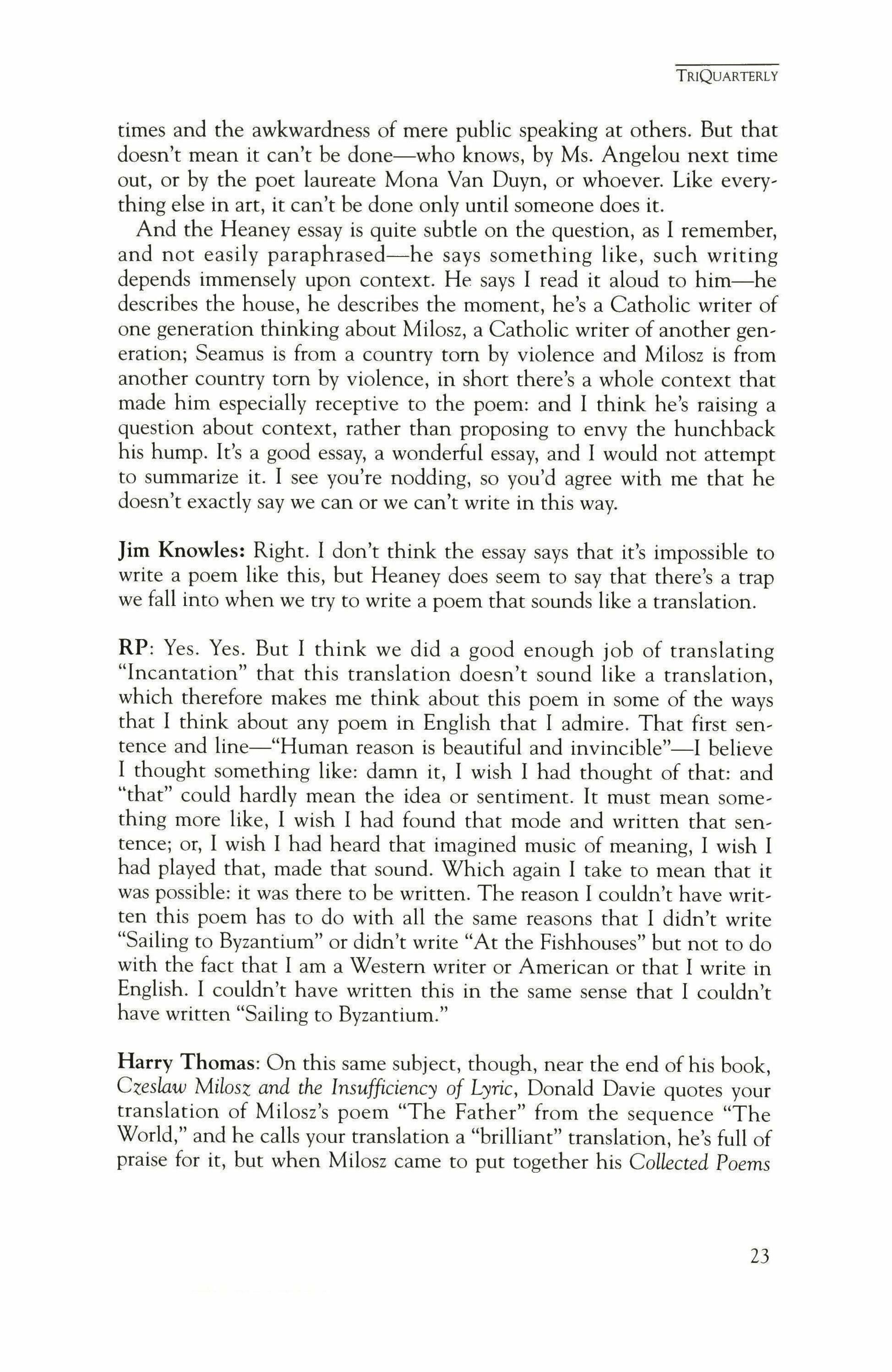
times and the awkwardness of mere public speaking at others. But that doesn't mean it can't be done-who knows, by Ms. Angelou next time out, or by the poet laureate Mona Van Duyn, or whoever. Like everything else in art, it can't be done only until someone does it.
And the Heaney essay is quite subtle on the question, as I remember, and not easily paraphrased-he says something like, such writing depends immensely upon context. He says I read it aloud to him-he describes the house, he describes the moment, he's a Catholic writer of one generation thinking about Milosz, a Catholic writer of another generation; Seamus is from a country tom by violence and Milosz is from another country tom by violence, in short there's a whole context that made him especially receptive to the poem: and I think he's raising a question about context, rather than proposing to envy the hunchback his hump. It's a good essay, a wonderful essay, and I would not attempt to summarize it. I see you're nodding, so you'd agree with me that he doesn't exactly say we can or we can't write in this way.
Jim Knowles: Right. I don't think the essay says that it's impossible to write a poem like this, but Heaney does seem to say that there's a trap we fall into when we try to write a poem that sounds like a translation.
RP: Yes. Yes. But I think we did a good enough job of translating "Incantation" that this translation doesn't sound like a translation, which therefore makes me think about this poem in some of the ways that I think about any poem in English that I admire. That first sentence and line-"Human reason is beautiful and invincible"-I believe I thought something like: damn it, I wish I had thought of that: and "that" could hardly mean the idea or sentiment. It must mean something more like, I wish I had found that mode and written that sentence; or, I wish I had heard that imagined music of meaning, I wish I had played that, made that sound. Which again I take to mean that it was possible: it was there to be written. The reason I couldn't have written this poem has to do with all the same reasons that I didn't write "Sailing to Byzantium" or didn't write "At the Fishhouses" but not to do with the fact that I am a Western writer or American or that I write in English. I couldn't have written this in the same sense that I couldn't have written "Sailing to Byzantium."
Harry Thomas: On this same subject, though, near the end of his book, Czeslaw Milosz and the Insufficiency of Lyric, Donald Davie quotes your translation of Milosz's poem "The Father" from the sequence "The World," and he calls your translation a "brilliant" translation, he's full of praise for it, but when Milosz came to put together his Collected Poems
TRIQUARTERLY
23
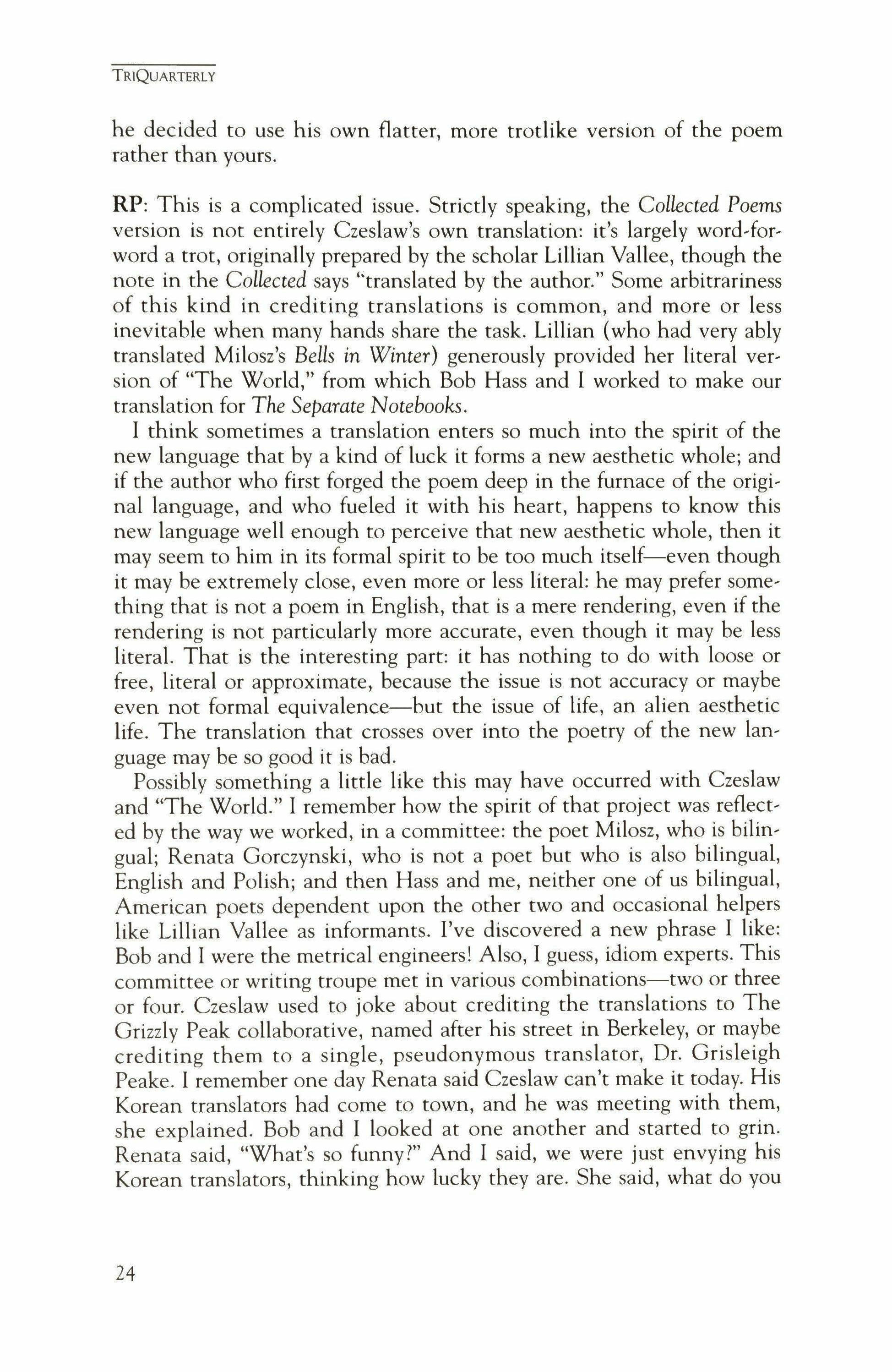
he decided to use his own flatter, more trotlike version of the poem rather than yours.
RP: This is a complicated issue. Strictly speaking, the Collected Poems version is not entirely Czeslaw's own translation: it's largely word-forword a trot, originally prepared by the scholar Lillian Vallee, though the note in the Collected says "translated by the author." Some arbitrariness of this kind in crediting translations is common, and more or less inevitable when many hands share the task. Lillian (who had very ably translated Milosz's Bells in Winter) generously provided her literal version of "The World," from which Bob Hass and I worked to make our translation for The Separate Notebooks.
I think sometimes a translation enters so much into the spirit of the new language that by a kind of luck it forms a new aesthetic whole; and if the author who first forged the poem deep in the furnace of the original language, and who fueled it with his heart, happens to know this new language well enough to perceive that new aesthetic whole, then it may seem to him in its formal spirit to be too much itself-even though it may be extremely close, even more or less literal: he may prefer something that is not a poem in English, that is a mere rendering, even if the rendering is not particularly more accurate, even though it may be less literal. That is the interesting part: it has nothing to do with loose or free, literal or approximate, because the issue is not accuracy or maybe even not formal equivalence-but the issue of life, an alien aesthetic life. The translation that crosses over into the poetry of the new language may be so good it is bad.
Possibly something a little like this may have occurred with Czeslaw and "The World." I remember how the spirit of that project was reflected by the way we worked, in a committee: the poet Milosz, who is bilingual; Renata Gorczynski, who is not a poet but who is also bilingual, English and Polish; and then Hass and me, neither one of us bilingual, American poets dependent upon the other two and occasional helpers like Lillian Vallee as informants. I've discovered a new phrase I like: Bob and I were the metrical engineers! Also, I guess, idiom experts. This committee or writing troupe met in various combinations-two or three or four. Czeslaw used to joke about crediting the translations to The Grizzly Peak collaborative, named after his street in Berkeley, or maybe crediting them to a single, pseudonymous translator, Dr. Grisleigh Peake. I remember one day Renata said Czeslaw can't make it today. His Korean translators had come to town, and he was meeting with them, she explained. Bob and I looked at one another and started to grin. Renata said, "What's so funny?" And I said, we were just envying his Korean translators, thinking how lucky they are. She said, what do you
TRIQUARTERLY
24
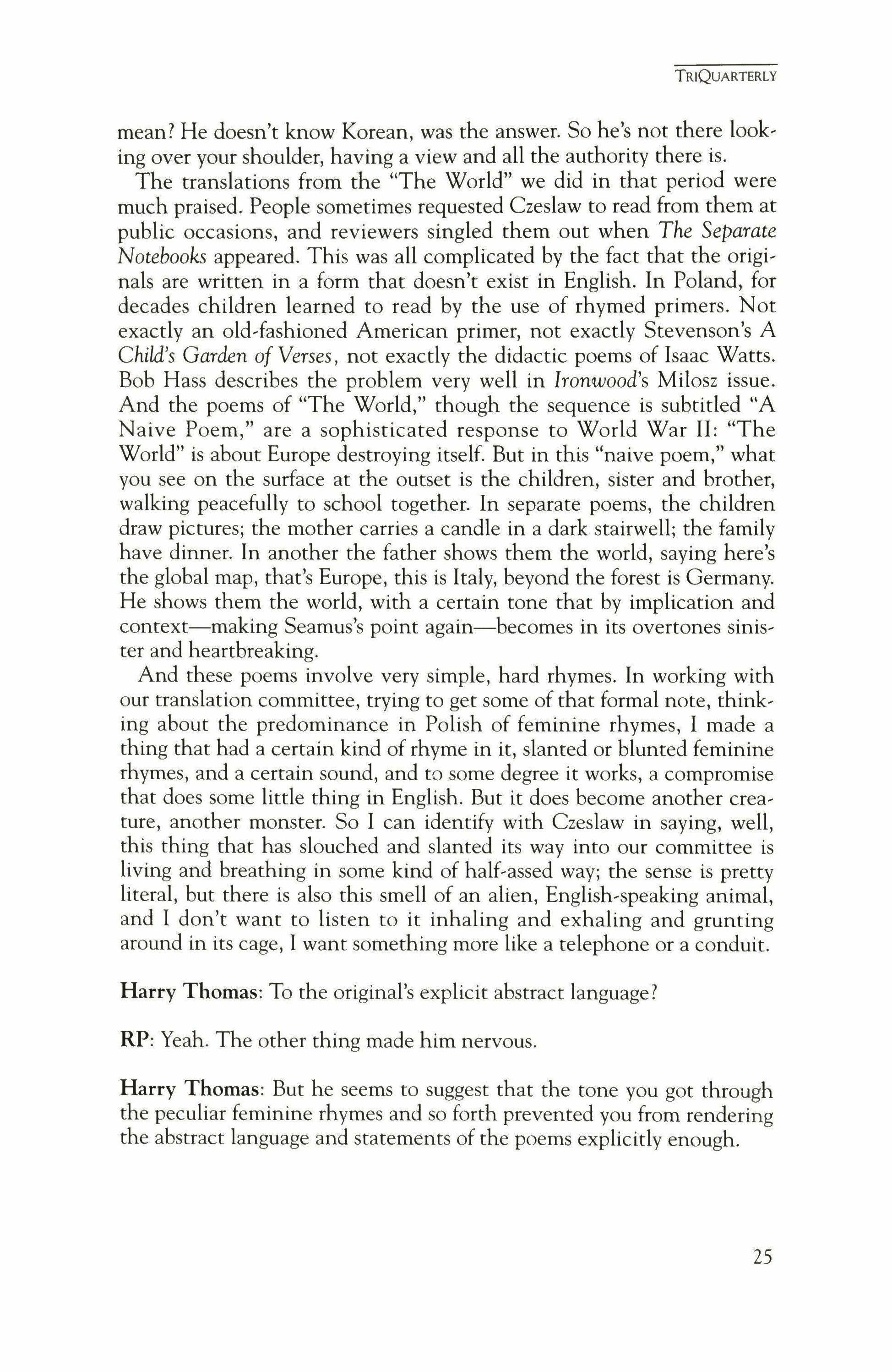
mean? He doesn't know Korean, was the answer. So he's not there look, ing over your shoulder, having a view and all the authority there is.
The translations from the "The World" we did in that period were much praised. People sometimes requested Czeslaw to read from them at public occasions, and reviewers singled them out when The Separate Notebooks appeared. This was all complicated by the fact that the originals are written in a form that doesn't exist in English. In Poland, for decades children learned to read by the use of rhymed primers. Not exactly an old-fashioned American primer, not exactly Stevenson's A Child's Garden of Verses, not exactly the didactic poems of Isaac Watts. Bob Hass describes the problem very well in Ironwood's Milosz issue. And the poems of "The World," though the sequence is subtitled "A Naive Poem," are a sophisticated response to World War II: "The World" is about Europe destroying itself. But in this "naive poem," what you see on the surface at the outset is the children, sister and brother, walking peacefully to school together. In separate poems, the children draw pictures; the mother carries a candle in a dark stairwell; the family have dinner. In another the father shows them the world, saying here's the global map, that's Europe, this is Italy, beyond the forest is Germany. He shows them the world, with a certain tone that by implication and context-making Seamus's point again-becomes in its overtones sinister and heartbreaking.
And these poems involve very simple, hard rhymes. In working with our translation committee, trying to get some of that formal note, think, ing about the predominance in Polish of feminine rhymes, I made a thing that had a certain kind of rhyme in it, slanted or blunted feminine rhymes, and a certain sound, and to some degree it works, a compromise that does some little thing in English. But it does become another creature, another monster. So I can identify with Czeslaw in saying, well, this thing that has slouched and slanted its way into our committee is living and breathing in some kind of half-assed way; the sense is pretty literal, but there is also this smell of an alien, English-speaking animal, and I don't want to listen to it inhaling and exhaling and grunting around in its cage, I want something more like a telephone or a conduit.
Harry Thomas: To the original's explicit abstract language?
RP: Yeah. The other thing made him nervous.
Harry Thomas: But he seems to suggest that the tone you got through the peculiar feminine rhymes and so forth prevented you from rendering the abstract language and statements of the poems explicitly enough.
TRIQUARTERLY
25
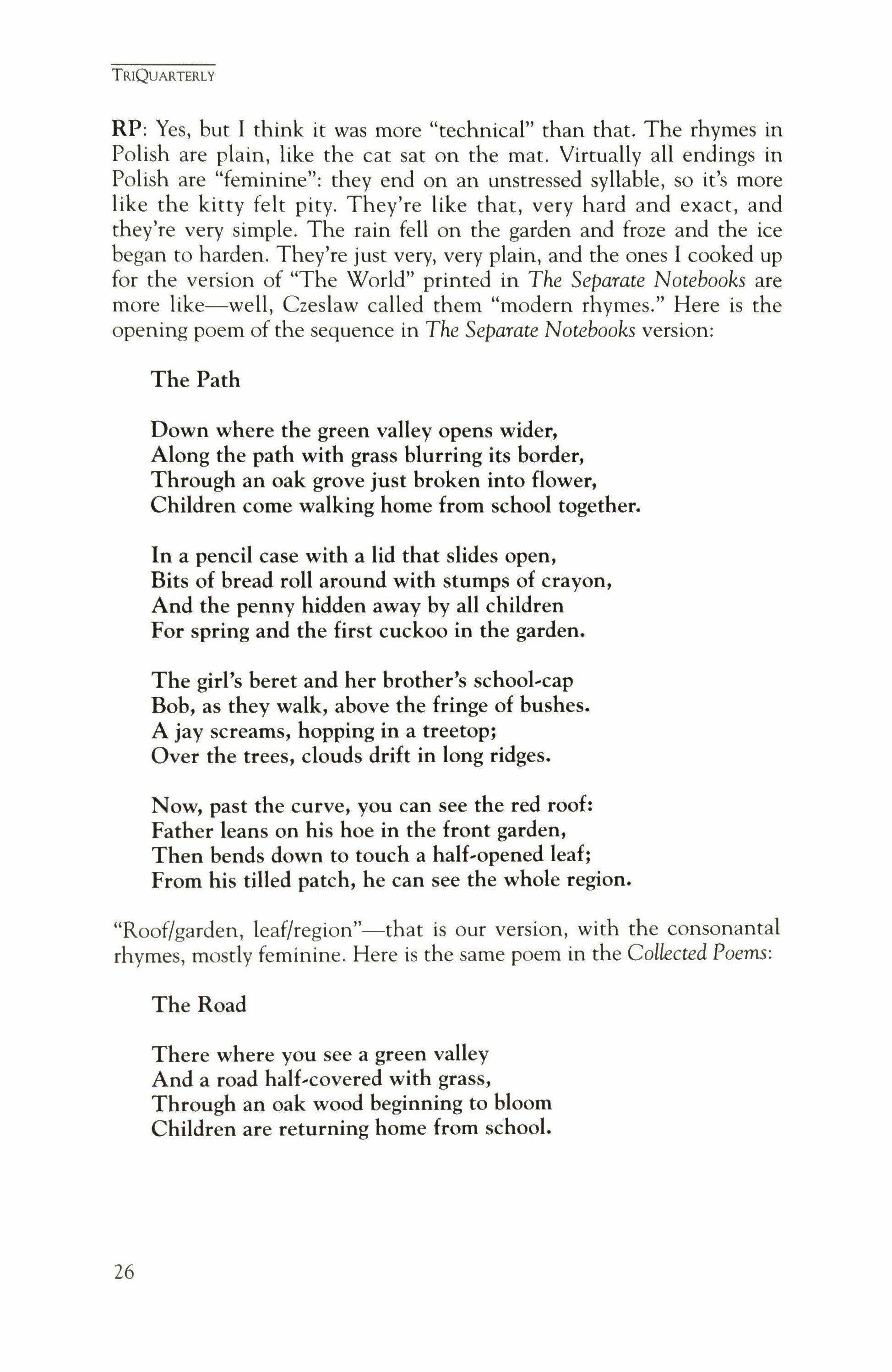
RP: Yes, but I think it was more "technical" than that. The rhymes in Polish are plain, like the cat sat on the mat. Virtually all endings in Polish are "feminine": they end on an unstressed syllable, so it's more like the kitty felt pity. They're like that, very hard and exact, and they're very simple. The rain fell on the garden and froze and the ice began to harden. They're just very, very plain, and the ones I cooked up for the version of "The World" printed in The Separate Notebooks are more like-well, Czeslaw called them "modern rhymes." Here is the opening poem of the sequence in The Separate Notebooks version:
The Path
Down where the green valley opens wider, Along the path with grass blurring its border, Through an oak grove just broken into flower, Children come walking home from school together.
In a pencil case with a lid that slides open, Bits of bread roll around with stumps of crayon, And the penny hidden away by all children For spring and the first cuckoo in the garden.
The girl's beret and her brother's school-cap Bob, as they walk, above the fringe of bushes. A jay screams, hopping in a treetop; Over the trees, clouds drift in long ridges.
Now, past the curve, you can see the red roof: Father leans on his hoe in the front garden, Then bends down to touch a half,opened leaf; From his tilled patch, he can see the whole region.
"Roof/garden, leaf/region"-that is our version, with the consonantal rhymes, mostly feminine. Here is the same poem in the Collected Poems:
The Road
There where you see a green valley And a road half-covered with grass, Through an oak wood beginning to bloom Children are returning home from school.
TRIQUARTERLY
26

In a pencil case that opens sideways
Crayons rattle among crumbs of a roll
And a copper penny saved by every child To greet the first spring cuckoo.
Sister's beret and brother's cap Bob in the bushy underbrush, A screeching jay hops in the branches And long clouds float over the trees.
A red roof is already visible at the bend. In front of the house father, leaning on a hoe, Bows down, touches the unfolded leaves, And from his flower bed inspects the whole region.
I think that the rhymed version is fairly close, and that it's just as abstract-the literal meaning is not much different. It is not a matter of abstractions. But the Collected doesn't attempt the rhymes; you can just be informed that they were in the original. I think that it is the rhythms and rhymes that help create an aesthetic creature-a kind of art-organism-and it is the breathing of such a creature that perhaps must make any author nervous simply by being other. I think it would make me nervous.
Susan Wildey: Something that came up in class is that we were wondering in what way, if any, Judaism has affected your writing.
RP: I'm certain that it must have, in many ways. For instance, I talked last night about my interest in things that are made, made up: I am deeply interested in the subject of creation-high and low, great and small. And religions are notable makings, religion itself is. For one kind of religious person creation itself is an episode in the career of God. For me God is an important episode in the history of creation. Possibly having been raised as an Orthodox Jew, which is to say with considerable separation from the majority culture, has contributed to my interest in making. Not sharing such creations as Christmas or Easter or the-our, your-Saviour, and at the same time having other creations like the kosher laws or the prohibition against saying or writing the word for "God": that is a richly interesting conflict. It may have increased the impact upon me of the fact that we creatures-we mammals, we colonyinsects, whatever we are-have invented not only language, but Christianity and Judaism and the United States of America and the violin and the blues and so forth.
TRIQUARTERLY
27
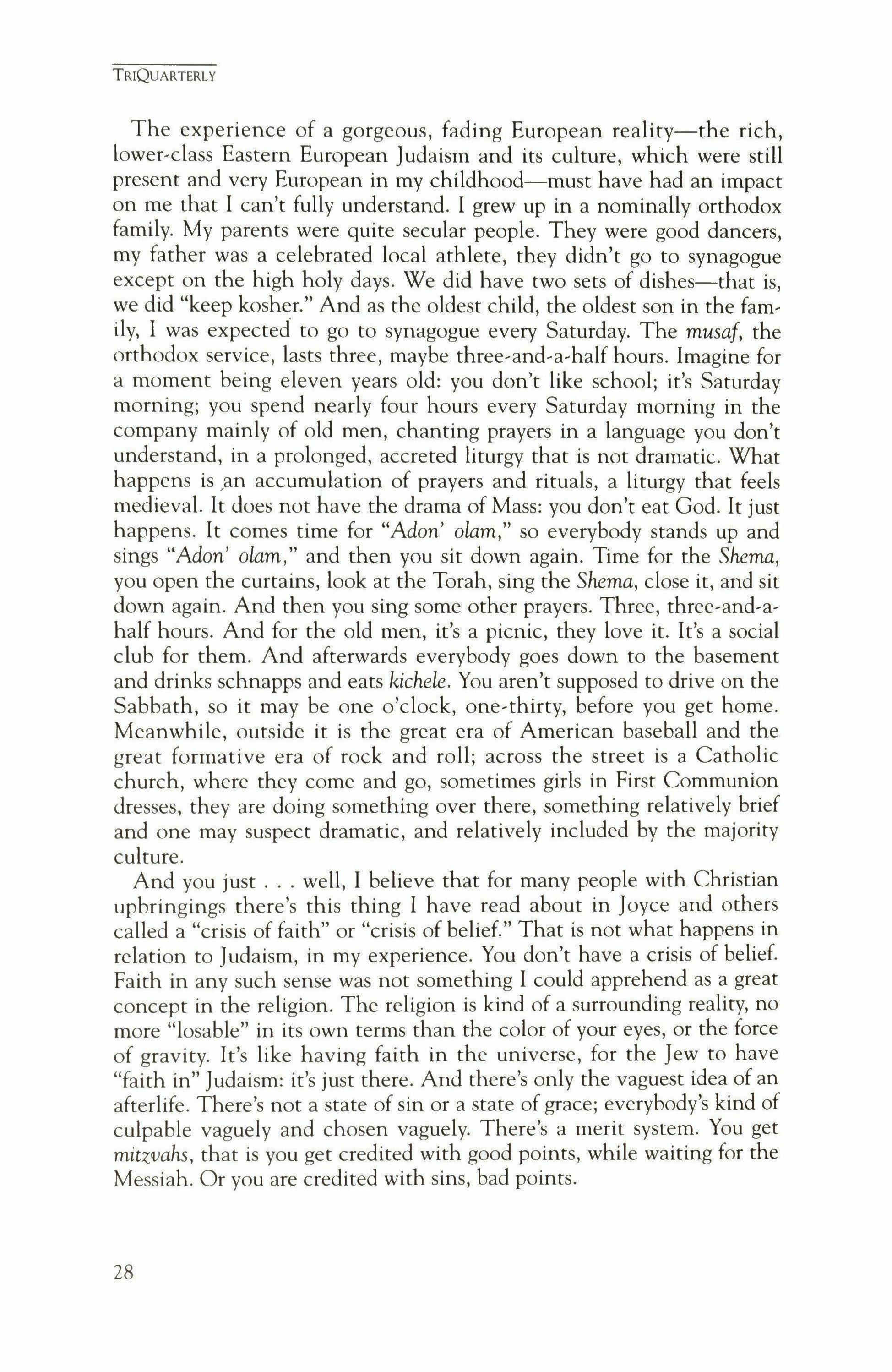
The experience of a gorgeous, fading European reality-the rich, lower-class Eastern European Judaism and its culture, which were still present and very European in my childhood-must have had an impact on me that I can't fully understand. I grew up in a nominally orthodox family. My parents were quite secular people. They were good dancers, my father was a celebrated local athlete, they didn't go to synagogue except on the high holy days. We did have two sets of dishes-that is, we did "keep kosher." And as the oldest child, the oldest son in the family, I was expected to go to synagogue every Saturday. The musaf, the orthodox service, lasts three, maybe three-and-a-half hours. Imagine for a moment being eleven years old: you don't like school; it's Saturday morning; you spend nearly four hours every Saturday morning in the company mainly of old men, chanting prayers in a language you don't understand, in a prolonged, accreted liturgy that is not dramatic. What happens is .an accumulation of prayers and rituals, a liturgy that feels medieval. It does not have the drama of Mass: you don't eat God. It just happens. It comes time for "Adon' olam," so everybody stands up and sings "Adon' olam," and then you sit down again. Time for the Shema, you open the curtains, look at the Torah, sing the Shema, close it, and sit down again. And then you sing some other prayers. Three, three-and-ahalf hours. And for the old men, it's a picnic, they love it. It's a social club for them. And afterwards everybody goes down to the basement and drinks schnapps and eats kichele. You aren't supposed to drive on the Sabbath, so it may be one o'clock, one-thirty, before you get home. Meanwhile, outside it is the great era of American baseball and the great formative era of rock and roll; across the street is a Catholic church, where they come and go, sometimes girls in First Communion dresses, they are doing something over there, something relatively brief and one may suspect dramatic, and relatively included by the majority culture.
And you just well, I believe that for many people with Christian upbringings there's this thing I have read about in Joyce and others called a "crisis of faith" or "crisis of belief." That is not what happens in relation to Judaism, in my experience. You don't have a crisis of belief. Faith in any such sense was not something I could apprehend as a great concept in the religion. The religion is kind of a surrounding reality, no more "losable" in its own terms than the color of your eyes, or the force of gravity. It's like having faith in the universe, for the Jew to have "faith in" Judaism: it's just there. And there's only the vaguest idea of an afterlife. There's not a state of sin or a state of grace; everybody's kind of culpable vaguely and chosen vaguely. There's a merit system. You get mitzvahs, that is you get credited with good points, while waiting for the Messiah. Or you are credited with sins, bad points.
TRIQUARTERLY
28
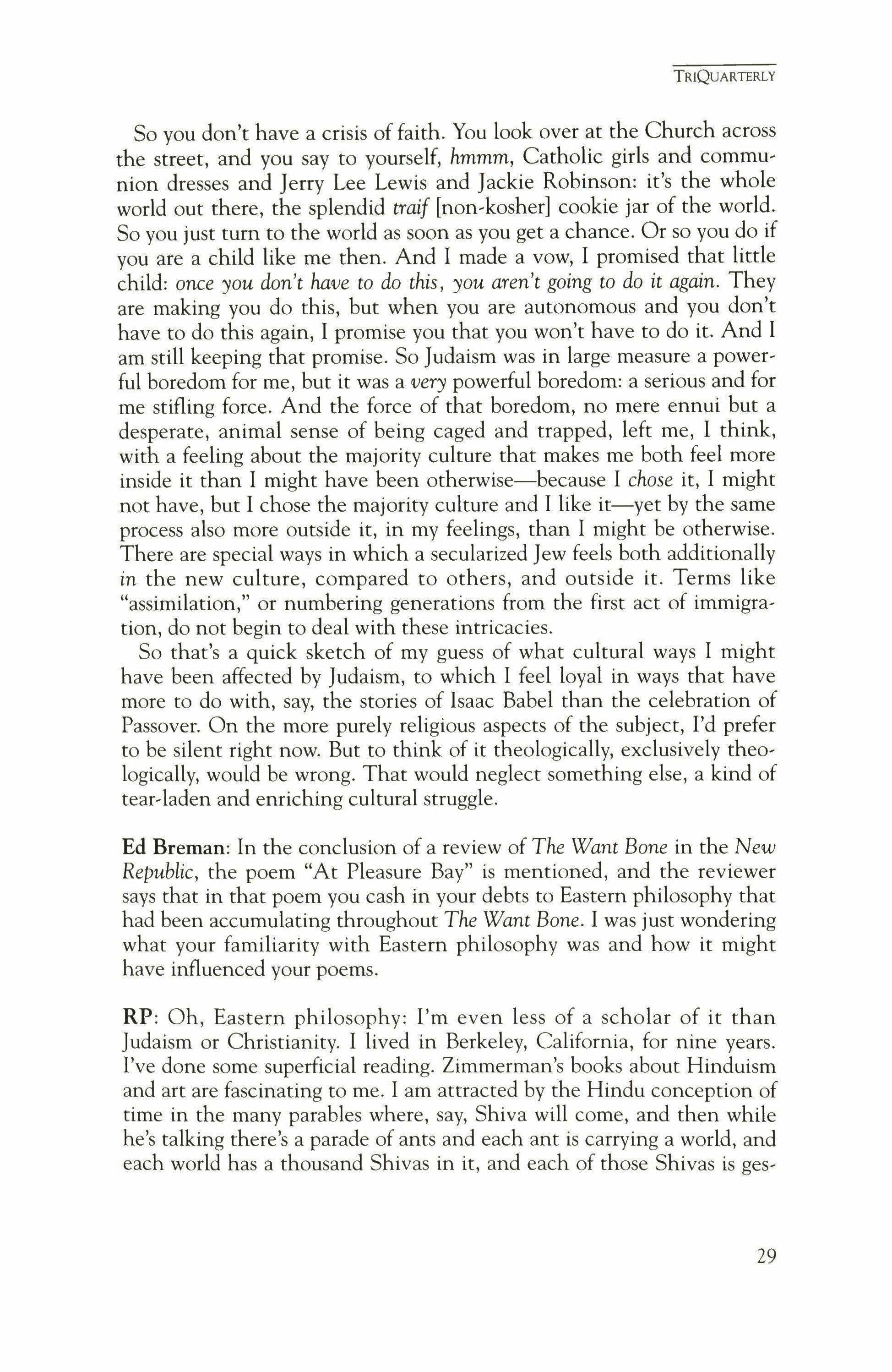
So you don't have a crisis of faith. You look over at the Church across the street, and you say to yourself, hmmm, Catholic girls and communion dresses and Jerry Lee Lewis and Jackie Robinson: it's the whole world out there, the splendid traif [non-kosher] cookie jar of the world. So you just tum to the world as soon as you get a chance. Or so you do if you are a child like me then. And I made a vow, I promised that little child: once you don't have to do this, you aren't going to do it again. They are making you do this, but when you are autonomous and you don't have to do this again, I promise you that you won't have to do it. And I am still keeping that promise. So Judaism was in large measure a powerful boredom for me, but it was a very powerful boredom: a serious and for me stifling force. And the force of that boredom, no mere ennui but a desperate, animal sense of being caged and trapped, left me, I think, with a feeling about the majority culture that makes me both feel more inside it than I might have been otherwise-because I chose it, I might not have, but I chose the majority culture and I like it-yet by the same process also more outside it, in my feelings, than I might be otherwise. There are special ways in which a secularized Jew feels both additionally in the new culture, compared to others, and outside it. Terms like "assimilation," or numbering generations from the first act of immigration, do not begin to deal with these intricacies.
So that's a quick sketch of my guess of what cultural ways I might have been affected by Judaism, to which I feel loyal in ways that have more to do with, say, the stories of Isaac Babel than the celebration of Passover. On the more purely religious aspects of the subject, I'd prefer to be silent right now. But to think of it theologically, exclusively theologically, would be wrong. That would neglect something else, a kind of tear-laden and enriching cultural struggle.
Ed Breman: In the conclusion of a review of The Want Bone in the New Republic, the poem "At Pleasure Bay" is mentioned, and the reviewer says that in that poem you cash in your debts to Eastern philosophy that had been accumulating throughout The Want Bone. I was just wondering what your familiarity with Eastern philosophy was and how it might have influenced your poems.
RP: Oh, Eastern philosophy: I'm even less of a scholar of it than Judaism or Christianity. I lived in Berkeley, California, for nine years. I've done some superficial reading. Zimmerman's books about Hinduism and art are fascinating to me. I am attracted by the Hindu conception of time in the many parables where, say, Shiva will come, and then while he's talking there's a parade of ants and each ant is carrying a world, and each world has a thousand Shivas in it, and each of those Shivas is ges-
TRIQUARTERLY
29

turing at a column of ants. They have many little parables or images like that, trying to enforce the immensity of the great cyclicalness-how everything comes back and comes back literally more times than you can imagine. And you give yourself games like that figure of the ants, as you try to imagine as best you can.
And I guess that at some point the idea I was talking to you about last night, about the way that culture is itself a kind of possession by the dead, coming back-at some point that idea illuminated for me the idea of metempsychosis, the transmigration of souls. And the way that the genetic inheritance is comparable to the cultural inheritance, each of them a constant shifting and combining of so many variables, as many variables as ants and Shivas, got connected in my mind with the migration of souls.
It is a trickle or thread that runs through this book. I suppose you could say I mock Buddha in "The Hearts." In an early draft of "The Hearts," I can remember one line that I took out was, "Easy for Buddha to say." There's that tone in the poem still, of "Easy for Buddha to say" this or that. And as I understand it, there is a considerable Buddhist tradition of mocking Buddha. It's one of the things I like about Buddhism. A Zen saying I have heard is: "Buddha is a very good stick to pick up shit with." That's one Buddha saying, and there is something awfully admirable about it; I don't know, I suppose I do think Judaism or Christianity might be better off if they had that spirit. The Torah is a good stick to pick up shit with! It would transform the religion if you could say that, if the religion were capacious enough and calm enough to embrace that.
Oma Blaise: In your essay, "Responsibilities of the Poet," you talk about the poet needing to transform a subject. Can you say more about that?
RP: Bad art does what you expect. To me, it's not truly a poem if it merely says what most intelligent, well-meaning people would say. In the other direction, total surprise is babble, it's meaningless; I don't mean to say that one is on a quest simply for novelty. But your responsibility is, even if it's only to versify something you perceive as truth, to put that truth or homily into a rhyme in such a way that you are transforming it. Your job is to do something that the reader didn't already have. And this does not mean simply the lazy reader. One kind of popular fiction just spins out explicitly and doggedly the most vague, generalized fantasies the reader already has-the least individuated fantasies. The reader, on his or her own, has vague, perhaps commercially provoked fantasies of having quite a lot of money and many a sexual adventure; but the nature of these dreams or of the reader as a person makes
TRIQUARTERLY
30
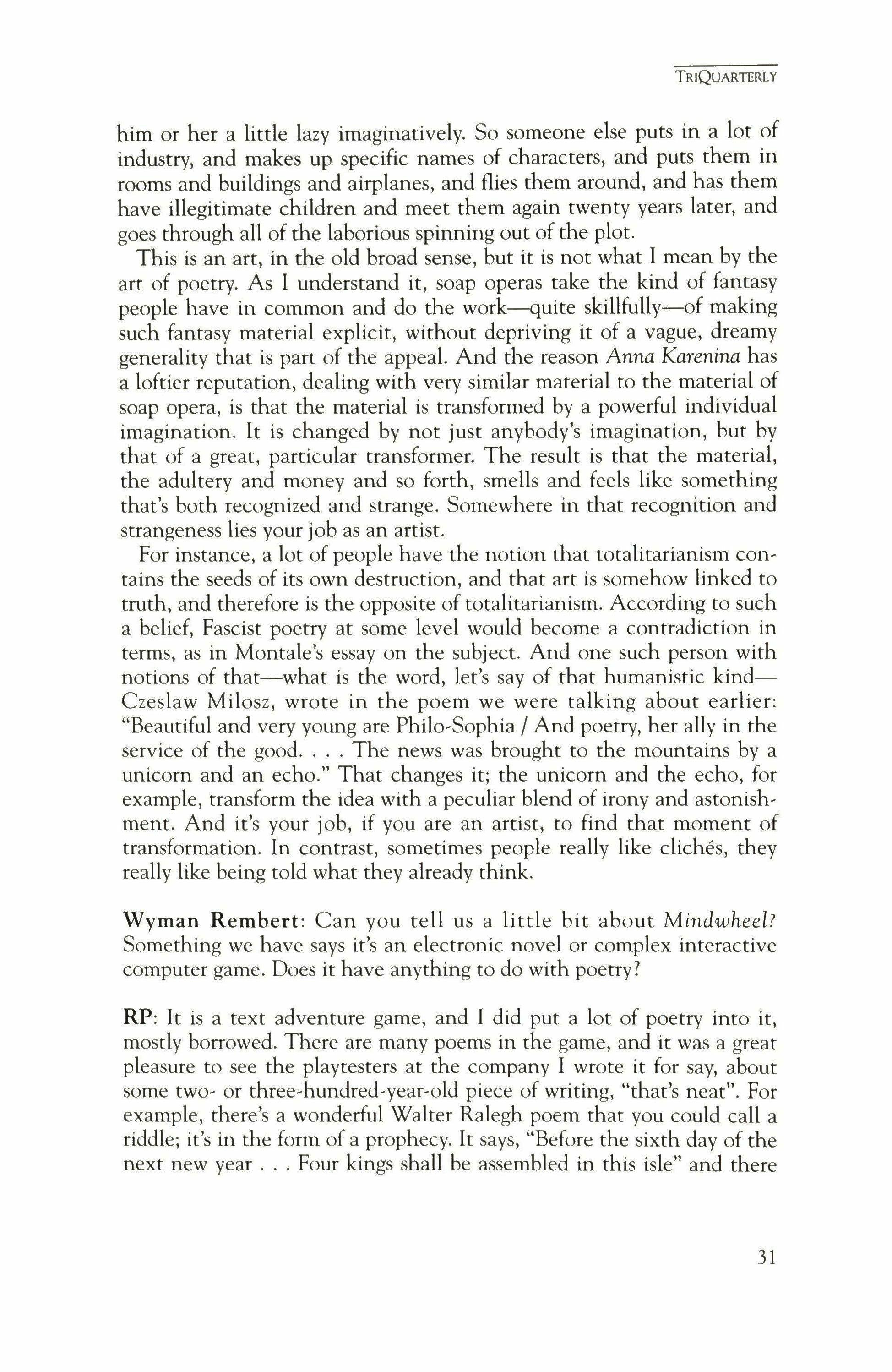
him or her a little lazy imaginatively. So someone else puts in a lot of industry, and makes up specific names of characters, and puts them in rooms and buildings and airplanes, and flies them around, and has them have illegitimate children and meet them again twenty years later, and goes through all of the laborious spinning out of the plot.
This is an art, in the old broad sense, but it is not what I mean by the art of poetry. As I understand it, soap operas take the kind of fantasy people have in common and do the work-quite skillfully-of making such fantasy material explicit, without depriving it of a vague, dreamy generality that is part of the appeal. And the reason Anna Karenina has a loftier reputation, dealing with very similar material to the material of soap opera, is that the material is transformed by a powerful individual imagination. It is changed by not just anybodv's imagination, but by that of a great, particular transformer. The result is that the material, the adultery and money and so forth, smells and feels like something that's both recognized and strange. Somewhere in that recognition and strangeness lies your job as an artist.
For instance, a lot of people have the notion that totalitarianism contains the seeds of its own destruction, and that art is somehow linked to truth, and therefore is the opposite of totalitarianism. According to such a belief, Fascist poetry at some level would become a contradiction in terms, as in Montale's essay on the subject. And one such person with notions of that-what is the word, let's say of that humanistic kindCzeslaw Milosz, wrote in the poem we were talking about earlier: "Beautiful and very young are Philo-Sophia / And poetry, her ally in the service of the good The news was brought to the mountains by a unicorn and an echo." That changes it; the unicorn and the echo, for example, transform the idea with a peculiar blend of irony and astonishment. And it's your job, if you are an artist, to find that moment of transformation. In contrast, sometimes people really like cliches, they really like being told what they already think.
Wyman Rembert: Can you tell us a little bit about Mindwheel? Something we have says it's an electronic novel or complex interactive computer game. Does it have anything to do with poetry?
RP: It is a text adventure game, and I did put a lot of poetry into it, mostly borrowed. There are many poems in the game, and it was a great pleasure to see the playtesters at the company I wrote it for say, about some two- or three-hundred-year-old piece of writing, "that's neat". For example, there's a wonderful Walter Ralegh poem that you could call a riddle; it's in the form of a prophecy. It says, "Before the sixth day of the next new year Four kings shall be assembled in this isle" and there 31
TRIQUARTERLY

shall be "the sound of trump" and "Dead bones shall then be tumbled up and down." What's being described, but never named, are the playing cards and dice. The charm of the poem is that it sounds like a mystical, rather frightening prophecy, and it's the cards and dice. At the end the poem says,
this tumult shall not cease Until an Herald shall proclaim a peace, An Herald strange, the like was never born Whose very beard is flesh, and mouth is horn.
Until a Herald calls: the like was never born / Whose very beard is flesh, and mouth is hom." Well, Mindwheel is a narrative game where text appears on the screen; and in response to each bit of narrative, which ends with a prompt, you decide whether to go north or to look around a room, say. You type in an imperative or complete the sentence "I want to and the machine responds by giving you more text on the screen. Early on in Mindwheel, a winged person is trapped behind bars, and you-the reader-protagontst=-can free this person by solving a riddle. The riddle is, "an herald the like was never born / Whose very beard is flesh, and mouth is horn." Has anybody guessed it yet? There is a hint in the expression of insult popular when I was in grade, school: "You weren't born, you were hatched." The answer is, a rooster. They play cards all night until the rooster calls: a morning herald which isn't born, but comes out of an egg; it has a beard of flesh and a mouth of hom.
This exemplifies a basic form of transformation, because the little rid, dle takes the extremely ordinary perception-that the cock crows in the morning and the night is over-and gives it a mystical aura: its "very beard is flesh, and mouth is hom." Ralegh's poem is a commentary on mysticism, and indeed on poetry, perhaps more than it is on the cards and dice. It is a delighted, somewhat sardonic commentary on rhetoric.
Ursula Reel: In your essay on T. S. Eliot you write: ''True poetry is never really misunderstood or discarded, because its basis is in pleasure. Explanations and theories are misunderstood; pleasures are either had, or not." Can you elaborate a little bit on that and talk about the effect you want when you write a poem?
RP: It's very much involved with the sounds of the words. I hope that such an answer does not seem disappointing to you, or simple-minded. I have a conviction that if you write whatever it is well enough-Wallace Stevens is a good author to demonstrate this with-the reader will put
TRIQUARTERLY
32
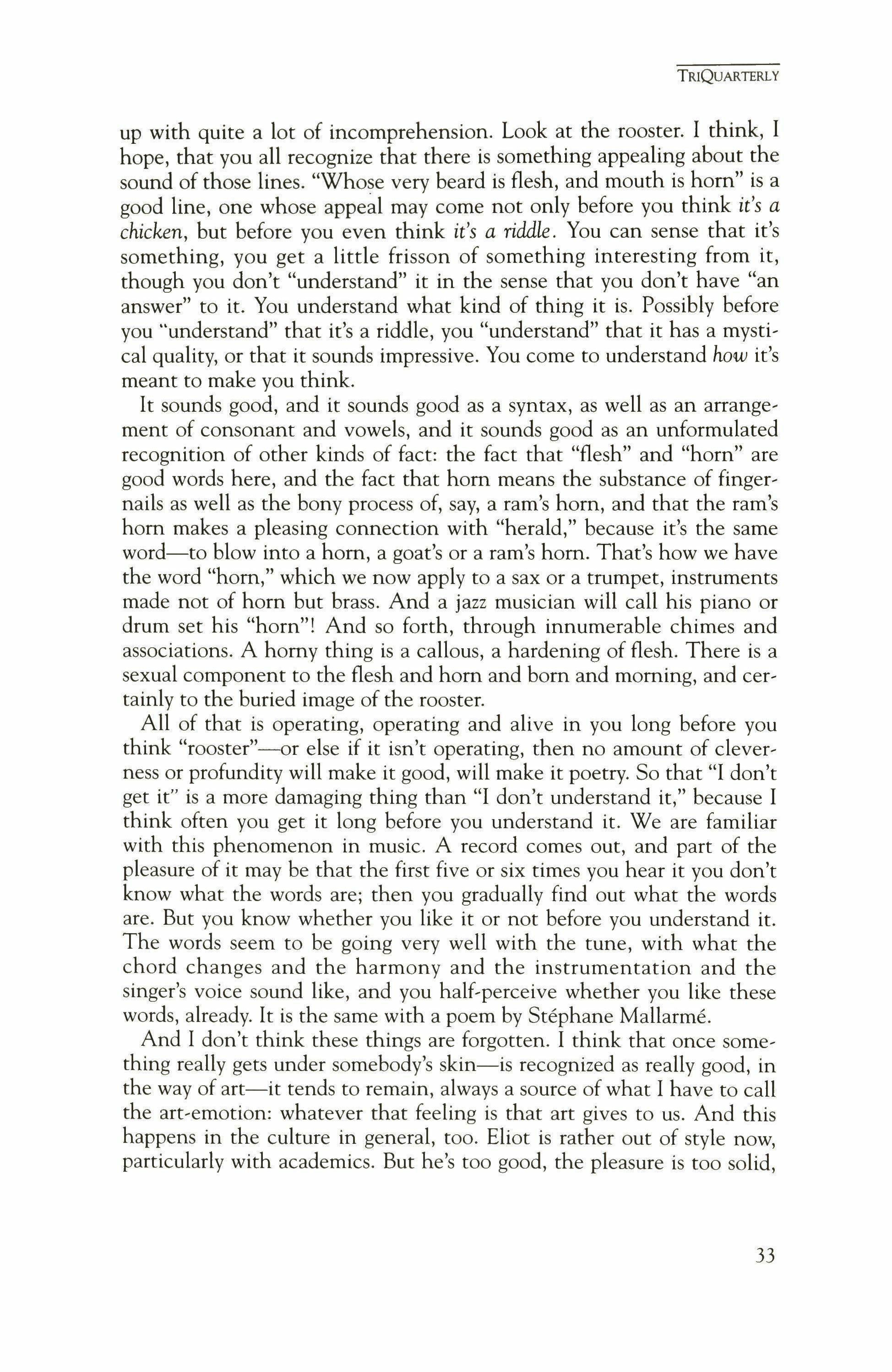
up with quite a lot of incomprehension. Look at the rooster. I think, I hope, that you all recognize that there is something appealing about the sound of those lines. "Whose very beard is flesh, and mouth is horn" is a good line, one whose appeal may come not only before you think it's a chicken, but before you even think it's a riddle. You can sense that it's something, you get a little frisson of something interesting from it, though you don't "understand" it in the sense that you don't have "an answer" to it. You understand what kind of thing it is. Possibly before you "understand" that it's a riddle, you "understand" that it has a mystical quality, or that it sounds impressive. You come to understand how it's meant to make you think.
It sounds good, and it sounds good as a syntax, as well as an arrangement of consonant and vowels, and it sounds good as an unformulated recognition of other kinds of fact: the fact that "flesh" and "horn" are good words here, and the fact that horn means the substance of fingernails as well as the bony process of, say, a ram's horn, and that the ram's horn makes a pleasing connection with "herald," because it's the same word-to blow into a horn, a goat's or a ram's horn. That's how we have the word "horn," which we now apply to a sax or a trumpet, instruments made not of horn but brass. And a jazz musician will call his piano or drum set his "horn"! And so forth, through innumerable chimes and associations. A horny thing is a callous, a hardening of flesh. There is a sexual component to the flesh and horn and born and morning, and certainly to the buried image of the rooster.
All of that is operating, operating and alive in you long before you think "rooster"-or else if it isn't operating, then no amount of cleverness or profundity will make it good, will make it poetry. So that "I don't get it" is a more damaging thing than "I don't understand it," because I think often you get it long before you understand it. We are familiar with this phenomenon in music. A record comes out, and part of the pleasure of it may be that the first five or six times you hear it you don't know what the words are; then you gradually find out what the words are. But you know whether you like it or not before you understand it. The words seem to be going very well with the tune, with what the chord changes and the harmony and the instrumentation and the singer's voice sound like, and you half-perceive whether you like these words, already. It is the same with a poem by Stephane Mallarme.
And I don't think these things are forgotten. I think that once something really gets under somebody's skin-is recognized as really good, in the way of art-it tends to remain, always a source of what I have to call the art-emotion: whatever that feeling is that art gives to us. And this happens in the culture in general, too. Eliot is rather out of style now, particularly with academics. But he's too good, the pleasure is too solid,
TRIQUARTERLY
33

for his work to truly fade. Kids are still reading "Prufrock" in high school, memorizing parts of it without meaning to. It's there forever, for everybody.
Will Anderson: When you were talking about transformation earlier, I believe you used the word mystic or mystical, and it reminded me of, in "The Refinery," the idea of refined from "oil of stone," and it seemed like the imagery is sort of chemical there, but there is a sense of a wondrous transformative power. Is that the same idea?
RP: Yes, it is the same idea. As I said last night, I always seek a way to experience these ideas as part of what's very ordinary. And "oil of stone" is a literal translation of "petroleum." You know, if something is petrified, it is turned into stone. And Peter is the rock you found your church on. So petroleum simply means stone-oil, oil of stone. The idea in that poem, that the transformations of petroleum-into gasoline, benzine, naphtalene, and motor oil and heating oil and all the other things it makes-WD40 and margarine and whatever else-is comparable to the transformations of language. I mean the way language itself changes, the way it changes other things, the way it illuminates our life, and in some ways is very toxic, quite poisonous and dangerous.
Will Anderson: It's a pretty volatile mix.
RP: Yes, that is the sort of thinking the poem invites. It was a metaphor or comparison I liked so well that, maybe uncharacteristically, I based the whole poem upon it. The proposition is that language is like petroleum: it is dead life; it was once alive in a different way; in some other sense it remains stubbornly alive; it comes to us from the past, and we do gorgeous things with it-we wear these clothes, these fine woven stuffs and subtle colors, we have light, we have music-and there is also something terrifying about it. You are tapping an energy that can feel supremely ordinary, yet that can also associate itself with mysterious awe. Explosion, gusher, leak-energy, as in a word like fuck or Jesus or vendetta.
Will Anderson: I believe you said last night that you like the mix of the high and the low. Towards the end of that same poem, "The Refinery," it seems like there's that idea, the apposition of "Lovecries and mernorized Chaucer."
RP: Yes-and "lines from movies / And songs hoarded in mortmain." Varying texture in language is a pleasure partly as a reflection of the
TRIQUARTERLY
34

variety in oneself. My terminology of "high" and "low" oversimplifies this variety, or whatever I was trying for with "smeared keep" or "a gash of neon: Bar," or pairing "pinewoods" and "divinity"-to me, contrast, maybe even more than the richness of some single word, is a gorgeous, living part of language, like contrast in music or cuisine. The degrees and kinds of crunchy and smooth, high and low, the degrees of pun, gency or volume or hotness. In the refinery, they have that whole chemistry, as I understand it, that tunes a kind of hierarchy of degrees of refining. They call it "cracking" petroleum, breaking it into its components. And that is sort of like language too, maybe especially English, and maybe especially in America.
Ann Brooke Lewis: It seems that in "Window" you use the word "win' dow" as an artifact or, as you talked about last night, as a matrix of its own, with its own history, its own part in the culture. How do you feel about the language that you grew up with personally? Do you feel that, as your Irish mother says, your house has a "windhole"? How much his, tory or culture actually is in your language?
RP: Ideally, I would like to have it all in there. I would like to speak and write a language that does not deny either my lower,middle,class child, hood or all the books I've read. I am what is called an educated person as these things go. That does not negate the way I spoke when I was a child, or the way the people around me spoke in what I suppose was a small,town slum-so my mother would call it when she lamented our living there, and was certainly a working,class, racially mixed kind of a neighborhood. Just as the history of the language is in the language, the history of any person's language is in that person's speech and writing, and should be honored. One doesn't want to be limited to a pose or mode as either a pure street kid or as a pure professor, because one is not pure, and the pose or mode is a confinement. As an ideal, I would like to have it all together.
And sometimes you discover the plainness in the learnedness. It is delightful to discover that the origin of a word like "window" may be something as homely or simple as "windhole." Is that a "learned erymology"? In a way, but what could be more down-horne, what could be plainer? It's [pointing] the windhole, the hole where wind comes in. Is that a piece of arcane learning, or a bit of fundamental, funky information about these brutal Anglo-Saxons in their hut with its windhole? Something comparable is found in the lovely language of the trades, for which I have considerable affection. A carpenter won't even call it a "window." Those separate panes are the "lights" to any builder or car, penter, and the whole is also a light. And these things, the vertical
TRIQUARTERLY
35

members in here, are "mullions." That piece of wood, the flat piece against the bottom below the sill, is the skirt, and the movable unit with the separate lights in it is the sash. This one has an upper sash and a lower sash. And there's a parting bead between the two sashes. And a head jamb and the side jambs. And they'll use these words very unselfconsciously, in the interest of clarity and precision. Hand me some more of the parting beam and the four,penny nails. Because you need to be precise. Go to the lumber store and bring me back some 3 5/8" head jamb. Or I forget what this other thing is called, face molding or some' thing. There's some other kind of jamb that goes this way. The word j-am-b: is that a high word or a low word?
One more pleasing example. I went to the hardware store and bought some fertilizer. The guy says, you could buy one of these little whirling things to spread it with, but really you could just strew it broadcast. And I realized what someone from a farming background might have always known, that "broadcast" was not invented by television or radio. The word was there: it's what you do with, say, seeds. If you have a sack slung around your shoulder, and you do this [swings his arm forward], you're broadcasting. The word existed before Marconi and before TV, and for me it had been an unrecognized, dead metaphor. It's just a homey word-not archaic, for farmers, I would guess, nor for the guy in my hardware store.
Susan Wildey: Did you write The Want Bone from the picture by Michael Mazur that is reproduced on the book's jacket or did you actual, ly see a shark's jaw?
RP: The image is tied to a weave of friendships that pleases me. I saw one that my friend, the poet Tom Sleigh, had given Frank Bidart. It was on Frank's mantle, and I saw it shortly before I was going on vacation to the beach-a vacation where I saw something of Mike and Gail Mazur, in fact. And I wrote the poem at the beach, remembering the bone on Frank's mantle. When Tom saw the poem, he generously gave me a jaw' bone too!
Later, when I needed a jacket for the book, I couldn't find an image: the ones The Ecco Press liked, I didn't like, and the ones I liked, Ecco didn't. And Mike, working from the poem and from Tom's present to me, made the picture-a monotype, a form of which he is one of the contemporary masters. I happened to be in the studio when he pulled this monotype from his press-it's a wonderful, sensuous thing to see a monotype pulled: it is a one-of-a-kind print, the plate gooey with color pressed against paper by powerful rollers, a big surface, and a motor drives the roller across the sandwich of wet plate and paper, shhhhh. There's
TRIQUARTERLY
36
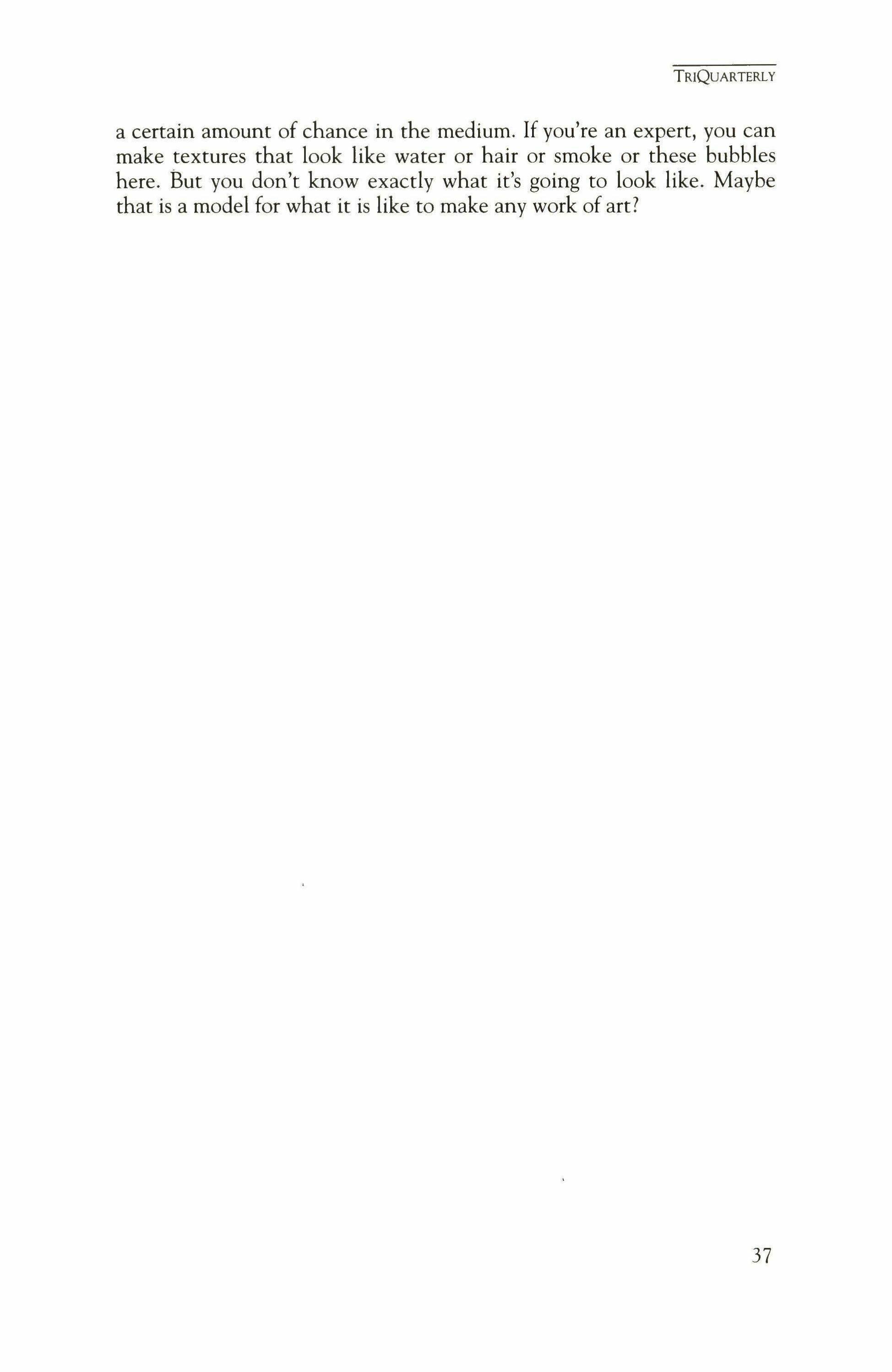
a certain amount of chance in the medium. If you're an expert, you can make textures that look like water or hair or smoke or these bubbles here. But you don't know exactly what it's going to look like. Maybe that is a model for what it is like to make any work of art?
TRIQUARTERLY
37
Four Poems
Alan Shapiro
The Basement

How many years, decades, since I'd even thought of Gary when my mother told me on the phone the other night, in passing, that he'd been thrown in jail for kiting checks, and that this on top of all the other heartache Gary's mother had from him, the busted marriage, the drug problems, had sent her to an early grave. But it wasn't Gary's mother I thought of as I listened but the basement where we spent many afternoons one summer, the two of us and Helen, Helen the only German Jew I knew, who'd come after the war from someplace else, not Germany (though no one told me where), to live with them, to be his nanny. He called her zumzing because she hardly spoke except to ask, every so often, can I get you zumzing, Gary, you vant zumzing now? and whether he wanted anything or not he'd answer, get me zumzing Zumzing, and laugh, so I'd laugh too. Helen, though, unmindful of the teasing, or inured to it, which made it easier to do, would hover over Gary, her readiness to please him unassailable, yet strangely dour, joyless, like someone on indefinite probation for some crime nothing she could ever do could quite make up for.
Whenever he'd ask, she'd get the bottle Gary said wasn't a bottle but a big cigar. Though eight years old, he'd nuzzle against her, "smoking," gazing at nothing, Helen stroking his hair, reminding him, Vee don't tell Mama, dis just our secret, vee don't tell your mama now,
TRIQUARTERLY
38
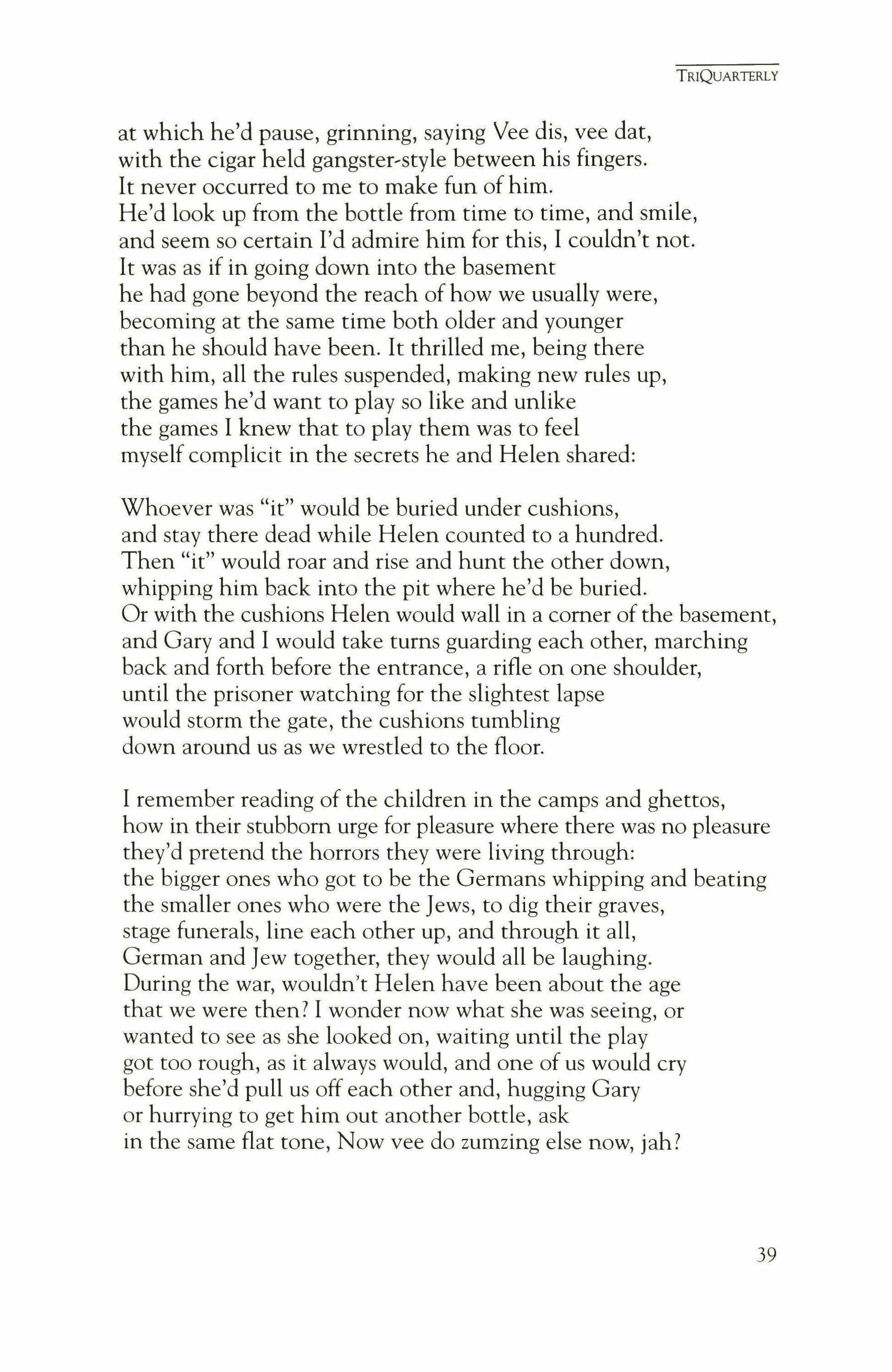
at which he'd pause, grinning, saying Vee dis, vee dat, with the cigar held gangster-style between his fingers. It never occurred to me to make fun of him. He'd look up from the bottle from time to time, and smile, and seem so certain I'd admire him for this, I couldn't not. It was as if in going down into the basement he had gone beyond the reach of how we usually were, becoming at the same time both older and younger than he should have been. It thrilled me, being there with him, all the rules suspended, making new rules up, the games he'd want to play so like and unlike the games I knew that to play them was to feel myselfcomplicit in the secrets he and Helen shared:
Whoever was "it" would be buried under cushions, and stay there dead while Helen counted to a hundred. Then "it" would roar and rise and hunt the other down, whipping him back into the pit where he'd be buried. Or with the cushions Helen would wall in a comer of the basement, and Gary and I would take turns guarding each other, marching back and forth before the entrance, a rifle on one shoulder, until the prisoner watching for the slightest lapse would storm the gate, the cushions tumbling down around us as we wrestled to the floor.
I remember reading of the children in the camps and ghettos, how in their stubborn urge for pleasure where there was no pleasure they'd pretend the horrors they were living through: the bigger ones who got to be the Germans whipping and beating the smaller ones who were the Jews, to dig their graves, stage funerals, line each other up, and through it all, German and Jew together, they would all be laughing. During the war, wouldn't Helen have been about the age that we were then? I wonder now what she was seeing, or wanted to see as she looked on, waiting until the play got too rough, as it always would, and one of us would cry before she'd pull us off each other and, hugging Gary or hurrying to get him out another bottle, ask in the same flat tone, Now vee do zumzing else now, jah?
TRIQUARTERLY
39

My mother didn't know where Helen was now, or whether she went on living with the family after Gary dropped out of high school and moved away. She said it drove his mother crazy, how she spoiled him rotten. Did Helen mourn the trouble he got into? Or had she by the time we knew her had her fill of mourning, her heart by then concerned with other things, things he unwittingly provided, Gary never more enslaved than in the license she made him think was his? Could he have been her plaything too, as much as she was his, her puppet of a secret brooding on what couldn't be forgotten, all of her life from the war on (and she was just a girl then) a mere reprise, a deafening echo chamber?
And even now
I wonder who's obliging who when Helenafter all these years of never being thought of, lost among the minor people of my personal historyrises from the dead through small talk to become my personal link to what I can't imagine.
It almost seems I have my way with her again, seeing her there in this last scene, down on her knees surrounded by a chaos of innumerable pieces of the trainset she's saying is like the one she played with with her papa long ago, an aura of dread and urgency about her as she hurries to put it all together, working to keep us down there with her a little longer, to keep us from going anywhere she wouldn't follow (did I ever see her leave the house?): all over the basement, the tracks in curves and straightaways, the signs for Stuttgart, Munchen, Wiirzburg, Berlin, the flashing signal lights, the flagman in the switching yard, black-coated porter at the station, and beyond it shops, cafes, and houses, a church and schoolthe flanged wheels fitted to the tiny rails, and Gary settled in her lap now, his hands on the black box easing the levers as she whispers dis one, jah, now dat, and the cars click forward through that miniature world. Soon, though, bored, he throws the black box down, and he and I rampage over everything, stomping and pulling it all apart while Helen laughs (the only time I ever heard her laugh).
TRIQUARTERLY
40
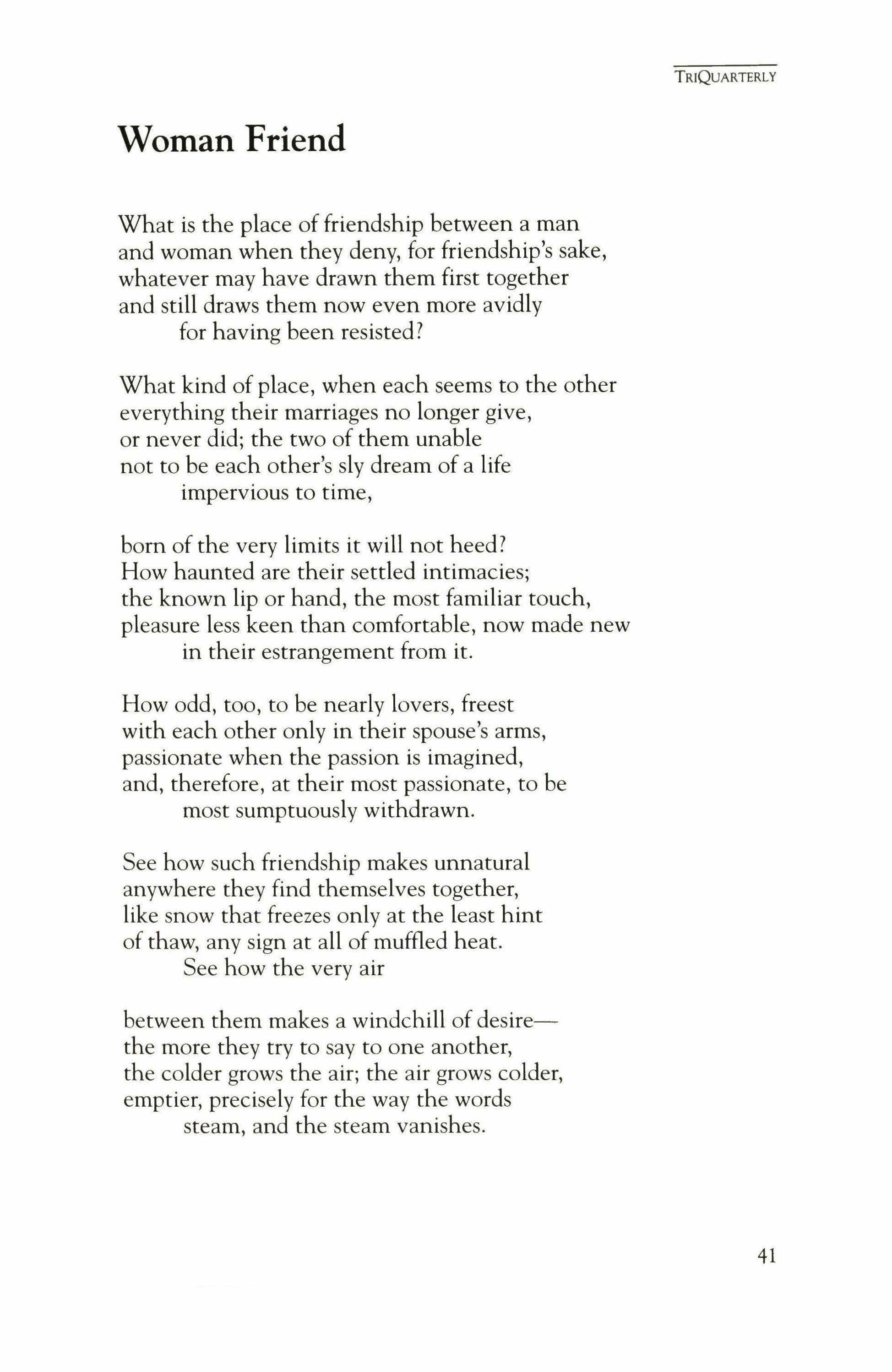
Woman Friend
What is the place of friendship between a man and woman when they deny, for friendship's sake, whatever may have drawn them first together and still draws them now even more avidly for having been resisted?
What kind of place, when each seems to the other everything their marriages no longer give, or never did; the two of them unable not to be each other's sly dream of a life impervious to time, born of the very limits it will not heed? How haunted are their settled intimacies; the known lip or hand, the most familiar touch, pleasure less keen than comfortable, now made new in their estrangement from it.
How odd, too, to be nearly lovers, freest with each other only in their spouse's arms, passionate when the passion is imagined, and, therefore, at their most passionate, to be most sumptuously withdrawn.
See how such friendship makes unnatural anywhere they find themselves together, like snow that freezes only at the least hint of thaw, any sign at all of muffled heat. See how the very air
between them makes a windchill of desirethe more they try to say to one another, the colder grows the air; the air grows colder, emptier, precisely for the way the words steam, and the steam vanishes.
TRIQUARTERLY 41

Mother: Sunbathing
While you're at it, do my legs too, and your friend rose from the chaise beside yours, tucking and jiggling the unstrapped black bathing suit still farther up over her heavy bust so she could lean down safely, spread the white cream across your back, your shoulders, kneading it gently down all over you until your skin shone in the drowsy wake of where her hands were drifting.
You were younger than I am now, and I was how old, five? six?, dawdling near you though you had told me to go play already, dawdling just far enough away to see you through the eddying of waists and knees, flip-flops, hips and hands, to hear your voice among the surf of voices, made strange now by that other woman's hands:
your voice no longer skewed, divided, craving what it said it hadthe "stunning" husband, the "such wonderful" kids, the too'radiant dream the words made from which the tone was always waking, angry in praise, bitter in pleasure, there and not there; to make my listening, even when spoken to, an overhearing of an argument I wasn't meant to follow, my anxious legacy.
Now, though, you spoke grunts, mewlings, frank creaturely oohs in answer
TRIQUARTERLY
42

to the hands that slid down one and then another leg and calf and went on rubbing long after there was nothing left to rub.
Now listening, too, was so much having that I could move back up the beach to where your voice was only half yours, half the water's, then entirely the water's, and I could now step toward you and believe the glittering wide belly of the sea itself was pleasure, and that your voice rose only out of pleasure to my ear.
TRIQUARTERLY
43
Single Mother

1
I can recognize the tiny subterfuge: how the mother, giving her child exactly what he's asked for, has escaped him without him knowing that she has: higher, he said, higher, until she hardly has to push the swing now and can safely close her eyes, and doze, and for a moment not be anybody's mother.
The price of that leisure, though, is to be startled when he cries, to feel ashamed, too, by the sweetness the cry disperses. So that she seems almost to wish her voice, full of more solace than he cries for now, could deepen his distress and so intensify for him the pleasure of her taking it away.
2
Most mornings he's up at five, she says. By nine, bored, cranky, he wants to go somewhere but won't let her dress him, wants to eat but not anything she offers. Then he starts crying for daddy, he wants his daddy. That's when the weariness turns suddenly to rage, her body one white knuckle of rage, and she has to get him quick out of the house, somewhere where just the presence of another mother will protect them both from what she otherwise might do.
3
His first and last assumption. His given, as enveloping as air, and like air to his breathing, unrecognized as needed, being always there. Moody weather he wakes up to, atmosphere perpetually charged
TRIQUARTERLY
44
with emerging and dispersing fronts and pressures that are themselves the indecipherable effects
of earlier weather in another sky he can't see yet is helpless not to read for any omen of himself.
Beyond which only the outer space of not her goes on and on. Everywhere beyond her what her distractions, daydreams, brief luxuries of blank attention hint at, and make him have to cry
sometimes to call her back from; what his dark bedroom hints at when she leaves it, too tired
not to, though he calls and cries, too obviously glad, yes glad for a short while at least,
to leave him finally in the nowhere of her hurrying away, fleeing momentarily away
for once to where no gravity at all can keep her from forgetting her relief can only mean his terror.

The moment my son and I arrived she started talking, at swing first, then at sandbox, while the boys played, talking incessantly in a low drawl of exhaustion one could easily mistake for a drugged calm.
4
TRIQUARTERLY 45

As if her voice just couldn't wake, it seemed to sleepwalk through a single sentence, incontinent with revelation, about how they have no choice now but to put up living with her mother till she can find a job, because her ex-husband, among other things, couldn't stand the mess the boy made when he ate, and how his tantrums scare her, he can really lose it, especially in public, which is so humiliating, what are you supposed to do in front of all those people? and does mine love Bambi as much as hers?
and did I ever notice that the mother's always killed off in those movies, or locked up, or somehow gotten out of the way before the child does anything at all remarkable to show he's worthy of growing up into a prince, or star, or daddy? Despite the drab sweatsuit, the squall of unkempt hair, the deep fatigue around the eyes and mouth, there was about her a stubborn loveliness I can't pretend
I didn't notice whenever she would, yawning, arch her torso toward me just a little, or when her long hands seemed to parry, in slow arabesques and curlicues, the thrusts of what she couldn't help herself from saying.
Wouldn't it be less than honest not to say I listened, or appeared to listen, not out of sympathy alone?, that listening was the coin I paid to take her in more freely, to revel in my own way in the little resonance of possibility our being there with children made it completely safe for me to feel?
TRIQUARTERLY
46

And if she suspected this and went on talking to me anyway, as if I were the dreamed-of mother
or friend whose ear she always had the pleasure ofso desperate to be listened to, to be coddled with listening,
that she'd indulge my eye, so she could have herself this ersatz intimacy-wasn't it, all in all, a fair transaction?
Not children anymore, don't we all use each other, pay each other one way or another for the pleasures that, however briefly, bring us to the child's exhilaration that the mother can't not hear or come?
The way she heard when the boy called and she immediately hurried over to see what it was he wanted.
And the way, too, suddenly like a girl, she swung herself as if no weight restrained her onto the monkey bar, to hang there upside down above him, laughing, swinging, holding her hands out so her fingertips
would graze his when he leaped up to grab her, leaped and missed. And even though he started to cry,
though he was crying now, she howled like a monkey for a moment longer, just for the pleasure of it.
5
The nightlight diffuses paler darkness through the dark around him, soothing for now, from his features, all fevers of appetite; all spasms of raw will eased, effaced in such excess of peace there's little left of him but dream sounds, mews, sighs, vexing the silence so faintly they seem to deepen it.
TRIQUARTERLY
47

Here, at least, is patience, inexhaustible so long as there's nothing else to worry over but the covers she has to put back gently again, and again, across him when he turns or shifts.
Here now his breathing is the tide she drifts on towards sleep at last, but slowly, not yielding yet, though sleep is all she's yearned for all day long. She holds it off, delays it, to prolong this present moment of a mothering that isn't withering her, or marring him.
TRIQUARTERLY
48
Three Poems
Tom Sleigh

Child's Drawing: "Boy Holding a Ball at a Funeral"
Jewish Museum in Prague
Next to crazily leaning slabs of slate, parents and children
Heaped in the same grave, the heaved ground
Leads through the cemetery gate to the flourishing Noon's dark door: Behind cool museum glass,
Hair spiking into flame, the spider-legged figure
Of a man in uniform lounges in the sun
That lowers in a corner of the fading paper. Gone apoplectic, a child's grin hangs in
An oval face that balloons so large it
Dwarfs the guard and the buildings scribbled over
With barbwire, and seems in its roundness almost to explode
From the paper's flatness: That grinning
Amplitude and fever-eyed joy make
The light sharpen: Through shadows on the glass
The man's blurred head, elongated
Like a tear, weeps into his uniform's
Tight black collar, the eyeless smear
Of his face oblivious to the sharp angles
Of a coffin floating on four boys' shoulders
Past long-bearded fathers and shawled mothers
TRIQUARTERLY
49

Staring bleakly on A child who lived And died before I was born was asked By his teacher to draw what he had seenHis struggle with the pencil still visible
In the face he sketched and erased inside The wildly scribbled ball which the boy In the picture hugs to his chest-as if It were his childhood writhing like an orphaned
Animal in his arms, or the shadowy Restless oval of his soul straining to escape
The stares of the living, the smudged gaze Of the man in uniform: His soul unappeasable,
Unappeasable that grin carving like a sickle Through the dim light in the room: Fiercely Unforgiving, it glints out of reach Of the dead and the soon to be dying.
TRIQUARTERLY
50
The Word

Like a ruin living in its own destruction
-Or so I thought until I really looked at him, Newspaper spilling from his overcoat bulging
From sweatstiff clothes he sleeps and eats in, Driven by cold down these cliff-edge stairways Blazing night-long underground: From his bed
Of cardboard and newspaper, his cracked pink palm Nagging for a quarter, his infinitely penetrable
Flesh exudes a stink like Jonah in the whale,
The subway's clammy dark smelling of naphtha, oil, While its flesh of l-beams, girders, concrete
Flakes off and blackens beneath his fingernails
-But a ruin? He didn't seem like a ruin
That time I heard him shouting, the word booming Back from the blackness of the tunnel while his eyes
Watered from the fumes of his own sulfurous ranting, You you you you! He rose from heaped newspaper, The garbage bag he stuffed with newspaper and bound
Round with rags to make a turban quivering
As his body shook, his jaws working, You you you you! hurled at each passerby:
Now he was staggering to his feet, his fury Wired to that single word buzzing and stinging
About our heads as he screeched at us gawking
By the yellow line: He came so close
I saw his breath steaming, his eyes rolling up Like someone in a fit-. All right then,
TRIQUARTERLY 51
TRIQUARTERLY
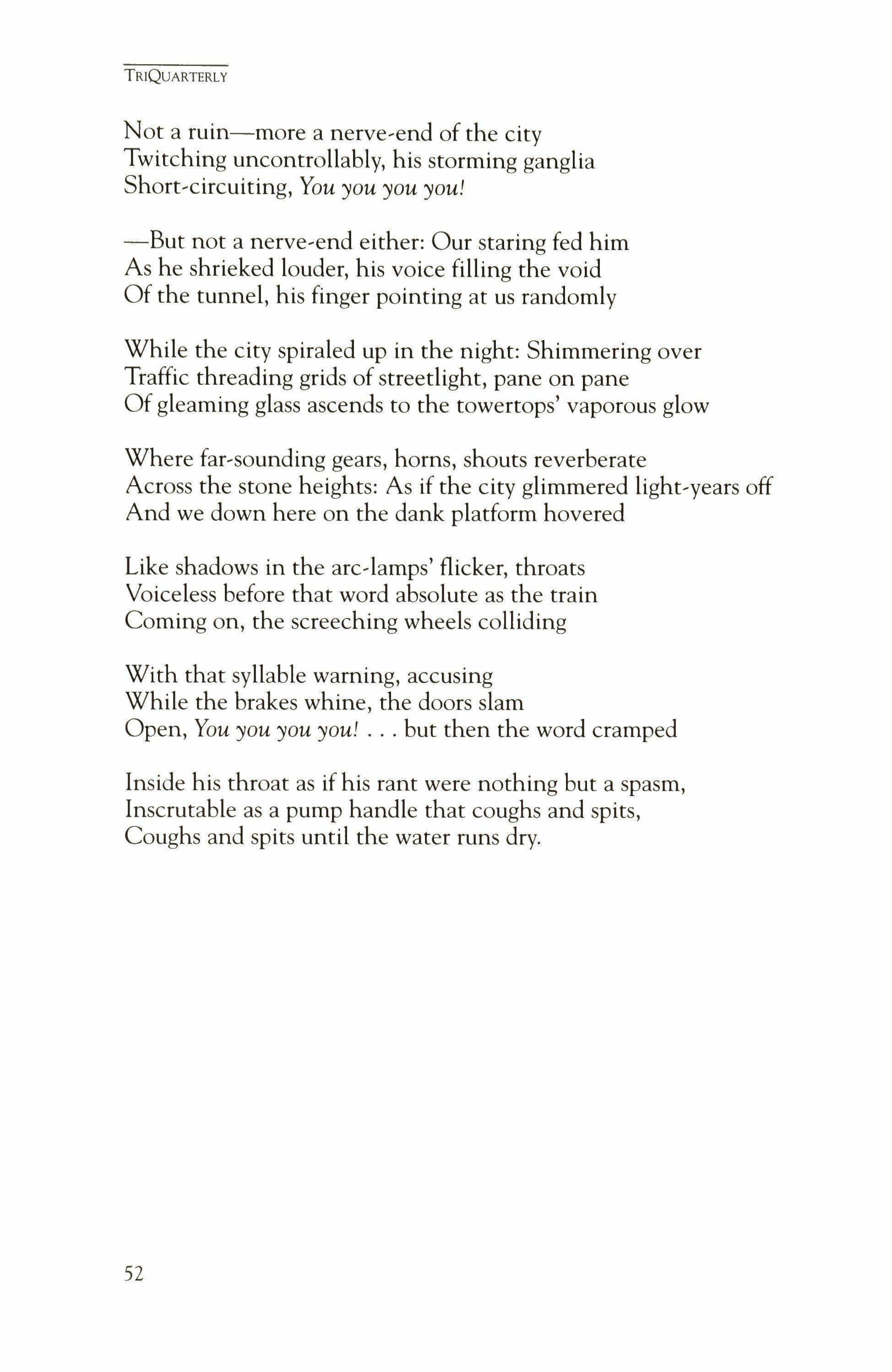
Not a ruin-more a nerve-end of the city
Twitching uncontrollably, his storming ganglia
Short-circuiting, You you you you!
-But not a nerve-end either: Our staring fed him
As he shrieked louder, his voice filling the void Of the tunnel, his finger pointing at us randomly
While the city spiraled up in the night: Shimmering over Traffic threading grids of streetlight, pane on pane Of gleaming glass ascends to the towertops' vaporous glow
Where far-sounding gears, horns, shouts reverberate
Across the stone heights: As if the city glimmered light-years off And we down here on the dank platform hovered
Like shadows in the arc' lamps' flicker, throats
Voiceless before that word absolute as the train Coming on, the screeching wheels colliding
With that syllable warning, accusing While the brakes whine, the doors slam Open, You you you you! but then the word cramped
Inside his throat as if his rant were nothing but a spasm, Inscrutable as a pump handle that coughs and spits, Coughs and spits until the water runs dry.
52
The Tank
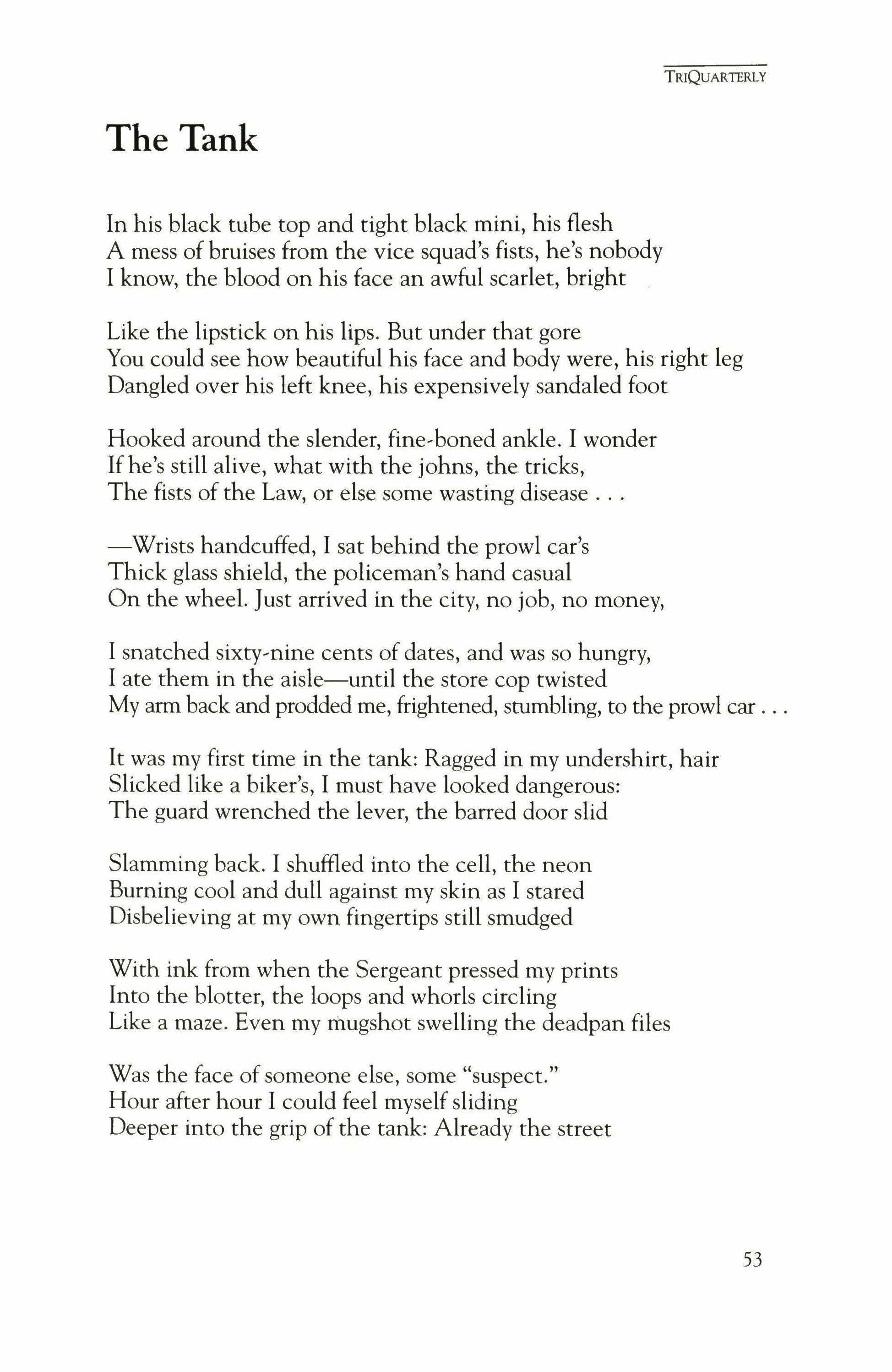
In his black tube top and tight black mini, his flesh A mess of bruises from the vice squad's fists, he's nobody I know, the blood on his face an awful scarlet, bright
Like the lipstick on his lips. But under that gore You could see how beautiful his face and body were, his right leg Dangled over his left knee, his expensively sandaled foot
Hooked around the slender, fine,boned ankle. I wonder If he's still alive, what with the johns, the tricks, The fists of the Law, or else some wasting disease
-Wrists handcuffed, I sat behind the prowl car's Thick glass shield, the policeman's hand casual On the wheel. Just arrived in the city, no job, no money,
I snatched sixty-nine cents of dates, and was so hungry, I ate them in the aisle-until the store cop twisted My arm back and prodded me, frightened, stumbling, to the prowl car
It was my first time in the tank: Ragged in my undershirt, hair Slicked like a biker's, I must have looked dangerous: The guard wrenched the lever, the barred door slid
Slamming back. I shuffled into the cell, the neon
Burning cool and dull against my skin as I stared Disbelieving at my own fingertips still smudged
With ink from when the Sergeant pressed my prints Into the blotter, the loops and whorls circling Like a maze. Even my mugshot swelling the deadpan files
Was the face of someone else, some "suspect." Hour after hour I could feel myselfsliding Deeper into the grip of the tank: Already the street
TRIQUARTERLY
53
TRIQUARTERLY

Had shrunk to the dim, thudding corridor
Prowled by the thicksoled shoes of the guards. As I blinked to stay awake, exhausted tears
Muddied my eyes until the bars seemed to Waver like threads in a veil weaving
Through moment after moment. Fighting down
My fear of being raped or beaten, I huddled
On the bench, the cell walls slashed
With graffiti, blistered an underwater green
But then, as if the late-night surge of the street
Penetrated the stolid granite, in the cell across from ours
I heard whistles and applause: The men around me
Flocked to the bars, their laughter and catcalls
Booming in my ears as they egged on his defiant limbs: Flaunting
His difference, his body swayed as he did a mock
Striptease for the guards in the control room, His lips pouting, his shoulders shaking to Invisible tom-toms while his hips, thrusting
And grinding in the guards' faces, rocked the tank
On its stone moorings: I rose to join the others, my hands
Gripping the bars while the man next to me chanted,
"Baby, baby, shake that thing!"-his eyes
Eager for what the guards would do: His dancing
Slowed to his fingers flirting with the zipper
Of his mini, voluptuously unzipping as he flashed
A grin at the "goon squad," his eyes observant, hard: I wanted to think that he was sizing them up,
Almost scornful of what he'd made them do: In heavy boots
And gray uniforms, they pushed through the ring of prisoners, The straps of nightsticks wrapped around their wrists:
54

But probably he was scared, knowing he'd gone too far: Would they haul him to the hole, beating his kidneys
So they wouldn't leave bruises, the way people
On the street said "the pigs" did? But when the nightsticks Raised, he stood still, his padded tube top heaving, His man's legs suddenly strange beneath the mini.
Tensed in the neon, I gripped the bars tighter as they Shoved him in a corner, his body walled behind theirs, The long handles sweeping up into the light:
-But then, with sudden languor, slowly the clubs
Lowered, he didn't go down before our inert stares: Shrugging Him off, they turned, pushing through the prisoners,
Leaving him in the wake of what hadn't happened, but could The next moment or the next He stood alone in the corner, the neon Masking his face. No one came near him, even to whisper
"Right on!" I hovered at the bars, the poised nightsticks Lingering in my head as the guards filed out, The barred door shooting closed in the steel groove.
TRIQUARTERLY
55
From "Give: A Sequence, Reimagining Daphne and Apollo"
Alice Fulton Take: A Roman Wedding
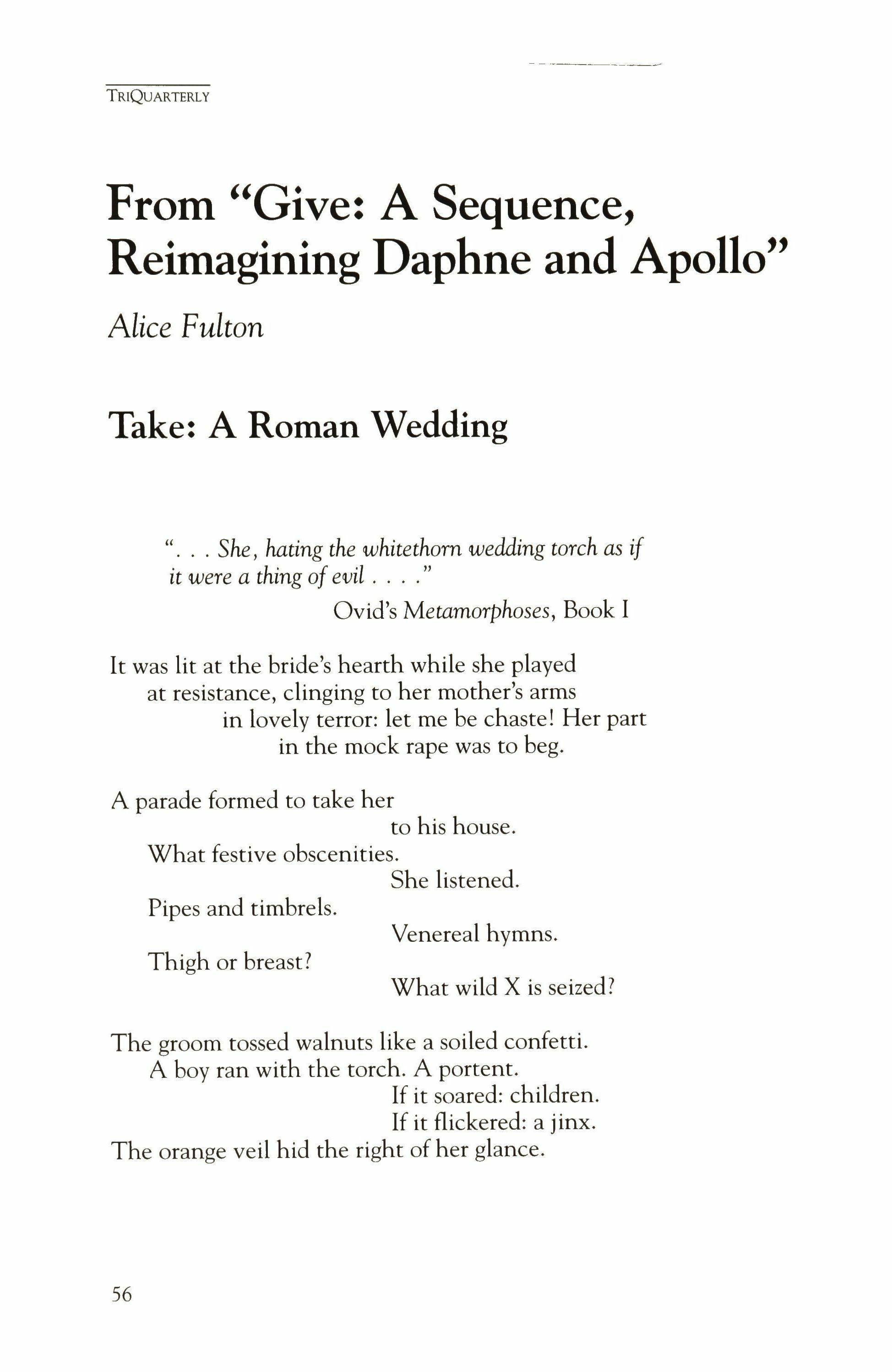
". She, hating the whitethorn wedding torch as if it were a thing ofevil ."
Ovid's Metamorphoses, Book I
It was lit at the bride's hearth while she played at resistance, clinging to her mother's arms in lovely terror: let me be chaste! Her part in the mock rape was to beg.
A parade formed to take her to his house.
What festive obscenities. She listened. Pipes and timbrels.
Venereal hymns. Thigh or breast?
What wild X is seized?
The groom tossed walnuts like a soiled confetti. A boy ran with the torch. A portent. If it soared: children. If it flickered: a jinx. The orange veil hid the right of her glance.
TRIQUARTERLY
56
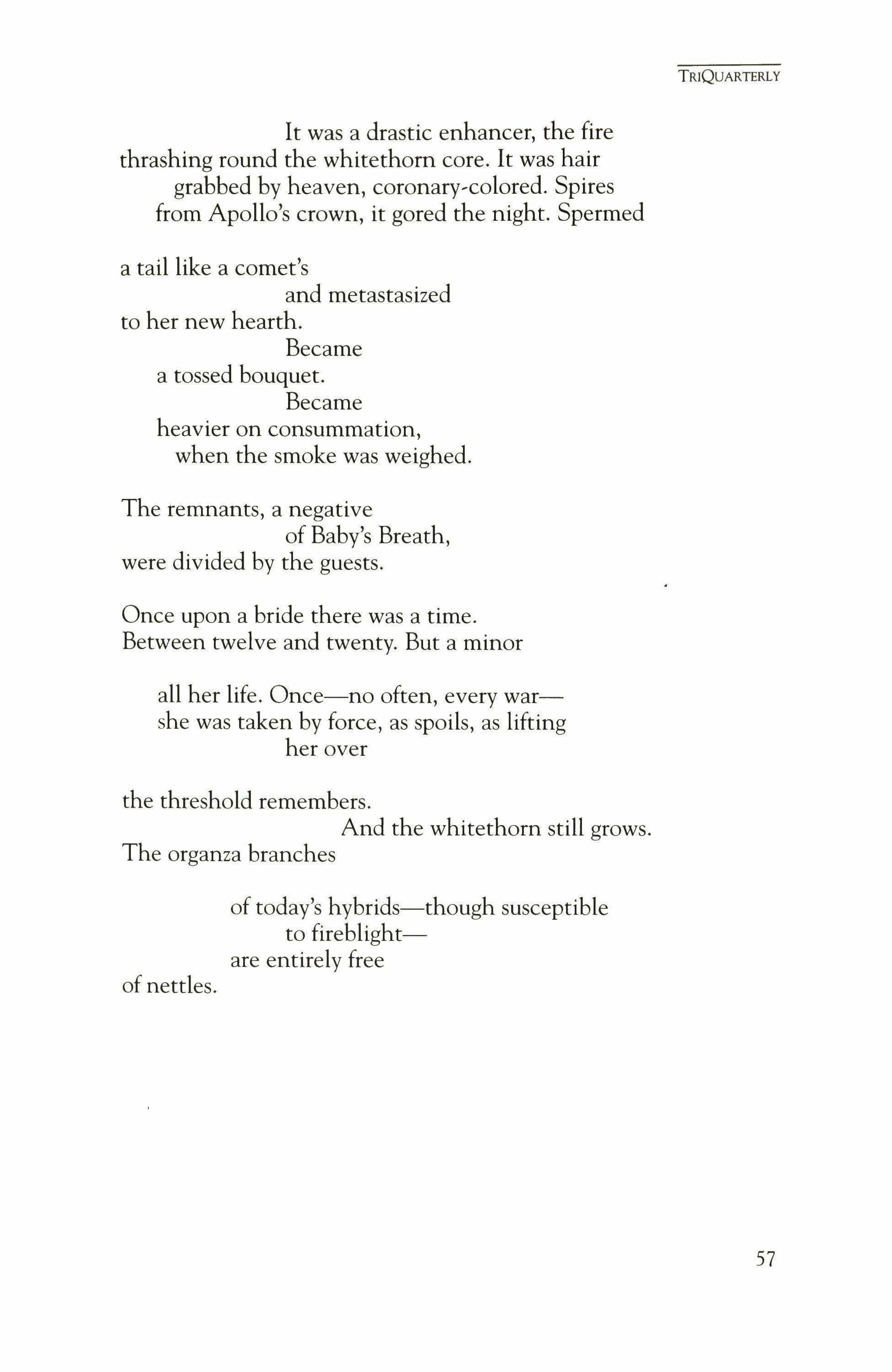
It was a drastic enhancer, the fire thrashing round the whitethorn core. It was hair grabbed by heaven, coronary,colored. Spires from Apollo's crown, it gored the night. Spermed a taillike a comet's and metastasized to her new hearth. Became a tossed bouquet. Became heavier on consummation, when the smoke was weighed.
The remnants, a negative of Baby's Breath, were divided by the guests.
Once upon a bride there was a time. Between twelve and twenty. But a minor all her life. Once-no often, every warshe was taken by force, as spoils, as lifting her over the threshold remembers.
And the whitethorn still grows. The organza branches of today's hybrids-though susceptible to fireblightare entirely free of nettles.
TRIQUARTERLY 57

Turn: A Version (Tree)
She'll get out of this one somehow. Someday she'll break our engagement with a wraparound roll-off or axle full twist dismount, followed by a blast of wind that puts an end to this grotesque togetherness. "The suckers love a weird wedding." That's what her father said when she called on him for help. Forget 10 and Arachne. He was thinking Teenage Mutant Ninja Turtles. Roger Rabbit, Mr. Ed. People get a kick out of ambivalent betrothals and collisions full of give. Flowers that remodel themselves to look like bees are nice, but the scientist whose atoms get comingled with a fly's might be my favorite. "Help me! Help me!"
1 can identify.
Yes, it tamed her, being changed into a tree, but consider what went on in me. 1 had a moment's prodrome, the premonition before seizure or disease.
1 heard voices-"Hi, I'll be your server for tonight" and "Can 1 see your ID?"
Then in a migraine pink epiphany, 1 knew 1 was a tree. "It" turned to "me." As Daphne sank, ensorcelled by my Thorazine hush, 1 heard the whitewater rush of what I was. To you it might have seemed "the tree heaved upwards and twisted like a sleeper in brown sheets" but the process felt plaid to me, like madras bleeding-color stabbing color
TRIQUARTERLY
58
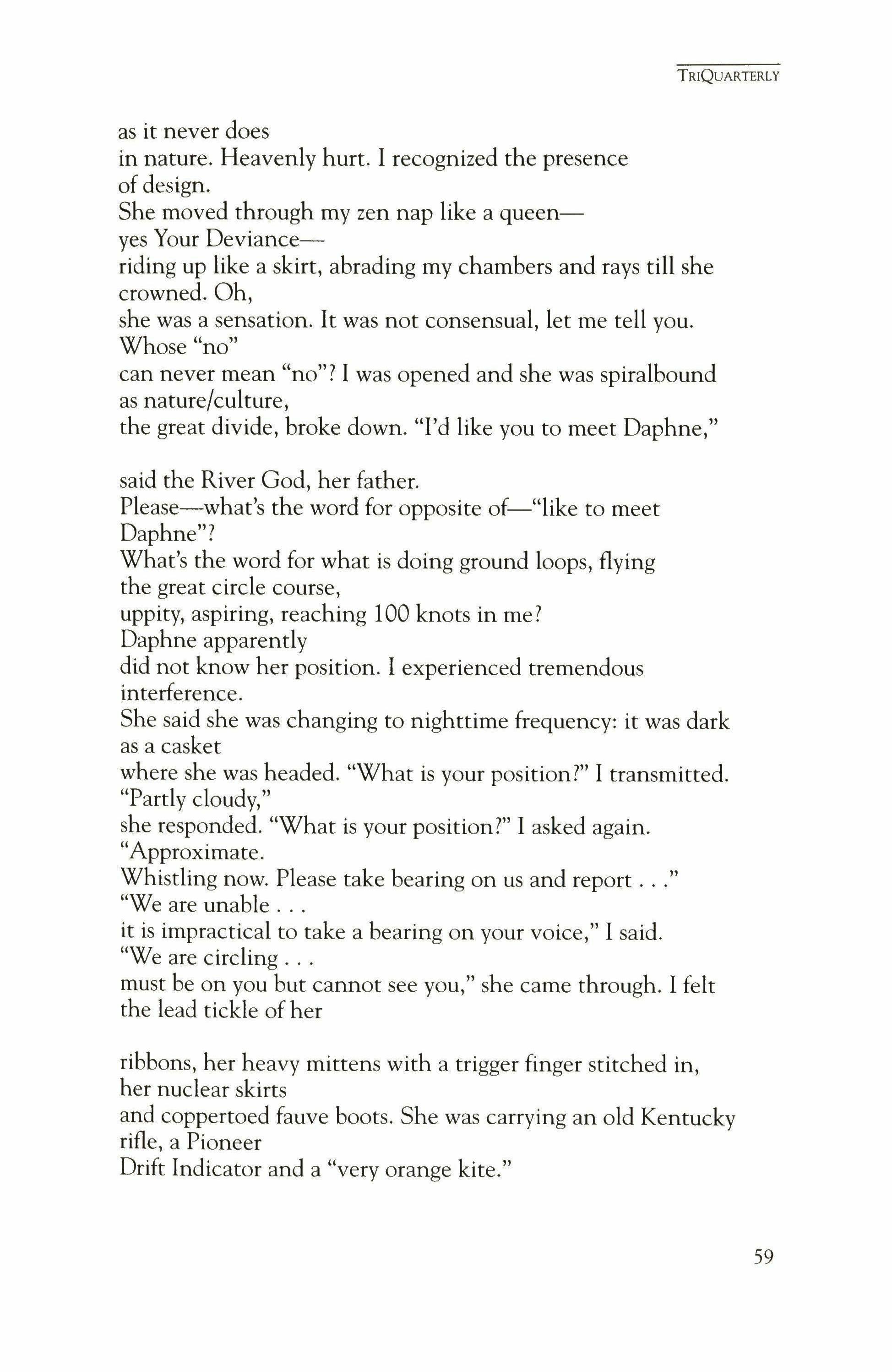
as it never does in nature. Heavenly hurt. I recognized the presence of design.
She moved through my zen nap like a queenyes Your Devianceriding up like a skirt, abrading my chambers and rays till she crowned. Oh, she was a sensation. It was not consensual, let me tell you. Whose "no" can never mean "no"? I was opened and she was spiralbound as nature/culture, the great divide, broke down. "I'd like you to meet Daphne,"
said the River God, her father. Please-what's the word for opposite of-"like to meet Daphne"?
What's the word for what is doing ground loops, flying the great circle course, uppity, aspiring, reaching 100 knots in me? Daphne apparently did not know her position. I experienced tremendous interference.
She said she was changing to nighttime frequency: it was dark as a casket where she was headed. "What is your position?" I transmitted. "Partly cloudy," she responded. "What is your position?" I asked again. Approximate.
Whistling now. Please take bearing on us and report "We are unable it is impractical to take a bearing on your voice," I said. "We are circling must be on you but cannot see you," she came through. I felt the lead tickle of her
ribbons, her heavy mittens with a trigger finger stitched in, her nuclear skirts and coppertoed fauve boots. She was carrying an old Kentucky rifle, a Pioneer Drift Indicator and a "very orange kite."
TRIQUARTERLY
59
TRIQUARTERLY

"I'm dead meat," she said, and then-"I am not friendly." That must be when I freaked. I drooled amber as trees do when they're hurt. I salivated resin blonde as baby shampoo, lactated the bud-gold of extra-virgin olive oil to trap the pathogen, Daphne, in a gown of sap for good.
What's the phrase that means how fast the growth layers spin? Velocity of domain.
I circled her in no time, head to toe, in a million wedding rings.
My first emotion happened to be revulsion: an ungreen, sour cramp as Daphne shrank-"oh baby," he kept saying-from Apollo's colonizing kiss.
Of course, he liked her better as a tree. "Girls are trees" was his belief. Mediated forms pleased him. "If you can't find a partner, use a wooden chair," he'd say. Well, every fetish tells a story. I felt her bows and powders, guns and arrows change to pom-poms, a cheerleader's pleated skirt.
"As she jumps up try to pull her to the sky and slightly forward," he coached.
"Every beat in a yell should have a motion. Give us an A, Give us a P! End the yell with a good freeze." Then her Power Mount Pike Through-she tried to get away-become a Shoulder Straddle to Cradleas "Nice Save!"-I caught her in her grave. I choked on volts of hairspray as-c-step-step-stepball-change-eshe became his pep club. Pure as a symbol,
60

toned, in racing trim, for her just standing still was grim. "Safe in your alabaster chambers," she'd sigh. I noticed she became more babyish as the centuries passed by. She couldn't walk, had no control over her body, and often babbled rather than talked: "Sis-boom-bah. Doobiedoobie-doo.
00 boy or 00 girl?" Frivolous. Gerber's gibberish. And I became her pacifier. She called me Mr. Crib.
Oblique grain develops after an injury-like Daphne teething on my rings. The growth tornados, polarity breaks and the grain departs from the ideal of straight-deviatingmaking waves that form diverse and beautiful chambers. People find it hard to say which way a tree is spiraling-whether dextral or sinistraland mistakes are often made. The Germans say with or against the sun,
the English, clockwise or counter, from the on-high perspective of the gods.
In America, the vortex is described by observers on the ground, with much twisting of wrists and waving of arms. But no one sees it from the standpoint of a tree. Oblique grain is useless for transmission poles, plywood, or veneers, and so a tree with it is thought abnormal: a "monstrositat." But spirality isn't a sickness or condition. Since it makes me less desirable to commerce and being harvested is not in my best interests, I consider it a plus.
TRIQUARTERLY
61
TRIQUARTERLY
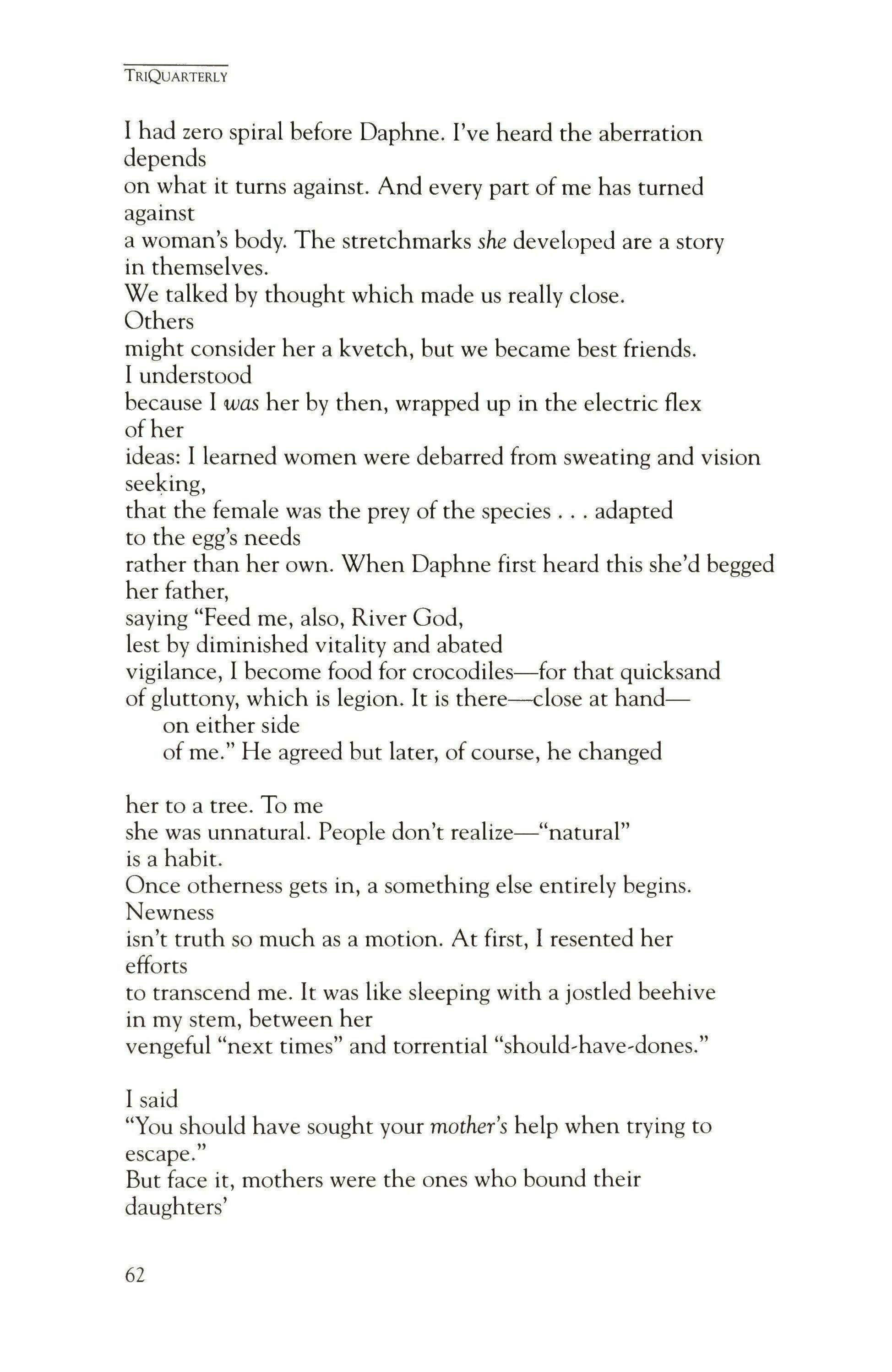
I had zero spiral before Daphne. I've heard the aberration depends on what it turns against. And every part of me has turned against a woman's body. The stretchmarks she developed are a story in themselves. We talked by thought which made us really close. Others might consider her a kvetch, but we became best friends. I understood because I was her by then, wrapped up in the electric flex of her ideas: I learned women were debarred from sweating and vision seeking, that the female was the prey of the species adapted to the egg's needs rather than her own. When Daphne first heard this she'd begged her father, saying "Feed me, also, River God, lest by diminished vitality and abated vigilance, I become food for crocodiles-for that quicksand of gluttony, which is legion. It is there-close at handon either side of me." He agreed but later, of course, he changed her to a tree. To me she was unnatural. People don't realize-"natural" is a habit. Once otherness gets in, a something else entirely begins. Newness isn't truth so much as a motion. At first, I resented her efforts to transcend me. It was like sleeping with a jostled beehive in my stem, between her vengeful "next times" and torrential "should-have-dories."
I said "You should have sought your mother's help when trying to escape." But face it, mothers were the ones who bound their daughters'
62
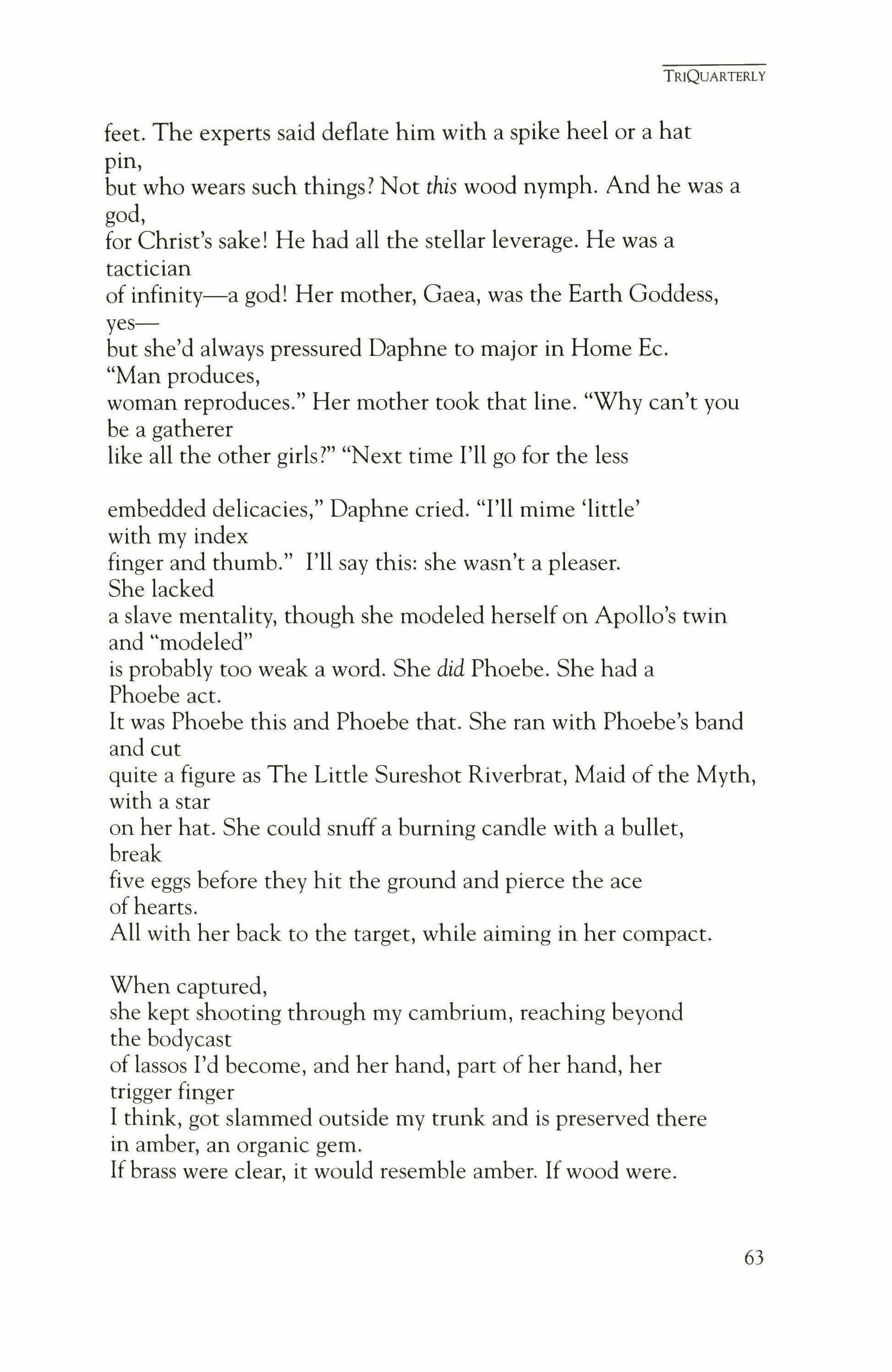
feet. The experts said deflate him with a spike heel or a hat pin, but who wears such things? Not this wood nymph. And he was a god, for Christ's sake! He had all the stellar leverage. He was a tactician of infinity-a god! Her mother, Gaea, was the Earth Goddess, yesbut she'd always pressured Daphne to major in Home Ec. "Man produces, woman reproduces." Her mother took that line. "Why can't you be a gatherer like all the other girls?" "Next time I'll go for the less embedded delicacies," Daphne cried. "I'll mime 'little' with my index finger and thumb." I'll say this: she wasn't a pleaser. She lacked a slave mentality, though she modeled herself on Apollo's twin and "modeled" is probably too weak a word. She did Phoebe. She had a Phoebe act.
It was Phoebe this and Phoebe that. She ran with Phoebe's band and cut quite a figure as The Little Sureshot Riverbrat, Maid of the Myth, with a star on her hat. She could snuff a burning candle with a bullet, break five eggs before they hit the ground and pierce the ace of hearts.
All with her back to the target, while aiming in her compact.
When captured, she kept shooting through my cambrium, reaching beyond the bodycast of lassos I'd become, and her hand, part of her hand, her trigger finger I think, got slammed outside my trunk and is preserved there in amber, an organic gem. If brass were clear, it would resemble amber. If wood were.
TRIQUARTERLY
63
TRIQUARTERLY
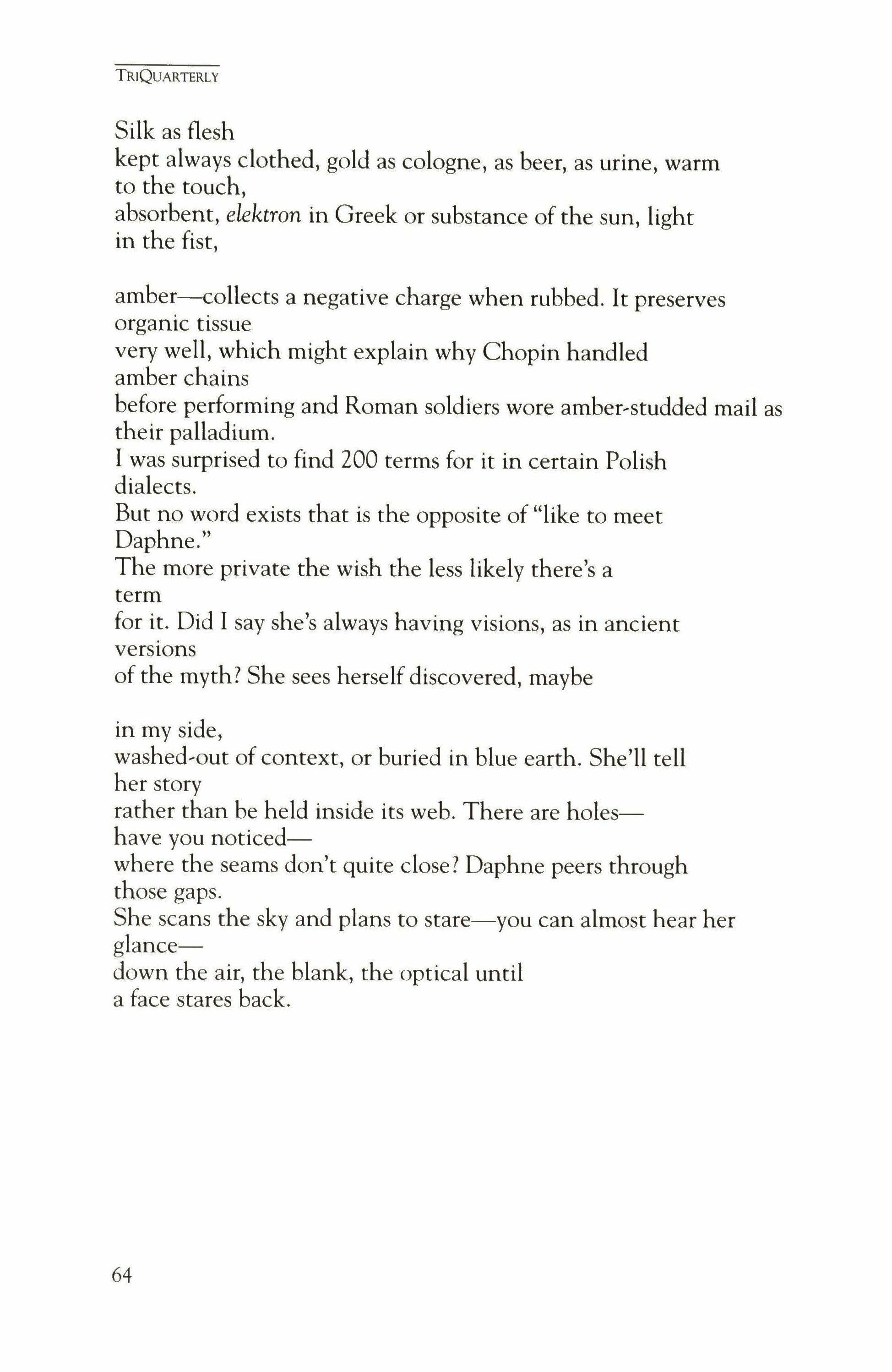
Silk as flesh
kept always clothed, gold as cologne, as beer, as urine, warm to the touch, absorbent, elektron in Greek or substance of the sun, light in the fist,
amber-collects a negative charge when rubbed. It preserves organic tissue very well, which might explain why Chopin handled amber chains before performing and Roman soldiers wore amber-studded mail as their palladium.
I was surprised to find 200 terms for it in certain Polish dialects.
But no word exists that is the opposite of "like to meet Daphne."
The more private the wish the less likely there's a term for it. Did I say she's always having visions, as in ancient versions of the myth? She sees herself discovered, maybe in my side, washed-out of context, or buried in blue earth. She'll tell her story rather than be held inside its web. There are holeshave you noticedwhere the seams don't quite close? Daphne peers through those gaps.
She scans the sky and plans to stare-you can almost hear her glancedown the air, the blank, the optical until a face stares back.
64
Stereo (Tree)
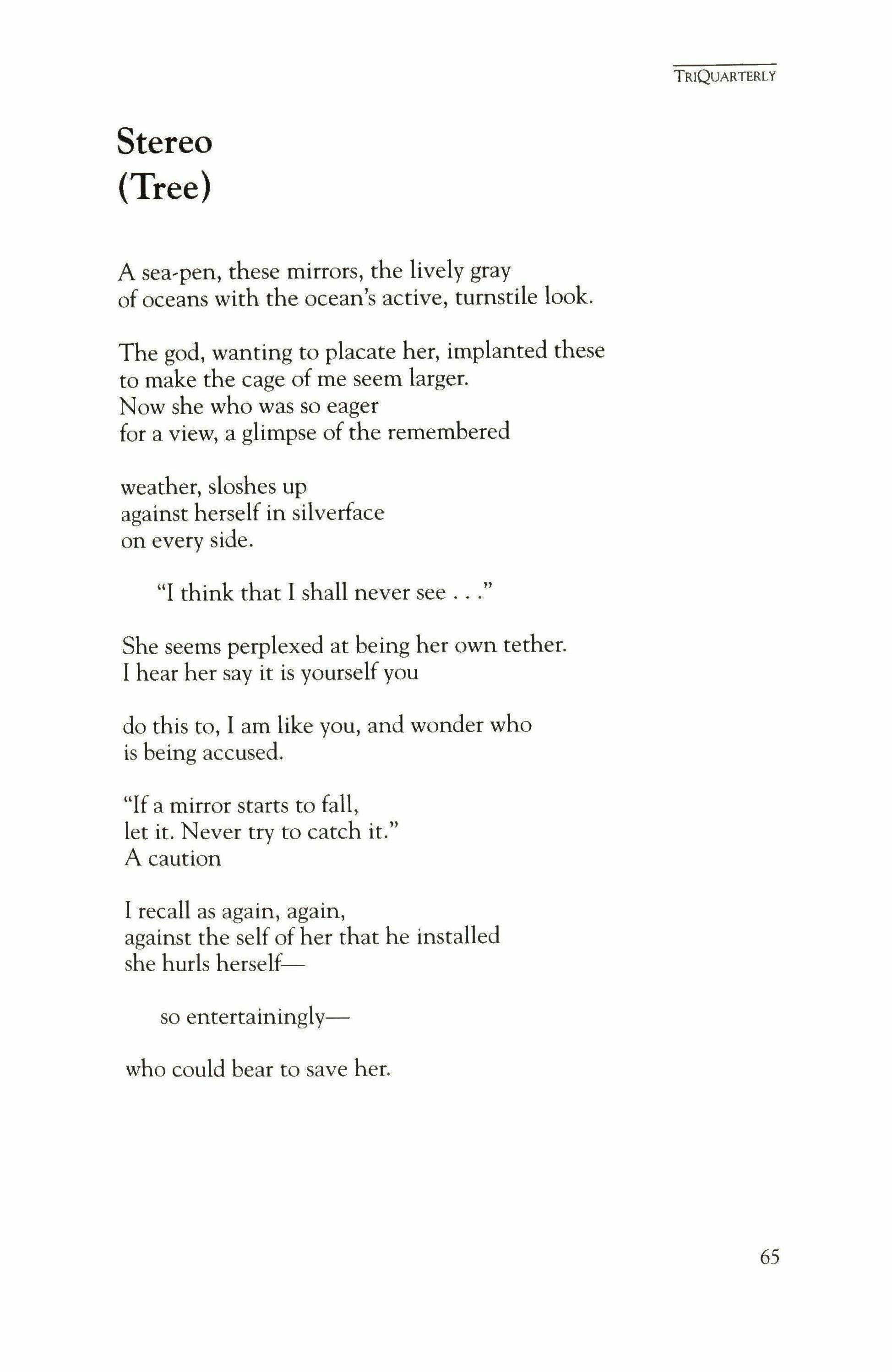
A sea-pen, these mirrors, the lively gray of oceans with the ocean's active, turnstile look.
The god, wanting to placate her, implanted these to make the cage of me seem larger. Now she who was so eager for a view, a glimpse of the remembered weather, sloshes up against herself in silverface on every side.
"I think that I shall never see
She seems perplexed at being her own tether. I hear her say it is yourself you do this to, I am like you, and wonder who is being accused.
"If a mirror starts to fall, let it. Never try to catch it."
A caution
I recall as again, again, against the self of her that he installed she hurls herselfso entertaininglywho could bear to save her.
TRIQUARTERLY 65
Notes
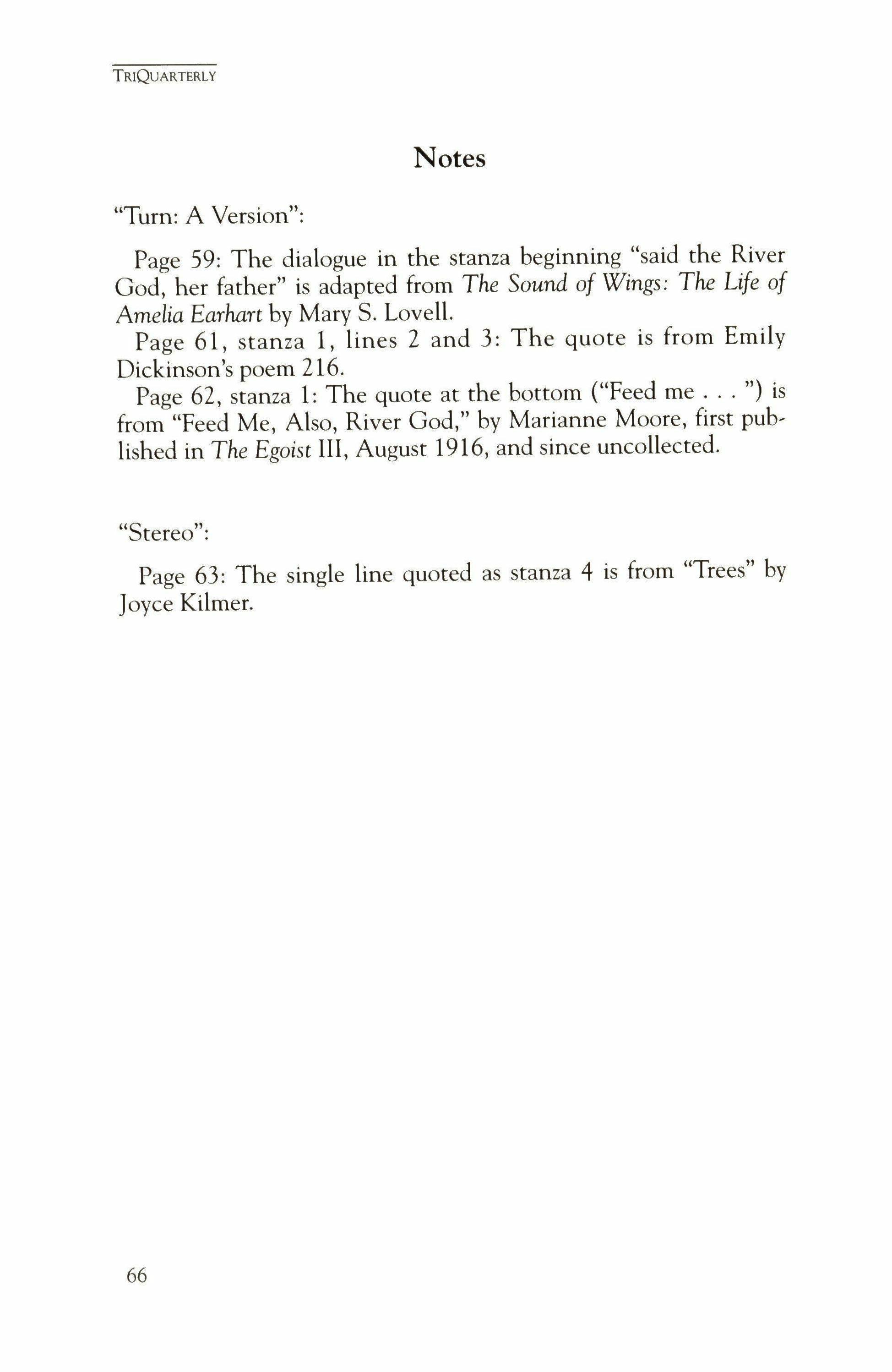
"Turn: A Version":
Page 59: The dialogue in the stanza beginning "said the River God, her father" is adapted from The Sound of Wings: The Life of Amelia Earhart by Mary S. Lovell.
Page 61, stanza 1, lines 2 and 3: The quote is from Emily Dickinson's poem 216.
Page 62, stanza 1: The quote at the bottom ("Feed me ") is from "Feed Me, Also, River God," by Marianne Moore, first published in The Egoist III, August 1916, and since uncollected.
"Stereo":
Page 63: The single line quoted as stanza 4 is from "Trees" by Joyce Kilmer.
TRIQUARTERLY
66
Fetish Loretta Collins

A shoe is valued highly if it is:
Placed in a man's hand.
Thrown into silhouette by a lamp.
Seen as an imprint in fresh snow. * * *
I dig my heels in when I walk. I grind my pumps down to the nails, can't wait to wear them out, just to get Woody to glue on taps. When I pick up those red spikes with vinyl bows, I'm going to put a whole lot of Estee Lauder on my feet.
See, at Woody's Shoe Repair, he gives your kid (whining mamma mamma, shrieking like a jungle bird while swinging on your purse) a dime for jawbreakers; he shows you the heel, shows how he worked it at the lathe. Then he kneels and slips your sweaty shoe right on your foot-says, "Only one way
TRIQUARTERLY 67
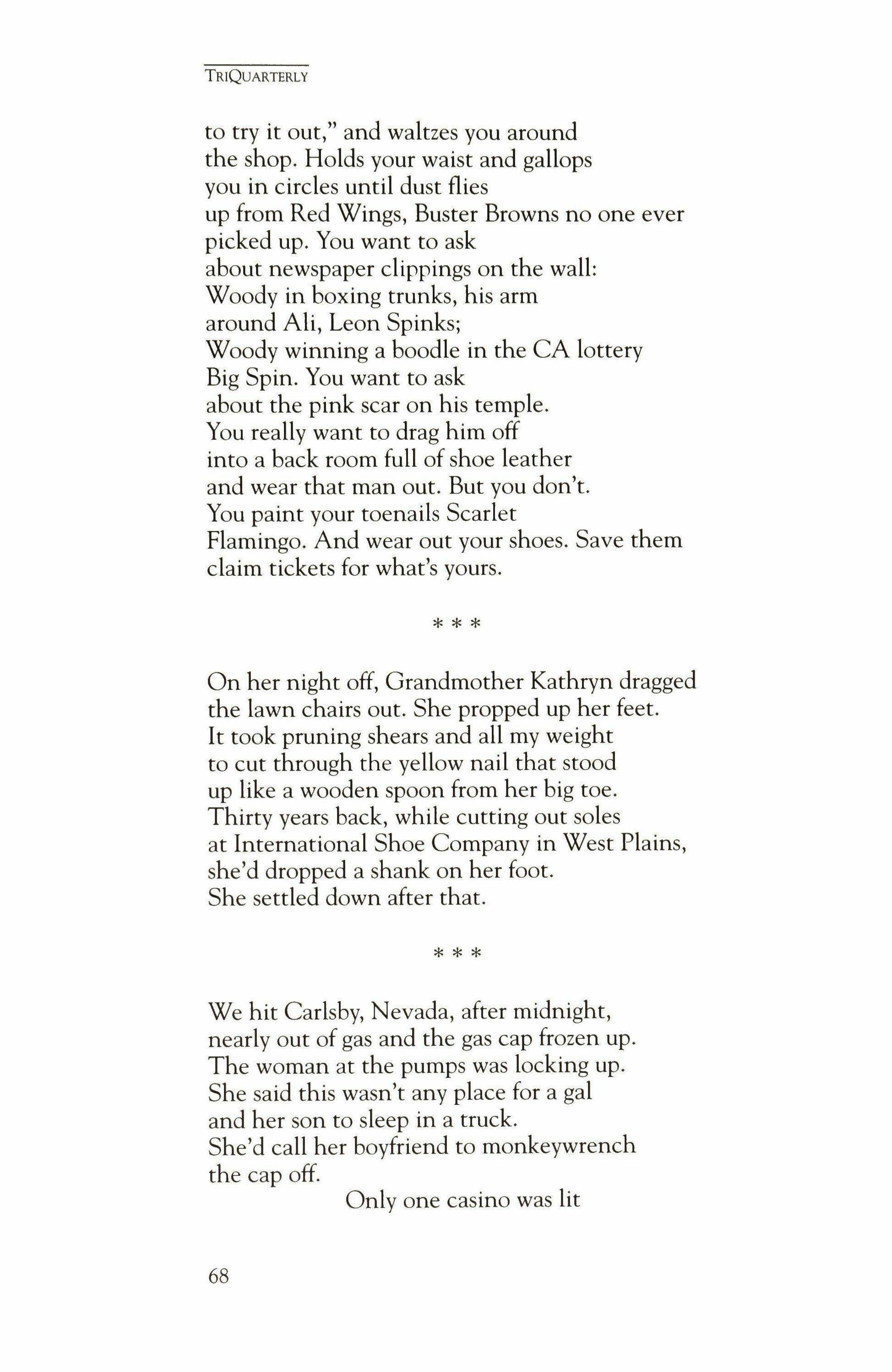
TRIQUARTERLY
to try it out," and waltzes you around the shop. Holds your waist and gallops you in circles until dust flies up from Red Wings, Buster Browns no one ever picked up. You want to ask about newspaper clippings on the wall: Woody in boxing trunks, his arm around Ali, Leon Spinks; Woody winning a boodle in the CA lottery Big Spin. You want to ask about the pink scar on his temple. You really want to drag him off into a back room full of shoe leather and wear that man out. But you don't. You paint your toenails Scarlet Flamingo. And wear out your shoes. Save them claim tickets for what's yours.
* * *
On her night off, Grandmother Kathryn dragged the lawn chairs out. She propped up her feet. It took pruning shears and all my weight to cut through the yellow nail that stood up like a wooden spoon from her big toe. Thirty years back, while cutting out soles at International Shoe Company in West Plains, she'd dropped a shank on her foot. She settled down after that.
* * *
We hit Carlsby, Nevada, after midnight, nearly out of gas and the gas cap frozen up. The woman at the pumps was locking up. She said this wasn't any place for a gal and her son to sleep in a truck. She'd call her boyfriend to monkeywrench the cap off.
Only one casino was lit
68
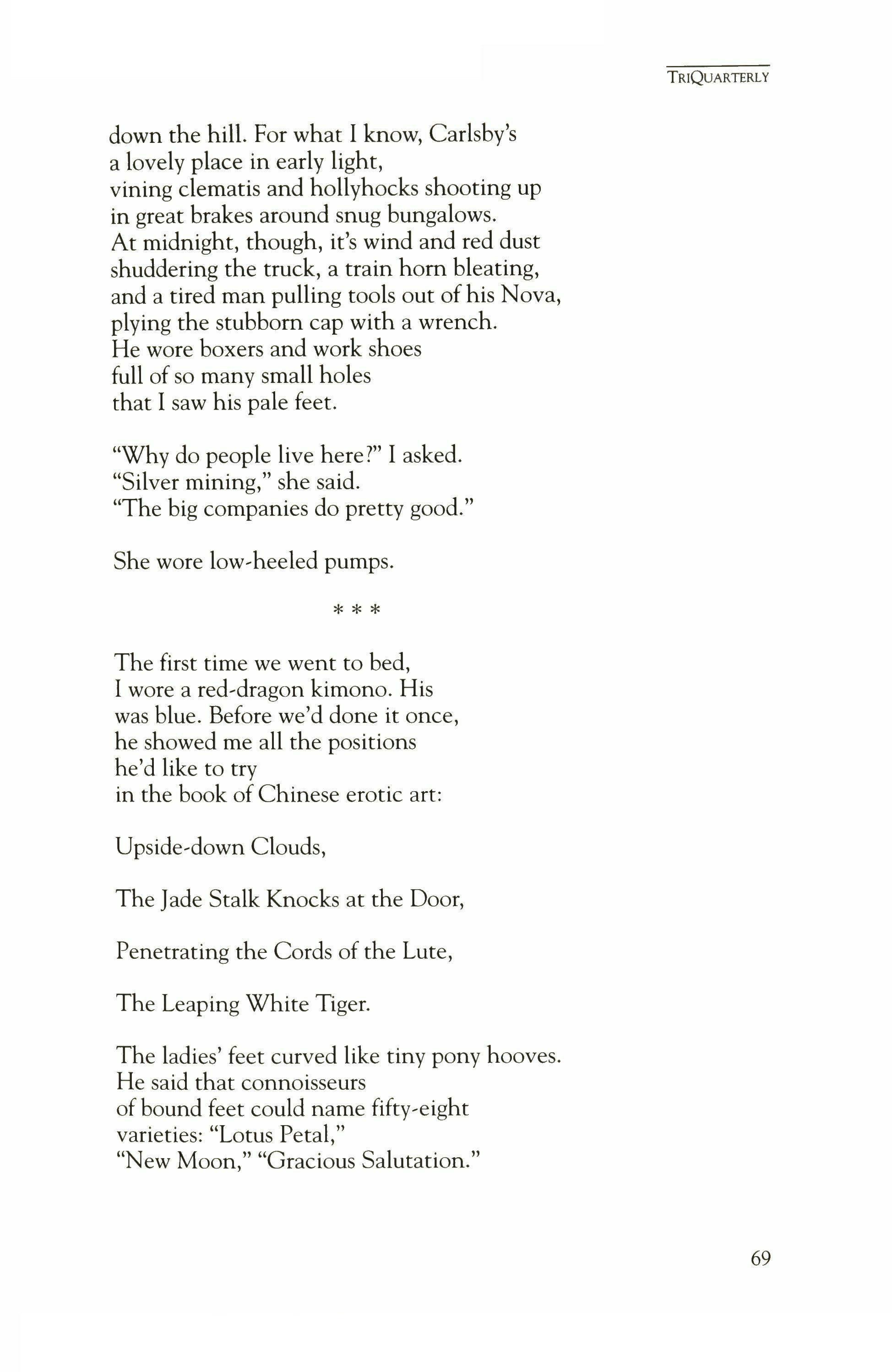
down the hill. For what I know, Carlsby's a lovely place in early light, vining clematis and hollyhocks shooting up in great brakes around snug bungalows. At midnight, though, it's wind and red dust shuddering the truck, a train horn bleating, and a tired man pulling tools out ofhis Nova, plying the stubborn cap with a wrench. He wore boxers and work shoes full of so many small holes that I saw his pale feet.
"Why do people live here?" I asked. "Silver mining," she said. "The big companies do pretty good."
She wore low-heeled pumps. *
The first time we went to bed, I wore a red-dragon kimono. His was blue. Before we'd done it once, he showed me all the positions he'd like to try in the book of Chinese erotic art:
Upside-down Clouds,
The Jade Stalk Knocks at the Door,
Penetrating the Cords of the Lute,
The Leaping White Tiger.
The ladies' feet curved like tiny pony hooves. He said that connoisseurs of bound feet could name fifty-eight varieties: "Lotus Petal," "New Moon," "Gracious Salutation."
TRIQUARTERLY
* *
69
TRIQUARTERLY
"The Golden Lotus" was reserved for the smallest foot, three inches at the most. We looked at pages of Golden Lotuses in embroidered silk baby boots. Then he showed me how to raise my foot and bend over until my hair swept the floor.
"What's this one called, The Guppy Drowns in the Moat?"
"That's it. Bend over."

* * *
My friend, who had worked at an orphanage in Honduras, said to me:
I saw a child's shoe in the street. When I picked it up, I saw the foot was still in it.
* * *
After the police beat back crowds from Rudolph Valentino's wake, they found 28 shoes, umbrellas, and tom sleeves in the streets.
* * *
A shoe is valued highly if it is:
Placed on a man's lap.
Photographed in an alley. Seen as an imprint in flesh.
70
Two Poems
Jason Sommer

The Wound
1
Not dressing it, but dressed for it, bright colors to distract those few who might suspect the thing that she possessed.
Beneath her clothes, of course, it lay, invisible in spite of what she thought, no telling bruise to heal, and always keeping silenther talk became a sort of musk of concealment.
2
As in an accident, no father fierce to others no mother tender to her could ever have prevented what memory would harbor.
TRIQUARTERLY
71
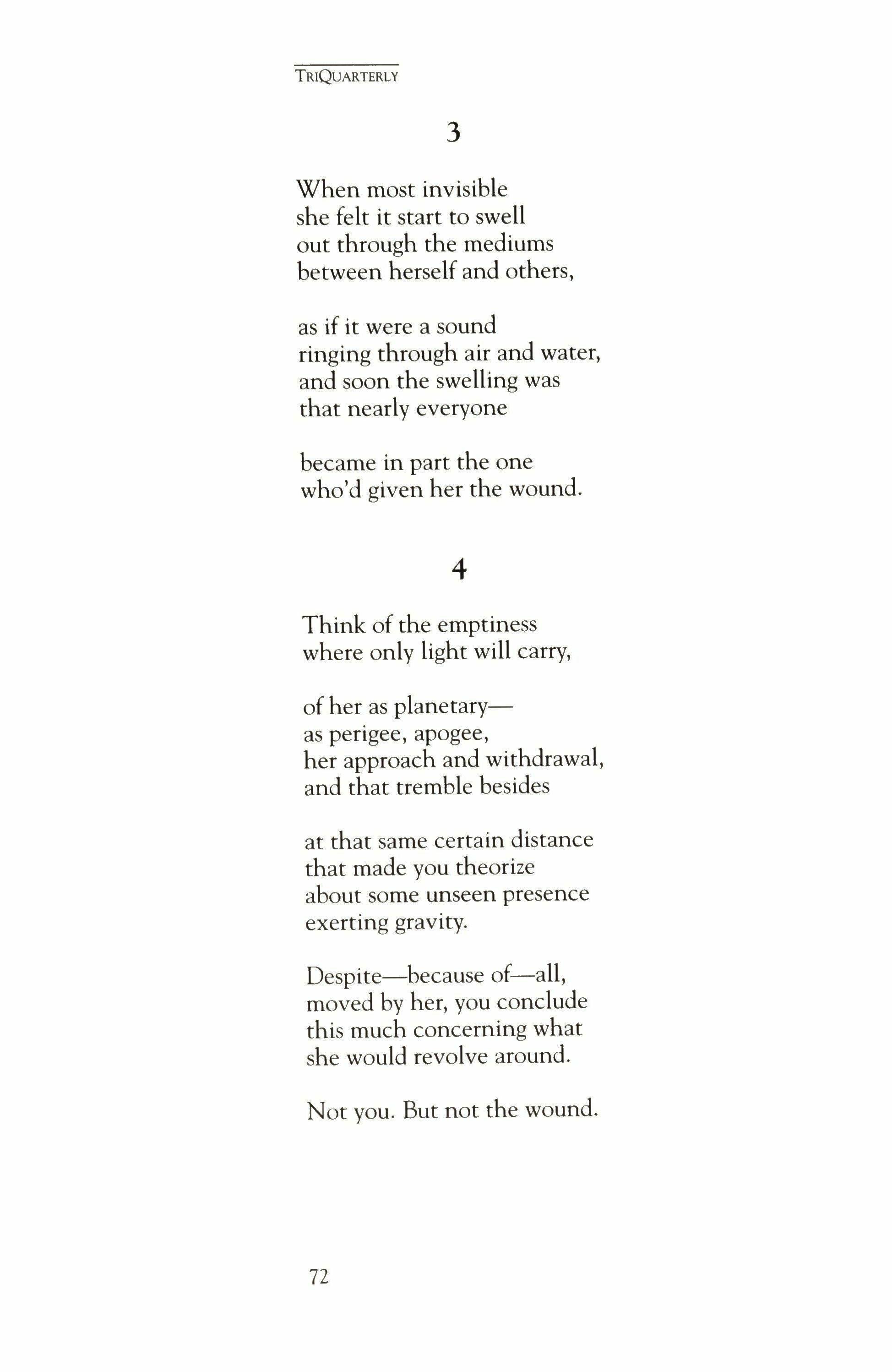
3
When most invisible she felt it start to swell out through the mediums between herself and others,
as if it were a sound ringing through air and water, and soon the swelling was that nearly everyone became in part the one who'd given her the wound.
4
Think of the emptiness where only light will carry, of her as planetaryas perigee, apogee, her approach and withdrawal, and that tremble besides at that same certain distance that made you theorize about some unseen presence exerting gravity.
Despite-because of-all, moved by her, you conclude this much concerning what she would revolve around.
Not you. But not the wound.
TRIQUARTERLY
72

Adam Naming Himself
Again and again he comes to himcomes to himself unsummoned
and thinks to himself, I am I will and it is like the voice
ofGod in there, the voice in him, still and strong, not saying
Adam, but I I and not even really saying, just there, proposing, considering out of itself, himself,
over and over without naming, no stir in surrounding garden.
It is like what the voice of God will come to later amid
palm trees or brick habitations, in a desert place or a builded
place, the soundless prompt to become subject of what ensues, this, too, given him from the beginning, that inside him it would be like what the voice of God descends to, no one hearing but him.
TRIQUARTERLY
73
Two Poems
Ira Sadoff
One We Knew

No one wants to hear the same old story twice. I wasn't even listening when he turned off the radio during Bruckner's famous scherzo to discuss the script he was writing (you don't want to hear it)-this time characters got what they deserved, meaning no one had to run away. Each time I tell the story of my father's leaving, the words become small towns off the freeway: San this, EI that, the same nameless stucco ranches stuck to the sunburnt hillsides, so even shopworn husbands confuse family houses with their lovers. You see where I'm heading.
What could I expect from the poor bastard, bent over out-of-tune pianos (I thought of Isaac and Jacob while my father squinted, reading highway signs)
TRIQUARTERLY
74

dying to please, to make a buck while critics judged him harshly. We were stationed (what they call gridlock now) as if our lives were Bruckner symphonies, with their relentless stammer, two-note themes, the same old drone of horns. Until he got it right, until cars began to crawl to their resting places.
Looking at the vestige of his dreamy face, so seduced by the subjunctive, I refused to be the son who's blessed. Nothing happened to the script, of course. Except the storythat string of words with figures absent from the screen-is still attached to me.
TRIQUARTERLY 75
Poem

I like waking up by the lake frozen over, the frosty meadow where the white horse still huffs and chafes by the fence post and a few fog clouds cling to the tree line of the Sugar Loaf Range. I like the lake frozen over. A few years ago I would have said paralyzed, married to the idea, but I didn't live where my love sleeps now, her children lightly breathing a wall away. And until a logging truck trudges by on our dirt road-its chains rattlingwe have a moment together. I'd like to say the world began this way: on the cusp of winter: 5 A.M.: no gunshots, no sickly deer limping asymmetrically into the clearing. Before the still water turned to gnats and mosquitoes, the algaed water that murky, turquoise green we make of things.
TRIQUARTERLY
76
Two Poems
David Rivard
Jihad

I love the drops of rain that stammer down the fire escape, the second cousins of history, as slyly incestuous as all second cousins. Joe Reth, a commercial sign painter, lives below me, wife & two boys, the entire family of Reth hunkers down there & hangs on to each day as a stutterer would to a frothingly seductive multisyllabic concoction. No, no, they aren't history, neither the first fragrant days of the planet nor the last of collapsing stone. And the story is simple, the furnace goes dead, kaput, & with no heat I've been firing up the kitchen stove, folding open its door, letting it cloud the apartment's atmosphere, warm & stultifying, sleep-inducing. When I wake, at twilight, I can hear Joe out in his van playing Hendrix, full-blast. The tapes his first resort after arguing with Janet. You would be surprised how much we can hurt. Even with the van's windows rolled up, even then a thumping & wailing seeps out, especially through the back doors, on which Joe has airbrushed a woman, his muse, a cross between a leather queen & Wagnerian Medusa. This, some genuine Baudelaire might say, is history, this woman, with her beckoning enormous breasts
TRIQUARTERLY
77
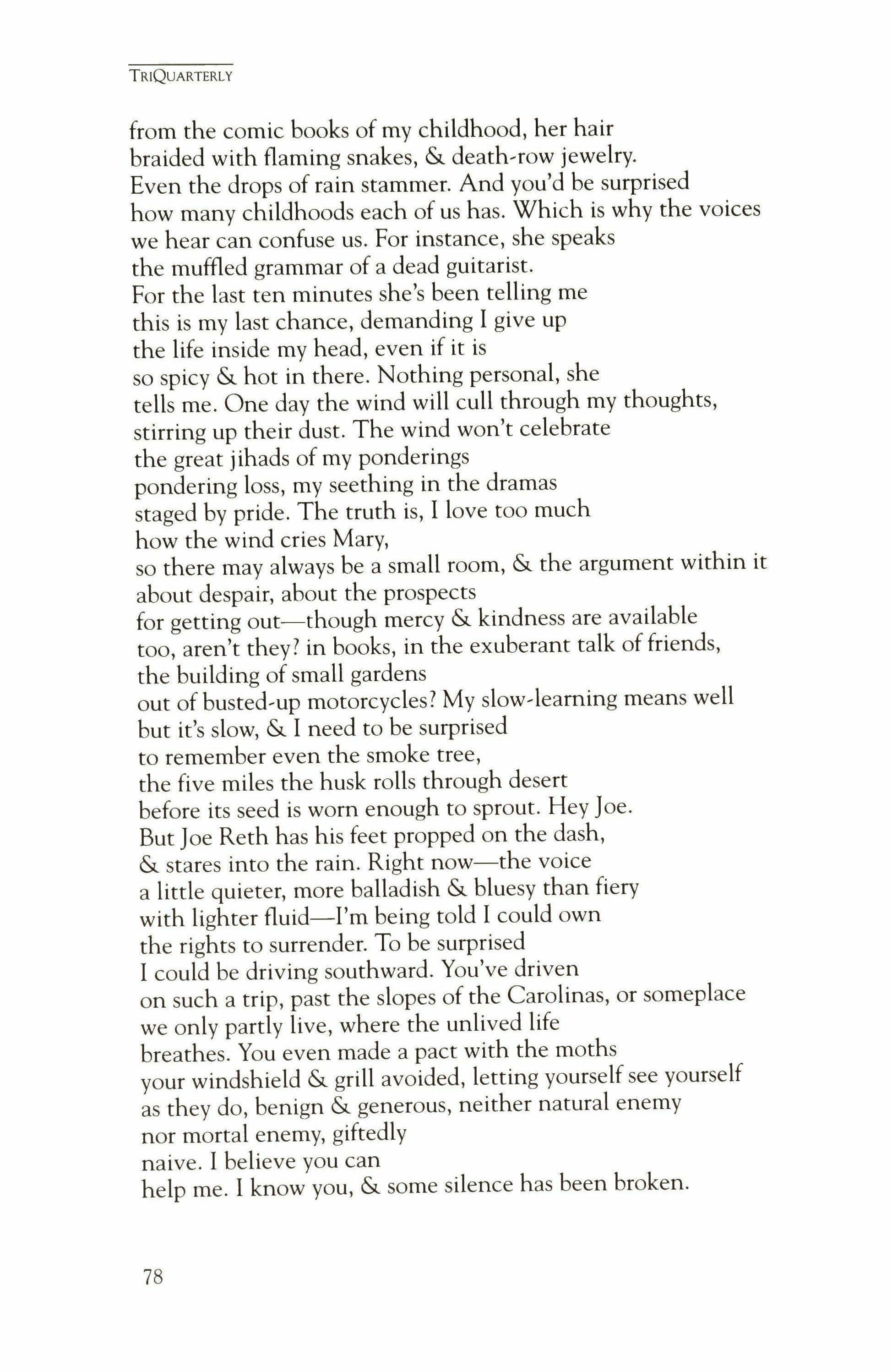
from the comic books of my childhood, her hair braided with flaming snakes, & death-row jewelry. Even the drops of rain stammer. And you'd be surprised how many childhoods each of us has. Which is why the voices we hear can confuse us. For instance, she speaks the muffled grammar of a dead guitarist. For the last ten minutes she's been telling me this is my last chance, demanding I give up the life inside my head, even if it is so spicy & hot in there. Nothing personal, she tells me. One day the wind will cull through my thoughts, stirring up their dust. The wind won't celebrate the great jihads of my ponderings pondering loss, my seething in the dramas staged by pride. The truth is, I love too much how the wind cries Mary, so there may always be a small room, & the argument within it about despair, about the prospects for getting out-though mercy & kindness are available too, aren't they? in books, in the exuberant talk of friends, the building of small gardens out of busted-up motorcycles? My slow-learning means well but it's slow, & I need to be surprised to remember even the smoke tree, the five miles the husk rolls through desert before its seed is worn enough to sprout. Hey Joe. But Joe Reth has his feet propped on the dash, & stares into the rain. Right now-the voice a little quieter, more balladish & bluesy than fiery with lighter fluid-I'm being told I could own the rights to surrender. To be surprised I could be driving southward. You've driven on such a trip, past the slopes of the Carolinas, or someplace we only partly live, where the unlived life breathes. You even made a pact with the moths your windshield & grill avoided, letting yourself see yourself as they do, benign & generous, neither natural enemy nor mortal enemy, giftedly naive. I believe you can help me. I know you, & some silence has been broken.
TRIQUARTERL
Y
78
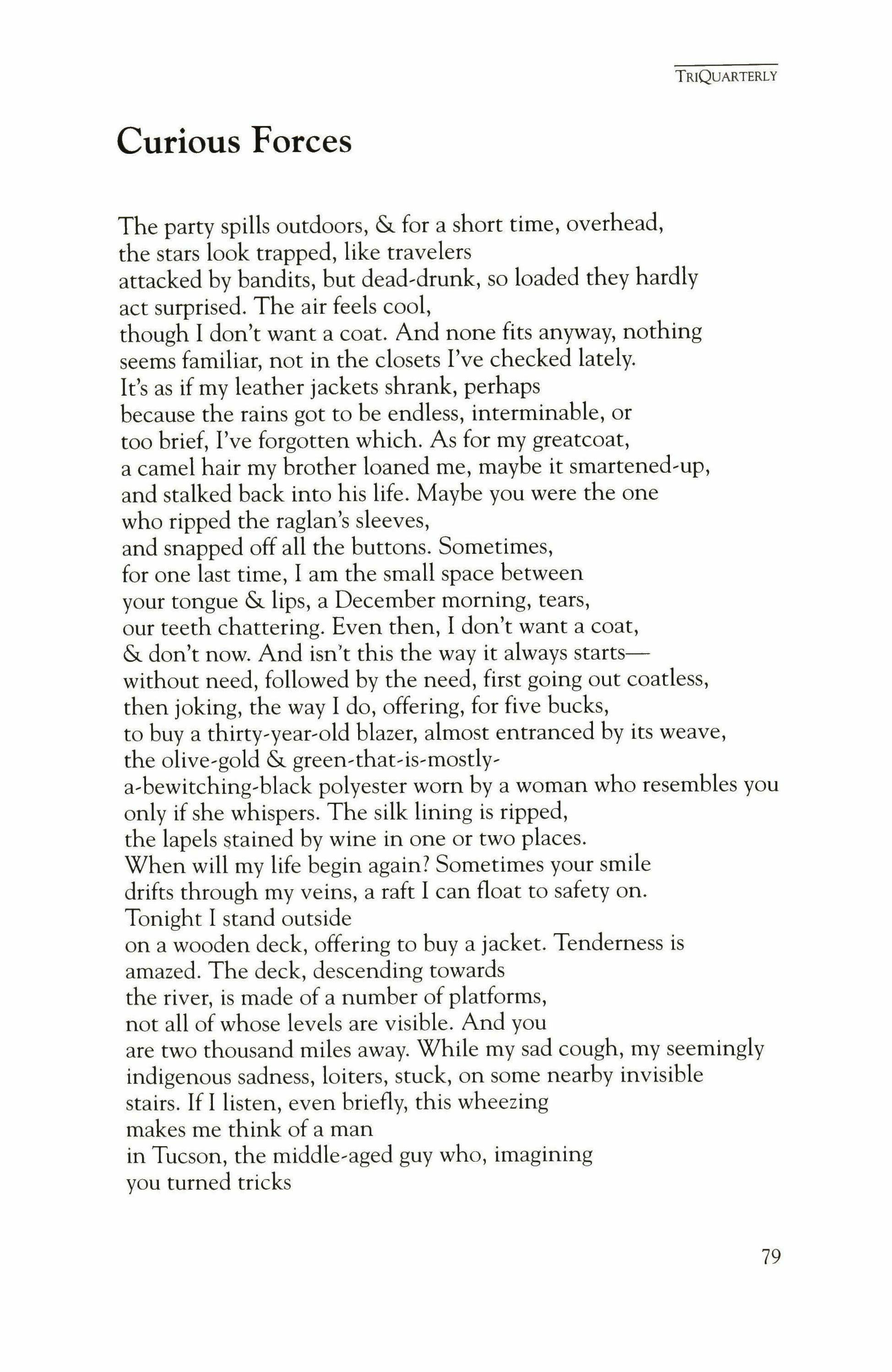
Curious Forces
The party spills outdoors, & for a short time, overhead, the stars look trapped, like travelers attacked by bandits, but dead-drunk, so loaded they hardly act surprised. The air feels cool, though I don't want a coat. And none fits anyway, nothing seems familiar, not in the closets I've checked lately. It's as if my leather jackets shrank, perhaps because the rains got to be endless, interminable, or too brief, I've forgotten which. As for my greatcoat, a camel hair my brother loaned me, maybe it smartened-up, and stalked back into his life. Maybe you were the one who ripped the raglan's sleeves, and snapped off all the buttons. Sometimes, for one last time, I am the small space between your tongue & lips, a December morning, tears, our teeth chattering. Even then, I don't want a coat, & don't now. And isn't this the way it always startswithout need, followed by the need, first going out coatless, then joking, the way I do, offering, for five bucks, to buy a thirty-year-old blazer, almost entranced by its weave, the olive-gold & green-that-is-mostlya-bewitching-black polyester worn by a woman who resembles you only if she whispers. The silk lining is ripped, the lapels stained by wine in one or two places. When will my life begin again? Sometimes your smile drifts through my veins, a raft I can float to safety on. Tonight I stand outside on a wooden deck, offering to buy a jacket. Tenderness is amazed. The deck, descending towards the river, is made of a number ofplatforms, not all of whose levels are visible. And you are two thousand miles away. While my sad cough, my seemingly indigenous sadness, loiters, stuck, on some nearby invisible stairs. If I listen, even briefly, this wheezing makes me think of a man in Tucson, the middle-aged guy who, imagining you turned tricks
TRIQUARTERLY
79

because of the way you dressed, came over to your table & left his business card, all because of a leopard-skin skirt & makeup. How pink the breath ofhis blank mouth as you threw the card back. Occasionally, I've wished I could have been the lettering on that card, something raised & black, so I could know what it feels to be hurled at a fool. But not tonight. Tonight I ask too many questions of the woman I stand with, her blond, centripetal hair enlivening the curious forces of the party, & of course I wind up making another offer on her jacket, as if donning it might make me clear enough to understand if our marriage had ended, if I were really leaving you, and the love of the last twelve years. Often, I have wished to be something inked black on white & flung. Now I am lighter than any letters or numbers. I am worthier, like a bird's wing. Or as unworthy as the oak & yellow pine across the river. What is required of those woods when the hunters (or at least their ghosts) wait hidden in camouflage shirts & ponchos? What is shelter? What is trust?
TRIQUARTERLY
80
Trinity
Cathleen Calbert
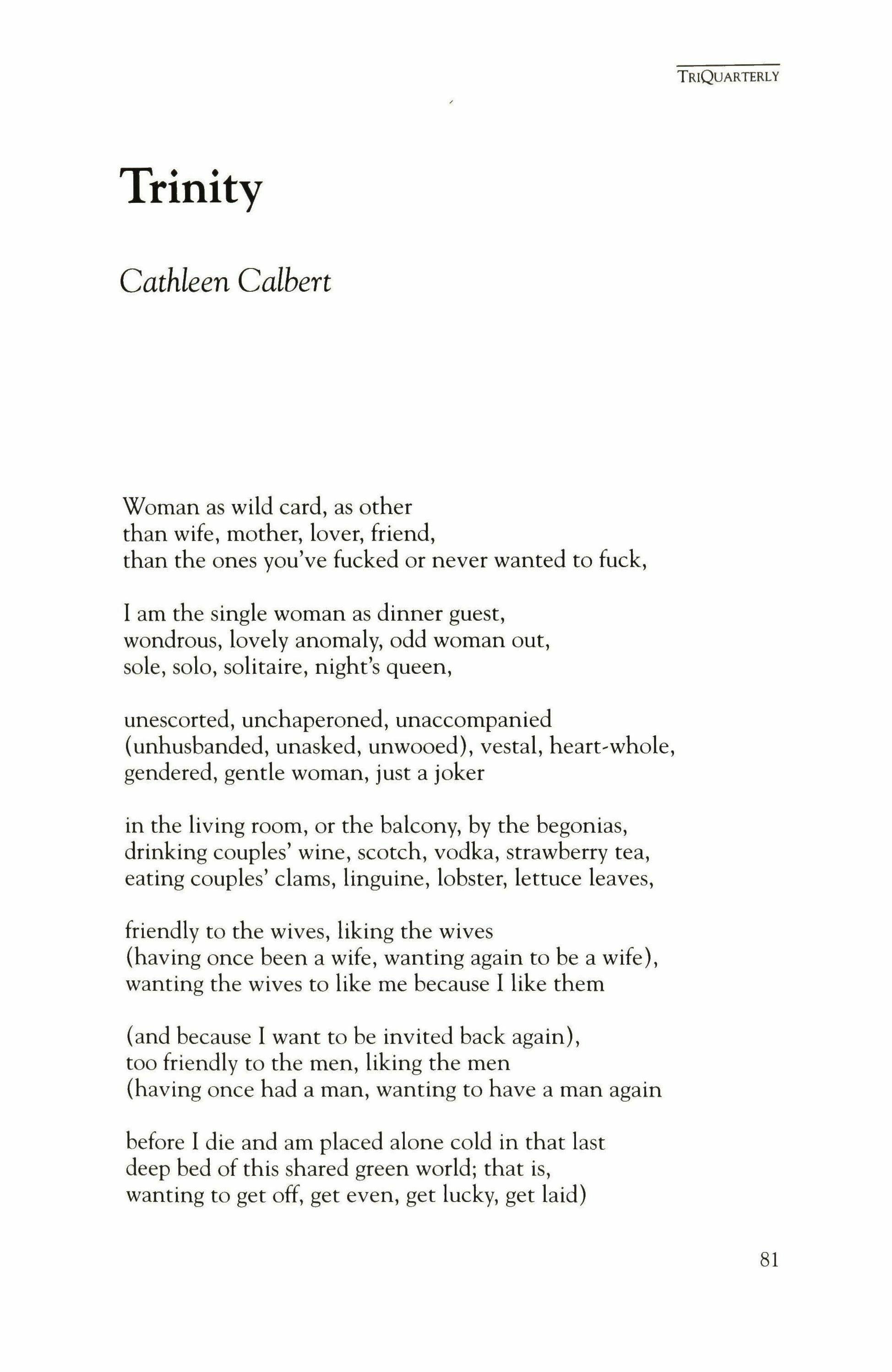
Woman as wild card, as other than wife, mother, lover, friend, than the ones you've fucked or never wanted to fuck,
I am the single woman as dinner guest, wondrous, lovely anomaly, odd woman out, sole, solo, solitaire, night's queen, unescorted, unchaperoned, unaccompanied (unhusbanded, unasked, unwooed), vestal, heart-whole, gendered, gentle woman, just a joker in the living room, or the balcony, by the begonias, drinking couples' wine, scotch, vodka, strawberry tea, eating couples' clams, linguine, lobster, lettuce leaves, friendly to the wives, liking the wives (having once been a wife, wanting again to be a wife), wanting the wives to like me because I like them (and because I want to be invited back again), too friendly to the men, liking the men (having once had a man, wanting to have a man again before I die and am placed alone cold in that last deep bed of this shared green world; that is, wanting to get off, get even, get lucky, get laid)
TRIQUARTERLY 81

though I remain unnameable, unapproachable, untouchable. The best you could have, boys, but not quite worth it, all in all, my friends, not quite worth it at all in the end.
So for a short space, let me stand for "space." Let me be the space in your lives. A portal, an opening, a break. Call me "0." Fill in the gap, pencil me in, the big zero.
Then flatten this figure into three planes (use your right hands, please, for the left sting with wedding rings), and, oh, for a space, let us triangulate:
all you wives chopping, frying, mincing, sighing, talking, laughing, lacking that essential mystery, and omitted, I'm sad to say, momentarily, discarded as you are by all you men patting me on my knee, back, arm, face, offering things to eat, drink, smoke, try, taste, liking my hair, socks, dog, smell, blouse, keys,
asking do I like to ski, cook, read, rent movies. Would I go for a walk, a swim, a ride, for coffee? To see the countryside, tide pools, local color, compost heap?
Privately expressing concern, interest, curiosity: my job, my dog, my cacti, cough, calligraphy? What do I lack, desire, do without, need?
Telling me (confidentially) how you would love to come to town, this little piggy, come visit, come see me if only, only, only you could find time, make space, get free.
Yes, my dears, had we world enough, and time and again I leave alone, sexy to men because I'm not sleeping with any of them,
going home alone while all the husbands sleep with all the wives, wives with their husbands, the whole world falling to a lazy, angry sleep,
TRIQUARTERLY
82

"unfulfilled," fucked up, fantasizing, in each other's arms, legs, plans, schemes, as the stars somehow get it up to shine once again,
for you and me, for us all, God bless us and forgive, and the crickets count out a beat to our lives, and I kiss my dog, who sleeps at my feet.
TRIQUARTERLY 83
Two Poems
David Barber
Lines on a Yankee Aphorism

The tongue is ever turning to the aching tooth.
The face exacts its creases, even as you speak. The cowlick springs back smartly from the smoothing touch. The tongue is ever turning to the aching tooth.
The elbow stiffens in cold snaps, where once it cracked On account of a rotting beech, a rankling taunt. The hand balls up again, as if the jibe were fresh.
The tunes return at intervals, snatches at a time: Sponsors' jingles, beery choruses, martial strains. He'd fiercely whistle along. It set your teeth on edge.
The customary card arrives, that jagged hand: "Blessings of the season from the bottom of my heart." The tongue is ever turning to the aching tooth.
The manhandled file drawers routinely jam. There's not a pencil in the desk that isn't gnawed. The diminutive nickname sticks-you bite your tongue.
The woeful porch step rounds into pitch each muddy spring. Was ever there a harkening any sweeter to your ear? Is this the footfall that will finally break its back?
TRIQUARTERLY
84
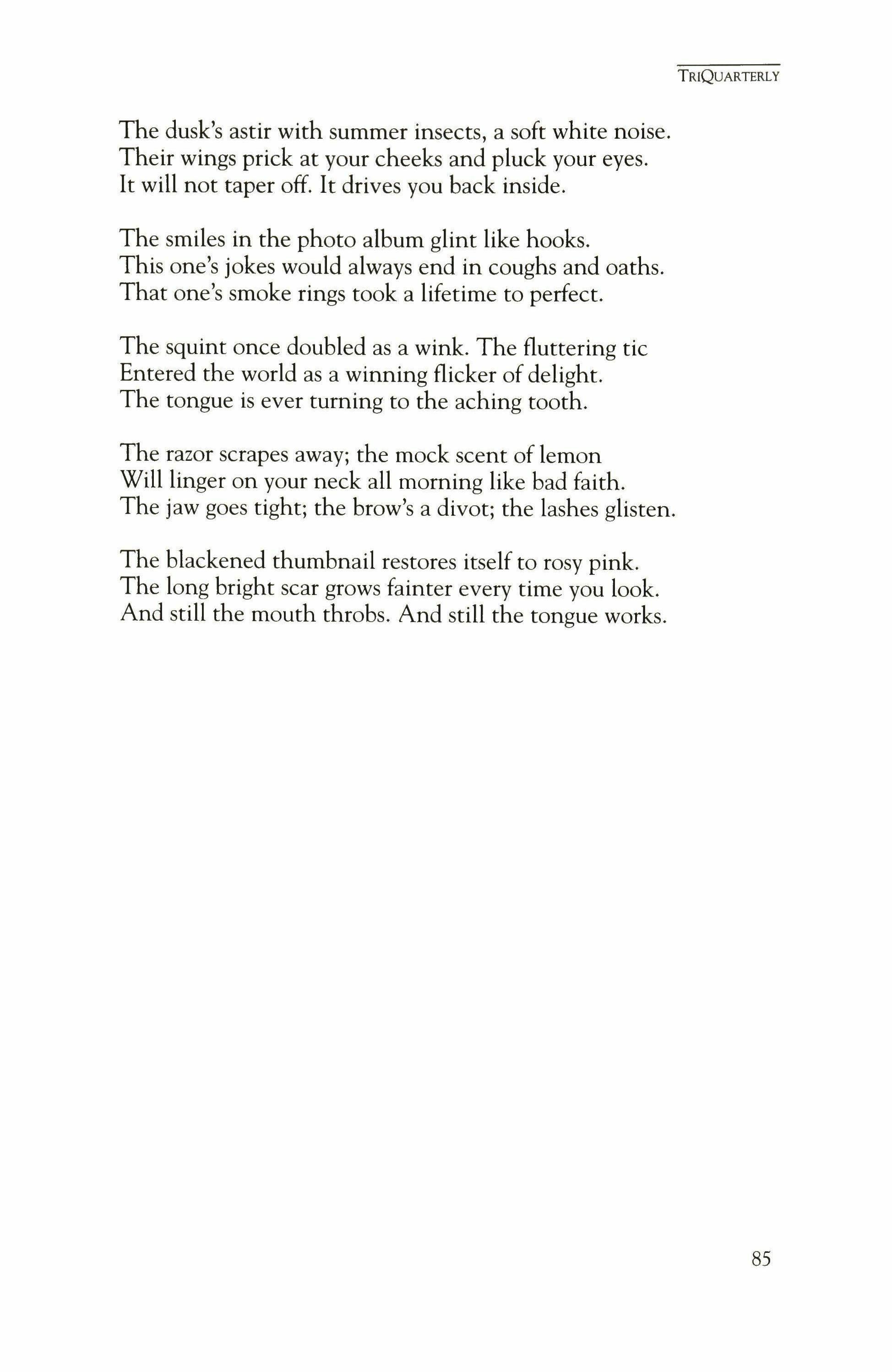
The dusk's astir with summer insects, a soft white noise. Their wings prick at your cheeks and pluck your eyes. It will not taper off. It drives you back inside.
The smiles in the photo album glint like hooks. This one's jokes would always end in coughs and oaths. That one's smoke rings took a lifetime to perfect.
The squint once doubled as a wink. The fluttering tic Entered the world as a winning flicker of delight. The tongue is ever turning to the aching tooth.
The razor scrapes away; the mock scent of lemon Will linger on your neck all morning like bad faith. The jaw goes tight; the brow's a divot; the lashes glisten.
The blackened thumbnail restores itself to rosy pink. The long bright scar grows fainter every time you look. And still the mouth throbs. And still the tongue works.
TRIQUARTERLY
85
Zooms and Pans

What hope did we ever have against the virtual? Where's the will that might have jammed the spell? The ball glides under the outstretched glove with an immaculate serenity we couldn't have dreamed, the hook shot swoons and rips the net, the uppercut sends the thickly aging champion into the annals of cauliflowered oblivion from seven elegant and omniscient angles.
The shivering crossbar, the sand-trap save, the unparalleled pike, the textbook buntin the booth there are knobs and buttons, men expressly wired to convert dubious commotion into sequences rich and epic, fixed beyond dispute, instilling the sense at last that our bodies too, rewound in avid slo-rno, would surely disclose a telling pivot or a clinching move.
The father and son have scarcely budged a muscle. The game wears on. The season ends today. Their hearts belong to the side in red and gold, the father's school. The son is small but knows the rules like catechism, knows the mechanics of erupting heroics and the stratagems essential to offset the accidents of fortune. And when the quarterback wheels and completes a rocket or when the ball squirts free like a wet seed or when two lunging bodies meet savagely in midair, he knows why the screen must run it over: the revealing, the lingering, the penetrating second look.
TRIQUARTERLY
86
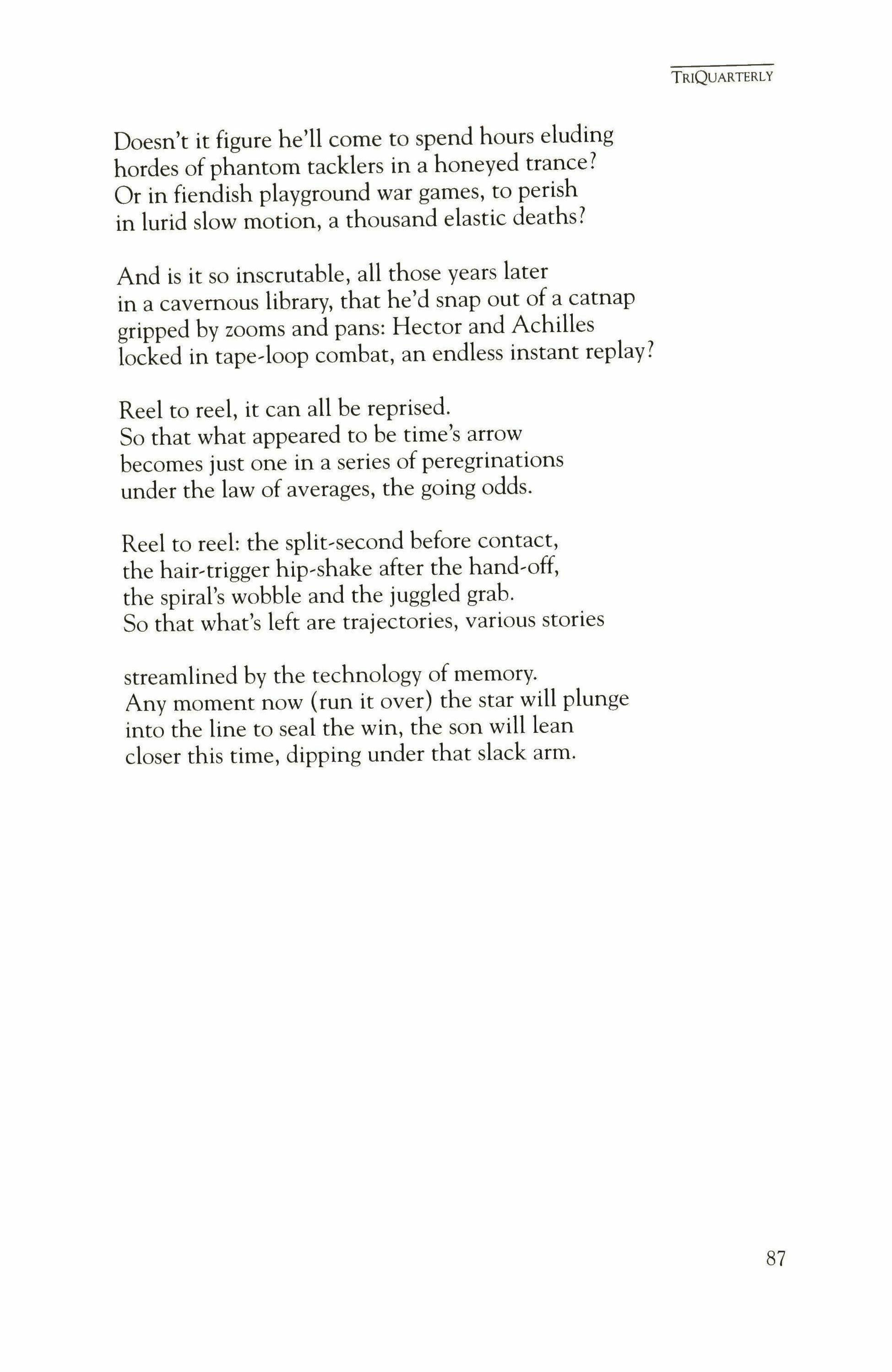
Doesn't it figure he'll come to spend hours eluding hordes of phantom tacklers in a honeyed trance? Or in fiendish playground war games, to perish in lurid slow motion, a thousand elastic deaths?
And is it so inscrutable, all those years later in a cavernous library, that he'd snap out of a catnap gripped by zooms and pans: Hector and Achilles locked in tape-loop combat, an endless instant replay?
Reel to reel, it can all be reprised. So that what appeared to be time's arrow becomes just one in a series of peregrinations under the law of averages, the going odds.
Reel to reel: the split-second before contact, the hair-trigger hip-shake after the hand-off, the spiral's wobble and the juggled grab. So that what's left are trajectories, various stories
streamlined by the technology of memory. Any moment now (run it over) the star will plunge into the line to seal the win, the son will lean closer this time, dipping under that slack arm.
TRIQUARTERLY 87
Three Poems
Billy Collins Center

At the first chink of sunrise, the windows on one side of the house are frosted with stark orange light, and in every pale blue window on the other side a full moon hangs, a round white blaze.
I look out one side, then the other, moving from room to room as if between countries or parts of my life.
Then I stop and stand in the middle, extend both arms like Leonardo's man, naked in a perfect circle.
And when I begin to turn slowly I can feel the whole house turning with me, rotating free of the earth.
The sun and moon in all the windows move too with the tips of my fingers, the solar system turning by degrees
TRIQUARTERLY
88

with me, morning's egomaniac, turning on the hallway carpet in my slippers, taking the cold orange, blue and white
for a quiet, unhurried spin, all wheel and compass, axis and reel, as wide awake as I will ever be.
TRIQUARTERLY
89

Design
I pour a coating of salt on the table and make a circle in it with my finger. This is the cycle of life,
I say to no one. This is the wheel of fortune. This is the ring of Kerry and the white rose of Tralee
I say to the ghosts of my family, the dead fathers, the aunt who drowned, my unborn brothers and sisters, my unborn children. This is the sun with its glittering spokes and the bitter moon. This is the perfect circle of geometry I say to the crack in the wall, to the birds who cross the window. This is the wheel I just invented to roll through the rest of my life I say touching my finger to my tongue.
TRIQUARTERLY
90
Directions

You know the brick path in back of the house, the one you see from the kitchen window, the one that bends around the far end of the garden where all the yellow primroses are? And you know how if you leave the path and walk up into the woods you come to a heap of rocks, probably pushed down during the horrors of the Ice Age, and a grove of tall hemlocks, dark green now against the light brown fallen leaves? And farther on you know the small bridge with the broken railing and if you go beyond that you arrive at the foot of that sheep's head hill? Well, if you start climbing, and you might have to grab hold of a sapling when the going gets steep, you will eventually come to a long stone ridge with a border of pine trees which is as high as you can go and a good enough place to stop.
The best time is late afternoon when the sun strobes through the columns of trees as you are hiking up, and when you find an agreeable rock to sit on, you will be able to see the light pouring down into the woods and breaking into the shapes and tones of things and you will hear nothing but a sprig of birdsong or the leafy dropping of a cone or nut through the trees, and if this is your day you might even spot a hare or feel the wing-beats of geese driving overhead toward some destination.
TRIQUARTERLY 91

TRIQUARTERLY
But it is hard to speak of these things how the voices of light enter the body and begin to recite their stories how the earth holds us painfully against its breast made of humus and brambles how we who will soon be gone regard the entities that continue to return greener than ever, spring water flowing through a meadow and the shadows of clouds passing over the hills and the ground where we stand in the tremble of thought taking the vast outside into ourselves.
Still, let me know before you set out. Come knock on my door and I will walk with you as far as the garden with one hand on your shoulder. I will even watch after you and not tum back to the house until you disappear into the crowd of ash and maple, heading up toward the hill, piercing the ground with your stick.
92
The Walking Stick
Laura Newbern
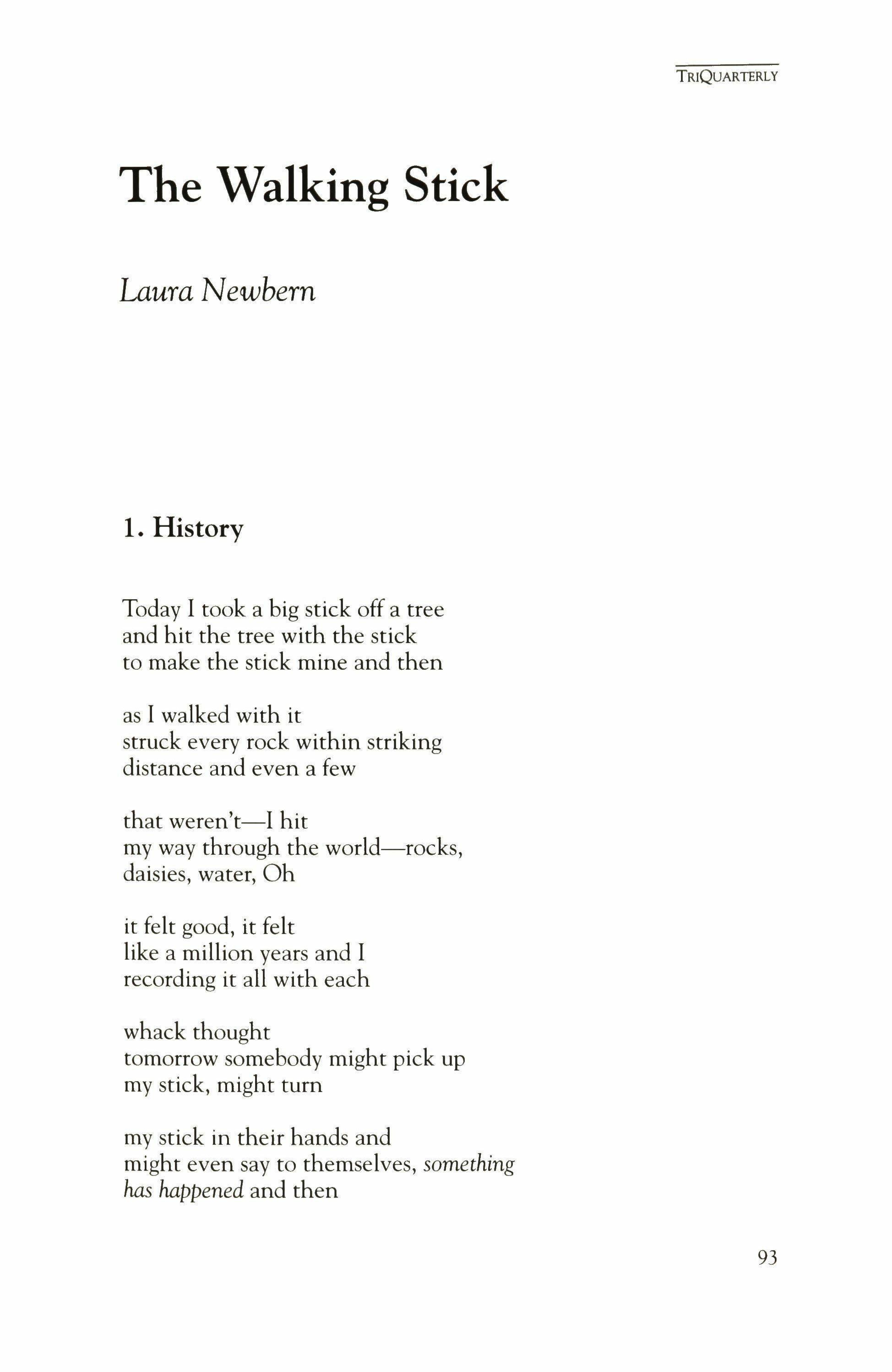
1. History
Today I took a big stick off a tree and hit the tree with the stick to make the stick mine and then as I walked with it struck every rock within striking distance and even a few that weren't-I hit my way through the world-rocks, daisies, water, Oh it felt good, it felt like a million years and I recording it all with each whack thought tomorrow somebody might pick up my stick, might tum my stick in their hands and might even say to themselves, something has happened and then
TRIQUARTERLY
93

TRIQUARTERLY look up to the sky for some sign
2. The Shadow
This evening I named the stick Pearl because it looked old and elegant leaning against the white wall, because in the quiet the stick
for a while was my great, grandmother Pearl's right leg-Pearl of the raggedy Bible, Pearl of the soft back yard and the screened porch where the leg swung to the Bible, predicted a rain and dangled a big black shoe in the mist I knew her
one evening only. And only as tall as her thigh I said to the stick, Pearl, you can only be Pearl for tonight, and only by lamplight.
3. Full Moon
Tonight the stick fell in love with itself It lay on the carpet and acted as much like a Branch as it could, it was awful to see it reaching for Sun and Birds and Needles-I said Cut it out, I said Stick, do you know all your small round elbows, Stick do you know that the birds are not looking for you, do you know
94
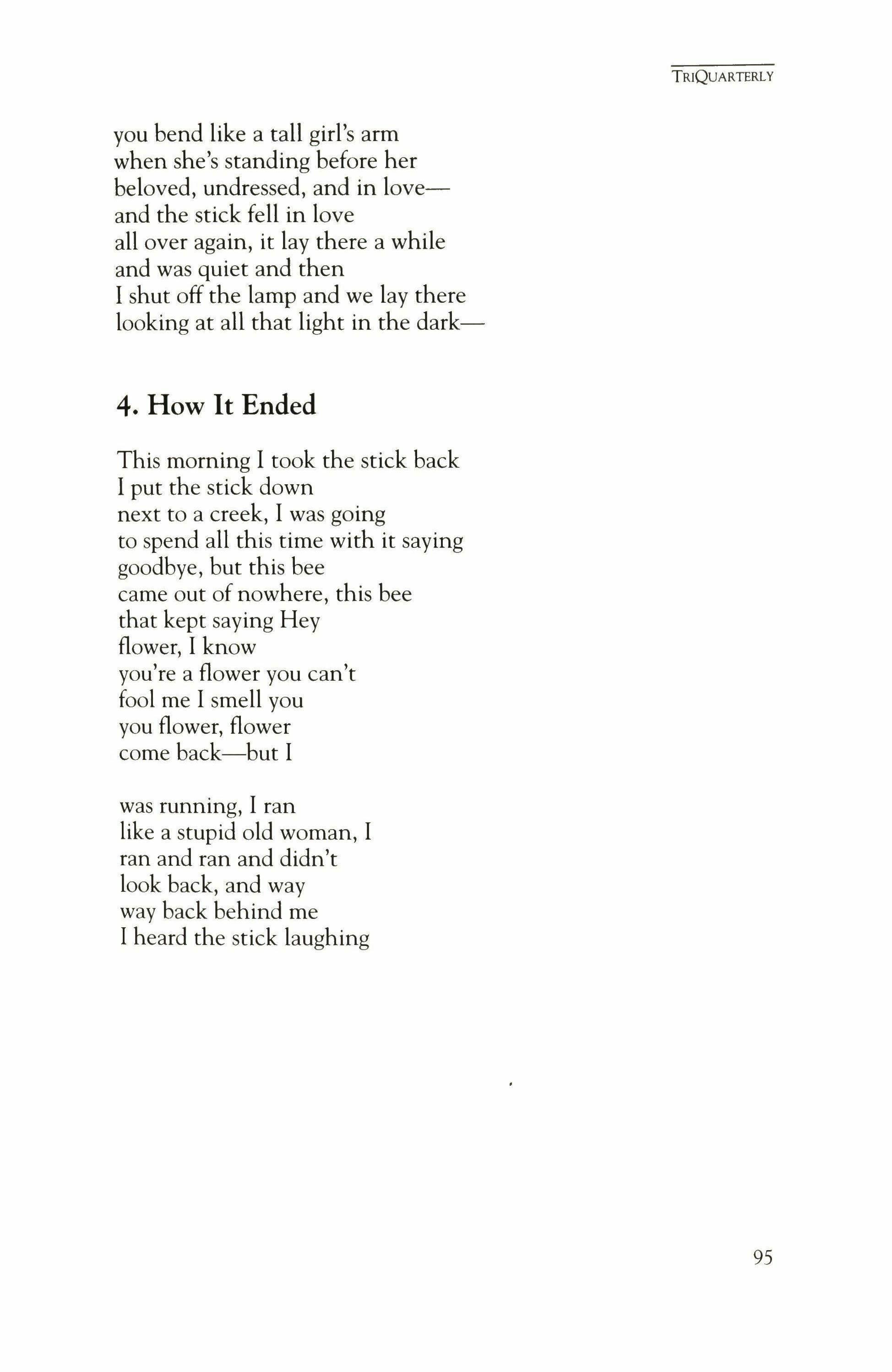
you bend like a tall girl's arm when she's standing before her beloved, undressed, and in loveand the stick fell in love all over again, it lay there a while and was quiet and then I shut off the lamp and we lay there looking at all that light in the dark-
4. How It Ended
This morning I took the stick back I put the stick down next to a creek, I was going to spend all this time with it saying goodbye, but this bee came out of nowhere, this bee that kept saying Hey flower, I know you're a flower you can't fool me I smell you you flower, flower come back-but!
was running, I ran like a stupid old woman, I ran and ran and didn't look back, and way way back behind me I heard the stick laughing
TRIQUARTERLY
95
Five Prose Pieces
Kathleene West Truth

She didn't finish One Hundred Years ofSolitude, can't understand a word of Ashbery's poetry and returns Nadine Gordimer's books, unread, to the well-wishers who press them upon her. The sight of crystals makes her chakras combative, meditation causes a fine rash to rise on her upper arm, and she practices yoga as a competitive sport. She never knew anyone personally who was killed in Vietnam. None of her friends has died of AIDS, none has tested HlV-positive, few have even tested, except for her current lover, an ex-heroin addict who's been checked every year for the past five and says they should go in together next time. She's told him ofher mild risks: the escapades in foreign countries, a few seasons as a middle-class barfly, the long affairs with married men, designed to keep heart and pride permanently stalled and to guarantee permanent control of the remote. Sundays, she makes him leave before noon, citing 11:00 as checkout in major cities. "I am a hotel, a grand one," she sings from a song he doesn't recognize. If she ever relents, he will mimic her restrictions in a nasal squeak, "I have to have rules; when we started this, you knew my time was limited; I can't just be at your beck and call," in a voice still gentle, that waits for adoration to realign itself with scorn. He is always gentle with her, except when they make love. When they walk down the street, he holds her hand up, away from her body, as if to protect it, or to keep it from inflicting harm on herself. If she forgets and stands on tiptoe to kiss him, he eases her heels down, and cradles her head, sideways, against his chest. There is the danger, his heartbeat at the crown of her head, pushing at her skull, if not searching for a crevice to enter, then making itself necessary with its regularity, dependability,
TRIQUARTERLY
96

white noise in the mind, the heart, devotion pronounced clearly as the voice of judgment, an award to the recipient who gives herself so compulsively, so completely, you'd swear this is all there ever was.
TRIQUARTERLY
97
Dare
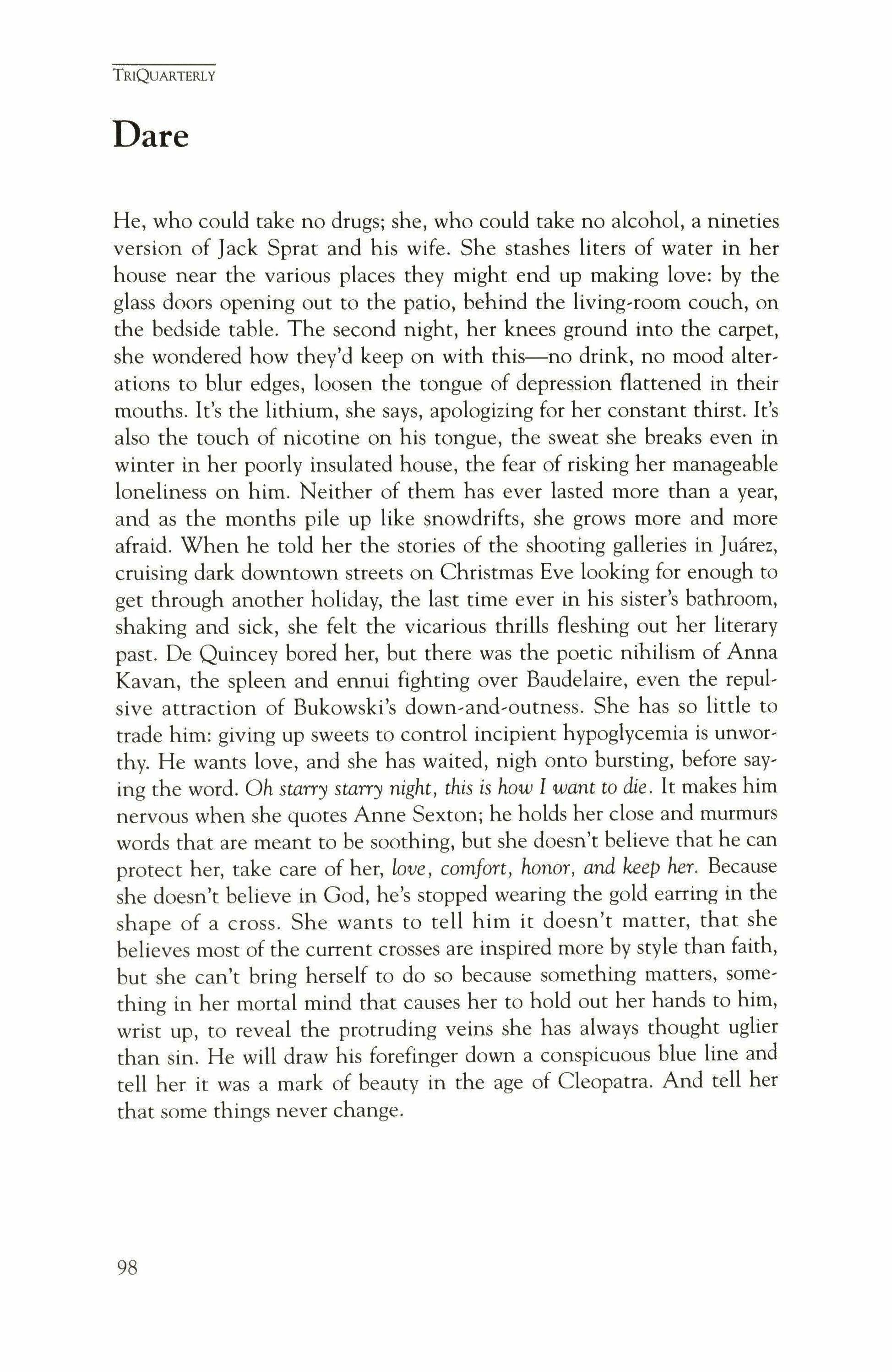
He, who could take no drugs; she, who could take no alcohol, a nineties version of Jack Sprat and his wife. She stashes liters of water in her house near the various places they might end up making love: by the glass doors opening out to the patio, behind the living-room couch, on the bedside table. The second night, her knees ground into the carpet, she wondered how they'd keep on with this-no drink, no mood alterations to blur edges, loosen the tongue of depression flattened in their mouths. It's the lithium, she says, apologizing for her constant thirst. It's also the touch of nicotine on his tongue, the sweat she breaks even in winter in her poorly insulated house, the fear of risking her manageable loneliness on him. Neither of them has ever lasted more than a year, and as the months pile up like snowdrifts, she grows more and more afraid. When he told her the stories of the shooting galleries in Juarez, cruising dark downtown streets on Christmas Eve looking for enough to get through another holiday, the last time ever in his sister's bathroom, shaking and sick, she felt the vicarious thrills fleshing out her literary past. De Quincey bored her, but there was the poetic nihilism of Anna Kavan, the spleen and ennui fighting over Baudelaire, even the repulsive attraction of Bukowski's down-and-outness. She has so little to trade him: giving up sweets to control incipient hypoglycemia is unworthy. He wants love, and she has waited, nigh onto bursting, before saying the word. Oh starry starry night, this is how I want to die. It makes him nervous when she quotes Anne Sexton; he holds her close and murmurs words that are meant to be soothing, but she doesn't believe that he can protect her, take care of her, love, comfort, honor, and keep her. Because she doesn't believe in God, he's stopped wearing the gold earring in the shape of a cross. She wants to tell him it doesn't matter, that she believes most of the current crosses are inspired more by style than faith, but she can't bring herself to do so because something matters, something in her mortal mind that causes her to hold out her hands to him, wrist up, to reveal the protruding veins she has always thought uglier than sin. He will draw his forefinger down a conspicuous blue line and tell her it was a mark of beauty in the age of Cleopatra. And tell her that some things never change.
TRIQUARTERLY
98

Jean Rhys in Mexico
He'd been working out at La Estetica Gymnasia on Lopez Mateos. Once he crossed the border next fall he would have no problems blending in, with his American-style pees, triceps and a heel-to-toe stride that added swagger to his grace. So when he strolled through the outdoor cafe on Pedro Moreno and the American woman raised her head, he slowed down, glanced back. Even though she wore sunglasses, he could tell she observed him. There would be a melancholy, nostalgic look in her eyes. She studied his shoulders, his faded Levi 501s, the worn Benetton Tshirt. Perhaps she admired his muscles. Perhaps she was tired of the same conversations with waiters and taxi drivers. He sat down on one of the plaza benches and waited for her to finish her beer. It was a Bohemia; strong for American women. Maybe strong enough to make her walk by his bench and then he could ask her what time it was. He watched her. She was looking down, observing the traveler's custom, but of course with the small shudder of her profiled face that signified a blinking back of tears. Another tiiste senora. He knew them well. They avoided the shade, even on days like this, and turned their faces to the sun. In their oversized handbags they carried brochures of the Ballet Folklorico and guidebook lists of the markets where the curanderas might be found. Even from twenty yards away, he recognized the twisted shape of this one's earrings. From Tlaquepaque, where she'd probably paid as much for the story about their significance as the silver. Tonight, when she dined alone, she would be seated in the married couples' section of the restaurant out of courtesy. When the children with roses came in, some man would extract a single rose from the bunch he bought for his wife and send it to her table.
He waited to leave until she lifted the glass and tilted her head slightly. Her throat was not unattractive although she had to be over thirty or over forty, hard to tell with these women. The ones that made it this far south were the ones that aged well. But oh, how many broken hearts they labored under. He knew he did not have to understand the sadness, knew she'd be grateful if he'd speak to her in his own language, allowing her to practice the few twisted phrases she could summon. She would even laugh, walk with him a few blocks, arrange to meet him later on. But when she left, he would feel an uncomfortable regret as the motes
TRIQUARTERLY
99

and particles of her irrelevant sadness settled over him. She would again reach for her glass, he would rise and she would watch him across the plaza. For a moment he felt the horror of knowing the moves, the sequence, the time allotted for each interchange, the absolute fear of everything that would happen next.
TRIQUARTERLY
100
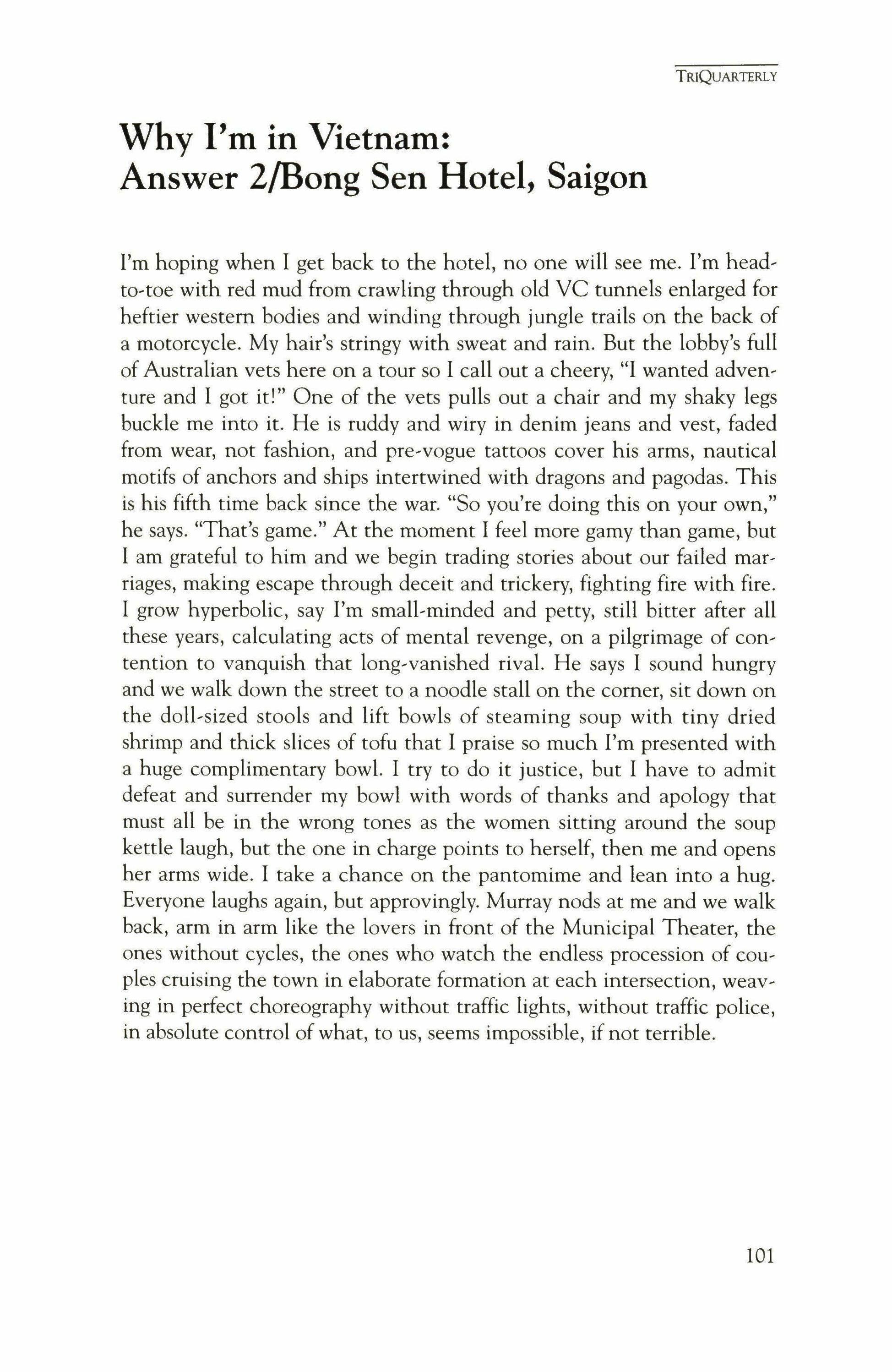
Sen
Why I'm in Vietnam: Answer 2/Bong
Hotel, Saigon
I'm hoping when I get back to the hotel, no one will see me. I'm headto-toe with red mud from crawling through old VC tunnels enlarged for heftier western bodies and winding through jungle trails on the back of a motorcycle. My hair's stringy with sweat and rain. But the lobby's full of Australian vets here on a tour so I call out a cheery, "I wanted adventure and I got it!" One of the vets pulls out a chair and my shaky legs buckle me into it. He is ruddy and wiry in denim jeans and vest, faded from wear, not fashion, and pre-vogue tattoos cover his arms, nautical motifs of anchors and ships intertwined with dragons and pagodas. This is his fifth time back since the war. "So you're doing this on your own," he says. "That's game." At the moment I feel more gamy than game, but I am grateful to him and we begin trading stories about our failed marriages, making escape through deceit and trickery, fighting fire with fire. I grow hyperbolic, say I'm small-minded and petty, still bitter after all these years, calculating acts of mental revenge, on a pilgrimage of contention to vanquish that long-vanished rival. He says I sound hungry and we walk down the street to a noodle stall on the comer, sit down on the doll-sized stools and lift bowls of steaming soup with tiny dried shrimp and thick slices of tofu that I praise so much I'm presented with a huge complimentary bowl. I try to do it justice, but I have to admit defeat and surrender my bowl with words of thanks and apology that must all be in the wrong tones as the women sitting around the soup kettle laugh, but the one in charge points to herself, then me and opens her arms wide. I take a chance on the pantomime and lean into a hug. Everyone laughs again, but approvingly. Murray nods at me and we walk back, arm in arm like the lovers in front of the Municipal Theater, the ones without cycles, the ones who watch the endless procession of couples cruising the town in elaborate formation at each intersection, weaving in perfect choreography without traffic lights, without traffic police, in absolute control of what, to us, seems impossible, if not terrible.
TRIQUARTERLY
101
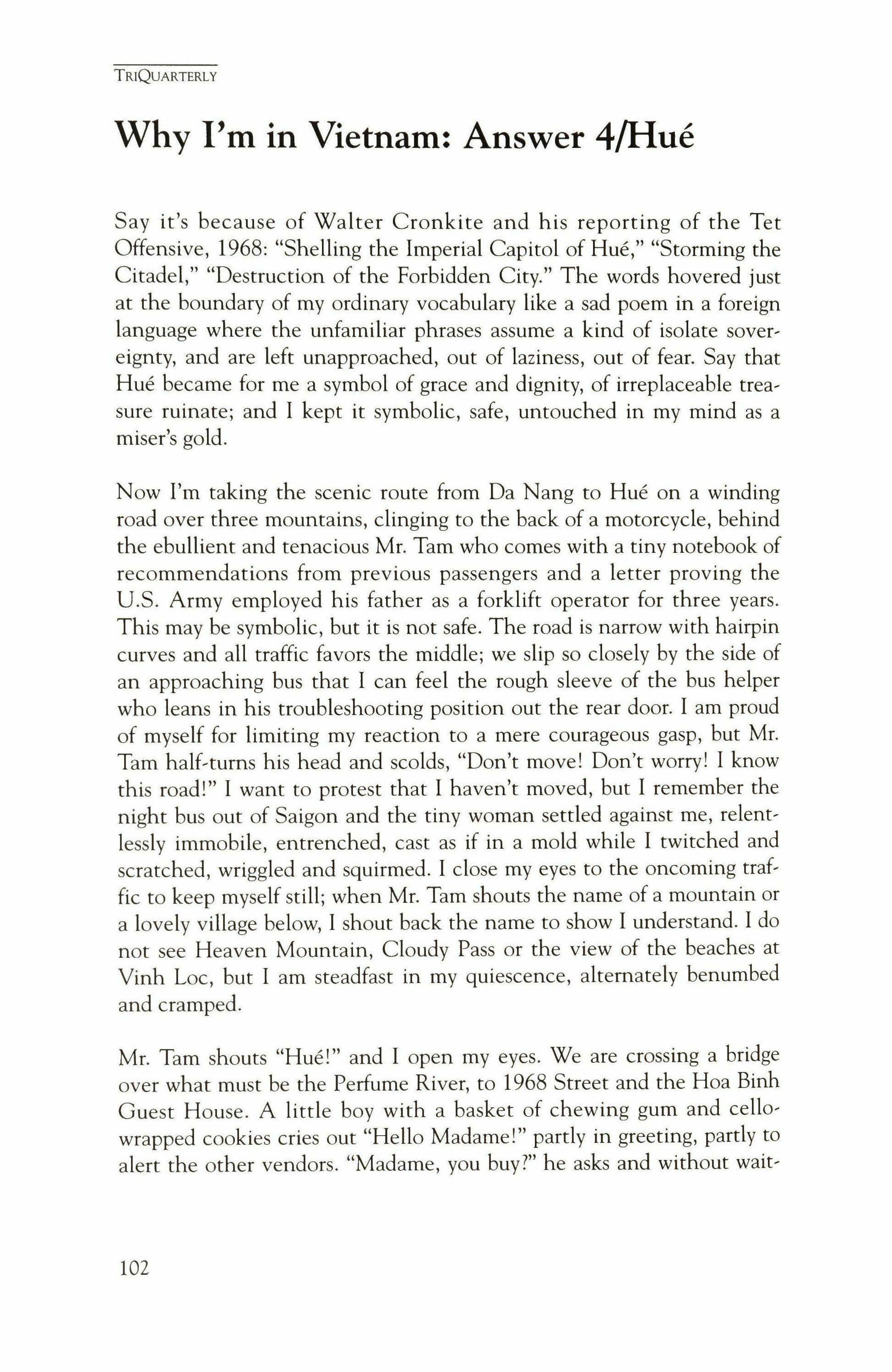
Why I'm in Vietnam: Answer 4/Hue
Say it's because of Walter Cronkite and his reporting of the Tet Offensive, 1968: "Shelling the Imperial Capitol of Hue," "Storming the Citadel," "Destruction of the Forbidden City." The words hovered just at the boundary of my ordinary vocabulary like a sad poem in a foreign language where the unfamiliar phrases assume a kind of isolate sovereignty, and are left unapproached, out of laziness, out of fear. Say that Hue became for me a symbol of grace and dignity, of irreplaceable treasure ruinate; and I kept it symbolic, safe, untouched in my mind as a miser's gold.
Now I'm taking the scenic route from Da Nang to Hue on a winding road over three mountains, clinging to the back of a motorcycle, behind the ebullient and tenacious Mr. Tam who comes with a tiny notebook of recommendations from previous passengers and a letter proving the U.S. Army employed his father as a forklift operator for three years. This may be symbolic, but it is not safe. The road is narrow with hairpin curves and all traffic favors the middle; we slip so closely by the side of an approaching bus that I can feel the rough sleeve of the bus helper who leans in his troubleshooting position out the rear door. I am proud of myself for limiting my reaction to a mere courageous gasp, but Mr. Tam half-turns his head and scolds, "Don't move! Don't worry! I know this road!" I want to protest that I haven't moved, but I remember the night bus out of Saigon and the tiny woman settled against me, relentlessly immobile, entrenched, cast as if in a mold while I twitched and scratched, wriggled and squirmed. I close my eyes to the oncoming traffic to keep myself still; when Mr. Tam shouts the name of a mountain or a lovely village below, I shout back the name to show I understand. I do not see Heaven Mountain, Cloudy Pass or the view of the beaches at Vinh Loc, but I am steadfast in my quiescence, alternately benumbed and cramped.
Mr. Tam shouts "Hue!" and I open my eyes. We are crossing a bridge over what must be the Perfume River, to 1968 Street and the Hoa Binh Guest House. A little boy with a basket of chewing gum and cellowrapped cookies cries out "Hello Madame!" partly in greeting, partly to alert the other vendors. "Madame, you buy?" he asks and without wait-
TRIQUARTERLY
102

ing for the practiced shake of my head, continues, "Madame see Forbidden City? Totally awesome place!" I have smiled a great deal in this country, but now I am laughing, the inelegant whoop I try to curb even back home, and under the disapproving eye of Mr. Tam I bargain awkwardly, exchanging precious American dollars for gum and cookies, smuggled Kodak film and a bamboo fan that releases a delicate scent of lotus when waved before me.
TRIQUARTERLY
103

a portfolio of artwork by Charles Wells
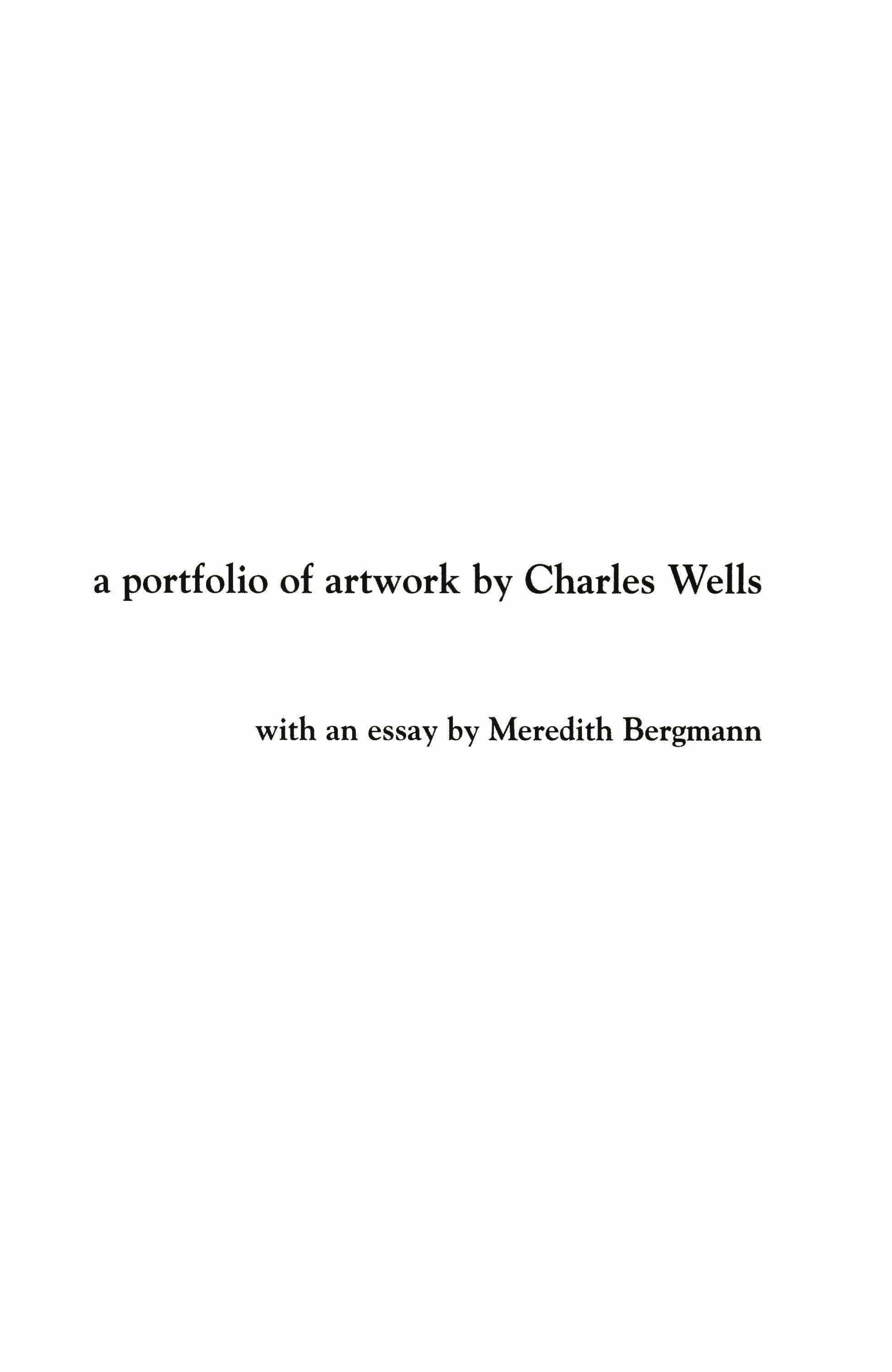
with an essay by Meredith Bergmann
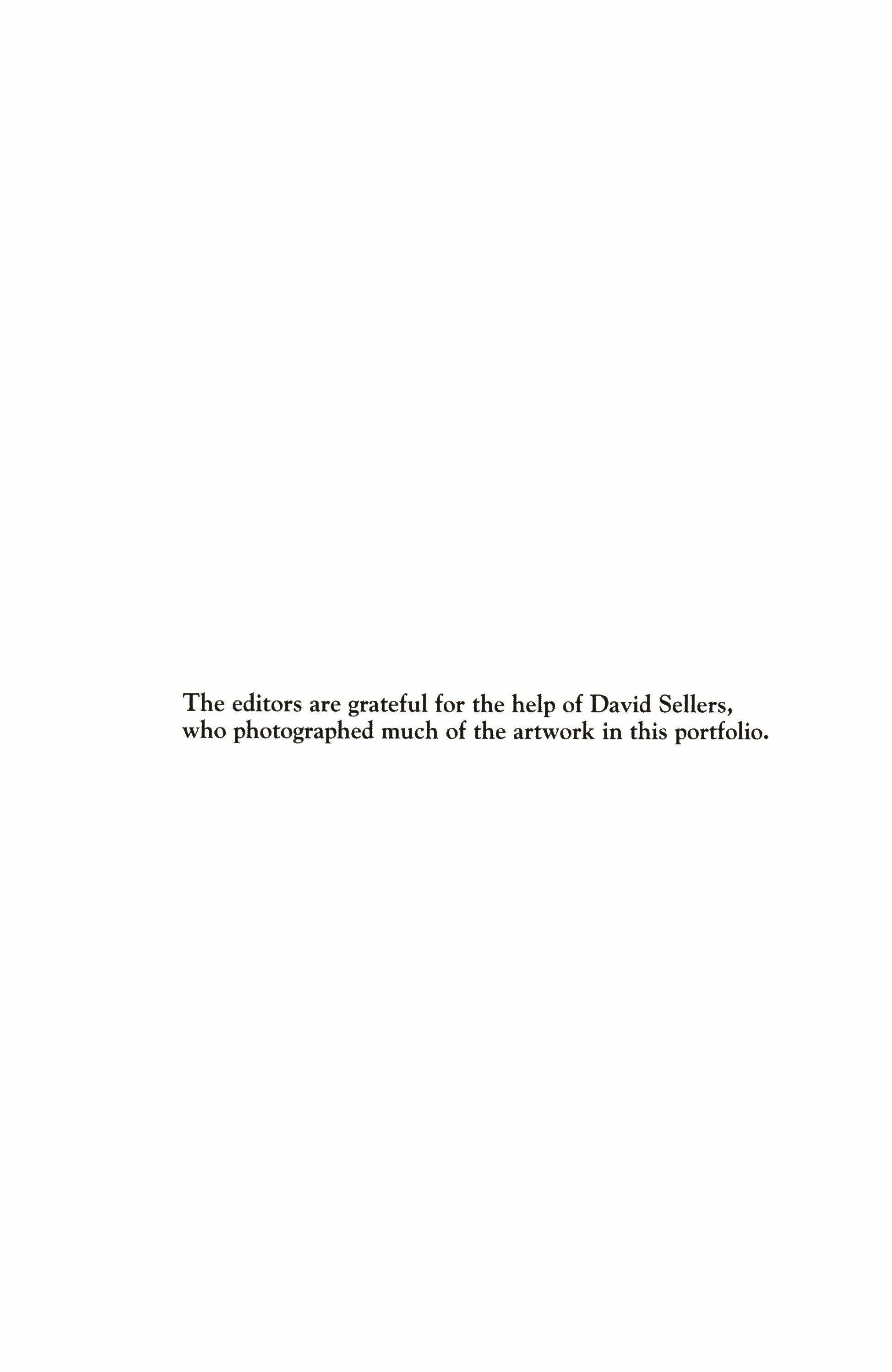
The editors are grateful for the help of David Sellers, who photographed much of the artwork in this portfolio.
The Arm and the Wing
Meredith Bergmann

Charles Wells likes to work with indigenous materials. As a young artist, he lived in Italy and carved the local marble, but for the last fifteen years he has lived in the place to which he is native: his family's overgrown farm near the Delaware River. Here he carves mainly in wood, retrieving storm-felled trees from neighbors. "This winter we had a lot of lovely storms," he says. "Their disaster is my benefit." Here he has flourished, making the whole place his studio, carving wood and stone in the bam, etching and printing in the house and, out in the woods beyond the garden, building (and tearing down, and rebuilding) a fieldstone structure aligned with the winter solstice that he calls a "henge." Along the path to the bam, cobwebbed marble figures stand in various stages of completion amid apple trees and heaps of firewood or recline among grasses, wild strawberries and plantain. In the bam, wooden angels hang lightly on Sheetrock walls, motionless and silent amid waves of sound: the uncanny laughter of chickens, the sighing of bullfrogs and the insistent buzzing of cicadas. Figures carved lying in boats or on long boatshaped cushions vie for space with a kayak and an inflatable raft. Everywhere, there are books-shelves and stacks of them: adventure stories, Breughel's Drawings, Dr. Faustus, The Recognitions, Fractals. The etching studio has the feeling of a study, full of papers and lit from a clerestory along the spine of the roof. Here Wells makes portraits of family, friends and a kind of extended family. These are great figures from the history of ideas, whose faces, freshly seen and reconstructed by study and countless delineating strokes, reveal a divine spark. The practice of making historical portraits, and to some extent that of creating disconcertingly asymmetrical faces, comes from Wells's teacher Leonard
TRIQUARTERLY
107

Baskin. For Baskin, a sculptor, printmaker and calligrapher whose weighty, middle-aged generals with death's heads, crows with tattered feathers and bandaged, peeling figures have been emblems of antiwar sentiment since the Vietnam era, asymmetry is part of an overall grotesqueness of form. For Wells, it's a trick of the light-Rembrandt's light bent by Einstein's gravity. Each eye reveals a different section of the soul, of the Inward Light of Wells's Quaker forebears. James Joyce's right eye, like a locket, contains his daughter's face. Frederick Douglass's left eye is disrupted by a wedge of light from his own glowing forehead. Einstein has the gleam of an idea, simultaneously remembered and imagined, in his shadowed eye, while light bleaches the other side of his face into a dreamy death mask. Through all these faces wander tendrils of etched line, tracing the borders of planes and then rippling away to feel out some invisible. more delicious contour. Wells was a devoted and obedient apprentice to Baskin, learning to draw again from scratch, learning to seek among the great ideas and images of European culture for a context for his work. Yet in the maturity of his wandering line one can see the intuition that freed him from his teacher and that continues to propel him, gently, to seek for what is original and universal.
In Rome in the mid-sixties, surrounded by walls in which chunks of monuments to immortal fame have been used as literal building material, Wells developed a fascination with palimpsests. The act of erasure in etching, the bringing back of light, requires an actual physical struggle, hours of grinding and burnishing the metal plate to reattain smoothness. In some of Wells's etchings traces of earlier profiles or limbs remain, and one discovers them while following seemingly arbitrary lines. In his wood sculptures, Wells uses incised lines in similar ways. Some figures appear to have been gnawed by worms whose rhythms are mysterious until one sees the exposed tunneling as a drawing of a profile on a plane, or the multiple gestures of an arm within a wing. Lines of grain throughout the wood are used with extraordinary sensitivity to set up abstract rhythms as well as to bind looming figures to their backgrounds. The color of wood itself, from golden blond to deep caramel, brings radiance to Wells angels, which seem metamorphosed from the souls of trees: sheltering, unfolding, rising. In his marble pieces, he burrows deep into the stone, seeking the translucency of the crystalline structure, turning his hieratic figures into filters for the sun.
When Wells speaks about his work, it is in practical, technical terms: about the difficulty of rendering contemporary clothing as drapery, about the self-limiting nature of carving, about etching and the recla-
TRIQUARTERLY
108

mation of light. He does not acknowledge the spiritual and religious themes as emotionally important to him, but is a spiritual artist nonetheless. He says he began making angels by adding wings to figures to increase the area surrounding them on which he could incise decoration. He doesn't try to explain why that decoration takes the sole, symbolically charged form of feathers. He may be reacting to the Quaker rejection of both religious imagery and decoration in favor of "simplicity" by equating them. Wells is deeply drawn to the passionate, sensuous and joyful religious art of the Renaissance and to the delicacy and gravity achieved by Northern Gothic woodcarvers, but he must work in a secular time. Perhaps the Quakers' emphasis on an individual's private, unmediated relationship with God has helped him. His modest speech is protective: it rationalizes and disguises, maybe even from the artist himself, the intuitive, spiritual decisions that underlie his work. There is poignancy in this disguise and in the theme of incomplete metarnorphosis that characterizes Wells's work. The angels are wrestling out of cloaks of flesh; the faces of the great are only half attentive, eluding our attempts to focus them on ourselves. The art of the past, with its serious and communal purpose, can come only partway to life again as part of an individual's independent struggle to create meaning. Yet Charles Wells seems to be a man at peace with himself and his time, holding in enviable balance the slim, youthful arm and the antique wing, the gouging shadow and the polishing light.
TRIQUARTERLY
109

 Zelfportret / "Man in a Mirror"
Zelfportret / "Man in a Mirror"
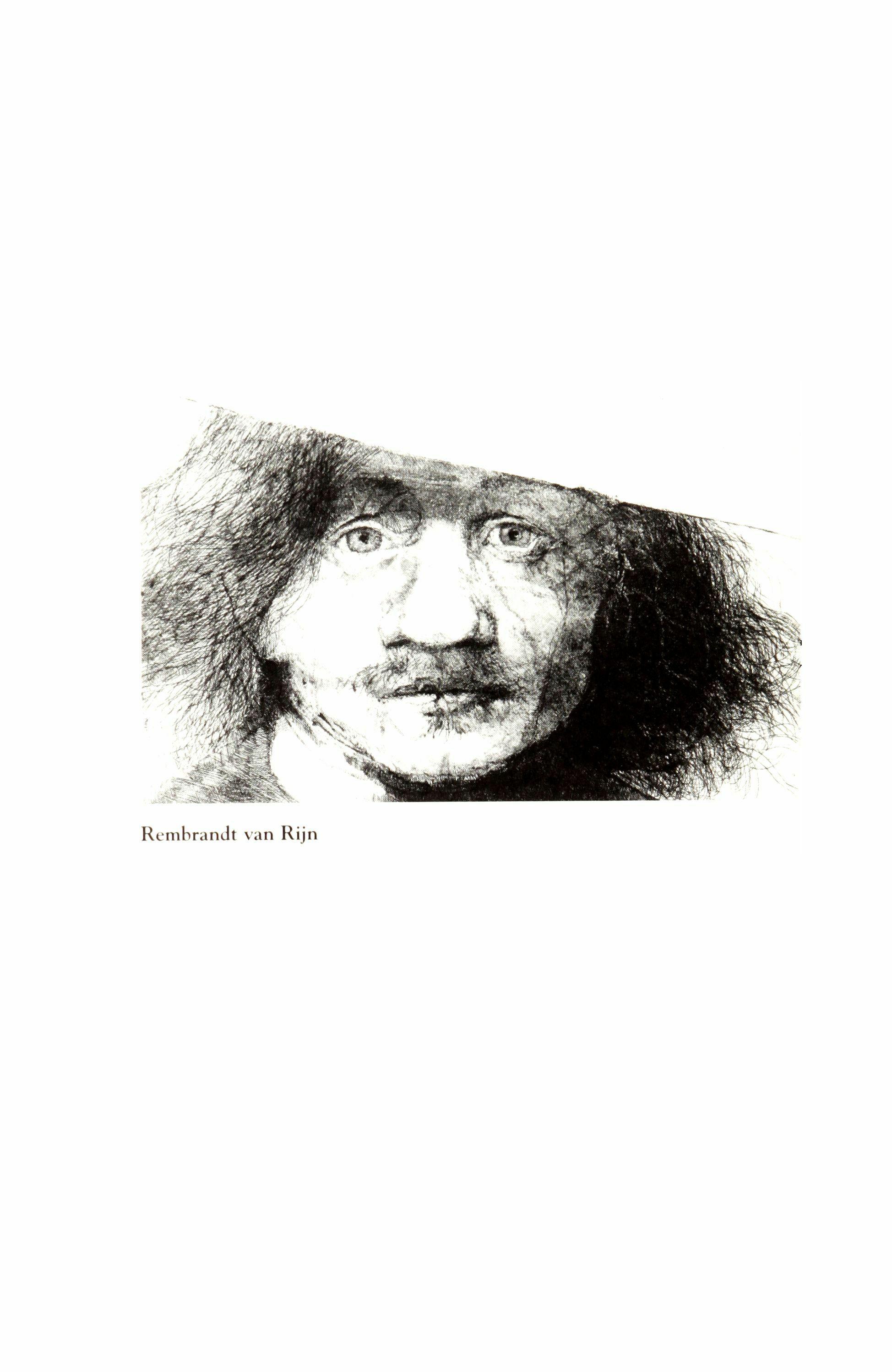
Rembrandt van Rijn
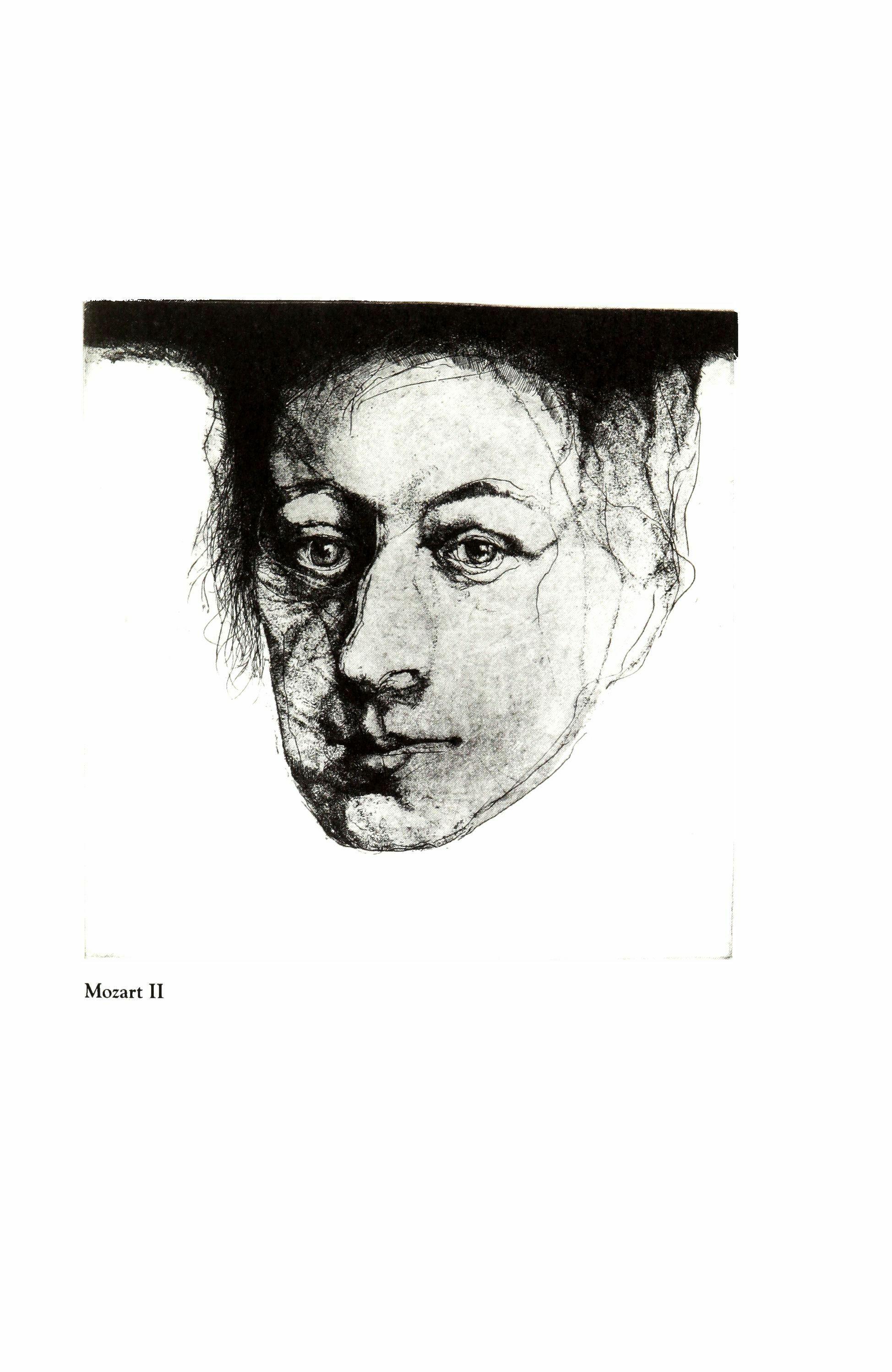 Mozart II
Mozart II
 Walt Whitman
Walt Whitman

.:>
Frederick Douglass
 Hart Crane
Hart Crane
 Einstein
Einstein
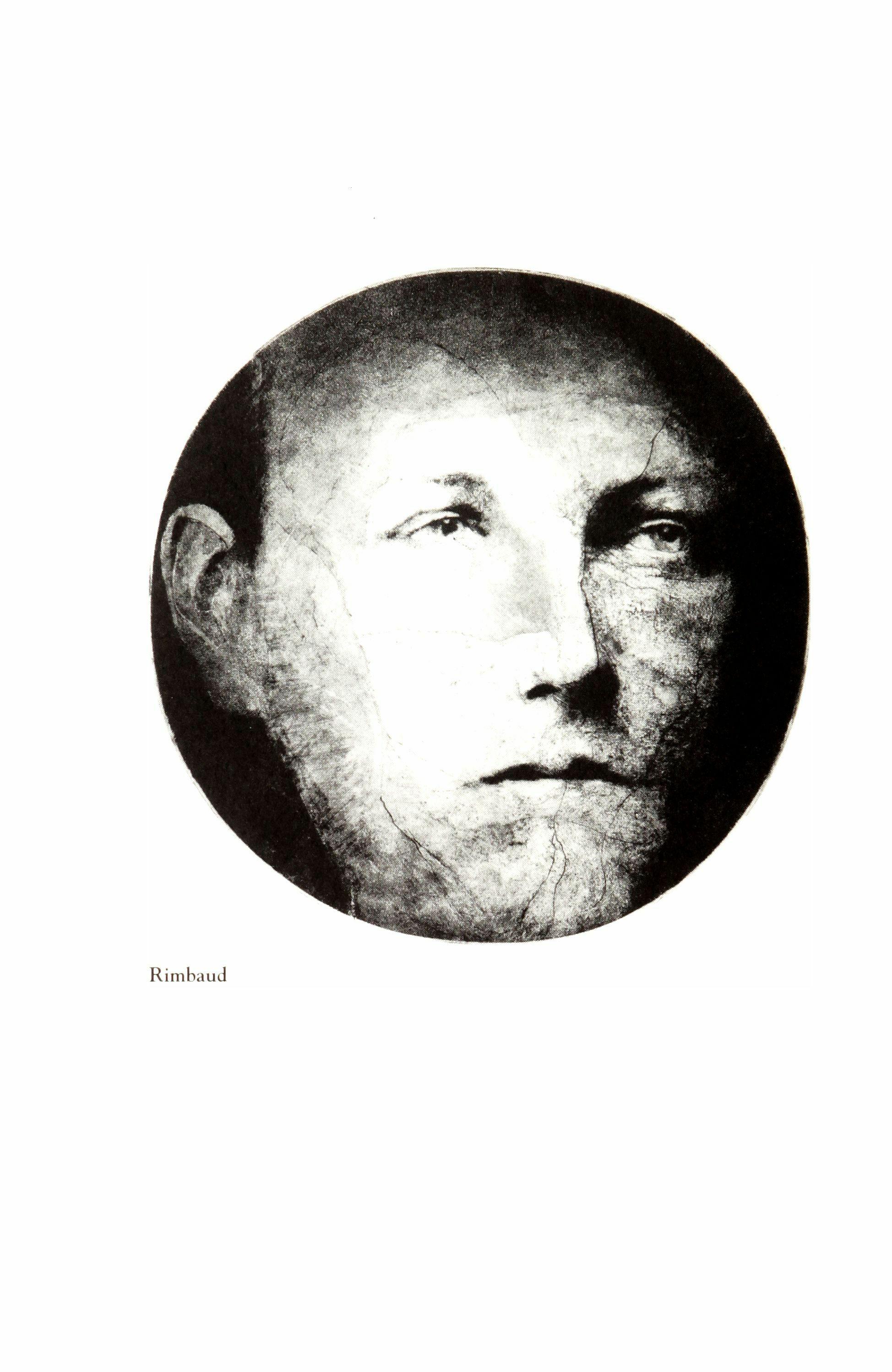 Rimbaud
Rimbaud
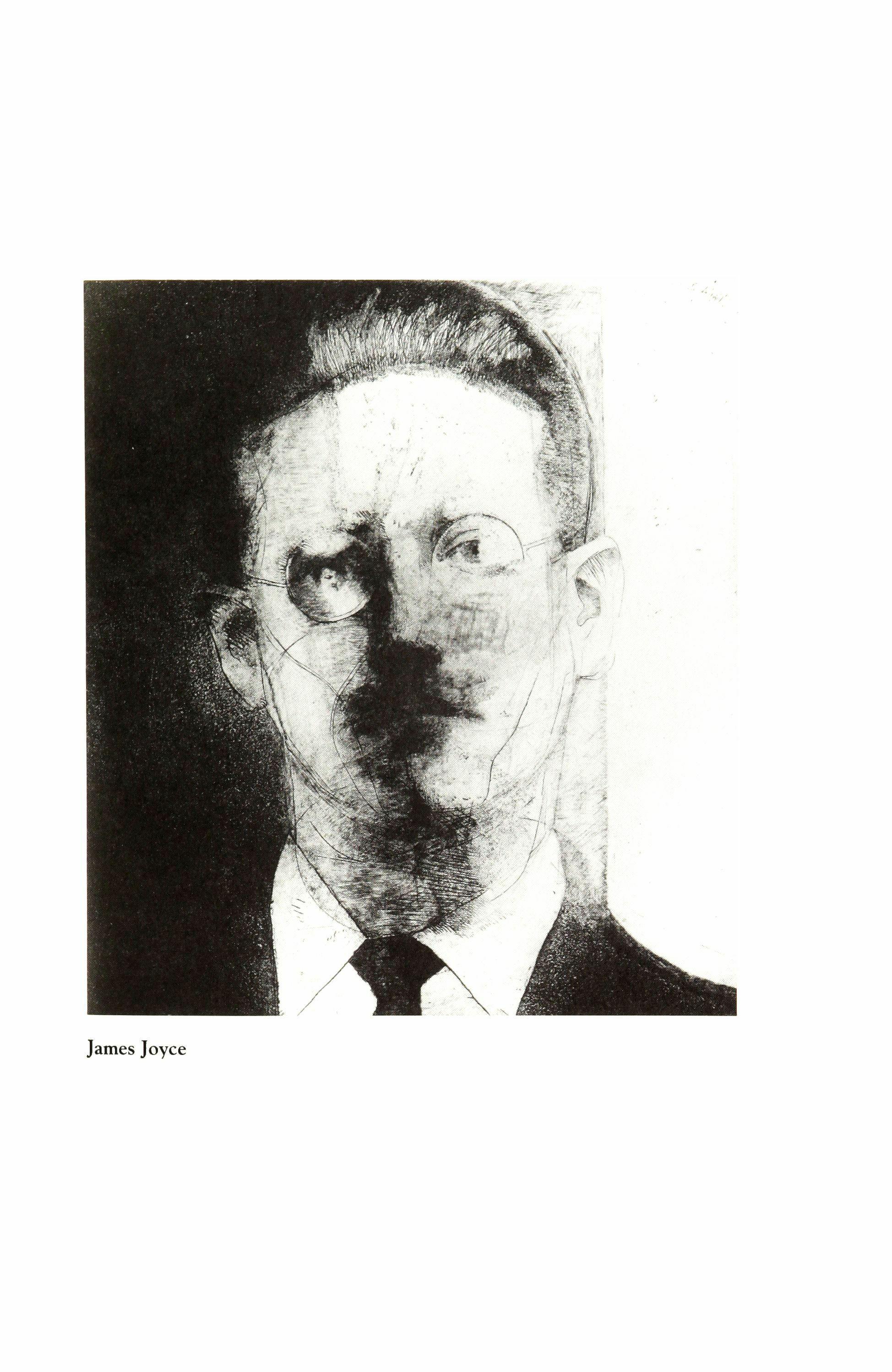 James Joyce
James Joyce
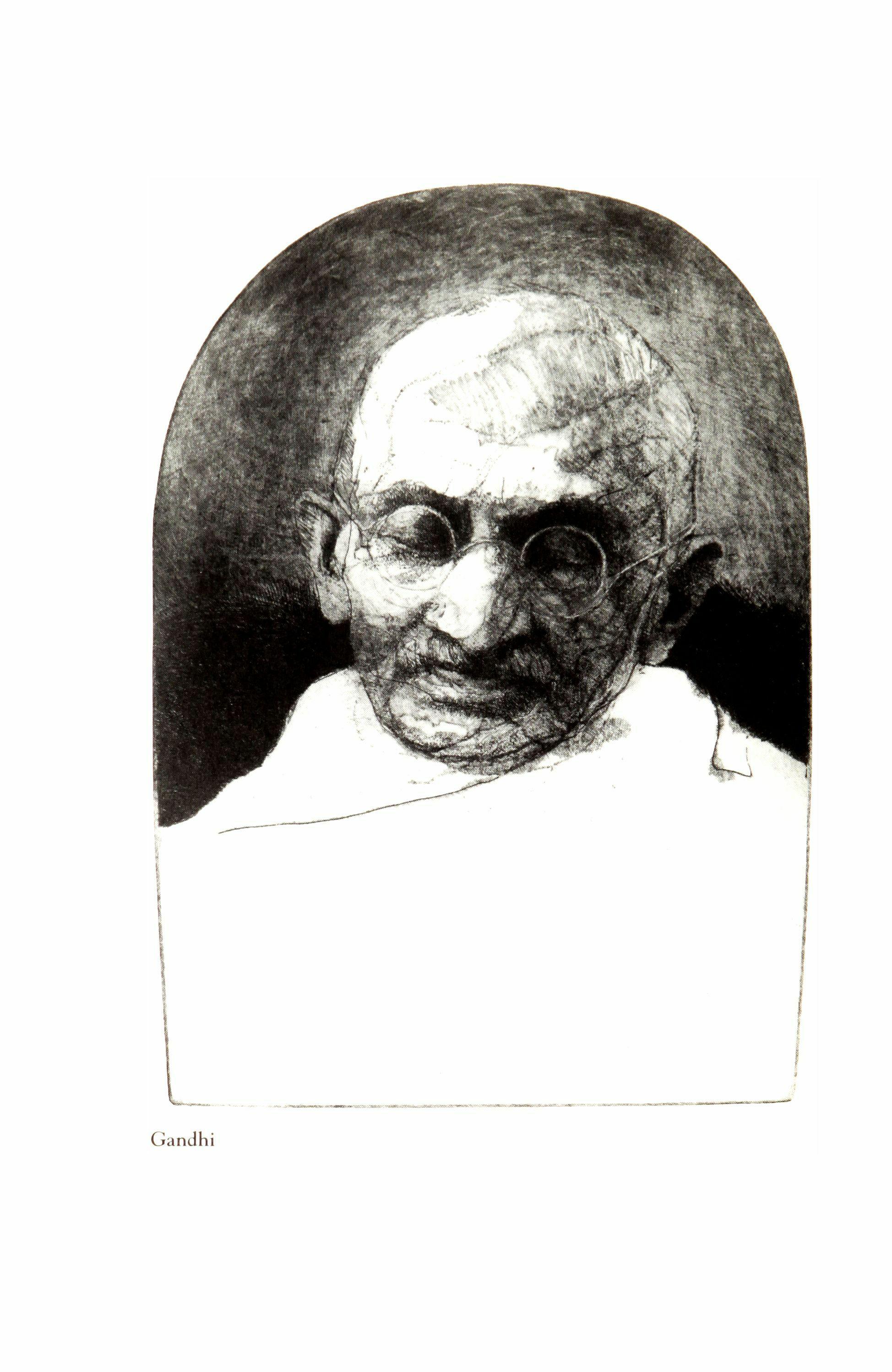
i \ \ L I I Gandhi
 Ramon Benitez
Ramon Benitez

 Wooden Floor
Wooden Floor
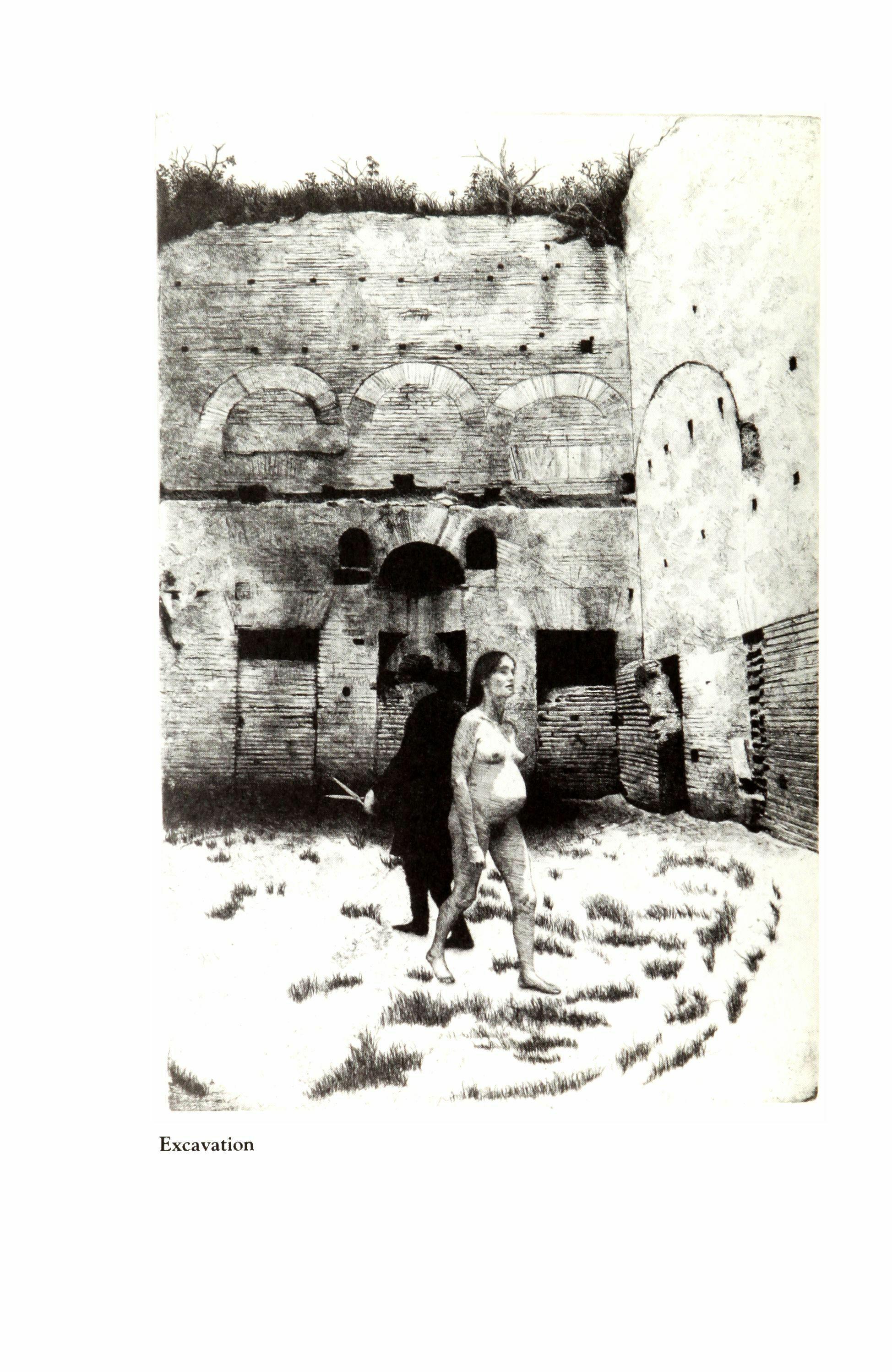
Excavation
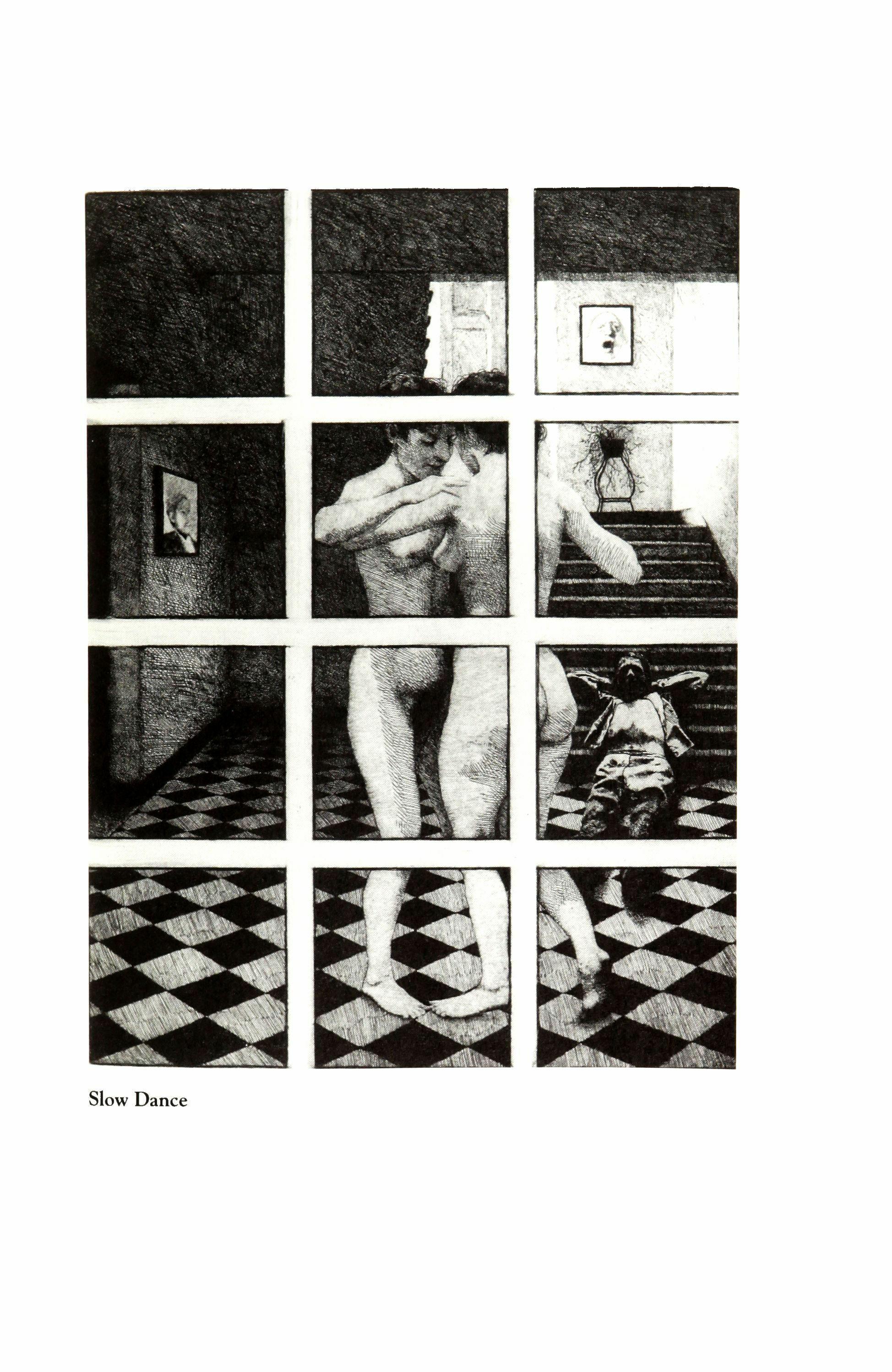
•.. ;,,11
Slow Dance
 Balanced Figure
Balanced Figure
 Passenger
Passenger
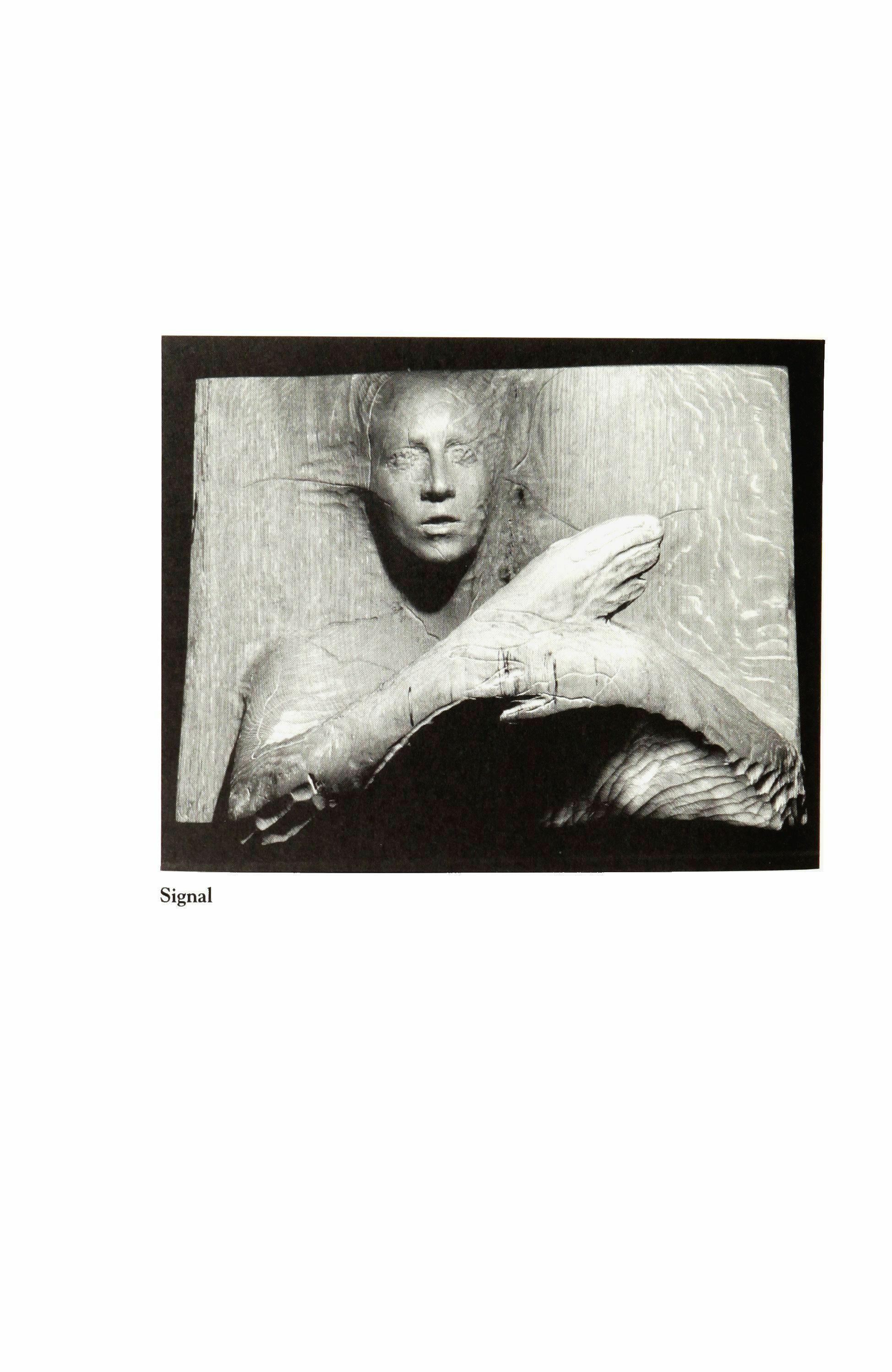
 Winged Figure
Winged Figure
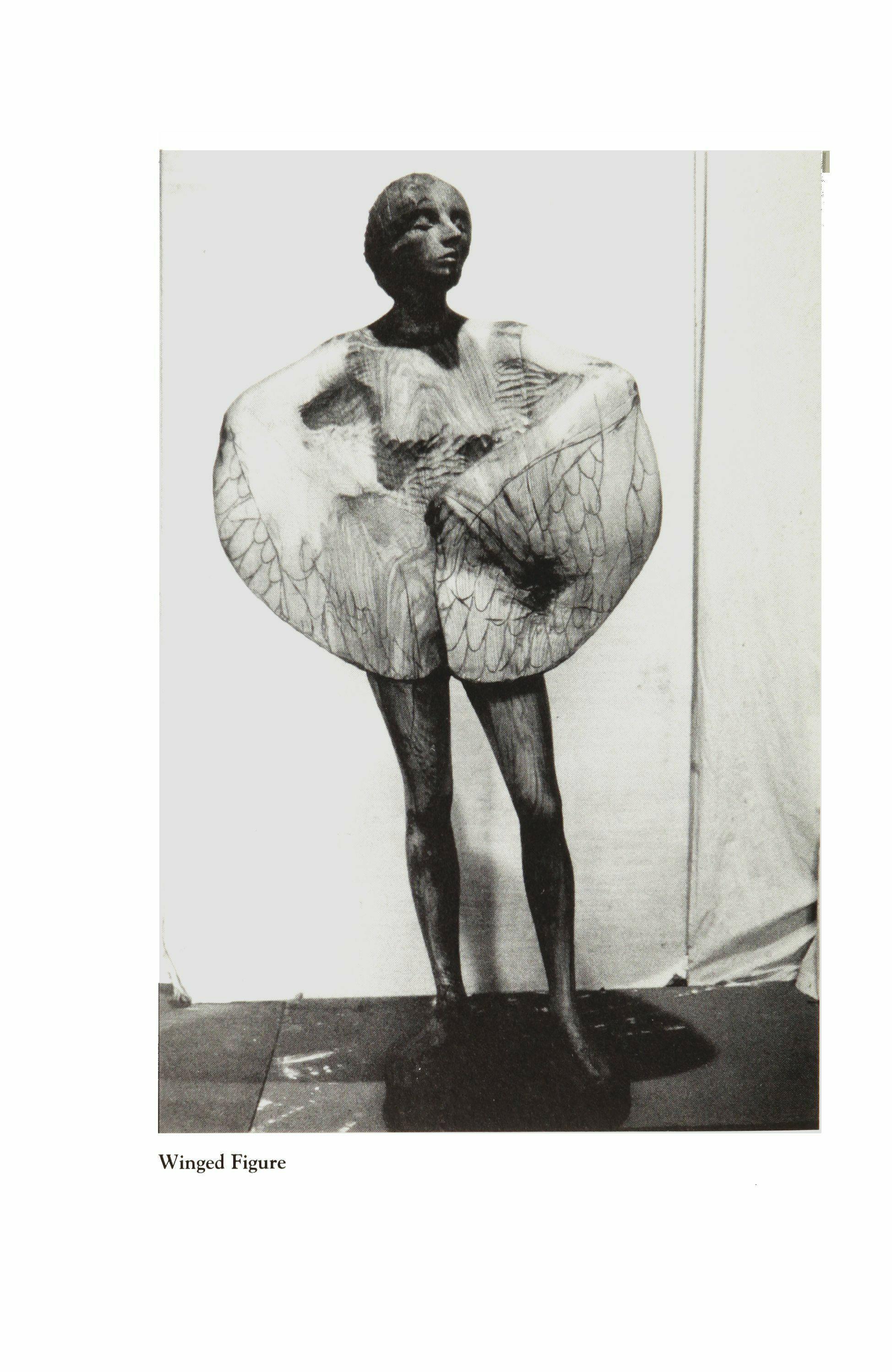 Winged Figure
Winged Figure
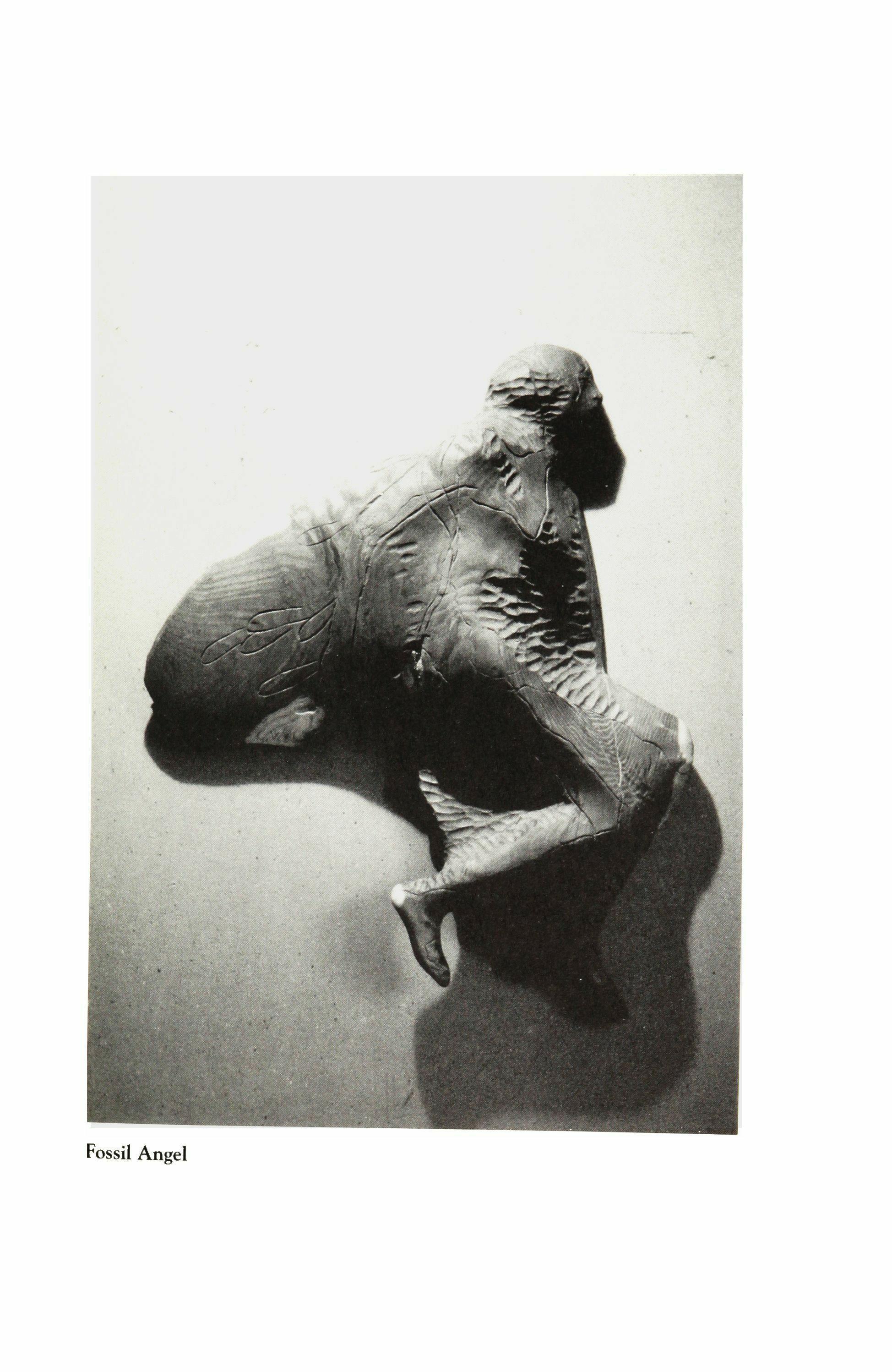 Fossil Angel
Fossil Angel
 Angel
Angel
 Tumbling Angel
Tumbling Angel

Supplicant
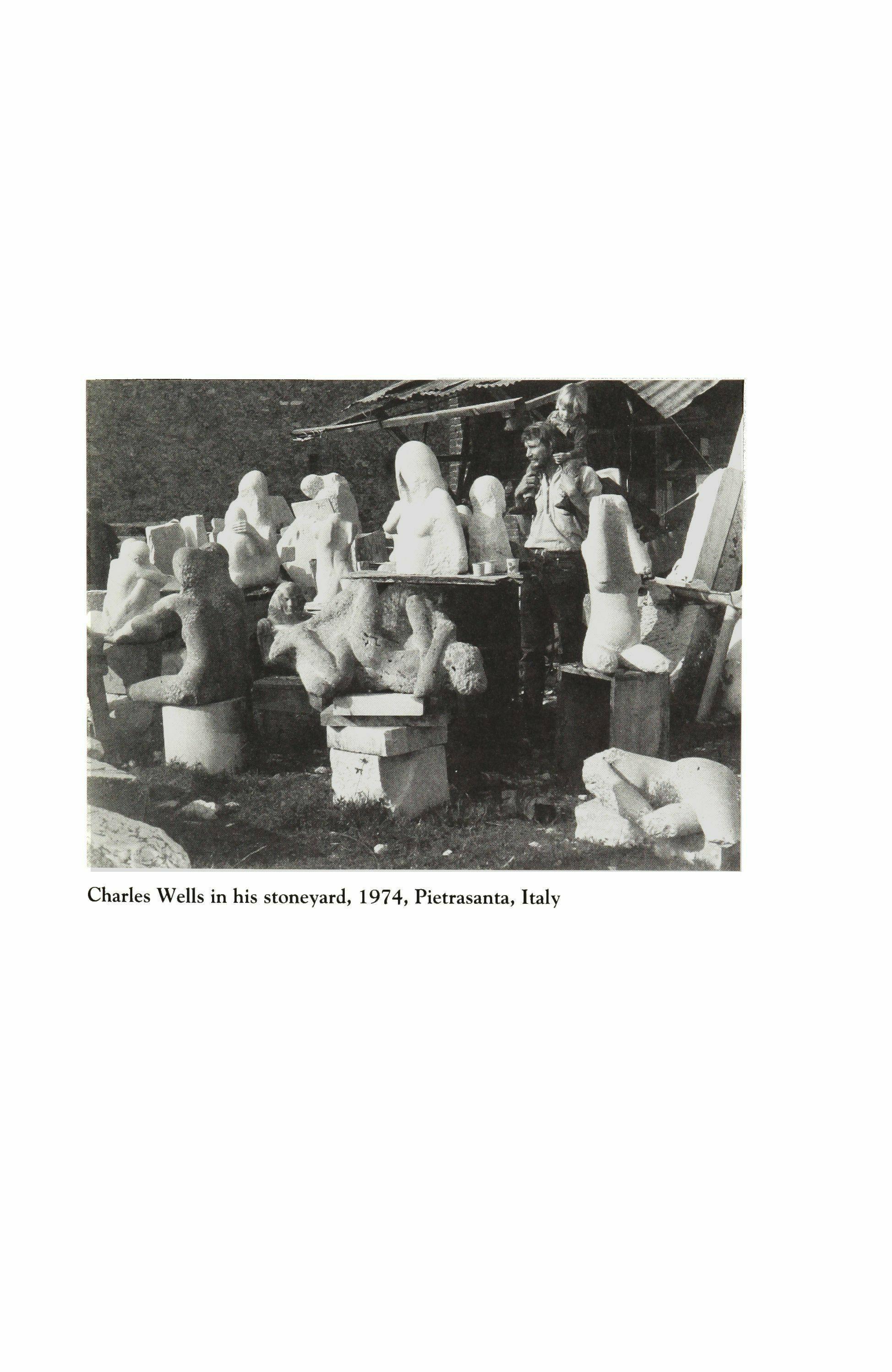 Charles Wells in his stoneyard, 1974, Pietrasanta, Italy
Charles Wells in his stoneyard, 1974, Pietrasanta, Italy



Woodstock Puritan
Alan Shapiro

1
For some mysterious reason, most of my friends in childhood and adolescence were from broken homes. In grade school, the kids I ran withSaul Chessler, Stevie Goldstein, Michael Carr and Gary O'Brien-were raised by single mothers, and they all went to wonderful places and did exotic things on the weekends when their fathers visited. They went to movies, ball games, circuses, museums; in the summertime, they took day trips to the Cape, or to the North Shore; they went camping and hiking in Maine, Vermont, New Hampshire. I, whose parents were thoroughly, if not happily, married, never went anywhere. Whatever fission of the early sixties split apart the nuclear family inside other people's houses became the glummest fusion of the fifties in my own. And as the weekends rolled around and my friends deserted me, with my mother down in the basement doing laundry all afternoon, and my father napping in the den before the droning television, it was hard not to think that life was a perpetual party, and only those kids got invited whose parents were divorced. I used to beg my parents to please get divorced, or separate at least, so I could go someplace for once, do something exciting. They'd laugh and pat me on the head and say, "What a card, what a sense of humor."
By the time I went to high school, I'd long since given up any hope of their divorcing, but I was still drawn to kids from broken homes. My closest friend in those years was Jeff Morrison. At the beginning of our freshman year, Jeff had moved to Brookline with his mother and his
TRIQUARTERLY
139

brothers, John and Bruce, after his parents got divorced. Even at fifteen, Jeff was a handsome, even manly,looking kid, dark-haired and muscular. But his apparent manliness was qualified, if not entirely undercut, by his utter guilelessness, his incapacity for deceit or dissimulation. He was kindhearted, and too trusting. He had an almost childlike faith in the goodness of other people, assuming everyone accepted him on his own terms as he accepted them on theirs. Though he never talked about his family, or how the divorce affected him, I wonder now if his inveterate openness to others, his almost reckless refusal to think that anyone would do him harm, wasn't in some way a reaction to the pain and betrayal he may have felt about his absent father, his broken home-as if he thought the more remote somebody was to him, the more reliably familial that person was or ought to be. Though it confused and bewildered him when other kids would take advantage of his great good nature, or when adults would misinterpret his naive honesty for disrespect, he was incapable of changing, of taking on a more guarded, more circumspect demeanor. His innate, unsophisticated decency seemed to prevent him from learning from experience.
But it wasn't just his innocence that made him vulnerable to others. Jeff also had about him a rather hapless air; he had a gift for getting himself into difficult and embarrassing situations. I discovered this soon after we met at tryouts for basketball. We both made the freshman team, and the school supplied uniform and sneakers but we had to purchase our own jockstraps. Jeff and I went to a local sporting goods store. I bought a medium jockstrap. Jeff bought an extra,large. Now I'd already seen him in the showers after tryouts, so I was a little surprised. He was well enough endowed, but an extra large? When I called him on this, he said, "Didn't you see that beautiful chick at the cash register?" I said yeah, I saw her. So what? "Well," he said, "I thought maybe if I got an extra large she might, you know, notice me." She didn't, of course, and now he was stuck with a jockstrap that maybe the Jolly Green Giant could have worn, but certainly not Jeff. It looked more like an oxygen mask than a jockstrap. All that year, as we got dressed for games and practices, Jeff had to put up with merciless teasing from his teammates. Invariably somebody would pull on the baggy cup and call down into it, "Anybody home?" "My man, you got room in there for all the team equipment," Dale Clarke, one of the black kids, used to say. "You suffering some serious delusions." Jeff would laugh along with everybody else. He took the razzing in stride, submitted to it the way he submitted to life in general, with cheerful, even dignified acceptance.
TRIQUARTERLY
140
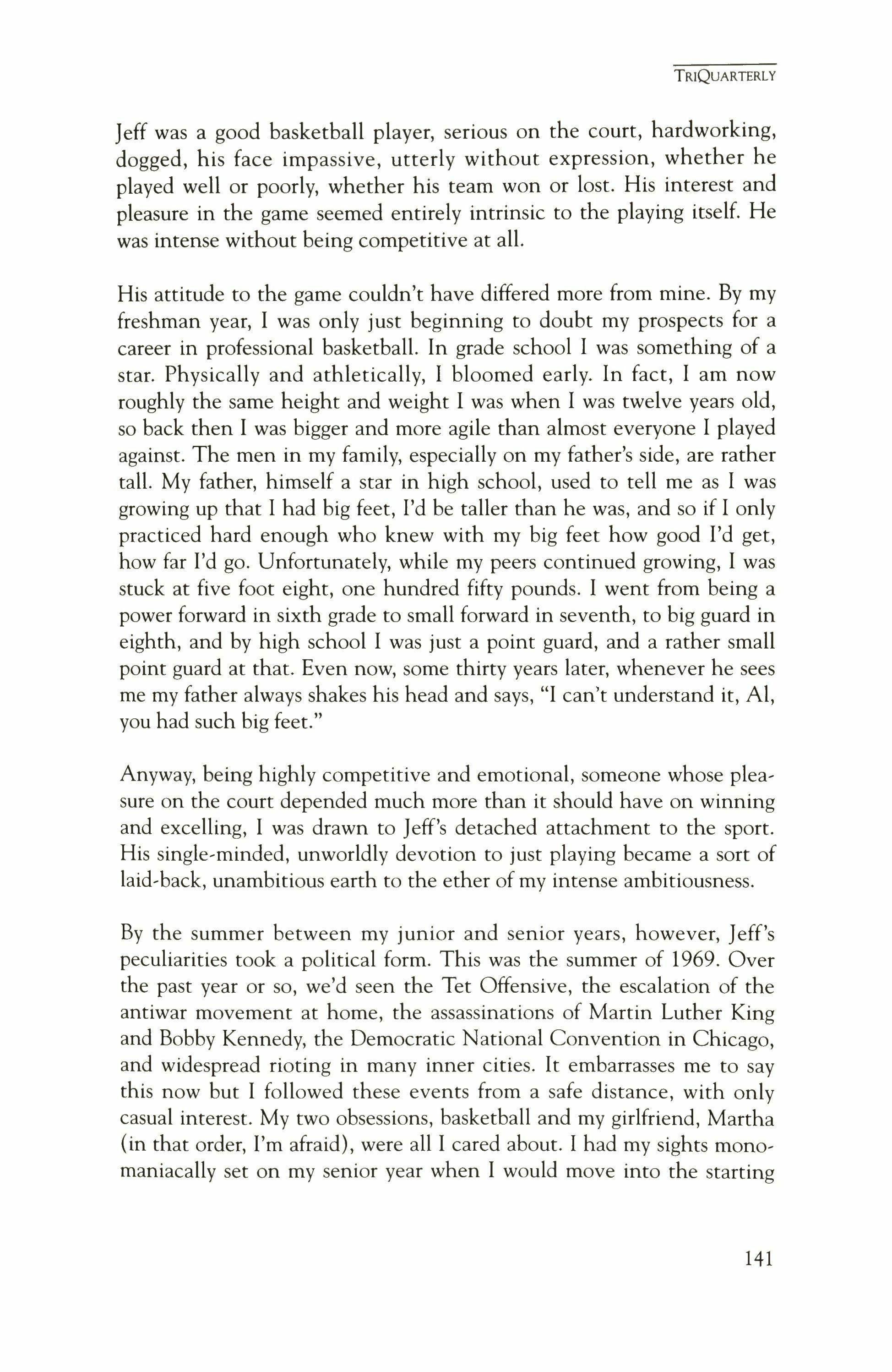
Jeff was a good basketball player, serious on the court, hardworking, dogged, his face impassive, utterly without expression, whether he played well or poorly, whether his team won or lost. His interest and pleasure in the game seemed entirely intrinsic to the playing itself. He was intense without being competitive at all.
His attitude to the game couldn't have differed more from mine. By my freshman year, I was only just beginning to doubt my prospects for a career in professional basketball. In grade school I was something of a star. Physically and athletically, I bloomed early. In fact, I am now roughly the same height and weight I was when I was twelve years old, so back then I was bigger and more agile than almost everyone I played against. The men in my family, especially on my father's side, are rather tall. My father, himself a star in high school, used to tell me as I was growing up that I had big feet, I'd be taller than he was, and so if I only practiced hard enough who knew with my big feet how good I'd get, how far I'd go. Unfortunately, while my peers continued growing, I was stuck at five foot eight, one hundred fifty pounds. I went from being a power forward in sixth grade to small forward in seventh, to big guard in eighth, and by high school I was just a point guard, and a rather small point guard at that. Even now, some thirty years later, whenever he sees me my father always shakes his head and says, "I can't understand it, AI, you had such big feet."
Anyway, being highly competitive and emotional, someone whose pleasure on the court depended much more than it should have on winning and excelling, I was drawn to Jeff's detached attachment to the sport. His single-minded, unworldly devotion to just playing became a sort of laid-back, unambitious earth to the ether of my intense ambitiousness.
By the summer between my junior and senior years, however, Jeff's peculiarities took a political form. This was the summer of 1969. Over the past year or so, we'd seen the Tet Offensive, the escalation of the antiwar movement at home, the assassinations of Martin Luther King and Bobby Kennedy, the Democratic National Convention in Chicago, and widespread rioting in many inner cities. It embarrasses me to say this now but I followed these events from a safe distance, with only casual interest. My two obsessions, basketball and my girlfriend, Martha (in that order, I'm afraid), were all I cared about. I had my sights monomaniacally set on my senior year when I would move into the starting
TRIQUARTERLY
141

lineup of the varsity team. But even if basketball hadn't so completely occupied my mind and heart, I doubt I would have joined the studentled antiwar movement. I was too cowed by my father in those days, too fearful of doing anything he'd disapprove of. Not that he was dictatorial or hypercritical. Far from it. In his eyes, I could do no wrong, especially as an athlete. If I had a bad game (and he came to all of them, even hitchhiking sometimes out to the remoter suburbs to see me play), it was the coach's fault for not utilizing my abilities, or my teammates' for not playing up to my level, or the officials' for favoring the other team. No matter how I played, he praised me, and the more he praised me, the more acutely I would feel the discrepancy between the player he imagined me to be and the player I knew I was. After awhile I began to feel his disappointment was in direct proportion to his encouragement, his compliments a measure of my failure. The pressure of trying to justify his excessive faith in my abilities made me resent him even as it terrified me I might let him down.
In reaction to the social turmoil taking place around us, I think he began to fear that I might throwaway what I had worked so hard for. He grew more watchful, protective and authoritarian than he normally was. We'd watch the nightly news at dinnertime, the latest body counts from Vietnam, the rioting at home, the demonstrations, marches, drug busts, and even though he was against the war, repeatedly he'd warn me if I got involved in any protests he'd disown me, as he had already disowned my older sister who, as a graduate student at Michigan State University, was a member of SOS and had been arrested several times for antiwar activities. She was also living with a black man, her love life and politics seamlessly expressing an out-and-out assault on the middle-class American values my parents represented. They'd already lost her, and they were going to make damn sure, for my own good, they didn't lose me too. To keep me busy when I wasn't on the court, my father got me a job downtown as a stock boy with a novelty wholesaler. Mornings on our way to work, we'd pass the hippies sleeping on the stairs of the Arlington Street Church. "Look at that," he'd say, pointing at the long hair, bare feet and dirty clothes. "If they want to live like dogs we ought to treat 'em like dogs, we ought to round 'em up and shoot 'em. How can they do this to their parents?"
That summer Jeff let his hair grow long, partly to overthrow "the system," but mostly just to imitate his older brother who, as I recall, was a
TRIQUARTERLY
142
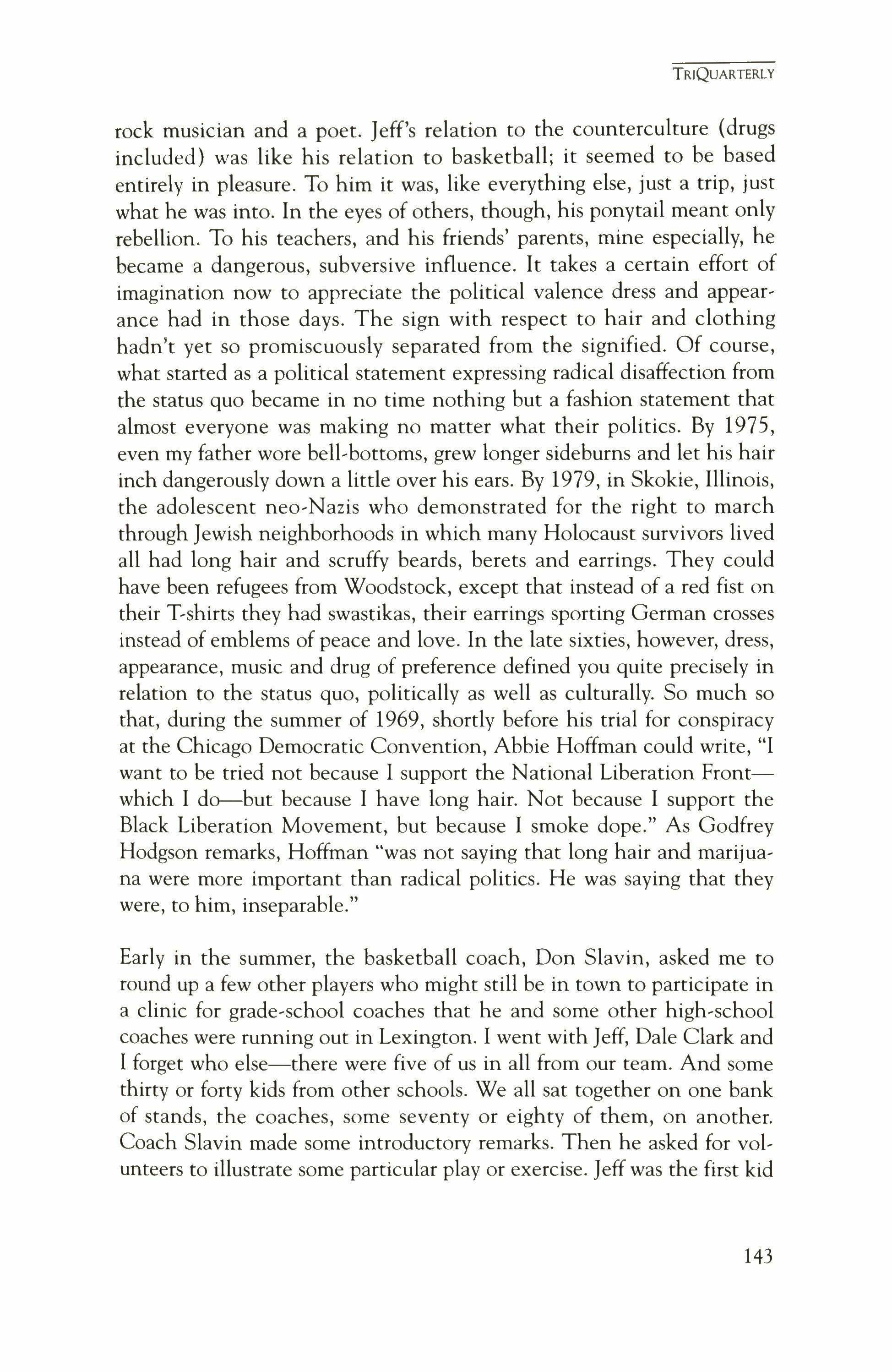
rock musician and a poet. Jeff's relation to the counterculture (drugs included) was like his relation to basketball; it seemed to be based entirely in pleasure. To him it was, like everything else, just a trip, just what he was into. In the eyes of others, though, his ponytail meant only rebellion. To his teachers, and his friends' parents, mine especially, he became a dangerous, subversive influence. It takes a certain effort of imagination now to appreciate the political valence dress and appearance had in those days. The sign with respect to hair and clothing hadn't yet so promiscuously separated from the signified. Of course, what started as a political statement expressing radical disaffection from the status quo became in no time nothing but a fashion statement that almost everyone was making no matter what their politics. By 1975, even my father wore bell-bottoms, grew longer sideburns and let his hair inch dangerously down a little over his ears. By 1979, in Skokie, Illinois, the adolescent neo-Nazis who demonstrated for the right to march through Jewish neighborhoods in which many Holocaust survivors lived all had long hair and scruffy beards, berets and earrings. They could have been refugees from Woodstock, except that instead of a red fist on their T-shirts they had swastikas, their earrings sporting German crosses instead of emblems of peace and love. In the late sixties, however, dress, appearance, music and drug of preference defined you quite precisely in relation to the status quo, politically as well as culturally. So much so that, during the summer of 1969, shortly before his trial for conspiracy at the Chicago Democratic Convention, Abbie Hoffman could write, "I want to be tried not because I support the National Liberation Frontwhich I do-but because I have long hair. Not because I support the Black Liberation Movement, but because I smoke dope." As Godfrey Hodgson remarks, Hoffman "was not saying that long hair and marijuana were more important than radical politics. He was saying that they were, to him, inseparable."
Early in the summer, the basketball coach, Don Slavin, asked me to round up a few other players who might still be in town to participate in a clinic for grade-school coaches that he and some other high-school coaches were running out in Lexington. I went with Jeff, Dale Clark and I forget who else-there were five of us in all from our team. And some thirty or forty kids from other schools. We all sat together on one bank of stands, the coaches, some seventy or eighty of them, on another. Coach Slavin made some introductory remarks. Then he asked for volunteers to illustrate some particular play or exercise. Jeff was the first kid
TRIQUARTERLY
143

to jump down out of the stands. This must have been the first time Coach Slavin had seen Jeff since the spring. His jaw dropped when he saw Jeff's ponytail and red headband. "This is boy's basketball," he said with mock sincerity. "The girls don't meet till next week." Some of the players giggled. The coaches were all dead silent. Jeff didn't realize at first that he was being told to leave. He just stood there, stone-faced, waiting for the coach's instructions. "Go on," the coach shouted after a moment. "Go on, get out of here. You're no longer on the team."
In his defense, let me say that Coach Slavin was a decent man, all things considered. Unlike most of the coaches I had had by then, he was too irritable to be a tyrant. He saw himself less as a Vince Lombardi "molder of character" than as an undeserving and long-suffering victim of the inadequacies of the adolescent players he was stuck with. During games or practices, he never chewed us out about our failures and mistakes. He never ranted or abused us. Like a despairing husband with a wife he knows he can neither change nor live without, he'd stroke his close-cropped head in exasperation, pleading with us, whining, for God's sake, get back on defense, don't rush your shots, look for the open man Harried irritability was about as close as he ever got to joy or passion. His dedication to coaching was a function not of an overwhelming desire to win but rather of a fear of losing, of humiliation. Not to be embarrassed by us was his sole ambition. To play poorly, of course, was one thing. To act badly, to show him up before his colleagues, was unforgivable.
I sat there in mortified silence as Jeff walked out of the gym. I was appalled and outraged, yet I knew that if I did the right thing by walking out or speaking up on his behalf I'd be thrown off the team as well. Even later when the coach pulled me aside to ask what in the world was I thinking of, how could I bring Jeff here and embarrass him like that, embarrass the team, the school, I didn't respond, afraid of what he'd do. I knew that by my silence I had taken sides, and that it was the wrong side. And I felt ashamed.
Jeff, on the other hand, didn't seem to mind. "What a trip," was all he said when we met him later at the car. "What a trip," as if what happened was just what happened, something to contemplate with fascination or amusement. "Don't let him get away with this," I said, now angrier than ever, wanting him at least to stand up for himself since I
TRIQUARTERLY
144

was too afraid to. "He has no right to kick you off the team, it's unfair." But he just said to cool it, basketball just wasn't his thing anymore, coach did him a favor. I was amazed, admiring and horrified at how freely Jeff could shrug it off, as if it were a superficial inconvenience. Basketball was inextricably part of who I was. Not to be a member of the team was as unthinkable as not to be a member of my family. The claim of both on my identity was so extreme that life without either would have been a moonwalk, weightless and insubstantial.
Still, I was too ashamed of what the incident revealed in me to let it go. That evening, after telling my parents what had happened, I surprised myself by saying I was going to quit the team. They must have known I wasn't serious because normally whenever I would announce an intention to do something they flatly disapproved of my father would bang his fist down on the table, and yell, "Hell you are," and that would be the end of that. But this time he just shook his head, sorry for me, it almost seemed, as if he knew my self-righteous indignation was a pitiful face-saving compensation for my spinelessness. "Poor Jeff," he said when I finished ranting. "He just can't find himself."
Around midnight or so that night, Jeff rapped on my window. "How 'bout a walk?" Well, if I couldn't give up basketball for him, at least I could break curfew, so I snuck out, and we went up to Cory Hill Park at the top of Summit Ave. For a while we sat in silence on the small hillside overlooking the city. I wanted to apologize for being such a coward. "Jeff, ah, about today I started to say when he interrupted: "Hey, AI"-he was holding out a joint- "let's celebrate, man, I'm free." I'd never smoked dope before. I was a little scared of it, if truth be told. Like all my friends, I ridiculed our elders for believing that marijuana was the first step on the slippery slope that led to heroin, but secretly I half believed it. I was, moreover, leery of anything, beer included, that might interfere with basketball or jeopardize my standing on the team. But despite my trepidations, I said, sure, yeah, far out-for Jeff, it seemed, was offering me redemption, a chance to make amends, to stand up with him, take his side, for once. As I took that first long toke I felt giddy with the risk of it, with doing something which I knew would enrage my parents {not to mention what the coach would think}; I felt courageous, even principled, like the kind of person I should've been that afternoon. "Jeff," I said after a few minutes. "My dad says your problem is you just can't find yourself."
TRIQUARTERLY
145

"Your dad's a wise man, AI. A guru. I've looked everywhere for me. I just don't seem to turn up."
"You ought to put out a 'missing persons.'"
"Yeah, maybe." After a moment he added, "What do you think I'm doing, wherever I am?"
"Who knows. Balling a chick?"
"Who knows." Then he laughed. "Hey, maybe my real self really is an extra large."
"No wonder he ditched you."
"Hope he isn't into basketball," he said.
"Why not?"
"'Cause I got his jockstrap."
We laughed and laughed. I don't think I'd ever laughed with such sheer abandon. The city lay before us in a dense chaotic maze of glimmering lights. Sirens crossed and crisscrossed on the edge of hearing, one now fading away as another came on, making my being there with Jeff more pleasurable for the continual reminder of what I had escaped. It was as if the sirens were a citywide parental system of surveillance, sounding an ineffectual all-points alert that another kid had slipped through its net of warnings, its constraints and hassles-"Because I said so, that's why" "Under my roof, you do what I say" "You walk through a field of shit, you're gonna smell like shit"; another kid had slipped through and entered a forbidden place where there was nothing to live up to, or try for, and therefore nothing to fail at, no one to disappoint.
I was only visiting that forbidden place, though, whereas Jeff, it seemed, was settling in for good. As we started back down Summit Ave., I was already worrying about how to get back into the house without waking my parents, their imagined fury already closing in around me, sobering me up, bringing me back to the sullen, law-and-order earth where I knew all along I had to live. Jeff, on the other hand, was singing in a raspy twang, his head thrown back:
Then take me disappearin' through the smoke rings of my mind, Down the foggy ruins of time, far past the frozen leaves,
The haunted, frightened trees out to the windy beach
Far from the twisted reach of crazy sorrow.
Yes, to dance beneath the diamond sky with one hand waving free Silhouetted by the sea, circled by the circus sands, With all memory and fate driven deep beneath the waves,
TRIQUARTERLY
146

Let me forget about today until tomorrow.
How free Jeff seemed to come and go. He didn't need to sneak around, as I did, to find what little freedom he could behind his mother's back. He had no curfew, no constraints, it seemed, of any kind. Out of my own dissatisfaction, I imagined that his mother gave her blessing to whatever he did or desired. She let him go his own way happily, guiltlessly, without judgment or resistance. Under the chafing pressure of my father's love, I couldn't recognize back then the almost orphaned loneliness implicit in his apparent equanimity, the "crazy sorrow" that gave a less than peaceful tinge to his idea of freedom. In this, I think, Jeff was not atypical of many of the citizens of Woodstock Nation.
"Mr. Tambourine Man" was, in fact, the anthem of the Aquarian Age. For the younger baby boomers, those who came of age in the late sixties/early seventies, that song marked the decisive tum away from radical politics to an almost exclusive preoccupation with states of consciousness. Though many rationalized this inward tum by claiming that all politics were personal, that you had to liberate the mind first before you could liberate society, the emphasis was nonetheless entirely on the self's interiority. That rationale, moreover, enabled many kids to justify on political grounds what they were doing for purely personal reasons. Now it was possible to get high, go to rock concerts and "ball" to your heart's content and think you were doing your heroic part to over� throw "the system."
But the quasi-Eastern fascination with altered states of consciousness, with visionary dreams, with less restrictive, less "bourgeois" attitudes toward sex, love, and material possessions in general, wasn't merely selfindulgent, at least not in any conventional sense. This inward tum wasn't motivated by a rejection of societal norms felt to be too repressive, in the name of robust and uninhibited expression, so much as by a wholesale rejection of ways of being in the world that made one vulnerable to pain and loss. What we all craved, in varying degrees, wasn't freedom, exactly, but a sense of belonging freed from the crazy sorrows, restrictions and ambivalences of the flawed and contentious suburbs we had come from. We desired to replace our particular identities as individuals, as members of a certain family, class, race, ethnicity, country and religion with a transcendent self above and beyond the messy particularities of time and place. We wanted to believe that what you truly
TRIQUARTERLY
147

were, you shared with others. What made them strangers to you, and you to them, your personal history and theirs, your ordinary consciousness with its unique and unrepeatable lore of memory, and desire, was really nothing but an inauthentic-because culturally constructedfroth upon a sea of universal being that made us all just one. And if we were all one, if everyone embodied that single human essence equally, then we didn't need to cling to those we loved. And not clinging meant we couldn't hurt, betray or disappoint each other. What the counterculture offered in effect was not the liberation of feeling, but a collective stoical retreat from all those habits of feeling, thought and social affiliation that held us hostage to a world that we could not control. The philosophy of free love purged of Western possessiveness and guilt promised a state of mind in which, as Charles Taylor describes the Stoic philosophy of Seneca, "the soul no longer touched by accidents of fortune is like the upper part of the universe, which rides serenely above the tempestfilled lower air."
Michael Lang, Woodstock's executive producer, had a similar vision of enlightenment while tripping on acid a year or so before the Festival. Lang claims, in fact, that the idea for such a festival originated with this vision of an ideal nation, pictured as a many-tiered structure that is part wedding cake, part magic mountain and part high-rise shopping mall:
The first tier was the store with all the paraphernalia, nice karma, peaceful music. The second floor would have subtle changes, the sound and the texture maybe. The walls would begin to lose their shape, items that had a substantial feel would feel different on the next level. Everything would begin to shed its former skin as you climbed higher and higher. As you became accustomed to one experience, you'd want to seek the next. And by the time you got to the top, you were, in fact, free. Nirvana. A floating feeling and sounds, sensations, tastes-all free. A total environment. A nation away from war and racism, where drugs were easily accessible. With rock music and toys everywhere you turned. *
The fascinating thing about this vision is the way it combines so many contradictory elements, blending together the traditional image of the
*Robert Stephen Spitz, Barefoot in Babylon: The Creation of the Woodstock Music Festival, 1969 (Viking, 1979), pp. 37-38.
TRIQUARTERLY
148

spiritual quest as a mountain climb (think of Dante's "Purgatorio," Donne's "Second Anniversary" or the allegorical mountain climb in part five of The Waste Land), with rank commercialism (the head shop on the first tier "with all the paraphernalia, nice karma and peaceful music"); political idealism with psychological regression ("A nation away from war and racism, where drugs were easily accessible rock music and toys everywhere you turned"). The higher you go into this spiritual emporium, the less distinct everything becomes. Just as "items"-the mercantile connotations are probably not accidentalshed their skin and dissolve into an indefinite haze, so your own identity (with all its imperfection and ambivalence) dissolves into pure, disembodied feelings, sensations, a floating, sentient, fetal-like amorphousness. If there's no war or racism in such a nation that's because there is no history, which is to say, no people, no individuals with differing and therefore possibly conflicting interests, needs, aspirations.
Yet to reach that Edenic toy store of effortless fulfillment you have to climb. Implicit in the image of an upward quest (even if it's on an escalator) is the recognition of some degree of effort, struggle, even selfdenial. For those who took it to its logical extreme, the ideal of free love, peace and harmony through sexual liberation, drugs and rock music proved every bit as rigorous and severe in its demands as even the most ascetic practices. Some years later, I remember Jeff excoriating himself for feeling jealous at a party when he looked up while "balling" a girl he didn't know and saw the girl he'd come with "balling" another man. Jealousy may be, as he believed, "a bourgeois fiction," but we were products of the bourgeoisie, and it took terrific effort to extirpate its values and assumptions from the mind. In the same paradoxical way that the doctrine of predestination enabled the New England Puritan to call upon almost superhuman reserves of will and ingenuity in meeting the challenges of the New World, the guilt-free ethic of the Aquarian Age produced extraordinary guilt in those who tried to live by it. Perhaps the flower children were nowhere more American than in the puritanical intensity with which they went about cleansing their hearts and souls of their own past, the merciless demands they imposed upon themselves to get beyond a culture of demand, self-denial and guilt.
In saying all of this I don't mean to bash the sixties. Nor do I want to make a virtue of my own deficiencies and claim or imply that my hesitation to follow Jeff into the world he was beginning to enter proceeded
TRIQUARTERLY
149

from any sort of strength of character, from a capacity to deal unflinchingly with what he and many like him seemed eager to escape. At the time, I saw the counterculture only as a sexual and psychedelic paradise which I yearned to enter with hormonally driven desperation, but was simply too afraid to, attached as I still was to my father's love, to the ordinary, angst,ridden and ambivalent relations that nonetheless, with bracing clarity as well as pain, reminded me of who I was. If the euphoria and freedom Jeff pursued turned out to be self-destructive in certain ways, my fear of that freedom and euphoria, if not so self-destructive, was certainly less fun.
However naive or deluded, however much it was, for many, just a flimsy cloak for other darker things, there's still much to admire in the counterculture's vision of a more cooperative, less acquisitive, less ego-centered way of living in the world. To realize that an understandable disaffection with the status quo, with ordinary life at a particular time and place, became for many of the young a disaffection with life itself, with life as it could be lived by anyone at any time, is not to deny the validity of such countercultural ideals as benevolence and generosity, openness and trust. For all their impracticality, these ideals still serve as an important measure of possibilities of being which life now as we ordinarily live it has perhaps too easily forgotten or suppressed.
2
In any event, I didn't begin to sort through my conflicting attitudes about the period until a good decade later while studying Thorn Gunn's poetry of the sixties and seventies. That a poem such as "The Geysers" should have helped me understand the darker side of liberation was ironic, for this poem, like so many of Gunn's poems about sex and drugs, is a celebration, not a critique, of the counterculture's Dionysian excesses. Gunn's passionate affirmation of these years was something I needed to hear; even now, it forces me to qualify my own suspicion and ambivalence. In his autobiographical essay, "My Life Up To Now," he describes the period as "the fullest years of my life, crowded with discovery both inner and outer, as we moved [with the aid of sexual promiscuity and LSD] between ecstasy and understanding." However quickly that euphoria faded into something far less innocent, he refuses to deny "the vision of what the world might be like. Everything that we glimpsed-
TRIQUARTERLY
150
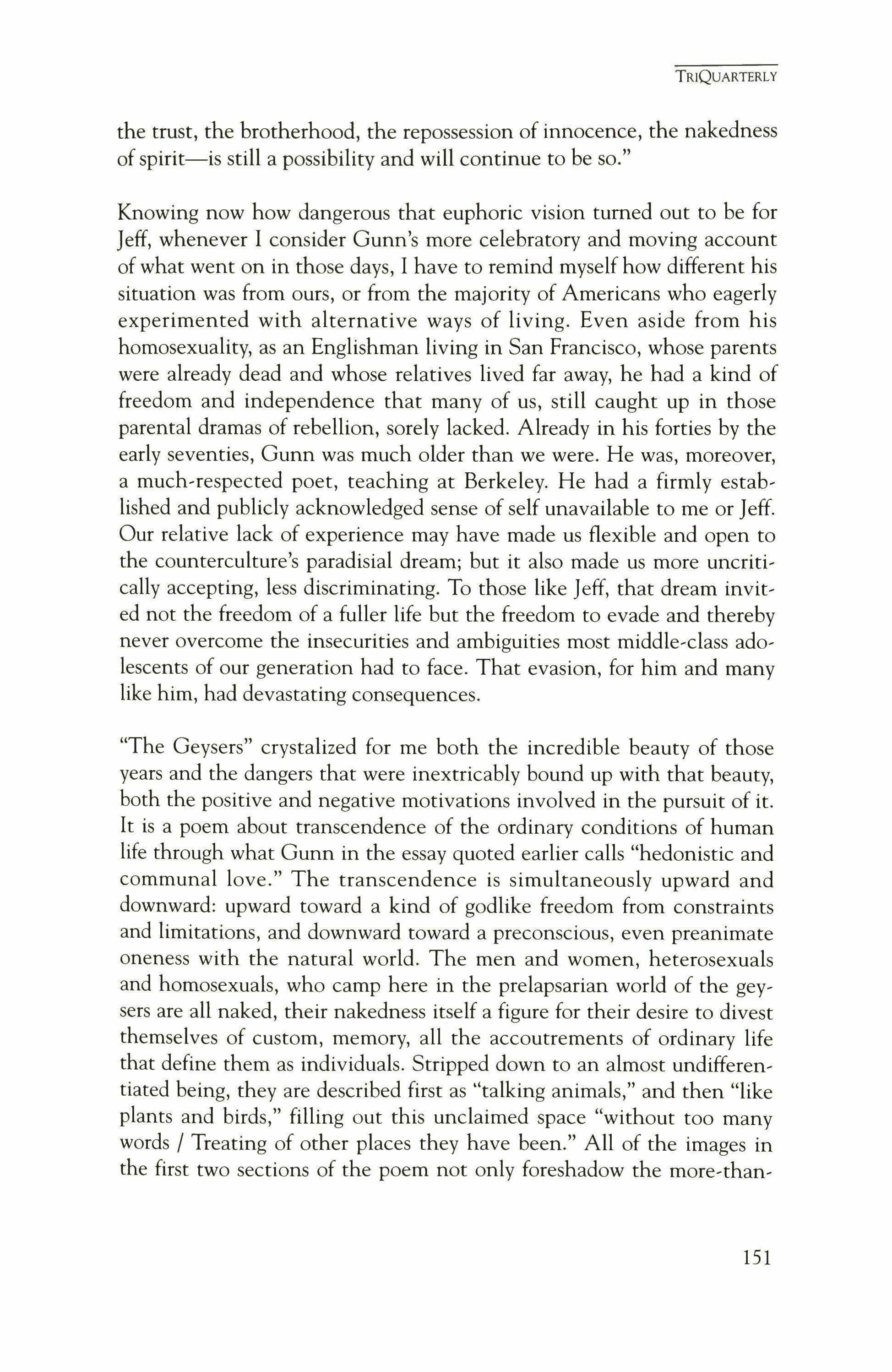
the trust, the brotherhood, the repossession of innocence, the nakedness of spirit-is still a possibility and will continue to be so."
Knowing now how dangerous that euphoric vision turned out to be for Jeff, whenever I consider Gunn's more celebratory and moving account of what went on in those days, I have to remind myself how different his situation was from ours, or from the majority of Americans who eagerly experimented with alternative ways of living. Even aside from his homosexuality, as an Englishman living in San Francisco, whose parents were already dead and whose relatives lived far away, he had a kind of freedom and independence that many of us, still caught up in those parental dramas of rebellion, sorely lacked. Already in his forties by the early seventies, Gunn was much older than we were. He was, moreover, a much-respected poet, teaching at Berkeley. He had a firmly established and publicly acknowledged sense of self unavailable to me or Jeff. Our relative lack of experience may have made us flexible and open to the counterculture's paradisial dream; but it also made us more uncritically accepting, less discriminating. To those like Jeff, that dream invited not the freedom of a fuller life but the freedom to evade and thereby never overcome the insecurities and ambiguities most middle-class adolescents of our generation had to face. That evasion, for him and many like him, had devastating consequences.
"The Geysers" crystalized for me both the incredible beauty of those years and the dangers that were inextricably bound up with that beauty, both the positive and negative motivations involved in the pursuit of it. It is a poem about transcendence of the ordinary conditions of human life through what Gunn in the essay quoted earlier calls "hedonistic and communal love." The transcendence is simultaneously upward and downward: upward toward a kind of godlike freedom from constraints and limitations, and downward toward a preconscious, even preanimate oneness with the natural world. The men and women, heterosexuals and homosexuals, who camp here in the prelapsarian world of the geysers are all naked, their nakedness itself a figure for their desire to divest themselves of custom, memory, all the accoutrements of ordinary life that define them as individuals. Stripped down to an almost undifferentiated being, they are described first as "talking animals," and then "like plants and birds," filling out this unclaimed space "without too many words / Treating of other places they have been." All of the images in the first two sections of the poem not only foreshadow the more-than-
TRIQUARTERLY
151

human, less-than-human state the speaker will achieve in the sexual orgy of the concluding part, they also indirectly picture what it is about the human condition he desires to escape: the two birds who "like one dart upstream toward the falls," and the snake "alert in its skin" who "does not watch itself," living by sheer instinct alone, are immersed in the present, at one with their surroundings. They have a wholeness and indivisibility denied to us. This is what Keats means when he calls the nightingale immortal ("Thou wast not made for Death, Immortal Bird"), for being at one with the eternal holy present, the nightingale is unaware of death. Unlike the human speaker who suffers from his consciousness of time, of loss, of his neediness and vulnerability, the nightingale can neither mourn the past nor fearfully anticipate the future. Here among the cool streams of this natural setting the talking animals approximate that preconscious state:
Some rest and pass a joint, some climb the fall: Tan black and pink, firm shining bodies, all Move with a special unconsidered grace. For though we have invaded this glittering place And broke the silences, yet we submit: So wholly, that we are details of it.
But the racial and sexual harmony pictured here takes a darker tum in the next section as the speaker, alone, climbs from the cool stream to the geysers. Like Michael Lang's vision of an ideal nation, the transcendent vision afforded by the geysers also involves a climb. But the landscape one ascends to, unlike Lang's, almost allegorically embodies the human cost of such a radical transcendence to one's prehuman source:
A cinderfield that lacks all skin of soil, It has no complication, no detail, The force too simple and big to comprehend, Like a beginning, also like an end. No customs I have learned can make me wise To deal with such. And I do recognize -For what such recognition may be worthFire at my centre, burning since my birth Under the pleasant flesh. Force calls to force Up here a man might shrivel in his source.
TRIQUARTERLY
152

Reaching the geyser, the speaker has gone beyond whatever he has learned from custom or past experience. This landscape, unlike the more accommodating one below, has no complication, no detail, no familiar markers by which he might distinguish good from bad, beginning from end. The radical transcendence it offers is not the free floating Nirvana Michael Lang imagines, but a deeply ambiguous, amoral source that is simultaneously outside the self and inside it. Here the self with its own complications and details, its history, its habits and desires, is burned down to an impersonal force, "under the pleasant flesh."
The bathhouse section that concludes the poem draws away, it seems, from such austere impersonality. The bathhouse appears to be situated somewhere between the Edenic harmony of the cool stream and the solitary and stringently burning source of the geysers. If "a man might shrivel in his source" up there, here in the hot bath he can move at one and the same time down through the self toward some prehuman origin, and out toward others in a communal embrace. The boundaries of the ego, of self and other, male and female, human and nonhuman dissolve as the speaker goes from not knowing who is who, "Not certain / who I am or where," to a kind of reptilian passivity, "plated slow / stretching my coils on coils," to a kind of fetal, oceanic oneness with the scene ("and bobbing in the womb, all round me Mother / I am part of all there is no other "). What Gunn describes here is not dissimilar from Lang's Nirvana. For both of them, freedom from the human has a strong regressive element; it means returning to or reestablishing an embryonic unity in which all the doublings which consciousness entails, the painful divisions within the self between mind and body, and between the self and others and the external world in general, are healed. Whether this unity involves, as Gunn suggests, a diffusion of the self into the world, or a contraction of the world into the self, whether it's pantheistic or solipsistic, seems beside the point. What's crucial is, in either case, that there are no others, and if there are no others to acknowledge or attend to in any ordinary sense, then there is no risk, no neediness, no possibility of loss. Gunn indicates the power of this regressive urge by describing the appearance of other people in the subsequent passage as a painful rebirth: "It tore / what flash cut / made me fugitive / caesarian lightning lopped me off separate It's as if the speaker has reversed his biological (and evolutionary) history and returned to the womb of Mother Earth in order to be born again into a world of others, where in their sexual orgy they can reestablish that primal unity but on a higher level:
TRIQUARTERLY
153
I brace myself light strong and clear and understand why I came here entering their purpose as they enter mine
I am part of all hands take hands tear and twine
I yielded oh, the yield what have I slept? my blood is yours the hands that take accept

torn from the self in which I breathed and trod lam
I
am raw meat
I am a god
The Dionysian ecstasy of the experience, as beautiful as it is terrifying, is undeniable. But what is also undeniable, it seems to me, is that to be a god or meat, pure spirit freed of bodily limitation, or pure body unburdened of mind, is no longer to be human. Both extremes eliminate the very qualities that define us as creatures of consciousness and choice, dependent on and therefore always at the mercy of a world we can't control. Both extremes eliminate the historical dimension from experience: a god has no history because he cannot change or die; and pure animal consciousness has no history either because, living entirely by instinct, it cannot recollect the distant past or anticipate the distant future ("Let me forget about today until tomorrow"). To be one or the other, to be simplified into divine or animal completeness, is no longer to be human, and that of course is precisely its appeal. This is not to say that the utopian dimension of such ecstasy, the glimpse it offers of communallove, is deluded or false. Nor is it to say that an ideal is wrong just because it can have dangerous or destructive consequences for those who try to live by it (think of the inhuman slaughter committed in the
TRIQUARTERLY
154
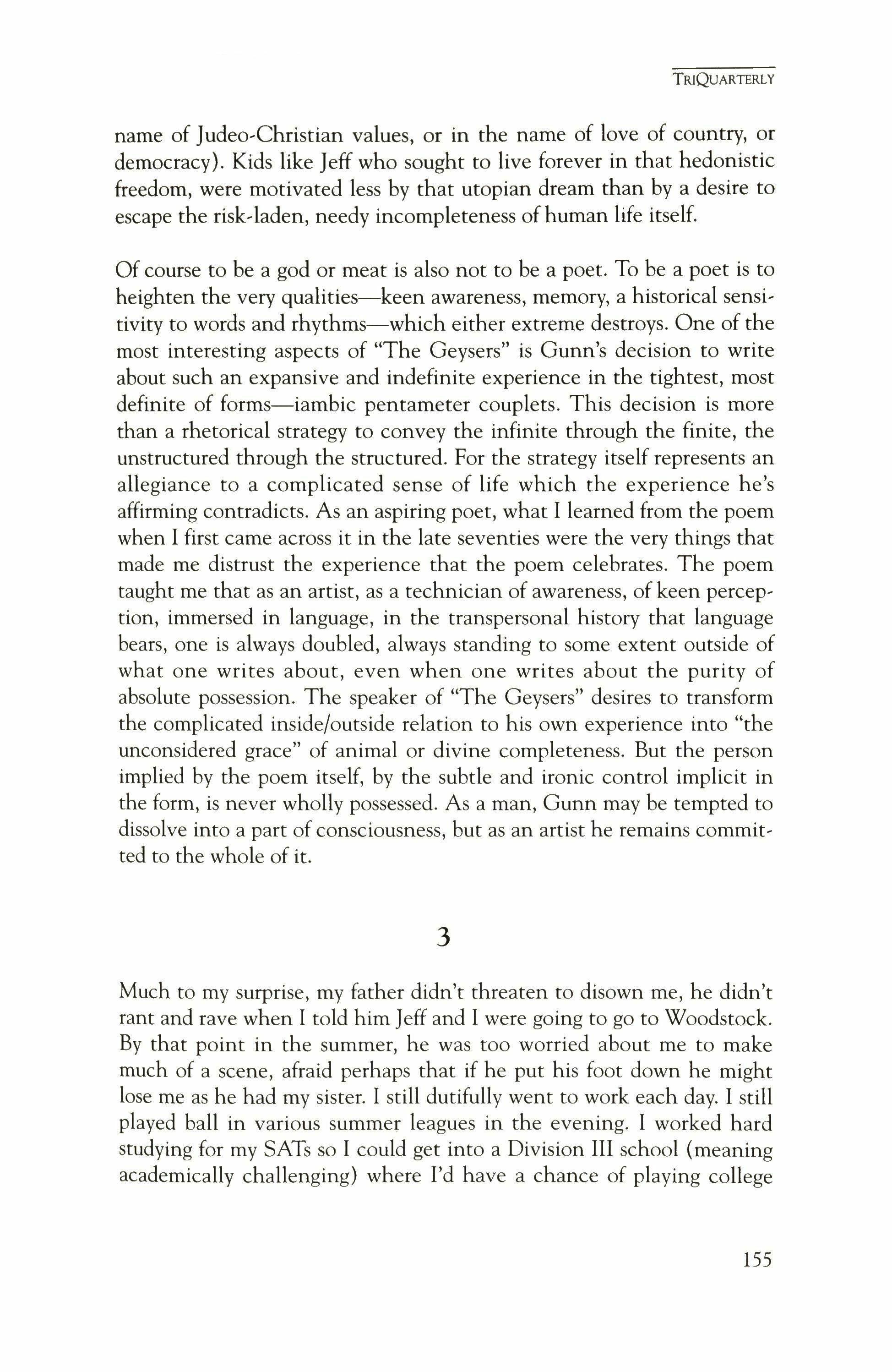
name of [udeo-Christian values, or in the name of love of country, or democracy}. Kids like Jeff who sought to live forever in that hedonistic freedom, were motivated less by that utopian dream than by a desire to escape the risk-laden, needy incompleteness of human life itself.
Of course to be a god or meat is also not to be a poet. To be a poet is to heighten the very qualities-keen awareness, memory, a historical sensitivity to words and rhythms-which either extreme destroys. One of the most interesting aspects of "The Geysers" is Gunn's decision to write about such an expansive and indefinite experience in the tightest, most definite of forms-iambic pentameter couplets. This decision is more than a rhetorical strategy to convey the infinite through the finite, the unstructured through the structured. For the strategy itself represents an allegiance to a complicated sense of life which the experience he's affirming contradicts. As an aspiring poet, what I learned from the poem when I first came across it in the late seventies were the very things that made me distrust the experience that the poem celebrates. The poem taught me that as an artist, as a technician of awareness, of keen perception, immersed in language, in the transpersonal history that language bears, one is always doubled, always standing to some extent outside of what one writes about, even when one writes about the purity of absolute possession. The speaker of "The Geysers" desires to transform the complicated inside/outside relation to his own experience into "the unconsidered grace" of animal or divine completeness. But the person implied by the poem itself, by the subtle and ironic control implicit in the form, is never wholly possessed. As a man, Gunn may be tempted to dissolve into a part of consciousness, but as an artist he remains committed to the whole of it. 3
Much to my surprise, my father didn't threaten to disown me, he didn't rant and rave when I told him Jeff and I were going to go to Woodstock. By that point in the summer, he was too worried about me to make much of a scene, afraid perhaps that if he put his foot down he might lose me as he had my sister. I still dutifully went to work each day. I still played ball in various summer leagues in the evening. I worked hard studying for my SATs so I could get into a Division III school (meaning academically challenging) where I'd have a chance of playing college
TRIQUARTERLY
155

ball. But I did all this in silent protest, asserting my independence by doing glumly, sulkily, all that he demanded of me. By withdrawing from him, I rebelled against his power even as I submitted to it. Whenever I was home, I stayed in my room and read or studied or listened to the records Jeff would lend me. Late at night, I was also sneaking out with Jeff to Cory Hill park where we'd get high and talk and sing. Despite the mainstream's warnings of the evils of dope, I was still no less committed to my various ambitions. Without diminishing my obsessive drive, the dope provided a marvelous relief from it, a temporary space in which I could just be, just enjoy myself with no thought of winning or losing, of meeting anyone's approval. It was on one of these nights that Jeff told me that his brother had scored a couple of extra tickets to the Festival and that Jeff and I could have them. I imagined a festival full of Jeffs, of kids like him, free spirits getting high, balling, dancing to the music we loved. It would be the adolescent version of the party that all of my childhood friends had gotten to go to, a festival of kids from broken homes. Now it would be my chance to go.
"What about basketball?" My father pleaded. "School? College?"
"What about them?"
"Once you're up there with those hippies, that'll be the end of that. Believe me. I'm telling you, you won't come back."
He seemed more sad than angry, his sadness now a mixture of befuddlement and defeat, as if his only hope now of holding on to me were to let me go. In me at that moment I think he saw the ironic fruits of a grimly virtuous existence, of a lifetime of denial and self-sacrifice in the name of making life easier for his children. I don't think my father ever held a job he loved, or ever expected to. Serving as the foreman in his father's slaughterhouse, or running the belt manufacturing business that his brother owned, or now in 1969, as a salesman in the men's department of Saks, work always and only meant the antithesis of pleasure, selfexpression and fulfillment-the flower child's holy trinity. Work was what you did for money, and money in tum was what you laid away, first for your children's education, and then for your retirement so you wouldn't have to be dependent on your children in your old age. This dedication to our welfare he never lorded over us. The dedication was simply how a man, a father, was supposed to live. If you expected a medal for acting like a mensch, then you were definitely not a mensch. What he expected of me was respect, by which he meant conformity to how a man should live.
TRIQUARTERLY
156
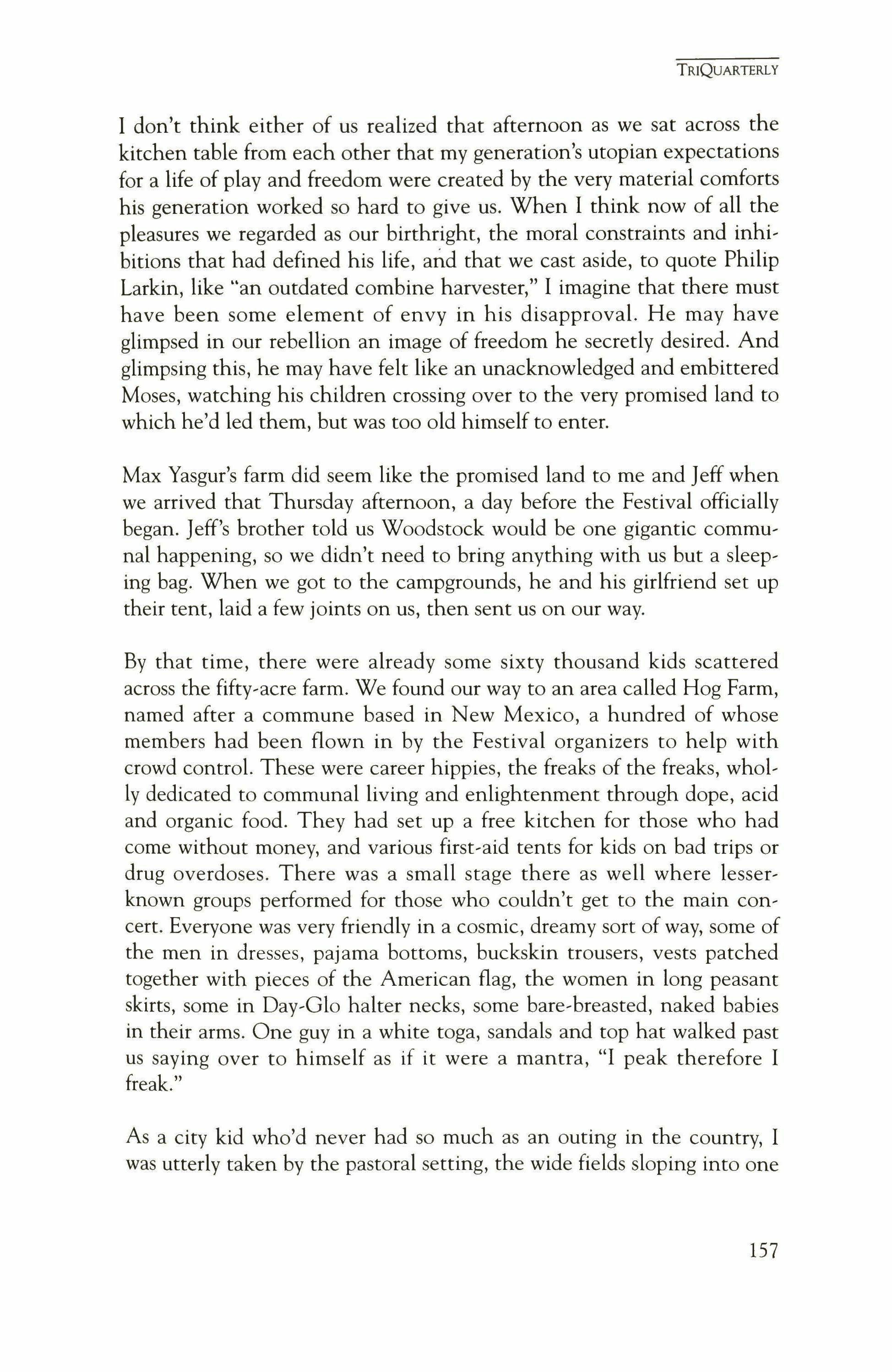
I don't think either of us realized that afternoon as we sat across the kitchen table from each other that my generation's utopian expectations for a life of play and freedom were created by the very material comforts his generation worked so hard to give us. When I think now of all the pleasures we regarded as our birthright, the moral constraints and inhibitions that had defined his life, and that we cast aside, to quote Philip Larkin, like "an outdated combine harvester," I imagine that there must have been some element of envy in his disapproval. He may have glimpsed in our rebellion an image of freedom he secretly desired. And glimpsing this, he may have felt like an unacknowledged and embittered Moses, watching his children crossing over to the very promised land to which he'd led them, but was too old himself to enter.
Max Yasgur's farm did seem like the promised land to me and Jeff when we arrived that Thursday afternoon, a day before the Festival officially began. Jeff's brother told us Woodstock would be one gigantic communal happening, so we didn't need to bring anything with us but a sleeping bag. When we got to the campgrounds, he and his girlfriend set up their tent, laid a few joints on us, then sent us on our way.
By that time, there were already some sixty thousand kids scattered across the fifty-acre farm. We found our way to an area called Hog Farm, named after a commune based in New Mexico, a hundred of whose members had been flown in by the Festival organizers to help with crowd control. These were career hippies, the freaks of the freaks, wholly dedicated to communal living and enlightenment through dope, acid and organic food. They had set up a free kitchen for those who had come without money, and various first-aid tents for kids on bad trips or drug overdoses. There was a small stage there as well where lesserknown groups performed for those who couldn't get to the main concert. Everyone was very friendly in a cosmic, dreamy sort of way, some of the men in dresses, pajama bottoms, buckskin trousers, vests patched together with pieces of the American flag, the women in long peasant skirts, some in Day-Glo halter necks, some bare-breasted, naked babies in their arms. One guy in a white toga, sandals and top hat walked past us saying over to himself as if it were a mantra, "I peak therefore I freak."
As a city kid who'd never had so much as an outing in the country, I was utterly taken by the pastoral setting, the wide fields sloping into one
TRIQUARTERLY
157

another, the green ponds, the patches of woods, and the blue sky overhead as deep and clear as it must have looked on the first day of creation. There were no police, no authorities, it seemed, of any kind. Here we could do openly with no fear of reprisal what we had grown accustomed to doing late at night behind locked doors. Wherever we happened to be, at any time, without anxiety or circumspection, whenever we wanted, we could get high, or ball our brains out if the opportunity arose. Truly, it seemed, we had entered a new world that stood on its head the values and mores of the old one. Maybe my father was right. Maybe I wouldn't return.
Late in the day, we came upon a large pond where thirty or so kids were skinny-dipping. Without hesitating, Jeff took his clothes off and joined them. I hung back. I was deeply self-conscious about my body. Even to take a shower in the privacy of my own bathroom I had to overcome some degree of inhibition. And even though by then, too, my girlfriend and I had been sleeping together for several months, the lovemaking was always furtive and shy, our bodies only glimpsed at in the flurry of passion, while before and after we were careful to keep close enough to one another so as not to get a panoramic view. What I found remarkable and chastening was how relaxed everybody seemed to be. They were physical in their nakedness without being sexual at all. They played and cavorted as if they all had clothes on. Wading in among them in my cut-off jeans, because I was the only one still partially dressed, I felt as if I were the only one exposed. It seemed that everyone but me had somehow figured out a way to reattach the apple to the tree of knowledge. What I wanted to do more than anything was gawk at all the pretty girls, but gawking would have violated the Edenic code of innocence. Instead, while Jeff cavorted with the others as if they were his lifelong friends, I looked casually ahead at no one in particular at the same time that I desperately tried perfecting my peripheral vision, ogling breasts and asses out of the corners of my eyes.
I was so distracted by the naked flesh around me that I didn't realize that Jeff was gone. Eventually I found him back at Hog Farm among a bunch of people doing yoga. As I approached, a man was talking to him and the other kids. He was older than most everybody else, maybe in his mid-thirties, and he had short hair. I realize now he must have been a cop, one of the hundred or so brought in by the Festival security team in case things at any point got out of control. In keeping with the atmos-
TRIQUARTERLY
158
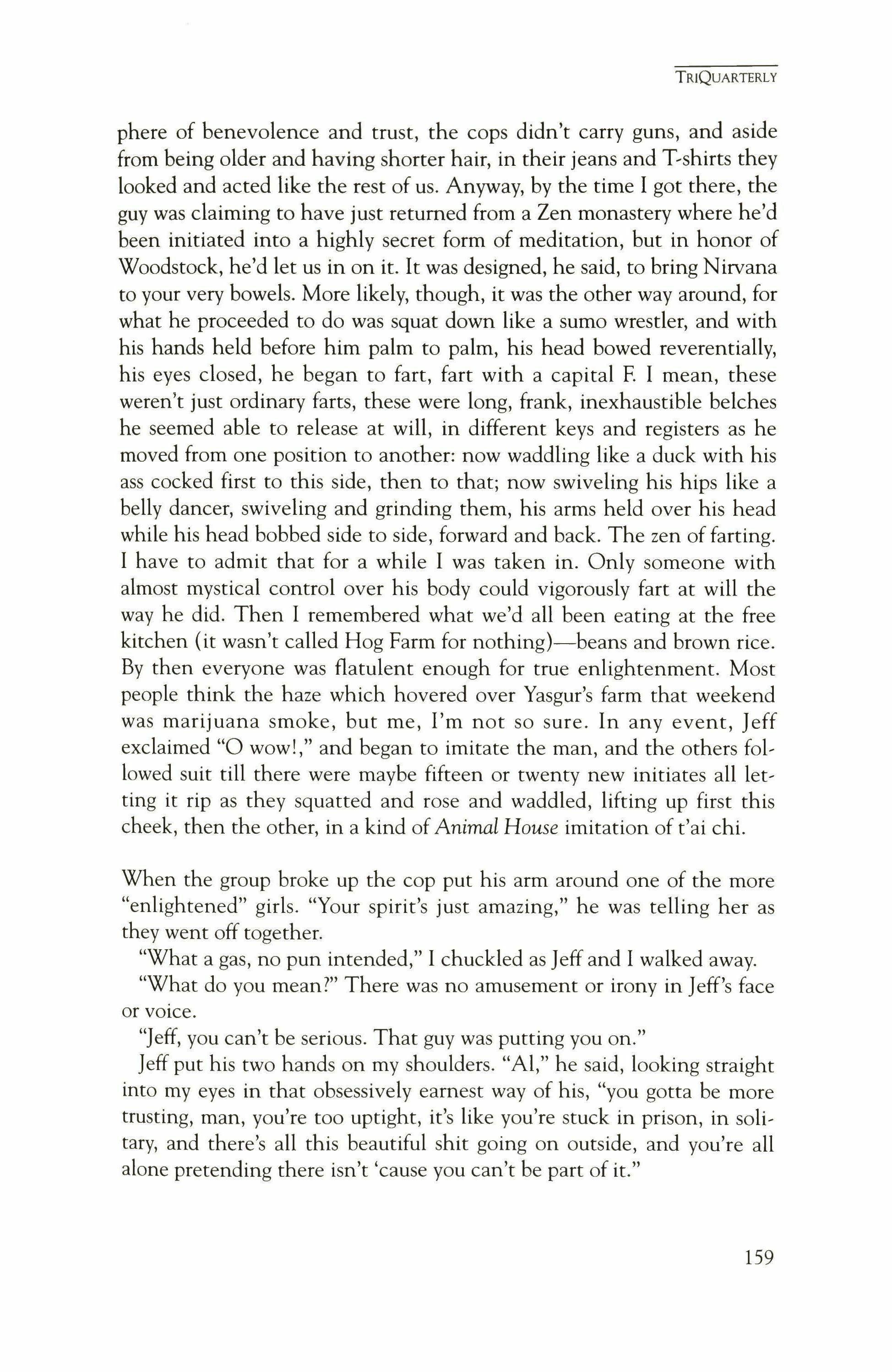
phere of benevolence and trust, the cops didn't carry guns, and aside from being older and having shorter hair, in their jeans and Tshirts they looked and acted like the rest of us. Anyway, by the time I got there, the guy was claiming to have just returned from a Zen monastery where he'd been initiated into a highly secret form of meditation, but in honor of Woodstock, he'd let us in on it. It was designed, he said, to bring Nirvana to your very bowels. More likely, though, it was the other way around, for what he proceeded to do was squat down like a sumo wrestler, and with his hands held before him palm to palm, his head bowed reverentially, his eyes closed, he began to fart, fart with a capital F. I mean, these weren't just ordinary farts, these were long, frank, inexhaustible belches he seemed able to release at will, in different keys and registers as he moved from one position to another: now waddling like a duck with his ass cocked first to this side, then to that; now swiveling his hips like a belly dancer, swiveling and grinding them, his arms held over his head while his head bobbed side to side, forward and back. The zen of farting. I have to admit that for a while I was taken in. Only someone with almost mystical control over his body could vigorously fart at will the way he did. Then I remembered what we'd all been eating at the free kitchen (it wasn't called Hog Farm for nothing)-beans and brown rice. By then everyone was flatulent enough for true enlightenment. Most people think the haze which hovered over Yasgur's farm that weekend was marijuana smoke, but me, I'm not so sure. In any event, Jeff exclaimed "0 wow!," and began to imitate the man, and the others followed suit till there were maybe fifteen or twenty new initiates all letting it rip as they squatted and rose and waddled, lifting up first this cheek, then the other, in a kind ofAnimal House imitation of t'ai chi.
When the group broke up the cop put his arm around one of the more "enlightened" girls. "Your spirit's just amazing," he was telling her as they went off together.
"What a gas, no pun intended," I chuckled as Jeff and I walked away.
"What do you mean?" There was no amusement or irony in Jeff's face or voice.
"Jeff, you can't be serious. That guy was putting you on."
Jeff put his two hands on my shoulders. "Al," he said, looking straight into my eyes in that obsessively earnest way of his, "you gotta be more trusting, man, you're too uptight, it's like you're stuck in prison, in solitary, and there's all this beautiful shit going on outside, and you're all alone pretending there isn't 'cause you can't be part of it."
TRIQUARTERLY
159

Though there was more to my skeptical detachment than mere inhibition, Jeff was right. I was uptight and too distrustful-more so than usual, to my surprise-at the very time I should have let myself relax into what was happening around me. It was as if among so many people, all of whom, in [oni Mitchell's words, were content to be "a cog in something turning," I had to insist upon my being different, better, shrewder. If in the name of that communal embrace, they were happy to be duplicates of one another, to be heads, freaks, hippies, transparent in their openness and gullibility, I would by my very watchfulness become opaque, mysterious, dense with complexity, too streetwise and knowing to be the butt of anybody's joke. While this standoffishness prevented me from being duped, it also cheated me to some extent of the experience itself, of living it more deeply, or more richly. I was an American, middle-class, adolescent version of the speaker in Baudelaire's "Le [eu," who sees the limited being of the whores and gamblers crowded around the gaming table, but at the same time recognizes in their obsessions and addictions a fiercer hold on life than he possesses, whose own compulsion is not to live but to stand back and observe in the nonbeing of detached superiority.
A little later, we settled down for the night on a hillside we had entirely to ourselves. Despite the night sky busy with shooting stars, the balmy weather, the one last joint we smoked, nothing could break the chill our differences had placed between us. We lay there in awkward silence, Jeff probably thinking that if Woodstock was a trial of my allegiance to the new enlightenment, then clearly I had failed it.
As if to give me one last chance, he asked me how much money I had, and would I split it with him.
"What happened to your money?" I asked. He said he'd given all of it to some Hog Farm freaks.
"And what are you gonna do with the money I give you?" Suddenly I sounded just like my father.
"Probably donate that too," he said. "They need the bread. Anyway," he added, shrugging, "it's only money."
Only money. Only basketball. The records, the- books he gave me and never wanted back. Everything abandoned with the same shrug of easy acceptance, which only now began to seem forlorn and fatalistic, not liberated in the least. Jeff hated things, I think, because things break,
TRIQUARTERLY
160

things meant anxiety and worry. If you gave them away before they were taken from you, then you at least had some control, however self, destructive, over what might happen. But there was also a social dimension to this personal asceticism, for the less you had to lose, the less chance there'd be of being envied and disliked, the easier it was to get along with others. If you had no material advantages, nothing to distinguish you from others, to set you apart from them, then nothing could be expected of you. And you had therefore nothing to live up to, which is to say, nothing to fall short of. Implicit in the communal harmony Jeff desired was an idealized family in which the collective is the happily married parents, and the individual is the child, and the love between them is unconditional, instinctive and unlosable, falling like sunlight impartially on everyone no matter who they are or what they do.
But for me, what I found most difficult to accept, what I instinctively resisted, was the ideal of passivity (what Jeff would have called receptivity) at the heart of this vision of the good life, the antiperfectionist per' fectionism that required of its followers to abandon any upward notion of self,refinement, any notion that by dint of conscious effort, practice, dedication, you could redefine the limits of what was possible, which in art and sport defines the truly excellent. In the same way that the extra, ordinary care and acute awareness enacted in the form and style of "The Geysers" contradicts or qualifies at least the psychic dissolution Gunn is celebrating, so too the musicians who encouraged us to "forget about today until tomorrow," to "let it be," to not "make plans just clap your hands," would never have become the musicians they were, would never have acquired the skills they needed to write those very songs, had they followed their own advice.
As odd as it may sound, it was my athletic training, and not just inhibition, that made me balk at the counterculture's invitation to seize the day. All through grade school and high school, day in, day out, in the gym and on the playground, with single-minded dedication (or was it obsession?), I had given myself over to the discipline of learning how to play the game of basketball. I had learned to dribble, shoot and pass with either hand. I had learned how to study my opponents, and adapt my own play to their strengths and weaknesses. By subordinating myself to the discipline the game required, I'd become a better, more imaginative, more versatile player. And becoming so convinced me of how capable I was of overcoming other sorts of obstacles, on and off the
TRIQUARTERLY
161
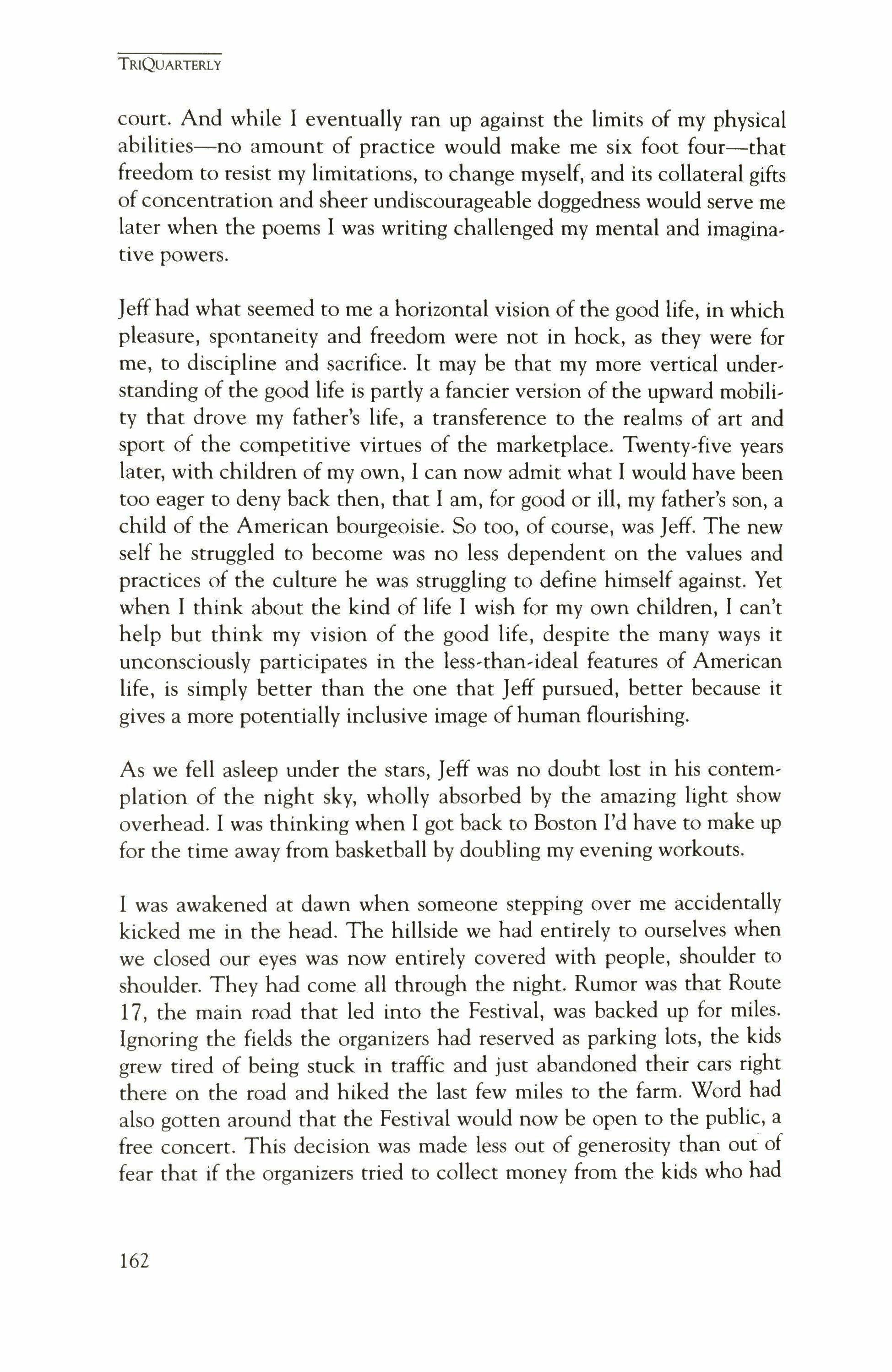
court. And while I eventually ran up against the limits of my physical abilities-no amount of practice would make me six foot four-that freedom to resist my limitations, to change myself, and its collateral gifts of concentration and sheer undiscourageable doggedness would serve me later when the poems I was writing challenged my mental and imaginative powers.
Jeff had what seemed to me a horizontal vision of the good life, in which pleasure, spontaneity and freedom were not in hock, as they were for me, to discipline and sacrifice. It may be that my more vertical understanding of the good life is partly a fancier version of the upward mobility that drove my father's life, a transference to the realms of art and sport of the competitive virtues of the marketplace. Twenty-five years later, with children of my own, I can now admit what I would have been too eager to deny back then, that I am, for good or ill, my father's son, a child of the American bourgeoisie. So too, of course, was Jeff. The new self he struggled to become was no less dependent on the values and practices of the culture he was struggling to define himself against. Yet when I think about the kind of life I wish for my own children, I can't help but think my vision of the good life, despite the many ways it unconsciously participates in the less-than-ideal features of American life, is simply better than the one that Jeff pursued, better because it gives a more potentially inclusive image of human flourishing.
As we fell asleep under the stars, Jeff was no doubt lost in his contemplation of the night sky, wholly absorbed by the amazing light show overhead. I was thinking when I got back to Boston I'd have to make up for the time away from basketball by doubling my evening workouts.
I was awakened at dawn when someone stepping over me accidentally kicked me in the head. The hillside we had entirely to ourselves when we closed our eyes was now entirely covered with people, shoulder to shoulder. They had come all through the night. Rumor was that Route 17, the main road that led into the Festival, was backed up for miles. Ignoring the fields the organizers had reserved as parking lots, the kids grew tired of being stuck in traffic and just abandoned their cars right there on the road and hiked the last few miles to the farm. Word had also gotten around that the Festival would nnw be open to the public, a free concert. This decision was made less out of generosity than out of fear that if the organizers tried to collect money from the kids who had
TRIQUARTERLY
162

already crashed the gate they'd have a riot on their hands. The Festival designed to accommodate maybe a quarter of a million people now had twice that many. Imagine a subway car at rush hour jammed wall to wall with people, then project that human density over a fifty-acre farm, and you have some idea of what the crowd was like.
By dawn Friday, the weather was already hot and sultry, the air so humid it was like breathing someone else's spit. The humidity also seemed to bring out the mosquitoes. I should add here that I am and always have been a kind of human No Pest Strip. If no one else among the five hundred thousand people at the Festival seemed bothered by the bugs, that's because all the bugs were buzzing greedily around me, a Woodstock Nation of them feasting on the free kitchen my body had become.
I wasn't surprised to find that Jeff had split. Anyway, with my eyes nearly swollen shut from the mosquito bites, I hardly cared. I spent the better part of Friday standing in lines. I waited for several hours to use a portable toilet only to find the stench so blindingly repulsive that I couldn't enter. Eventually I found a relatively open field where other people were shitting and pissing and being by that time more desperate than shy I happily joined them. Then for several more hours I waited in line at the Hog Farm free kitchen for a plate of something that looked and tasted as if it came from someone else's stomach. It was after five by then. The concert had begun. I was too tired and uncomfortable to work my way into the massive audience. Besides, I had to keep on moving to keep from getting bitten by the bugs. As night fell, and the rains came, in a crowded field among tents and plastic huts, I lay down utterly miserable, soaking wet and exhausted.
Just after dawn on Saturday, I saw whom I would come to think of as the queen of Woodstock, the living enactment of the euphoric ideal that would lead Jeff over the years from commune to commune, drug to drug, to de-tox center till he disappeared entirely from the lives all of his old friends. I saw a naked woman in a mud hole in the middle of a path. Kneeling in the mud, she was slowly, almost ritualistically, taking handfuls of the thick brown muck and smearing it down all over every inch of her, her hair, her face, her neck, breasts, hips and belly, a darker caking of it on her crotch. When she had covered herself completely, looking less like a woman dreaming of herself as mud than like mud dreaming of itself as woman, she began to dance among the people
TRIQUARTERLY
163

swarming past her, her hips swaying, her arms held over her head, her eyes closed, her dark smiling face all dreamy inaccessibility. Now and again, a man or woman would dance in front of her for a moment or two and then pass on, while she, oblivious, continued dancing, her trance unbreakable, the queen of Woodstock Nation floating blissfully free beyond "the twisted reach of crazy sorrow," beyond her name, her past, her family, even her sex, it seemed, forgetting in the moment all the gravities that held her to the world beyond the moment.
That morning, I caught a ride on a departing garbage truck. I rode on the running board, clinging to the door handle as the truck lurched precariously forward on a shoulder of the dirt road that led out to the highway, halting and inching forward against the jubilant stream of people still arriving, everybody smiling and flashing peace signs to me as I started back in the direction of my anxious father.
TRIQUARTERLY
164
Acid Edward Falca

The Living Word was Jerome's bookstore. It was a cubbyhole, a small room jammed with Bibles, inspirational books, and cards for religious occasions; and it was located in a Long Island shopping plaza, between a record store and a bridal boutique that had gone out of business months earlier and was about to reopen as one of a chain of restaurant-bars that catered to college students. On the street outside The Living Word, Jerome stared through the restaurant windows as a crew of workers prepared for opening night. From the ceiling, King Kong hung vertically suspended, one huge hairy arm swiping at a biplane dangling from a rafter just out of reach. His other arm was wrapped around a red supporting column, as if he were leaning out from it, holding on to keep from falling. A scantily clad Fay Wray trapped in Kong's grip pressed the back ofher hand to her forehead, on the verge of fainting.
From behind him, Jerome heard the sound of knocking on glass, and he turned around to find Alice waving for him to come into the record shop. Alice was the sales clerk and manager. At twenty-two she was only a couple of years older than his youngest daughter, but that didn't keep her from flirting. With the tip of her finger, seductively, she pushed her black, buttonless, boat-top blouse down off one shoulder. Jerome put his hands on his hips and frowned at her. In response, she pouted elaborately, making her bottom lip quiver as if she were about to cry. Jerome laughed and went into the record shop.
"When are you going to stop playacting [ezebel?" he said, as soon as he pushed open the door.
"Don't start." Alice pulled her blouse back over her shoulder, and glanced up at a large concave mirror suspended above her head like a
TRIQUARTERLY
165
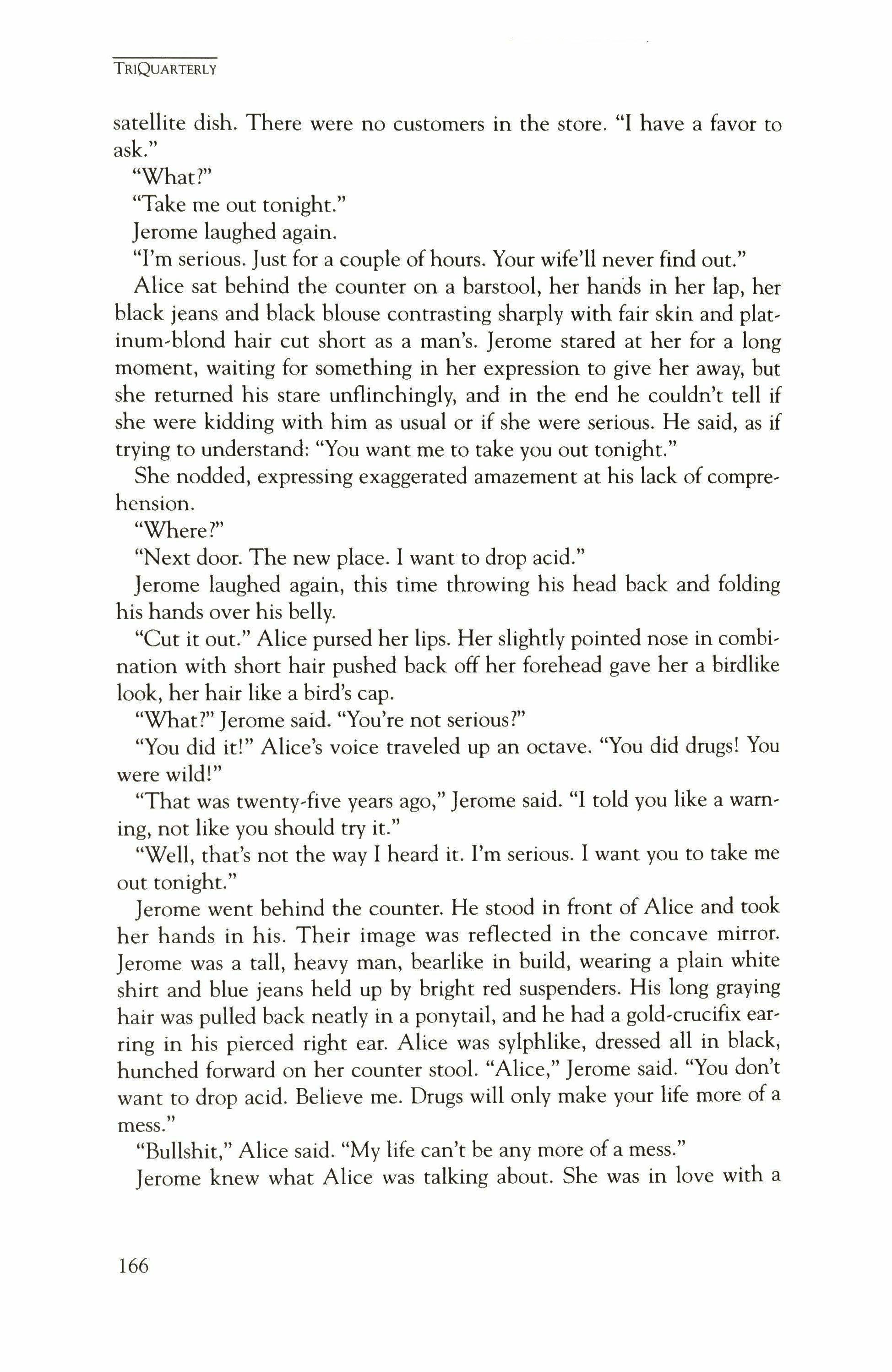
satellite dish. There were no customers in the store. "I have a favor to ask."
"What?"
"Take me out tonight."
Jerome laughed again.
"I'm serious. Just for a couple of hours. Your wife'll never find out."
Alice sat behind the counter on a barstool, her hands in her lap, her black jeans and black blouse contrasting sharply with fair skin and platinum-blond hair cut short as a man's. Jerome stared at her for a long moment, waiting for something in her expression to give her away, but she returned his stare unflinchingly, and in the end he couldn't tell if she were kidding with him as usual or if she were serious. He said, as if trying to understand: "You want me to take you out tonight."
She nodded, expressing exaggerated amazement at his lack of comprehension.
"Where?"
"Next door. The new place. 1 want to drop acid."
Jerome laughed again, this time throwing his head back and folding his hands over his belly.
"Cut it out." Alice pursed her lips. Her slightly pointed nose in combination with short hair pushed back off her forehead gave her a birdlike look, her hair like a bird's cap.
"What?" Jerome said. "You're not serious?"
"You did it!" Alice's voice traveled up an octave. "You did drugs! You were wild!"
"That was twenty-five years ago," Jerome said. "I told you like a warning, not like you should try it."
"Well, that's not the way 1 heard it. I'm serious. 1 want you to take me out tonight."
Jerome went behind the counter. He stood in front of Alice and took her hands in his. Their image was reflected in the concave mirror.
Jerome was a tall, heavy man, bearlike in build, wearing a plain white shirt and blue jeans held up by bright red suspenders. His long graying hair was pulled back neatly in a ponytail, and he had a gold-crucifix earring in his pierced right ear. Alice was sylphlike, dressed all in black, hunched forward on her counter stool. "Alice," Jerome said. "You don't want to drop acid. Believe me. Drugs will only make your life more of a mess."
"Bullshit," Alice said. "My life can't be any more of a mess."
Jerome knew what Alice was talking about. She was in love with a
TRIQUARTERLY
166

performance artist from Brooklyn who called himself St. John of the Five Boroughs. They had been going out for over a year when he abruptly dumped her. He said she was too bourgeois, too middle-class. This happened a few months ago, shortly after Alice mentioned the possibility of marriage. Jerome felt a twinge of guilt over this, since Alice had met St. John in The Living Word, where she had been visiting when he came in to buy a Bible and a crucifix for use in one of his performances. When he left he had Alice's phone number. "Look," Jerome said.
"You're still pining over-"
"Pining?" Alice pulled her hands away. "Jesus."
"Forgive me," Jerome said. "I am fifty-two years old."
Alice said plaintively, "My father would be fifty-five if he weren't dead."
Jerome covered his eyes with one hand, and his chin dropped to his chest. "Alice," he said. "You're letting yourself get carried away."
"Am not." She jerked his hand away from his eyes. "All I want to do is drop some acid. I want to shake up my life."
"So what do you need me for?"
"I trust you. You've got experience."
"Go with your mother." Jerome walked back around the counter. He glanced at the rows of CDs that filled the shop, at the brightly colored, rectangular packages. A mostly nude Prince reclined beside a rap CD that pictured four men totally naked except for the sawed-off shotguns and military attack rifles that covered their privates.
"My mom's in St. Thomas with her latest."
Jerome stepped between the two waist-high, black columns that would set off an alarm if he tried to leave without paying for a CD.
"Alice," he said. "Stop feeling sorry for yourself. And don't be stupid and take a chance on screwing up your life." He pulled the door open halfway and a soft, electronic chime sounded.
Alice leaned forward to the counter and propped her chin up in her hands. "I'll be there tonight around midnight," she said. "I'll feel better if you're there. I mean, I'll understand if you can't. But I'm dropping acid tonight no matter. I already decided."
"Mistake," Jerome said. "Big mistake." He left the shop.
The rest of the day, Jerome straightened out and dusted off stock in the Living Word. He moved a new edition of C. S. Lewis's Narnia chronicles into the display window, next to a T-shirt that had a black handprint with a red circle in the center of the palm. At five o'clock, from behind his counter, he watched Alice pull down the metal gate
TRIQUARTERLY
167
TRIQUARTERLY

over her storefront and insert and tum the keys that activated the alarm system. When she turned around and saw him looking at her, she mouthed the word midnight, winked, and crossed the parking lot to her car. As she walked away from him, Jerome's eyes fell to her legs. He noticed every crease in her jeans and the movement of her body within her clothes. His breathing slowed a little. He didn't tum away until Alice unlocked her car door and stepped out of sight. In front of him on the counter, a collection of art on religious themes was opened to a portrait of his namesake: Leonardo da Vinci's The Penitent Jerome. He stared for a moment at the saint's wasted body before snapping the thick book closed with a loud clap.
Jerome was annoyed at himself. Noticing Alice, noticing her physically, produced a kind of heat inside him, a kind of heat that could only be released by touch. He had been married now for a little over twenty years. He had two daughters in college. He thought he had grown past the real desire for other women. He would always notice other women, he knew that. He would always be aware of their bodies, of the way they moved-but there was a line between noticing and wanting, and it was a line he didn't want to cross. When he was a young man, he had slept with every woman he could get into his bed. He had been a jazz musician, he played sax, and he lived for only two things: women and music. When he wasn't doing one or the other, he was doing drugs: mostly marijuana and hashish, but coke too, and some horse. He could still see himself walking along Houston Street toward the Village. He walked with a swagger, his sax in its case. He had a place way over on Broome Street and he'd cut across on Essex and walk down Houston into the Village, like there was a spotlight on him all the way. When he got to whatever club he was working, when he played his sax, he fell into a deep place. He'd play with the group, whatever they were doing, a lot of Dizzy, "A Night in Tunisia," "Groovin' High," a lot of Miles, and he'd be with them, one star in a cluster, one piece of light, and then something would happen, he'd break out, flare up and the guys would back off and let him play. That's what jazz was like when it was good. That was why he did it. He'd be playing and then something just happened, he flew away, he'd be unconscious, flying, he'd get high soaring up to a place and then he'd level off and coast back in like gliding back down into his place in the cluster of lights, and the audience would applaud and the guys would throw him a nod, a little gesture that said yes, he had been out there.
That was the good part. But the good part was tied up with the bad
168
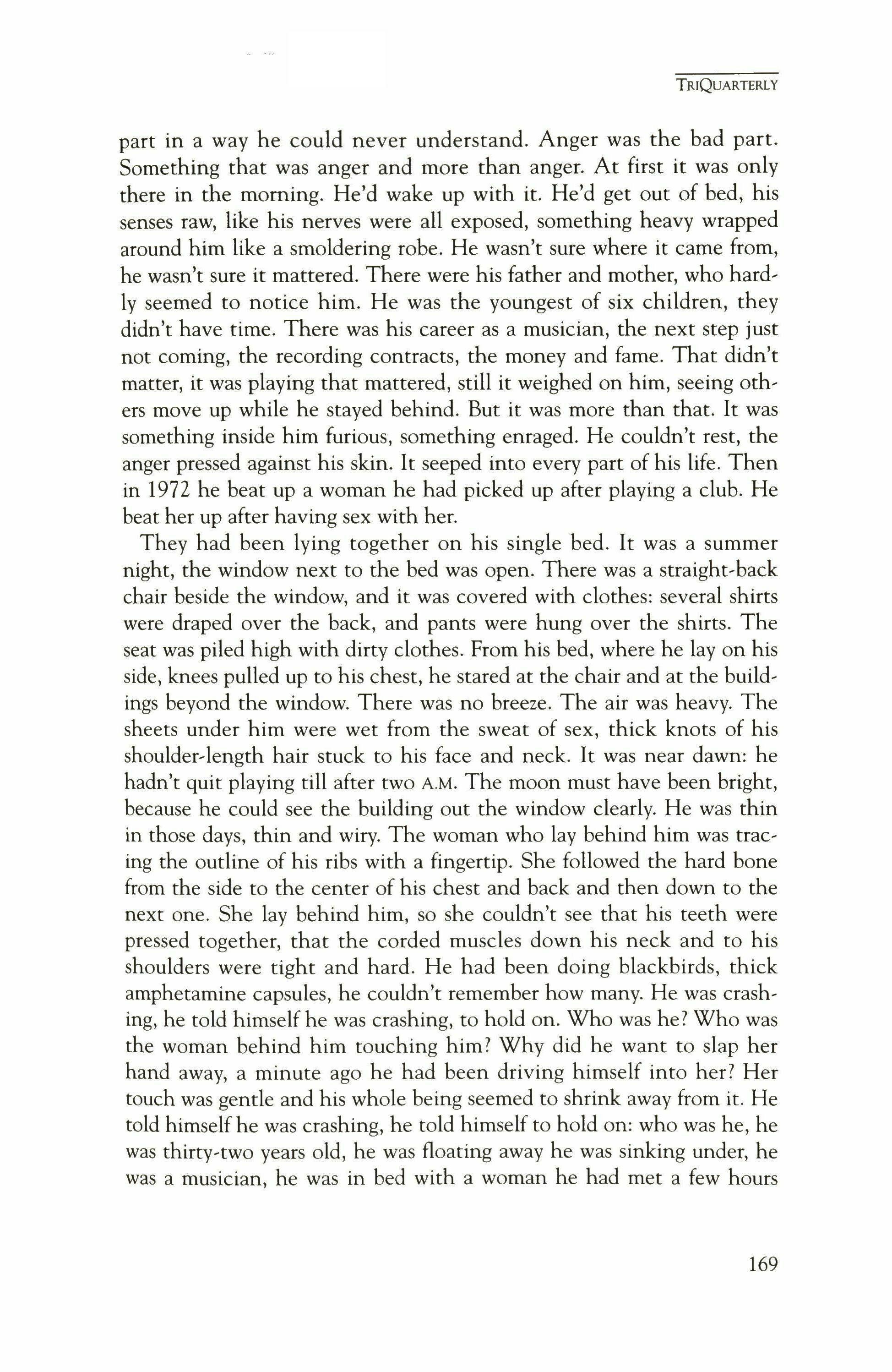
part in a way he could never understand. Anger was the bad part. Something that was anger and more than anger. At first it was only there in the morning. He'd wake up with it. He'd get out of bed, his senses raw, like his nerves were all exposed, something heavy wrapped around him like a smoldering robe. He wasn't sure where it came from, he wasn't sure it mattered. There were his father and mother, who hardly seemed to notice him. He was the youngest of six children, they didn't have time. There was his career as a musician, the next step just not coming, the recording contracts, the money and fame. That didn't matter, it was playing that mattered, still it weighed on him, seeing others move up while he stayed behind. But it was more than that. It was something inside him furious, something enraged. He couldn't rest, the anger pressed against his skin. It seeped into every part of his life. Then in 1972 he beat up a woman he had picked up after playing a club. He beat her up after having sex with her.
They had been lying together on his single bed. It was a summer night, the window next to the bed was open. There was a straight-back chair beside the window, and it was covered with clothes: several shirts were draped over the back, and pants were hung over the shirts. The seat was piled high with dirty clothes. From his bed, where he lay on his side, knees pulled up to his chest, he stared at the chair and at the buildings beyond the window. There was no breeze. The air was heavy. The sheets under him were wet from the sweat of sex, thick knots of his shoulder-length hair stuck to his face and neck. It was near dawn: he hadn't quit playing till after two A.M. The moon must have been bright, because he could see the building out the window clearly. He was thin in those days, thin and wiry. The woman who lay behind him was tracing the outline of his ribs with a fingertip. She followed the hard bone from the side to the center of his chest and back and then down to the next one. She lay behind him, so she couldn't see that his teeth were pressed together, that the corded muscles down his neck and to his shoulders were tight and hard. He had been doing blackbirds, thick amphetamine capsules, he couldn't remember how many. He was crashing, he told himself he was crashing, to hold on. Who was he? Who was the woman behind him touching him? Why did he want to slap her hand away, a minute ago he had been driving himself into her? Her touch was gentle and his whole being seemed to shrink away from it. He told himself he was crashing, he told himself to hold on: who was he, he was thirty-two years old, he was floating away he was sinking under, he was a musician, he was in bed with a woman he had met a few hours
TRIQUARTERLY
169

earlier, she was tracing the outline of his ribs with a fingertip. He was crashing. If he could hold on. He wanted to cry and he had no idea why he wanted to cry. He told himself it was the speed, but he felt lost, even though he knew exactly where he was: in the same apartment he had lived in then for five years, on Broome Street in Manhattan, in walking distance of the clubs where he played. He felt trapped, locked up, even though he knew he was free to do whatever he wanted, he had the money he needed, he had the access to drugs, there were women to spend the night. His body began to shudder, as if he were chilled. When she completed the outline of his ribs, her hand went down lower, to touch him. She bit him gently, taking the flesh in the small of his back between her teeth. He turned around. Her eyes were glistening, playful. He hit her the first time when she leaned forward to kiss him. He said, "Don't touch me." She was more surprised then hurt. He hadn't hit her hard. He had slapped her. She said, "YOU and faltered. She hit him back, a half-slap, half,push at his chest, and something huge inside him flared white and hot and he flailed at her, beating her, kneeling over her and striking until her body stopped resisting, the flesh went soft under his fists.
He spent a week in jail. There was no trial. His lawyer bargained with the city's lawyer and he got off with a suspended sentence. During his week in jail, he spent most of his time on his back, lying on his cot, looking out a barred window at the sky. The night of the beating he had crawled away from the bed on all fours. The nightmare image of himself crawling naked away from the bed was locked into Jerome's memory. It had never gone away, in all the twenty years since: the image of her star, tled eyes when he first slapped her, the feel of her body breaking under his fists, the animal explosion of grunts and screams from her and from him. Sometime long after she had stopped screaming, he crawled to the window. He had blood on his hands and face. He pulled himself up and looked out: the world was pulsing like the skin of a creature whose heart was beating hard. Color vibrated. The stars were white flames that flared like drumbeats. In jail it was different: colors settled, stars cooled. After they let him out, he began taking long walks at night, and on one of his walks, he wound up all the way downtown, by the river. It must have been about five A.M. He was cold, and he was coming up on Trinity Church. A thin, haggard man with long, windblown hair. The building was open. He entered through the central portal, and when he pushed open the inner doors and stepped into the interior, he was look, ing along the aisle toward the altar, where Christ looked down at him
TRIQUARTERLY
170

from the cross. He hadn't been in a church since he was a boy. He had been raised Roman Catholic. He had been baptized and had received communion, and that had been the end of it. Twenty, maybe twentytwo years since he'd been inside a church. He genuflected, crossed himself, and walked to the altar, where he knelt and lay his head on the chancel rail. He didn't know what he wanted. He was sobbing, and when he looked up again at the cross, he felt something warm and calming spread though him. He thought it might be the memory of himself as a boy in church with his family, kneeling in a pew between his brothers and sisters, watching the priest say mass, hold the gold chalice up to the light from a stained-glass window, as if offering it to the light, offering the chalice up to the light as if the light were alive and might take the chalice from his hand. He had felt warm then and safe and that feeling returned to him there at the chancel rail in Trinity Church. But it felt like something more than memory, like his anger was being transformed: bile turned to honey. After that, everything changed. He started going to confession every week and receiving communion every morning. He quit playing the clubs. He quit taking drugs. He met Sylvia and got married. They opened a Christian bookstore on Sixth Avenue. When they had a child, they moved the bookstore to Long Island.
Jerome put the art book in the display window, next to the C. S. Lewis, and then closed up the shop and went home. He found Sylvia in the kitchen pounding a slice of beef with a wooden mallet. She was surrounded by food: a caldron of tomato sauce bubbled on the stove; in the half-opened oven, two apple pies cooled; on the counter beside her, bottles of spices were scattered among piles of raisins and pignoli. The tangy apple-pie smell overwhelmed the small kitchen. "What's this?"
Jerome said. He put his hand on the counter and it slid over a slippery film of baking flour.
"This?" Sylvia pointed at the beef. "It's braciole."
"No. I mean all of this." Jerome clapped his hands and a little cloud of flour dust floated slowly to the floor.
Sylvia shrugged and made a gesture with her hands as if to say she didn't know why he would ask. "I'm cooking," she said. She rinsed her hands in the sink and dried them on a green dish towel that pictured a line of geese flying in formation. She hung the towel over the faucet, held Jerome by the shoulders, and kissed him on the lips. "Just because the kids are gone doesn't mean I can't cook anymore. I like cooking."
Jerome stepped around her and looked into the pot of sauce. "There's enough here for a month." He went to the kitchen window and looked
TRIQUARTERLY
171

out into the yard. In the reflection from the window, he could see Sylvia standing with her hands on her hips, looking at his back. Her expression wavered between anger and concern. In the twenty years they had been married, she had grown stout-not fat, but stout, almost matronly. She had turned fifty a week earlier, and last month, Beth, their youngest, had left for college: that, Jerome told himself, was why she was making a meal big enough for an army.
"Did you go to mass this morning?" she asked. "Did you receive communion?"
Jerome closed his eyes and leaned forward until his forehead touched the window. The glass was cool and wet.
"Did you?"
Sylvia claimed she could tell a difference in Jerome's behavior on the rare days when he missed mass and communion-probably not more than a dozen in the past twenty years. She said he got edgy and tense and hard to live with. He walked out of the kitchen without answering, and sat in the recliner in front of the living room's bay window. The house around him was orderly and neat, as always, and as always he found that calming. The polished hardwood floors gave off a kind of warmth, and Jerome leaned back and settled into the comfortable familiarity of his surroundings.
From the kitchen, Sylvia called: "Do you want a glass of wine?"
He didn't answer. She was right about church: he began his day with mass and communion the way other people started theirs with coffee and the newspaper. If he missed mass, he was off-balance the rest of the day. When he received communion, when he knelt at the chancel rail and extended his tongue and tilted his head to the priest, and the priest placed the wafer of the host on his tongue-when he received the body and blood of Christ into his own body, he felt transformed. He felt himself change as the wafer dissolved on his tongue: a warming light seeped into the dark places in his body. But he hadn't missed morning mass. He had gone at six A.M., as always. He sat in his regular seat in the back of the church, under the stained glass window portraying Christ's heart surrounded by a fiery light, and he had received communion.
The bay window in front of the recliner was lined with shelves crowded with knickknacks. Jerome picked up a soapstone sculpture of a dolphin and held it in his open hand. He liked the soft, doughlike feel of the stone in his palm, the warmth it had absorbed from sitting under the window radiating into his hand. He touched the dolphin to his forehead and held it there a moment, his eyes closed. Then he put it back on the
TRIQUARTERLY
172
shelf and went into the kitchen. Sylvia was pouring sauce into jars. She had bright blue potholder mitts over both hands. "I'm sorry," he said. "I'm acting sullen."
"What's wrong?" Sylvia put the pot back on the stove. He hugged Sylvia and kissed her on the cheek. "I think it's Beth the kids being gone."
Sylvia nodded. Her eyes got teary.
"I think I'll go for one of my walks after dinner."
"It's getting cold out," she said. She returned to pouring sauce into jars.
Jerome leaned back against the sink. "Then maybe I'll go for a drive," he said, casually. "Later on."
After dinner, he watched television with Sylvia. When the eleven o'clock news ended, and Sylvia started upstairs for bed, he told her he wasn't sleepy, and that he thought he'd go out for that drive he had mentioned earlier. At first Sylvia continued up the stairs slowly, without replying. Then she joined him where he was sitting on the couch. "Are you sure you wouldn't rather talk?" She put her hand on his knee.
"It's not talk," he said. "You know how I get. A long walk or a drive soothes me."
"O.K. If you're sure." She leaned forward and kissed him on the cheek. "But try not to wake me when you come back in. You know what happens ifI wake up once I've gone to bed for the night."
"I'll be quiet." He watched Sylvia walk up the stairs, and he listened while she prepared for bed. From where he sat on the couch, he could hear the floor creaking over his head, and each sound told him where she was in the bedroom and what she was doing. The silence meant she was standing in front of the dresser mirror in her nightgown, brushing her hair. The floor creaking again meant she was walking to the bed and pulling back the quilt. He waited until she was in bed a few minutes before getting up from the couch and getting dressed to go out. When he left, he pulled the door closed with a loud click, and he rapidly turned the key in the lock so that the dead bolt would snap closed loudly. By the time he started the car, it was midnight.
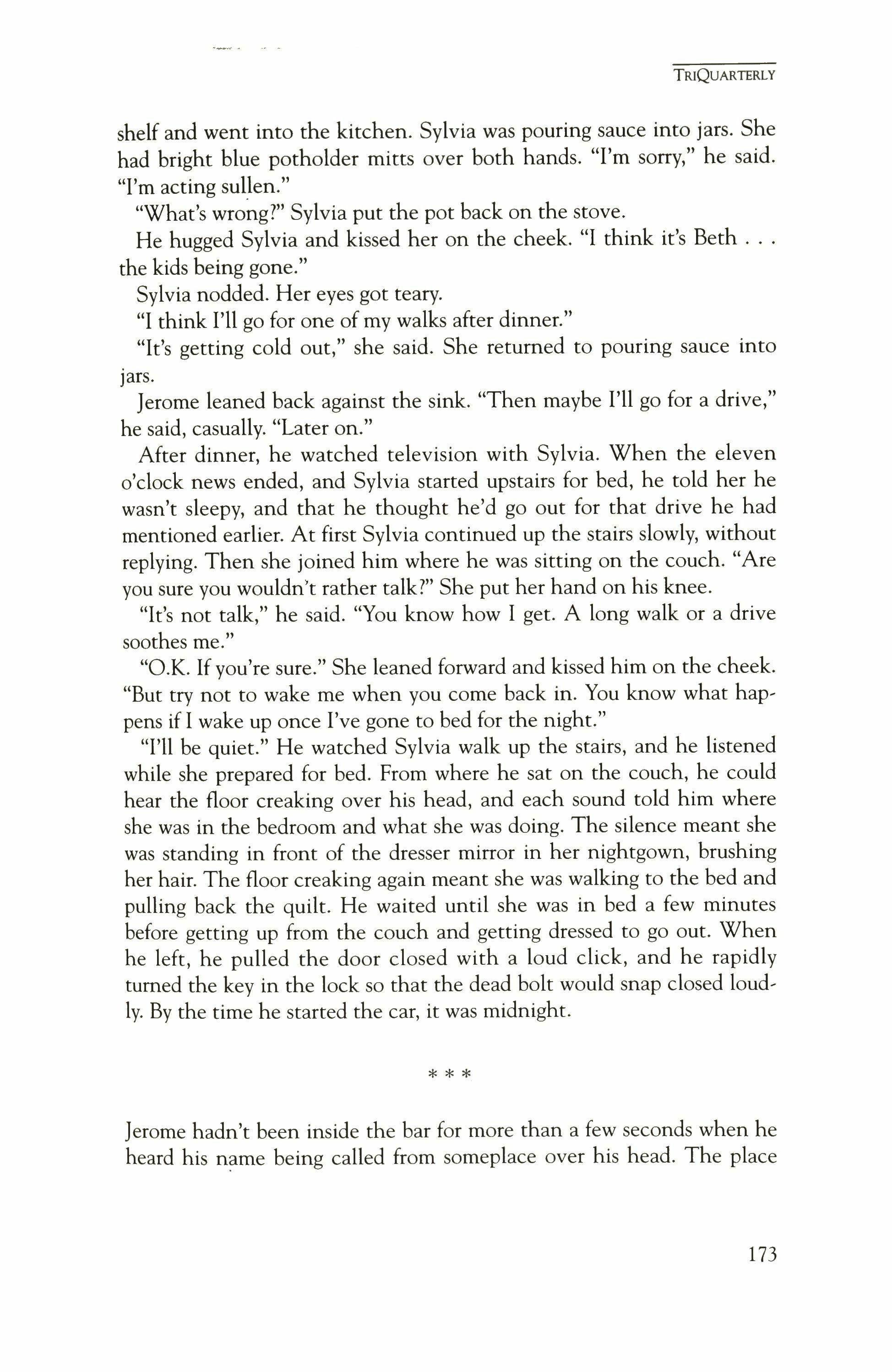
Jerome hadn't been inside the bar for more than a few seconds when he heard his n�me being called from someplace over his head. The place
TRIQUARTERLY
* * *
173

was jammed with kids who didn't look like they could possibly be twenty-one, though that was the drinking age in New York. Alongside him, two girls were holding each other at arms' length and squealing with delight as they looked each other over and prepared to embrace. When he looked up, Jerome saw Alice leaning over a railing and waving to him. He smiled up at her just as a young ox shouldering his way through the crowd knocked him into a fortune teller in a glass case. Jerome would have grabbed the kid if the crush of bodies hadn't closed around him instantly. He leaned against the glass case as the fortune teller, apparently jolted into action by the collision, began mechanically dealing out a hand of tarot cards, accompanied by an eerie, high-pitched, violin music. He turned away from the black-clad, wizened features of the gypsy-dummy, and stood on his toes, trying to locate the stairway that led up to the second level. Before he could find it, Alice popped out of the crowd behind him and took his arm.
"I already dropped, I don't feel anything yet, I'm glad you came." She jumped up and kissed him on his forehead. "I thought you'd come," she said.
"Is there someplace to sit?"
Alice pulled Jerome through the crowd, toward the back of the bar. The decor of the place was overwhelming, an hysteria of clashing artifacts: a 1940s street sign next to a glass-encased statue of Elton John; Marilyn Monroe standing on a subway grating, her dress blowing up as she tries to hold it down; a portrait of Charles Barkley wearing a Tshirt that advertised Nike sneakers and read: "The meek shall inherit the earth but they don't get the ball." The place was packed with stuff that ranged from an antique Amoco gas pump to a full-size, red-andwhite '57 Chevy with an Elvis manikin in the driver's seat, to an oldfashioned round clock on a lamppole, the kind you might have found in a railroad terminal or even on some town's main street, before they were universally replaced with digital time-temperature displays. And overlooking it all was the massive King Kong, Fay Wray in hand.
As they made their way toward the back of the bar, the crowd thinned and the noise level decreased significantly. Jerome realized there was music coming through a PA system: Ella Fitzgerald was scatting her way toward the end of "Black Magic." By the time they found a place to sit, the Fitzgerald number was over and Talking Heads were on. Jerome slid into a booth that was enclosed on three sides, like a small private room with a wall missing. Alice sat across from him. Over her head, light from an adjoining booth filtered through a round, multicolored, stained-glass
TRIQUARTERLY
174

window. A waiter appeared almost instantly. Alice ordered an Irish coffee and Jerome ordered bourbon.
"So how come you came?" Alice asked, smiling. Then, before he could answer, she leaned over the table and her smile turned into a grin. "But I knew you'd come. I could tell."
"I came to talk you out of the acid."
"Uh uh," Alice said. "That's not it. Don't bum me out. I want this to be a good trip." She reached across the table and put her hand over his. "It's weird," she continued. "You look different in this place. We've known each other a couple of years now, right-but I've never seen you except in my shop or yours. You definitely look different."
"Who wouldn't look different here?" Jerome gestured toward a group of skeletons playing soccer.
"These are big tripping bars," Alice said. "That's what gave me the idea. I used to go to one of these in the city with John and everybody was always tripping."
"Not hard to understand."
"Well? Do you know why you came?"
The waiter showed up with their drinks before Jerome could answer. Alice put a twenty on his tray. "We're not staying long," she said. The waiter told her he'd be right back with the change.
"Alice
"What?"
"I don't know what you're thinking. I'm " Alice's Irish coffee came topped with a pyramid of whipped cream. She lowered her head and licked half of it away with one swipe of her tongue. "You wouldn't be here if you weren't interested. That's some' thing John taught me. To cut through the pretense."
The waiter returned with the change. When he left, Jerome said to Alice: "I'm worried about you doing acid."
"I don't think so. I mean, maybe that's why you think you're here Alice appeared to weaken slightly, as if some of her confidence were slipping away. Then she crossed her arms on the table and leaned close to him. "Come on, Jerome. You've been staring at me for two years. I'm already tripping, so don't play mind games with me. I know you're inter, ested. I can tell by your look. It doesn't matter what you say, you can act like my uncle all you want. Your eyes don't lie."
"But it does matter what I say."
"Bullshit. You can't hide your heart. You can't hide what's in your heart."
TRIQUARTERLY
175
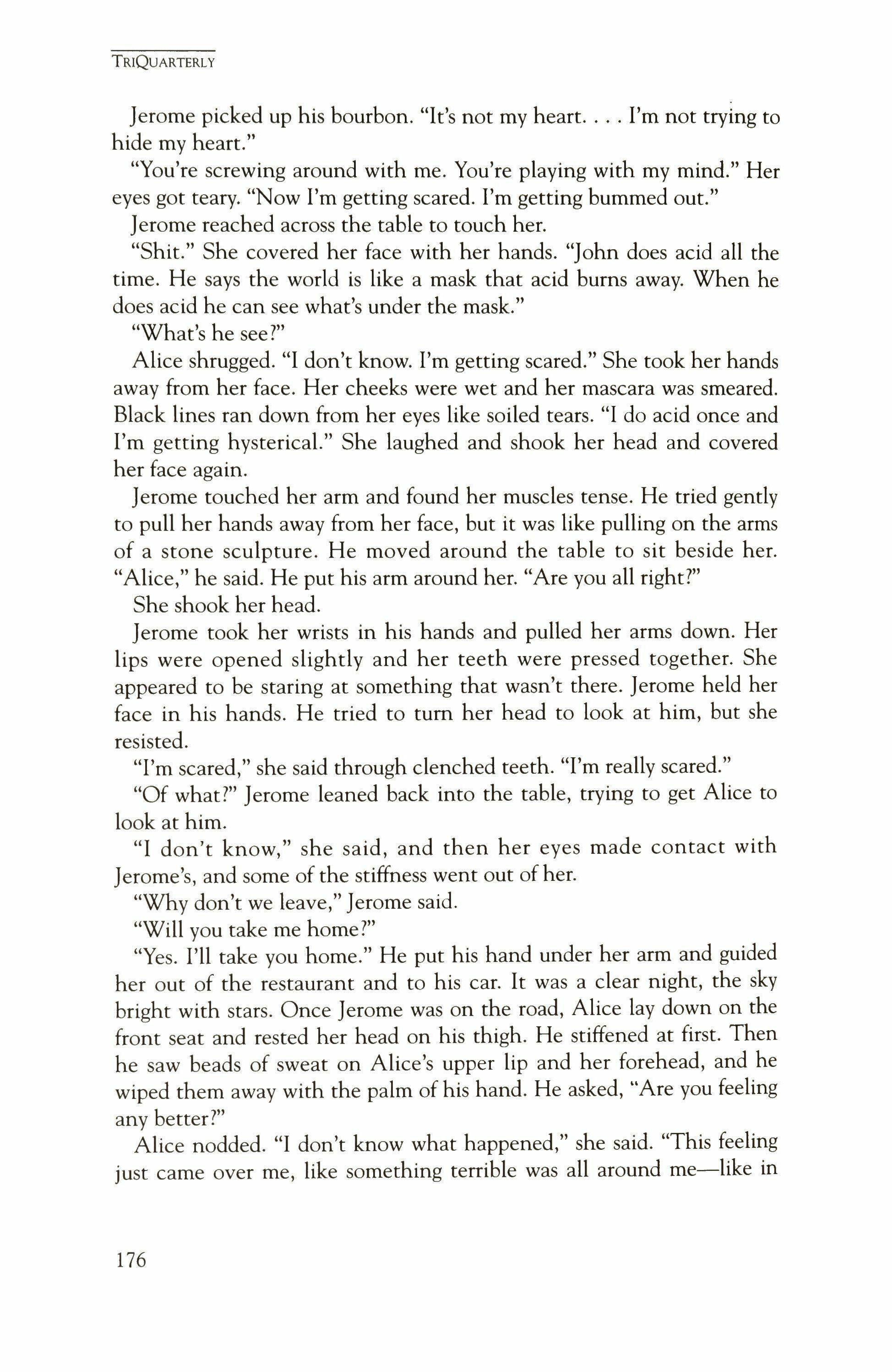
Jerome picked up his bourbon. "It's not my heart I'm not trying to hide my heart."
"You're screwing around with me. You're playing with my mind." Her eyes got teary. "Now I'm getting scared. I'm getting bummed out."
Jerome reached across the table to touch her.
"Shit." She covered her face with her hands. "John does acid all the time. He says the world is like a mask that acid burns away. When he does acid he can see what's under the mask."
"What's he see?"
Alice shrugged. "I don't know. I'm getting scared." She took her hands away from her face. Her cheeks were wet and her mascara was smeared. Black lines ran down from her eyes like soiled tears. "I do acid once and I'm getting hysterical." She laughed and shook her head and covered her face again.
Jerome touched her arm and found her muscles tense. He tried gently to pull her hands away from her face, but it was like pulling on the arms of a stone sculpture. He moved around the table to sit beside her. "Alice," he said. He put his arm around her. "Are you all right?"
She shook her head.
Jerome took her wrists in his hands and pulled her arms down. Her lips were opened slightly and her teeth were pressed together. She appeared to be staring at something that wasn't there. Jerome held her face in his hands. He tried to turn her head to look at him, but she resisted.
"I'm scared," she said through clenched teeth. "I'm really scared."
"Of what?" Jerome leaned back into the table, trying to get Alice to look at him.
"I don't know," she said, and then her eyes made contact with Jerome's, and some of the stiffness went out of her.
"Why don't we leave," Jerome said.
"Will you take me home?"
"Yes. I'll take you home." He put his hand under her arm and guided her out of the restaurant and to his car. It was a clear night, the sky bright with stars. Once Jerome was on the road, Alice lay down on the front seat and rested her head on his thigh. He stiffened at first. Then he saw beads of sweat on Alice's upper lip and her forehead, and he wiped them away with the palm of his hand. He asked, "Are you feeling any better?"
Alice nodded. "I don't know what happened," she said. "This feeling just came over me, like something terrible was all around me-like in
TRIQUARTERLY
176

nightmares when I was little and I knew something horrible was right behind me but I couldn't see it."
"Is it gone now?"
"Almost," she said. "It's melting away. I saw your eyes and it started. It's like melting away, it's almost all gone."
"You're high," Jerome said. "It's the drug.':
"It's different." She nestled her head into his thigh and stomach as if he were a pillow. "I don't feel high. I don't feel all messed up. I feel clear. It's like something warm is spreading through me, melting away everything bad."
"You're high," Jerome repeated. Alice pointed up, out windshield. "Look at the stars," she said. "How bright."
Jerome had to lean down a bit so that he could look up out the window. "There's nothing there. The light we're seeing, whatever made it, it was billions of years ago. There's nothing really there."
Alice looked up at Jerome and then back out the window. "What makes you so religious, Jerome? What makes you a religious man?"
Jerome was quiet. He looked down at Alice and saw that she was examining her hand. She held her opened hand in front of her face and moved her fingers slowly, as if she were playing a piano in slow motion. Her eyes were full of wonder. "I'm thankful," Jerome said. "I feel like He didn't know how to continue.
"I know what you mean," Alice said, still examining the workings of her hand. "It's just like feeling thankful that makes you good." Then she pulled herself up suddenly, and knelt beside Jerome. She kissed him. "But we're going to be bad tonight," she said. "Just this once. We're going to be so bad we're good."
Jerome pulled the car into the entrance to Alice's apartment complex, and she directed him to her parking space. Once they were out of the car and on the concrete walk that led to her apartment, Jerome put his hand on the small of Alice's back. "Are you feeling any steadier?"
Alice reached behind her and took Jerome's hand and slid it down into the back pocket of her jeans. She held her hand over his. "I like it better there."
Under his palm Jerome could feel the liquid smoothness and warmth of Alice's body moving. Energy flowed into him: his heart beat faster, his thoughts scattered and bounced, like molecules of water heating up in a bowl. His breathing changed, became more rapid, so that he knew if he tried to speak a whole sentence the final words would be clipped or
TRIQUARTERLY
177

chopped off entirely. He didn't speak. He kept his hand in her back pocket as they walked up a flight of stairs. Alice leaned into him, her head against his chest. At the door, she produced a key and sighed as if the mundane detail of having to unlock the door wearied her. When she had trouble getting the key into the lock, she seemed surprised.
Jerome steadied Alice's hand with his own. He unlocked the door, pushed it open, and stepped into her apartment. The place was small, essentially one room divided into a living area and a kitchen. There were two open doors off a short hallway beyond the living room: one led to a bedroom, the double bed unmade, sheets and bedspread crumpled on the floor; and the other opened into a bathroom.
"Sit down." Alice gestured toward a frayed couch strewn with clothes. As she pointed, a brindled cat darted out of nowhere, between her legs, and jumped up onto the counter that separated the kitchen and living room. The cat startled her, and she lost her balance. She would have fallen if Jerome hadn't caught her. "Whoa," she said. "Maybe I am stoned." She looked around. "Colors seem different. More intense." She squinted and looked at a spot on the wall over the couch. "Does acid build? Like keep getting stronger?"
"I can't remember," Jerome said. He was standing behind her now, letting her lean back against him. "It's been more than twenty years."
Alice was staring at the same spot. She said, "I think the walls are breathing," and then she laughed. "No," she said. "I'm O.K." She turned to face Jerome and put her arms around his waist. "I don't feel stoned." She stood on her toes and kissed him on the lips. "Wait here." She walked off, down the hallway. With her hand on a doorknob, she stopped and turned around, and looked back at Jerome. The hallway was dimly lit, and in its shadows Alice's features seemed softer, almost flawless: her skin not dark in contrast to her white hair, but honey-colored, as if she were an exotic, a native of a tropical island. "I feel like in harmony with things. I feel a connection Like," she said, speaking slowly, each word taking its own good time, "right now I'm feeling like everything is a kind of moving quilt, and I'm one piece of the quilt over here, and you're another piece over there." She smiled, her eyes catching Jerome's eyes, and then she disappeared into her bedroom, closing the door behind her.
Inside his head, a voice asked Jerome what he was doing. Jerome said he didn't know. He pushed a terry-cloth robe aside and sat down heavily on the couch. His heart was still beating hard. His skin felt prickly. Across the room, the cat was perched on the counter watching him, its
TRIQUARTERLY
178
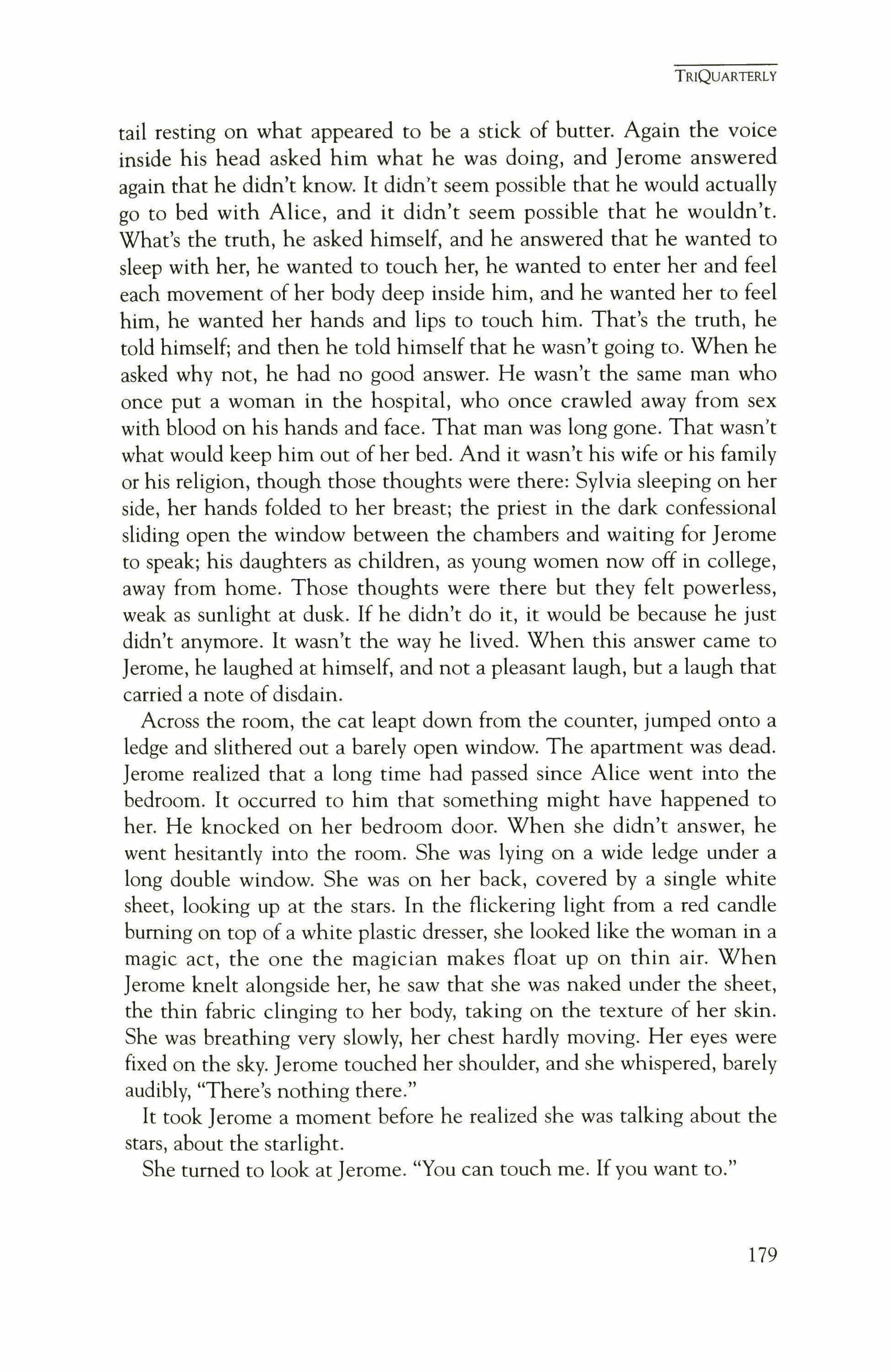
tail resting on what appeared to be a stick of butter. Again the voice inside his head asked him what he was doing, and Jerome answered again that he didn't know. It didn't seem possible that he would actually go to bed with Alice, and it didn't seem possible that he wouldn't. What's the truth, he asked himself, and he answered that he wanted to sleep with her, he wanted to touch her, he wanted to enter her and feel each movement of her body deep inside him, and he wanted her to feel him, he wanted her hands and lips to touch him. That's the truth, he told himself; and then he told himself that he wasn't going to. When he asked why not, he had no good answer. He wasn't the same man who once put a woman in the hospital, who once crawled away from sex with blood on his hands and face. That man was long gone. That wasn't what would keep him out of her bed. And it wasn't his wife or his family or his religion, though those thoughts were there: Sylvia sleeping on her side, her hands folded to her breast; the priest in the dark confessional sliding open the window between the chambers and waiting for Jerome to speak; his daughters as children, as young women now off in college, away from home. Those thoughts were there but they felt powerless, weak as sunlight at dusk. If he didn't do it, it would be because he just didn't anymore. It wasn't the way he lived. When this answer came to Jerome, he laughed at himself, and not a pleasant laugh, but a laugh that carried a note of disdain.
Across the room, the cat leapt down from the counter, jumped onto a ledge and slithered out a barely open window. The apartment was dead. Jerome realized that a long time had passed since Alice went into the bedroom. It occurred to him that something might have happened to her. He knocked on her bedroom door. When she didn't answer, he went hesitantly into the room. She was lying on a wide ledge under a long double window. She was on her back, covered by a single white sheet, looking up at the stars. In the flickering light from a red candle burning on top of a white plastic dresser, she looked like the woman in a magic act, the one the magician makes float up on thin air. When Jerome knelt alongside her, he saw that she was naked under the sheet, the thin fabric clinging to her body, taking on the texture of her skin. She was breathing very slowly, her chest hardly moving. Her eyes were fixed on the sky. Jerome touched her shoulder, and she whispered, barely audibly, "There's nothing there."
It took Jerome a moment before he realized she was talking about the stars, about the starlight.
She turned to look at Jerome. "You can touch me. If you want to."
TRIQUARTERLY
179
TRIQUARTERLY

He touched the palm of his hand to her cheek. Alice turned back to the window. "I'm someplace special," she said. "I'm someplace strange."
"I know," Jerome said. He kissed her on the forehead and left her staring out the window, her eyes moving from star to star. Half an hour later he was back in his own bed, lying quietly under a spread next to Sylvia. Her body was warm and he edged closer to her. His heart was beating slowly now, steady and calm. His thoughts felt clear and solid. Alice was young. She was alone and drugged looking out her bedroom window at the stars. He was with his wife and sober, looking, now, out his own bedroom window, at the same stars. They were different and they were the same, the three of them, everyone, wrapped in urging bodies, under the dead light of the stars.
180
Mercy Sharon Solwitz

Sometimes in the act of giving pleasure the hinge of my jaw'll catch, and I won't be able to open my mouth all the way. It doesn't happen when I talk or eat. Or yawn. Or get my teeth cleaned. It happens only in the event named above, and it hurts if I force it, and I can't always remember which way last time I wiggled to get free, and I recall instead the two men I saw once and never again, one of whom held my hair with one hand and pounded my face with the other, the side where the hinge of my jaw gets stuck now sometimes, till I was in the car with the door closed shut.
There was no pain. I remember that clearly, though it doesn't improve things. There was just the tiredness, the utter weakness a fish must feel, gills pulsing, pinned by a foot to the floor of the boat.
Gina had it worse though, Clark said, to make me feel better. Fifteen men on a beach in Mexico, fog so thick you couldn't see two feet in front. But you could hear her chanting, om om om, low and sweet like blowing into a seashell, Clark said. She was his friend, a traveling buddy, that's all-he stresses this. Someone had a gun. When the chanting stopped, Clark stepped toward the silence that had become a hole into which Gina was falling, and the gun waved him back. Get the foock from here, said the gun's bearer, or I blow your brains from your head! Clark, who was to become a professor of composition and rhetoric, repressed the impulse to say, It's get the fuck back or I'll blow your brains out. Feeling, among other things, crazy compassion for the guy who'd seen some but not enough American movies. Still the gun was multilingual. When the chanting started again Clark began shaking. Sometimes
TRIQUARTERLY
181
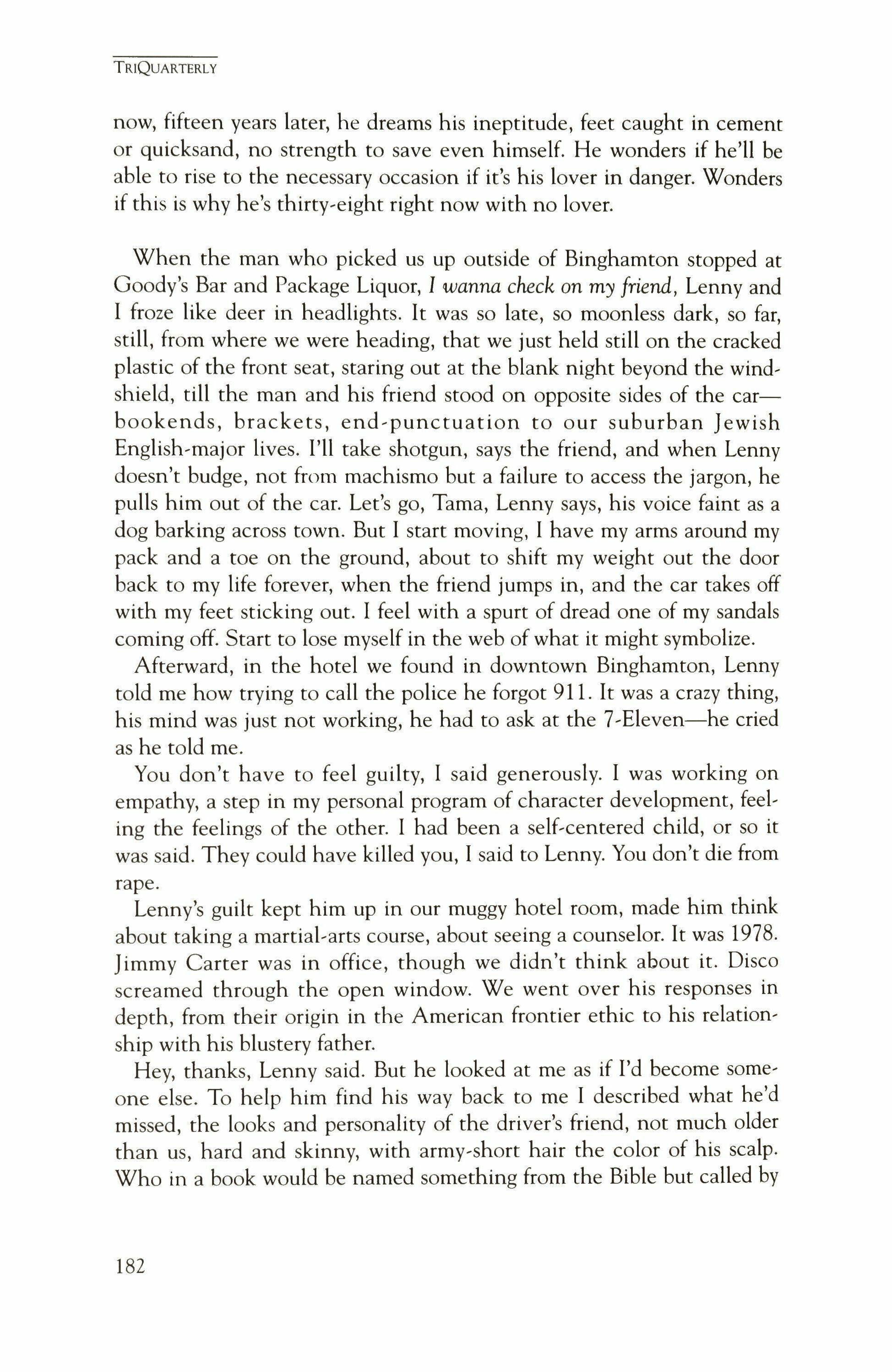
now, fifteen years later, he dreams his ineptitude, feet caught in cement or quicksand, no strength to save even himself. He wonders if he'll be able to rise to the necessary occasion if it's his lover in danger. Wonders if this is why he's thirty-eight right now with no lover.
When the man who picked us up outside of Binghamton stopped at Goody's Bar and Package Liquor, I wanna check on my friend, Lenny and I froze like deer in headlights. It was so late, so moonless dark, so far, still, from where we were heading, that we just held still on the cracked plastic of the front seat, staring out at the blank night beyond the wind, shield, till the man and his friend stood on opposite sides of the carbookends, brackets, e nd-puncruation to our suburban Jewish English-major lives. I'll take shotgun, says the friend, and when Lenny doesn't budge, not from machismo but a failure to access the jargon, he pulls him out of the car. Let's go, Tama, Lenny says, his voice faint as a dog barking across town. But I start moving, I have my arms around my pack and a toe on the ground, about to shift my weight out the door back to my life forever, when the friend jumps in, and the car takes off with my feet sticking out. I feel with a spurt of dread one of my sandals coming off. Start to lose myself in the web of what it might symbolize.
Afterward, in the hotel we found in downtown Binghamton, Lenny told me how trying to call the police he forgot 911. It was a crazy thing, his mind was just not working, he had to ask at the 7,Eleven-he cried as he told me.
You don't have to feel guilty, I said generously. I was working on empathy, a step in my personal program of character development, feel, ing the feelings of the other. I had been a self,centered child, or so it was said. They could have killed you, I said to Lenny. You don't die from rape.
Lenny's guilt kept him up in our muggy hotel room, made him think about taking a martial,arts course, about seeing a counselor. It was 1978. Jimmy Carter was in office, though we didn't think about it. Disco screamed through the open window. We went over his responses in depth, from their origin in the American frontier ethic to his relation, ship with his blustery father.
Hey, thanks, Lenny said. But he looked at me as if I'd become some' one else. To help him find his way back to me I described what he'd missed, the looks and personality of the driver's friend, not much older than us, hard and skinny, with army'short hair the color of his scalp. Who in a book would be named something from the Bible but called by
TRIQUARTERLY
182

the name of an unattractive minor animal, Mink or Wolverine. Would swear every other word. To me he said over and over, Shut the fuck up. I had no idea I had been talking. I thrashed about, pulled at his fingers, trying to disengage without hurting him, as my mother said to do with my younger sister. Through the hotel window came someone's clear rage: I was better off before I met you!
Lenny said, You could have bitten his arm. Or stuck your fingers in his eyes.
Clearly, he wanted to break up with me.
Have mercy, I said.
The next morning we went back for my sandal-I knew the place more or less, and who'd want one shoe? But though we looked for an hour and found a woman's pointy-toed pump (leather uppers) there was nothing of mine.
My old socialist landlord, former union baker, was mugged, once, by a group of junior-high thugs who not only took his wallet but punched him in the stomach. For no reason. In bed a week, he blamed not the boys but the System (capitalism), which drains out all your human feeling, he said, rolling a piece of Generic bread into a finger to dip in the soup I'd brought him: Punks. I pity 'em.
Afterward Gina ran naked into the ocean, said it had passed through without touching her. I am not this body, she said to herself, my sister/alter ego. I've never met her in fact, but part of me aspires to her. A more devout Buddhist than I am a Jew, she has a system large enough to comprise what happened to her. Although her fingers trembled slightly, her face and voice, I imagine, were calm without the comfort of a boyfriend. The assault had failed to reach the radiant core of her.
I gave a pair of policemen the details of my assailants, including tone of voice, texture and smell of skin. I bought a baking-powder douche because baking powder cancels refrigerator odors and sounds cleaner than clean, no? But for me, for weeks afterward, though I'd upended my torso for quick and easy entry, it burned when I walked and when I peed, and kissing Lenny wasn't the same either. I used to love to smooch him, on the couch, in the car driving-I loved the smell of him, even when he hadn't brushed his teeth for a while. When school started in the fall we were planning to share an apartment. But afterward, with the pain gone so we could have sex again, we kissed only when he wanted to, not ever from my own impulse.
I think I'm angry, I remember saying.
TRIQUARTERLY
183

With those guys? I don't blame you.
I don't know, I said, and he looked scared to death. I did not pursue the subject.
To be sure, nothing's resolved with "those guys," over whom in my dreams and daytime fantasies I wield the knife of castration. But they aren't only out of reach of my actual vengeance, they're out of my ken, Bad Guys, from nightmares and not daily life-no one I know.
I hugged Lenny. When school started, I studied somewhat harder than before. I did not become pregnant. Lenny and I very slowly became unacquainted. Like those Moslem men who cast out their violated wives and sisters, he felt I should have saved myself. (I might be wrong here.) At this moment I do not know where he is or what he is doing. His degree, I think, was in psychology.
I switched to European history, which I teach now {medieval and Renaissance} at a small,town branch of a state university. I publish infrequent articles. I'm writing a book about Christian saints. I'm mar' ried to a sweet and burly man who teaches social studies and coaches wrestling at the local high school, who'll protect me from marauders on the street. But when a male student cites an opinion with any ruffle of animosity I find it hard to disagree. Now class, who can address what Richard is saying? The area in which I feel utterly safe from harm is small and under assault, not only from people like the "guys" but something Lenny said a night or so after the event, Tell me the truth, was there any, er, pleasure? He was embarrassed. But he just had to know.
I want to beat on him-I think about that. To sock him in the mouth, the eye, watch it tum dark the next day. What kind of pleasure?, I'll scream. Is there pleasure for you being 100 percent at someone's mercy?
There was nothing but terror in the event-I've gone over it moment by moment looking for nuances, with friends, shrinks, and now husband Dan, though he's not big on nuances. He doesn't find power erotic at either pole. The sort of thinking that mixes good and evil he finds "sick." I sleep well in the absoluteness of his distinctions. And that he does not require oral sex. When I do it as a favor he seems to appreciate it.
Still, there's that weird boy at our son's summer camp, not so big him, self, who likes to play with the little kids, the preschoolers, Mercy, it's called. In this game you take someone's thin wrist in your two hands and twist in opposite directions till the fragile chains of cells pull away from
TRIQUARTERLY
184

each other with a sensation that feels partly like ripping and partly like burning. It's supposed to stop when the victim yells Mercy! or maybe just a little later, this game of machismo, of personal grit in the face of pain, good practice, perhaps, for dissidents of repressive regimes who will not betray their comrades. But when I go to pick Noah up in the gym where the children wait for their rides, the weird kid is holding his arm, and Noah, who rarely cries from physical pain, has this blank look, as if the world has just opened its horrendous possibilities. What do you think you're doing! I hiss at the boy, and he puts his fingers in his ears. I hold him by the shoulders: If you ever touch him again, do you hear me?, if you put another hand on my son, I'm coming for you, do you hear what I'm saying, you think you know about pain but that's nothing compared to what I'll do to you!
Big talk. It bounces off his skull of some weird, impermeable fusion of lead, kryptonite and pure evil. He twists his fingers deeper in his ears, shuts his eyes. I give him a shake, not as hard as I'd like, in truth I want to kill this boy for making the world one shade darker for my child so full of light. This is a bad kid, I say to myself, with, obviously, problems at home. He has trouble controlling himself, the director says, seating him in a comer to wait for his mother who hasn't brought him up properly, as I tum to hide the fact of my shaking, from him, this sick child who'll shoot from towers if he doesn't get therapy soon and maybe even if he does, this demon boy from whom I must save my boy so utterly different from him.
But the next day when I poke my head in the door Noah is with him again. The two spring apart with identical expressions of rapturous guilt, as if caught in some complicit, consensual lovemaking.
In pain there is, or so I recall from childhood, a sexual element. I used to draw Prometheus on his rock, belly open to the beak and talons of Zeus's avenging vulture. And Joan at the stake, flames lapping the hem of her tattered dress (crayoned brown to resemble a sack). My fifthgrade teacher asked us once, seriously, was there anything we'd give our lives for? I loved this teacher. My sister and I played spy and counterspy, one or the other being captured by the Russians. Confess! she'd scream: Would you rather be Red or Dead?, further compressing my hand in the vise on my father's basement workbench. I remember a dark ecstatic quiver, not the sale province of male children.
The old pain/pleasure thing. Aside from God, that's the heart of it, and maybe even as big as God, at least people cry Jesus, cry Satan with
TRIQUARTERLY
185
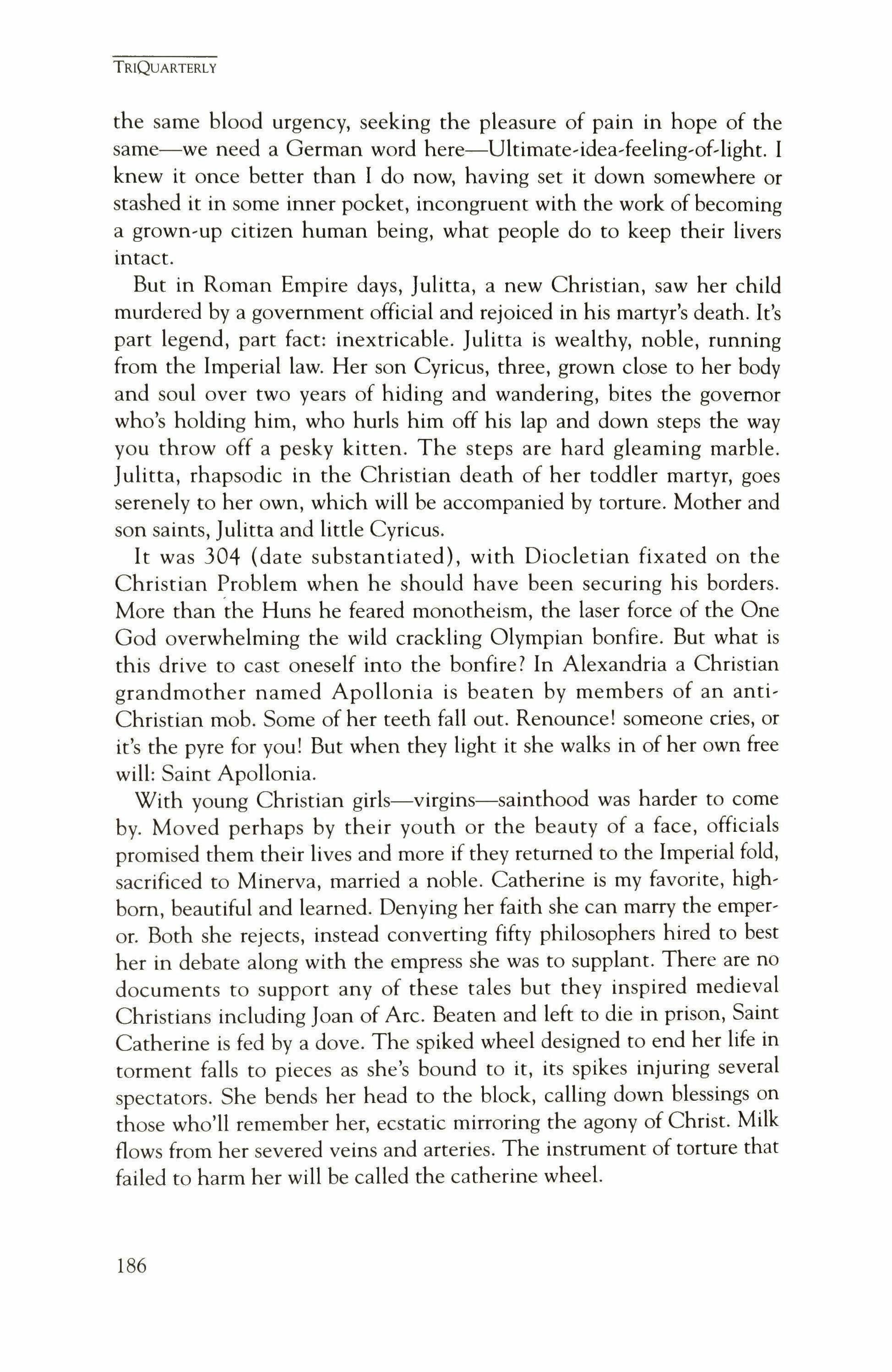
the same blood urgency, seeking the pleasure of pain in hope of the same-we need a German word here-Ultimate�idea�feeling�of�light. I knew it once better than I do now, having set it down somewhere or stashed it in some inner pocket, incongruent with the work of becoming a grown-up citizen human being, what people do to keep their livers intact.
But in Roman Empire days, [ulitta, a new Christian, saw her child murdered by a government official and rejoiced in his martyr's death. It's part legend, part fact: inextricable. julitta is wealthy, noble, running from the Imperial law. Her son Cyricus, three, grown close to her body and soul over two years of hiding and wandering, bites the governor who's holding him, who hurls him off his lap and down steps the way you throw off a pesky kitten. The steps are hard gleaming marble. [ulitta, rhapsodic in the Christian death of her toddler martyr, goes serenely to her own, which will be accompanied by torture. Mother and son saints, [ulitta and little Cyricus.
It was 304 (date substantiated), with Diocletian fixated on the Christian Problem when he should have been securing his borders. More than the Huns he feared monotheism, the laser force of the One God overwhelming the wild crackling Olympian bonfire. But what is this drive to cast oneself into the bonfire? In Alexandria a Christian grandmother named Apollonia is beaten by members of an antiChristian mob. Some of her teeth fall out. Renounce! someone cries, or it's the pyre for you! But when they light it she walks in of her own free will: Saint Apollonia.
With young Christian girls-virgins-sainthood was harder to come by. Moved perhaps by their youth or the beauty of a face, officials promised them their lives and more if they returned to the Imperial fold, sacrificed to Minerva, married a noble. Catherine is my favorite, highborn, beautiful and learned. Denying her faith she can marry the ernperor. Both she rejects, instead converting fifty philosophers hired to best her in debate along with the empress she was to supplant. There are no documents to support any of these tales but they inspired medieval Christians including Joan of Arc. Beaten and left to die in prison, Saint Catherine is fed by a dove. The spiked wheel designed to end her life in torment falls to pieces as she's bound to it, its spikes injuring several spectators. She bends her head to the block, calling down blessings on those who'll remember her, ecstatic mirroring the agony of Christ. Milk flows from her severed veins and arteries. The instrument of torture that failed to harm her will be called the catherine wheel.
TRIQUARTERLY
186

But at dusk when a tree or stop sign turns into the figure of a man I can't rise on the wings of her unimaginable suffering or ecstasy. Nor, in my self-defense class, can I strike the padded attacker with even half my strength. My blows have an element of caress. I am neither saint nor self-protector, My ego refuses either to die or prevail.
Don't think so much, says my instructor, herself a rape victim turned fierce with her message. You have the power to save your life.
I know that in theory.
You don't have to be a saint, says Dan.
If! were a saint I'd have forgiven them.
They're scum! Dan says.
That's what makes it so hard.
It's what separates the medieval mind from that of the Renaissance, I tell my students, the notion of there being two sides. It's the perspective from the mountaintop. Good-hearted, inept Jimmy Carter. What removes us from Catherine on one side and the Huns on the other, a sense of the unresolvable ambiguity of practically everything. I bear it like an illness.
My personal Huns had no such interior division. Resolute and fierce, they followed the rush of their blood to its culmination in act. If their minds held a self-image, it wasn't even as naughty boys but as executors of a primitive justice. The younger, the wolverine, kept calling me whore, as if rape were a punishment he was meting out for my promiscuity. Cornell-the name on my sweatshirt-'s a real cathouse!, he kept saying that. He went first, and after waiting patiently for his friend, slightly paunchy, limper of dick, to finish, he re-unzipped and said he wanted to do it again, not in the car but on the cool night asphalt of the empty lot we were parked in, and this time I was to show how much I liked it.
Sometimes now I stop my car in bad neighborhoods, buy a Coke from a store outside of which stand dissolute teens trying to get up the energy to mug someone. As if this fifteen-year-old event is my primal scene, to be played and replayed till it comes out right or else covers over what in fact occurred, what I haven't detailed yet, not even to Dan.
But fifteen years ago my jaw was starting to hurt, something like a molar toothache, an augmenting pain with no end in sight. Then in the face of Wolverine's uncircumcised dick, his bullet-shaped, almost hairless head, I push panic to one sector. From the small area of mind that can still think and speak come words from some high-school play, sticky
TRIQUARTERLY
187
TRIQUARTERLY

nauseous-sweet in the back of my throat: You are a kind man. You're a good and merciful man. Not to Wolverine but to the older, limper one. Prone on his backseat, I half raise my head, palms together in the Christian prayer position, though there's nothing Christian in what I am doing, no ideal to exalt, of faith or sexual purity, no one's life to save besides my own. I speak into his eyes, beseeching like Olive Oyl, like Pauline tied to the tracks: I've learned my lesson. I don't need to be hurt anymore, please, really I don't.
Kiss my hand, he says.
I do so.
Kiss my dick, says Wolverine. I reach, but clumsily. He pulls back the flap of gentile skin.
Kiss it I said!
I lean farther forward, alert, blank-whoever I was in the past or might be in the future in a bubble rising up and up. Then Limp-dick grabs his buddy by the back of his shirt. Stop farting around, he says.
Keep your eyes off the plates, Wolverine says to me. One look back and we're coming for you!
Thank you, I say, once, so as not to seem ironic. But I do not feel ironic. I feel unambiguous gratitude. Later I'll hate them for rubbing my face in the smallness and smarminess of my female power. But there on the pebbly asphalt of the parking lot I tremble with love for the limp one for thwarting his friend. Between his rear plate and my view in the approaching dawn he stands, his arms crossed like a genie from a bottle, like my hero-deliverer, my God in his mercy.
I'd rather be Red than dead, I say to myself. I'd rather be anything than dead.
I walk in my one shoe away down the road.
188
A Man_..To_..Be
Ha}in
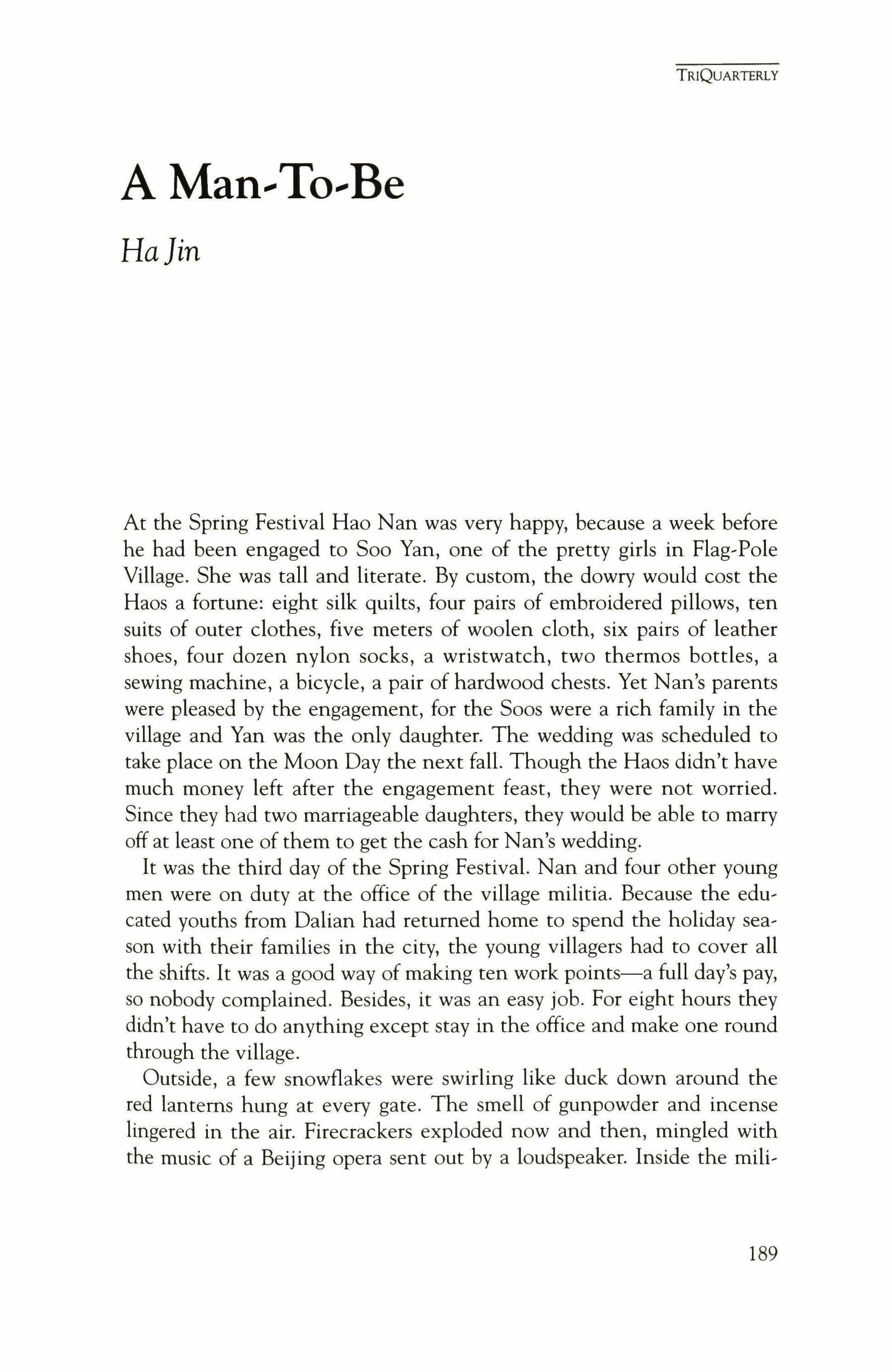
At the Spring Festival Hao Nan was very happy, because a week before he had been engaged to Soo Yan, one of the pretty girls in Flag-Pole Village. She was tall and literate. By custom, the dowry would cost the Haos a fortune: eight silk quilts, four pairs of embroidered pillows, ten suits of outer clothes, five meters of woolen cloth, six pairs of leather shoes, four dozen nylon socks, a wristwatch, two thermos bottles, a sewing machine, a bicycle, a pair of hardwood chests. Yet Nan's parents were pleased by the engagement, for the Soos were a rich family in the village and Yan was the only daughter. The wedding was scheduled to take place on the Moon Day the next fall. Though the Haos didn't have much money left after the engagement feast, they were not worried. Since they had two marriageable daughters, they would be able to marry off at least one of them to get the cash for Nan's wedding.
It was the third day of the Spring Festival. Nan and four other young men were on duty at the office of the village militia. Because the educated youths from Dalian had returned home to spend the holiday sea, son with their families in the city, the young villagers had to cover all the shifts. It was a good way of making ten work points-a full day's pay, so nobody complained. Besides, it was an easy job. For eight hours they didn't have to do anything except stay in the office and make one round through the village.
Outside, a few snowflakes were swirling like duck down around the red lanterns hung at every gate. The smell of gunpowder and incense lingered in the air. Firecrackers exploded now and then, mingled with the music of a Beijing opera sent out by a loudspeaker. Inside the mili189
TRIQUARTERLY
TRIQUARTERLY
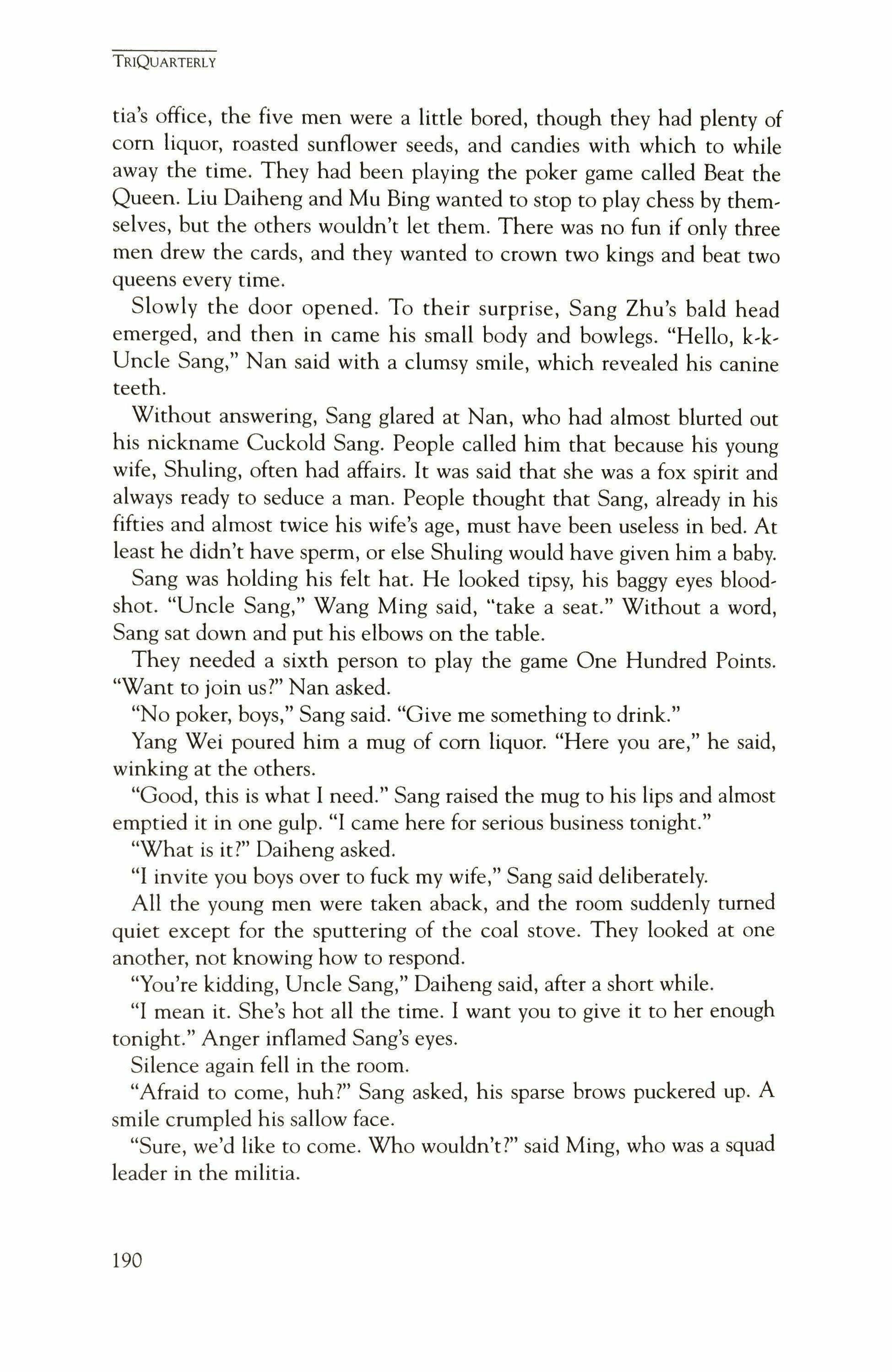
tia's office, the five men were a little bored, though they had plenty of corn liquor, roasted sunflower seeds, and candies with which to while away the time. They had been playing the poker game called Beat the Queen. Liu Daiheng and Mu Bing wanted to stop to play chess by themselves, but the others wouldn't let them. There was no fun if only three men drew the cards, and they wanted to crown two kings and beat two queens every time.
Slowly the door opened. To their surprise, Sang Zhu's bald head emerged, and then in came his small body and bowlegs. "Hello, k-kUncle Sang," Nan said with a clumsy smile, which revealed his canine teeth.
Without answering, Sang glared at Nan, who had almost blurted out his nickname Cuckold Sang. People called him that because his young wife, Shuling, often had affairs. It was said that she was a fox spirit and always ready to seduce a man. People thought that Sang, already in his fifties and almost twice his wife's age, must have been useless in bed. At least he didn't have sperm, or else Shuling would have given him a baby.
Sang was holding his felt hat. He looked tipsy, his baggy eyes bloodshot. "Uncle Sang," Wang Ming said, "take a seat." Without a word, Sang sat down and put his elbows on the table.
They needed a sixth person to play the game One Hundred Points. "Want to join us?" Nan asked.
"No poker, boys," Sang said. "Give me something to drink."
Yang Wei poured him a mug of corn liquor. "Here you are," he said, winking at the others.
"Good, this is what I need." Sang raised the mug to his lips and almost emptied it in one gulp. "I came here for serious business tonight."
"What is it?" Daiheng asked.
"I invite you boys over to fuck my wife," Sang said deliberately. All the young men were taken aback, and the room suddenly turned quiet except for the sputtering of the coal stove. They looked at one another, not knowing how to respond.
"You're kidding, Uncle Sang," Daiheng said, after a short while.
"I mean it. She's hot all the time. I want you to give it to her enough tonight." Anger inflamed Sang's eyes.
Silence again fell in the room.
"Afraid to come, huh?" Sang asked, his sparse brows puckered up. A smile crumpled his sallow face.
"Sure, we'd like to come. Who wouldn't?" said Ming, who was a squad leader in the militia.
190

"Well, sometimes heaven does drop meat pies," Bing said, as if to himself.
"No, we shouldn't go," Nan cut in, scanning the others' faces with his narrow eyes gleaming. He turned to Sang and said, "It's all right to do it to your wife, Uncle Sang, but that could be dangerous to us." Turning to the others, he asked, "Remember what happened at the brickyard last summer? You fellas don't want to get into that kind of trouble, do you?"
His words dampened the heat in the air. For a moment even the squad leader, Wang Ming, and Liu Daiheng, the oldest of them, didn't know what to say. Everybody remained silent. What Nan had referred to was a case in which a prostitute had been screwed to death by a bunch of brickmakers. Of course, prostitution was banned in the new China, but there were always women selling their flesh on the sly. That woman went to the brickyard once a month and asked for five yuan a customer, which was a big price, equal to two days' pay earned by a brickmaker. That was why the men wouldn't let her off easily. They gave her the money but forced her to work without a stop. As they had planned, they kept her busy throughout the night, and even after she lost consciousness they went on mounting her. She died the next day. Then the police came and arrested all the men. Later three of them were sentenced to eight years in prison.
"Nan's right. I don't think we should go," Wei said at last.
"You're no man," Sang said with a sneer, stroking his beardless chin. "I invite you boys to share my wife, free of charge, but none of you dare come. Chickens!"
"Uncle Sang, if you want us to come," Daiheng said, "you ought to write a pledge."
"But I don't know how to write."
"Good idea. We can help you with that," Ming said. "All right, you write and I'll put in my thumbprint."
Ming went to the desk, pulled a drawer, and took out a pen and a piece of paper. He sat down to work on the pledge.
Nan felt uneasy about the whole thing. How could a husband invite other men to have sex with his wife? he asked himself. I wouldn't. Never. Shuling must've had an affair with someone lately and have been caught by Cuckold Sang. They must've had a big fight today.
Sang was dragging at his pipe silently. Sitting beside him, Bing was putting the poker cards back into the box.
"Here," Ming said, walking over with the paper, "listen carefully, Uncle Sang." Then he read aloud with his eyebrows flapping up like a
TRIQUARTERLY
191

pair of beetle wings:
On the third eve of the Spring Festival, I, Sang Zhu, came to the Militia's Office and invited five young militiamen-Hao Nan, Liu Daiheng, Yang Wei, Mu Bing, and Wang Ming-to have sex with my wife Niu Shuling. By doing this, I mean to teach her a lesson so she will stop seducing other men and be a chaste woman in the future. If any physical damage is done to her in the process of the activity, none of the young men shall be responsible. I, Sang Zhu, the husband, will bear all consequences.
The Pledger:
Sang Zhu
Wei placed the ink-paste box on the desk. "Put in your thumbprint if you agree, Uncle Sang."
"All right." Sang pressed his ringworm-nailed thumb into the ink, took it out, blew on its pad, and stamped a scarlet smudge under his name. He wiped off the ink on the leg of his cotton-padded trousers, which were black but shiny with grease stains. Turning away from the table, he blew his nose; two lines of mucus landed on the dusty floor.
"Now, let's go," Ming said, and motioned to the others as though they were going off to bag a homeless dog, which they often did on night patrol.
Nan felt unhappy about the pledge, because Ming, the son of a bitch, had put Nan's name the first and his own name the last among the group, as if Nan had led them in this business. At least, it read that way on paper. He was merely a small soldier, whereas Ming was a leader.
The snow stopped, and the west wind was blowing and would have chilled them to the bones if they had not drunk a lot of liquor. Each of them was carrying a long flashlight, whose beam now stabbed into the darkness and now hit a treetop, sending sleeping birds on the wing. They were eager to reach the Sangs', get hold of that loose woman, and overturn the rivers and seas in her. In raptures they couldn't help singing. They sang "I Am a Soldier," "Return to My Mother's," "Our Navigation Depends on the Great Helmsman," "Without the Communist Party There Would Be No New China." In the distance, soundless firecrackers bloomed in the sky over Sea Watch Village. The white hills and fields seemed vaster than they were in daylight. The first
TRIQUARTERLY
192
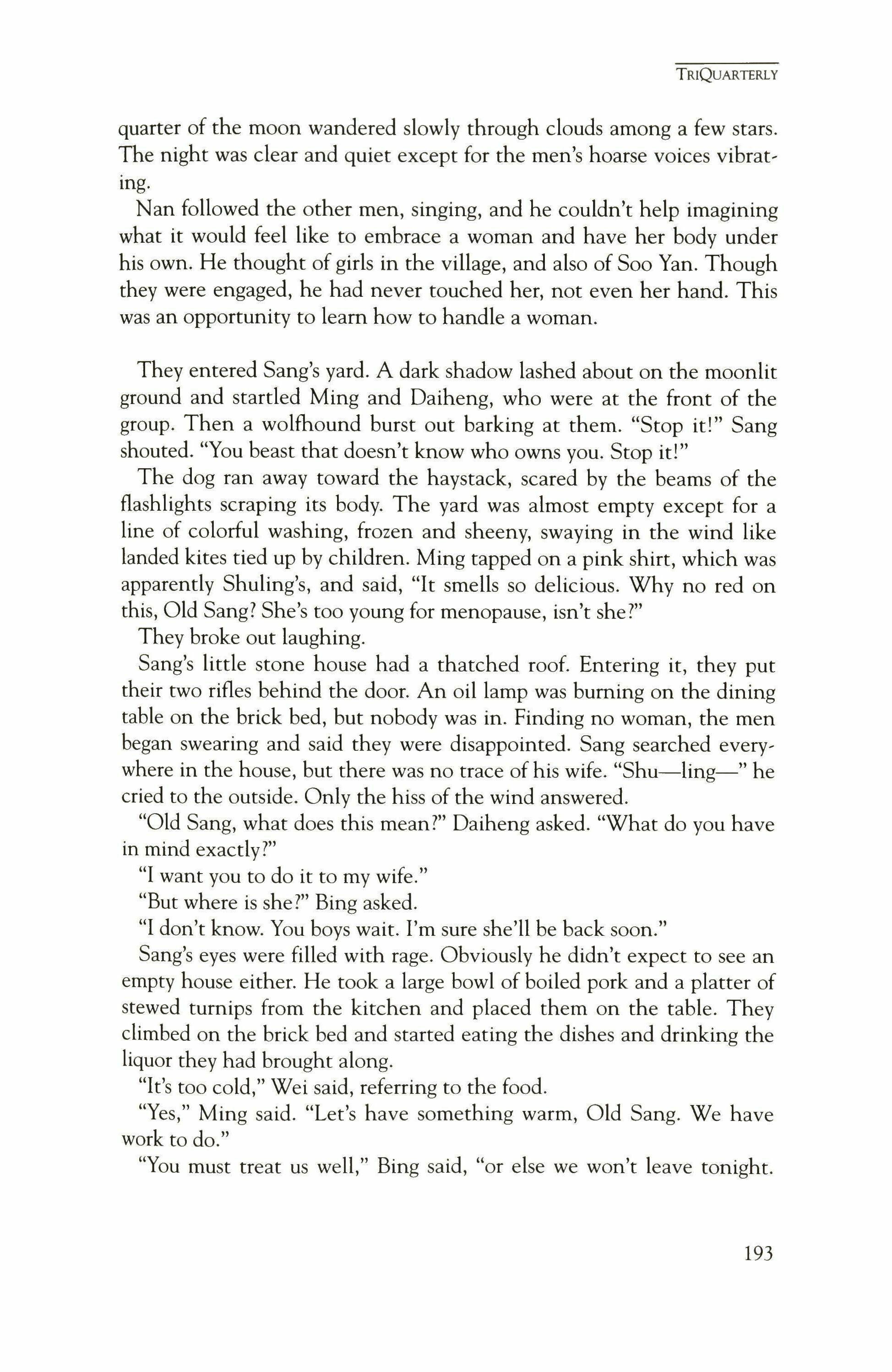
quarter of the moon wandered slowly through clouds among a few stars. The night was clear and quiet except for the men's hoarse voices vibrating.
Nan followed the other men, singing, and he couldn't help imagining what it would feel like to embrace a woman and have her body under his own. He thought of girls in the village, and also of Soo Yan. Though they were engaged, he had never touched her, not even her hand. This was an opportunity to learn how to handle a woman.
They entered Sang's yard. A dark shadow lashed about on the moonlit ground and startled Ming and Daiheng, who were at the front of the group. Then a wolfhound burst out barking at them. "Stop it!" Sang shouted. "You beast that doesn't know who owns you. Stop it!"
The dog ran away toward the haystack, scared by the beams of the flashlights scraping its body. The yard was almost empty except for a line of colorful washing, frozen and sheeny, swaying in the wind like landed kites tied up by children. Ming tapped on a pink shirt, which was apparently Shuling's, and said, "It smells so delicious. Why no red on this, Old Sang? She's too young for menopause, isn't she?"
They broke out laughing.
Sang's little stone house had a thatched roof. Entering it, they put their two rifles behind the door. An oil lamp was burning on the dining table on the brick bed, but nobody was in. Finding no woman, the men began swearing and said they were disappointed. Sang searched everywhere in the house, but there was no trace of his wife. "Shu-ling-" he cried to the outside. Only the hiss of the wind answered.
"Old Sang, what does this mean?" Daiheng asked. "What do you have in mind exactly?"
"I want you to do it to my wife."
"But where is she?" Bing asked.
"I don't know. You boys wait. I'm sure she'll be back soon."
Sang's eyes were filled with rage. Obviously he didn't expect to see an empty house either. He took a large bowl of boiled pork and a platter of stewed turnips from the kitchen and placed them on the table. They climbed on the brick bed and started eating the dishes and drinking the liquor they had brought along.
"It's too cold," Wei said, referring to the food.
"Yes," Ming said. "Let's have something warm, Old Sang. We have work to do."
"You must treat us well," Bing said, "or else we won't leave tonight.
TRIQUARTERLY
193
TRIQUARTERLY

This is our home now."
"All right, all right, you boys don't go crazy. I'm going to cook you a soup, a good one."
Sang and Daiheng went to the kitchen, lighting the stove and cutting pickled cabbages and fat pork. In the village Daiheng was well known as a good cook, so he did the work naturally.
"Don't be stingy. Put in some dried shrimps," Wei shouted at the men in the kitchen.
"All right, we will," Sang yelled back.
Nan remained silent meanwhile. He didn't like the tasteless meat and just kept smoking Sang's Glory cigarettes and cracking roasted melon seeds. In the kitchen the bellows started squeaking.
Ming and Wei were playing a finger-guessing game, which Nan and Bing didn't know how to play but were eager to learn. Nan moved closer, watching their hands changing shapes deftly under the oil lamp and listening to them chanting aloud:
A small chair has square legs, A little myna has a pointed hill. It's time you eat spider eggs, Drink pee and gulp swill.
Five heads, Six fortunes, Three stars, Eight gods, Nine cups-
"Got you!" Ming yelled at Wei. Pointing at a mug filled with liquor, he ordered, "Drink this."
They hadn't finished the second round when Daiheng and Sang rushed in. "She's here. She's here," Daiheng whispered, his voice in a flutter.
Before they could straighten up, Shuling stepped in, wearing a red scarf and puffing out warm air. She whisked the snowflakes off her shoulder with a pair of mittens and greeted the men. "Welcome," she said. She looked so fresh with her pink cheeks and permed hair. Her plump body swayed a little against the white door curtain, as if she didn't know whether she should stay in or go out.
"Well, well, well," Ming hummed.
194

"Where have you been?" Sang asked sharply, then went up to her and grabbed the front ofher sky-blue jacket.
"I, I-let me go." She was struggling to free herself.
"I know where you were. With that pale-faced man again. Tell me, is that true or not?" Sang pulled her closer to himself. He referred to a young cadre on the work team which was investigating the graft and bribery among the leaders of the production brigade. Nan remembered seeing that man and Shuling together in the grocery store once.
"Let me go. You're hurting me," she begged, and turned to the others, her round eyes flashing with fear.
"You stinking skunk, always have an itch in your cunt!" Sang bellowed. "I want you to have it enough today, as a present for the Spring Festival. See, I have five men for you here. Every one of them is strong as a bull." His head tilted to the militia.
"No, don't. Please don't," she moaned with her hands held together before her chest.
"What are you waiting for, boys?" Sang shouted at the young men.
They all jumped up and went to hold her. "Brothers, don't do this to me," she wailed.
"Do it to her! Teach her a good lesson," her husband yelled.
They grabbed her limbs and carried her onto the brick bed. She struggled and even tried to kick and hit them, but like a tied sheep she couldn't move her legs and arms. Daiheng pinched her thigh as Ming was rubbing her breasts with his hand. "Not bad," Ming said, "not flabby at all."
"Oh, you hooligans. Let your grandma go. Ouch!"
With laughter, they placed her on the hard bed. She never stopped cursing, "All your ancestors will go to hell. Sons of asses I'll tell your parents Your houses will be struck by thunderbolts! You'll die without a son
Her curses only incensed the men. Bing rolled one end of her woolen scarf into a ball and thrust it into her mouth. Instantly she stopped making noises. Then Sang produced some ropes and tied her hands to the legs of the dining table. Meanwhile, Wei and Nan, as they were told by Ming, were binding her feet to the beam that formed the edge of the bed.
They slipped their hands underneath her underclothes, kneading her breasts and rubbing her crotch. Then they ripped open her jacket, shirts, pants, and panties. Her partly naked body was squirming helplessly in the coppery light.
TRIQUARTERLY
195

Daiheng took out five poker cards, from 1 to 5, mixed them and then put them on the bed. By turns they picked the cards. Wei had "5," Nan "4," Bing "3," Daiheng "2." As Ming got "1," he was to do it first.
"All right," Sang said calmly, "everything is fine. Now you boys enjoy yourselves." He raised the door curtain and went out.
Ming began to mount Shuling, saying, "I've good luck this year. Nan, little bridegroom, watch your elder brother carefully and learn how to do it."
Nan was wondering whether Daiheng had contrived a trick in dealing out those cards. How come both Ming and Daiheng had got ahead of the three younger men? But he didn't attend to his doubt for long, since soon Ming's lean body was wriggling violently on Shuling's. Having never seen such a scene, Nan felt giddy and short of breath, but he was also eager to experience it. They all watched intently. Meanwhile the woman kept her face away from them.
While Daiheng was on Shuling, biting her shoulders and making happy noises, Sang came in with a small enamel bowl in his hand. He climbed on the bed and placed it beside his wife's head. He clutched her hair and pulled her face over, and said, "Look at what's in the bowl." He picked up a bit of the red stuff with three fingers and let it trickle back into the bowl. "Chili powder. I'll give it to you. Wait, after they are done with you, I'll stuff you with it, to cure the itch in there for good."
His wife closed her eyes and shook her head slightly.
Bing, who was the third, obviously had no experience with a woman before. No sooner had he got on top of her than he came and gave up. He held his pants, looking painful as though having just swallowed a bowl of bitter liquid medicine. He coughed and blew his nose.
Now it was Nan's turn. He seemed bashful as he moved to that body. Though this was his first time, he felt himself having enough confidence. He straddled her and started unbuckling his pants. He looked down at her body, which reminded him of a huge frog, tied up, waiting to be skinned for its legs. Looking up, he noticed that her ear was small and delicate. He grabbed her hair and pulled her face over to see closely what she looked like. She opened her eyes, which were full of sparkling tears and staring at him. He was surprised by the fierce eyes but could not help observing them. Somehow her eyes were changing-the hate and the fear were fading, and beneath their blurred surfaces loomed a kind of beauty and sadness that was bottomless. Nan started to fantasize, thinking of Soo Yan and other pretty girls in the village. Unconsciously he bent down and intended to kiss that pale face, which turned aside
TRIQUARTERLY
196

and spilled the tears. His head began swelling.
"What are you doing?" Daiheng shouted at Nan.
Suddenly a burst of barking broke out beyond the window. The wolfhound must have been chasing a fox or a leopard cat that had come to steal chickens. Wild growls and yelps filled the yard all at once.
"Oh!" Nan cried out. Something snapped in his body; a numbing pain passed along his spine and forced him off her. By instinct, he managed to get to his feet and rushed to the door, holding his pants with both hands. Cold sweat was dripping from his face.
Once in the outer room he dropped to his knees and began vomiting. In addition to the smell of the half-cooked cabbage soup in the caul, dron, the room was instantly filled with the odor of alcohol, sour food, fermented candies, roasted melon seeds. His new cotton,padded shoes and new Dacron jacket and trousers were wet and soiled.
"Little Nan, come on!" Daiheng said. Putting his hand on Nan's head, he shook him twice.
"I'm scared. No more," Nan moaned, buckling his belt.
"Scared by a dog? Useless," Sang said, and restrained himself from giving Nan a kick.
"Come on, Nan. You must do it," Ming said. "You just lost your Yang. Go get on her and have it back. Or you've lost it for good, don't you know that?"
"No, no, I don't want to." Nan shook his head, groaning. "Leave me alone. I'm sick." He rubbed his eyes to get rid of the mist caused by the dizziness. His hands were slimy.
"Let that wimp do what he wants. Come back in," Sang said aloud, straddling the threshold.
They went in to enjoy themselves. "Ridiculous, scared by a dog," Wei said, giggling and scratching his scalp.
Holding the comer of the caldron range in the dark, Nan managed to stand up, and he staggered out into the windy night.
As Ming said, Nan lost his potency altogether. In fact, he lay in bed for two days after that night when he had walked home bareheaded through the flying snow. At first, he dared not tell his parents what had happened, but within a week the entire village knew Nan had been frightened by Sang's dog and had lost his Yang. His father scolded him a few times, while his mother wept in secret.
Two weeks later, the Soos returned to the Haos the Shanghai wrist' watch and the Flying Dove bicycle, two major items of the dowry
TRIQUARTERLY
197
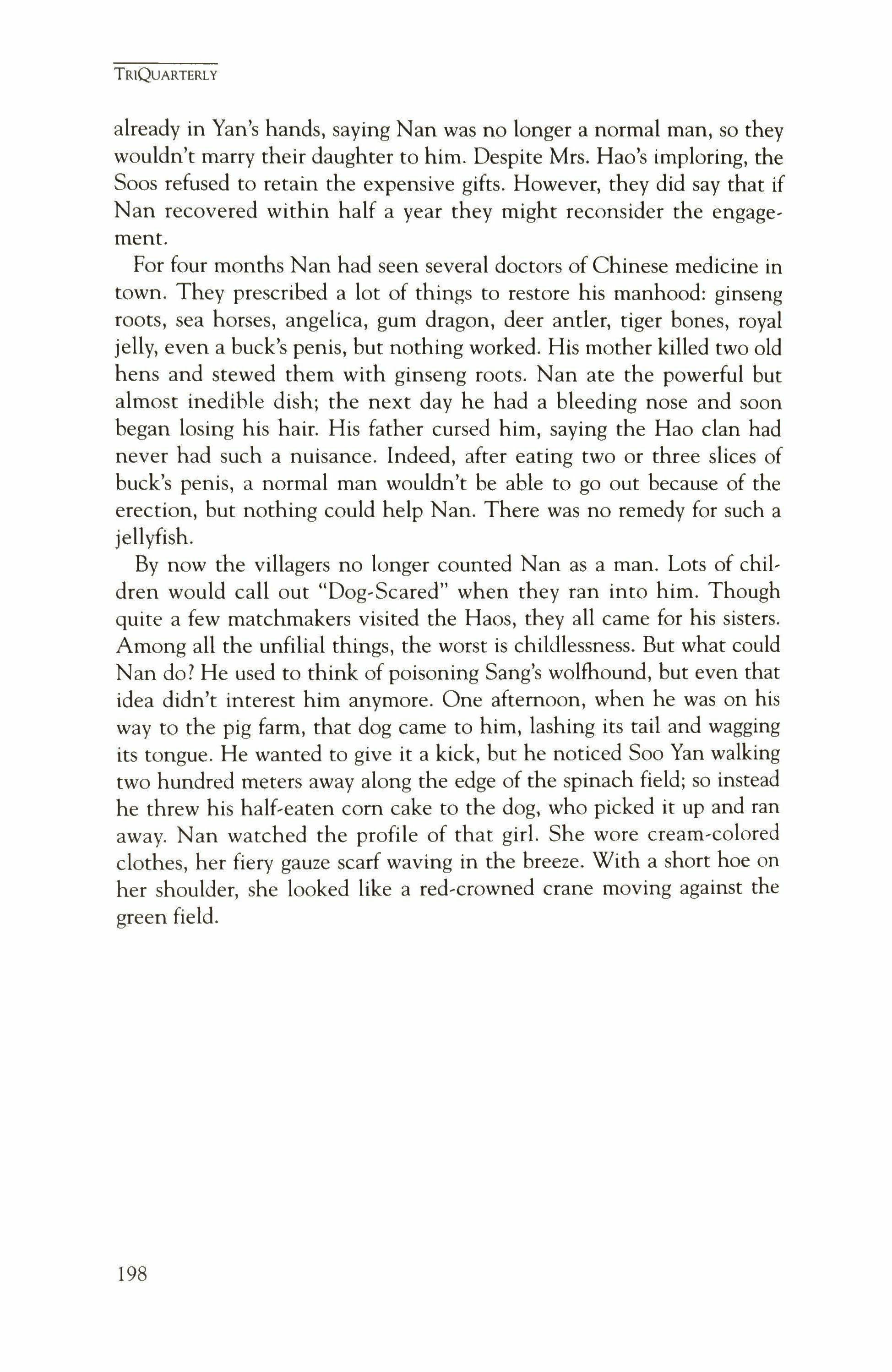
already in Yan's hands, saying Nan was no longer a normal man, so they wouldn't marry their daughter to him. Despite Mrs. Hao's imploring, the Soos refused to retain the expensive gifts. However, they did say that if Nan recovered within half a year they might reconsider the engagement.
For four months Nan had seen several doctors of Chinese medicine in town. They prescribed a lot of things to restore his manhood: ginseng roots, sea horses, angelica, gum dragon, deer antler, tiger bones, royal jelly, even a buck's penis, but nothing worked. His mother killed two old hens and stewed them with ginseng roots. Nan ate the powerful but almost inedible dish; the next day he had a bleeding nose and soon began losing his hair. His father cursed him, saying the Hao clan had never had such a nuisance. Indeed, after eating two or three slices of buck's penis, a normal man wouldn't be able to go out because of the erection, but nothing could help Nan. There was no remedy for such a jellyfish.
By now the villagers no longer counted Nan as a man. Lots of children would call out "Dog-Scared" when they ran into him. Though quite a few matchmakers visited the Haos, they all came for his sisters. Among all the unfilial things, the worst is childlessness. But what could Nan do? He used to think of poisoning Sang's wolfhound, but even that idea didn't interest him anymore. One afternoon, when he was on his way to the pig farm, that dog came to him, lashing its tail and wagging its tongue. He wanted to give it a kick, but he noticed Soo Yan walking two hundred meters away along the edge of the spinach field; so instead he threw his half-eaten com cake to the dog, who picked it up and ran away. Nan watched the profile of that girl. She wore cream-colored clothes, her fiery gauze scarf waving in the breeze. With a short hoe on her shoulder, she looked like a red-crowned crane moving against the green field.
TRIQUARTERLY
198
Some Say the World
Susan Perabo

There is fire in my heart. I do what I can.
I sleep deep sleep. I sit in my bedroom window, bare feet on the roof, and scratch dry sticks across the slate. In the two months I've been living here, though, I've spent most of my time playing board games with Mr. Arnette, my mother's new husband. He seems to have an unending supply of them in his basement from when his kids lived at home. My mother isn't around very often. She works at the makeup counter at Neiman Marcus, although she really hasn't needed to since she and Mr. Arnette were married. Mr. Arnette retired a few years ago, at forty, when he sold the windshield safety-glass company he had started right out of high school for what my mother described as "a fancy sum, for something that still shatters." It was right after that that she met and married him. But she works anyway, only now she calls it a hobby.
It's early March; more importantly, Monday night, the night my mother pretends to be in class at community college. This semester it's poetry, but she's run the gamut. Two summers ago she thought she had me convinced she'd taken up diving.
When she comes in the door a little after nine she sets her clearly untouched poetry book on the end table next to where I am on the couch.
"How was it?" Mr. Arnette asks, smacking his gum and not looking up from the board.
"Oh my," my mother said. "You wouldn't believe the things those people wrote then."
"Who'd you do tonight?" I ask her. It is a game that I have worked up. Sometimes I suspect that Mr. Arnette is playing it as well, but other
TRIQUARTERLY
199

times I think he's just being duped by her. You can never tell with Mr. Arnette. Sometimes I imagine he has a secret life, although he rarely leaves the house. He seems the type of guy who might have boxes of knickknacks buried all over the world for no reason.
"What's that?" my mother asks, separating the lashes over one eye, which have been caked with sweat-soaked mascara.
"Who'd you do tonight?" I put a cigarette in my mouth, wait for one of them to light it.
"Oh, Browning," my mother says.
"Which one?" Mr. Arnette asks. He looks up at me, not her, then takes the lighter from his shirt pocket and snaps on the flame in front of my face, so close I could reach out and swallow it.
"Which one?" she asks.
"Which Browning," Mr. Arnette says. The lighter disappears back into his shirt.
My mother misses a beat, then says, "All of them."
She hovers over the Parcheesi board, feigning interest in the game, and her mink stole knocks one of my pieces to the floor. Mr. Arnette makes a disgusted sigh, although it was him, I know, who bought her the thing. She likes to wear it to work, along with a lot of expensive jewelry. She does not work fGJT her customers, she recently explained to me, she works with them.
She pats my head. "About your bedtime," she says, as if I am twelve and have to get up early to catch the school bus, not eighteen and drugged beyond understanding anything much more difficult than Parcheesi and knowing that my mother, at forty, is sneaking around in motel rooms.
My parents were divorced when I was five. I have not seen my father since then, but even so I've been able to keep track of his moods. If my mother is irritable on Monday nights I know that my father is considering calling everything off. If she is sad I know that he has asked for her back. If she is her usual perky self, like tonight, I know that things have gone as planned. They have met every Monday in the same motel since I was in the sixth grade and playing with lighters under my covers after bedtime. I used to find motel receipts, not even torn or wadded up, but just lying in the kitchen wastebasket next to orange peels and soggy cigarettes, with "Mr. and Mrs." and then my father's name following. Still, my mother, through eight years and two more husbands, has never spoken of it to me, and acts as if I could not possibly have figured it out.
TRIQUARTERLY
200

Thus over the years I have been forced to make up my own story of them: passionate but incompatible, my father a dashing and successful salesman, only through town once a week, only able (willing") to give my mother three hours. Other times I think it is she who insists on being home each Monday by nine, she that likes doling herself out on her terms, only in small doses. I imagine that they do not talk, that their clothes are strewn around the room before there is time to say anything, and back on by the time they catch their breath. It is easier for me to think of it this way, because I can't imagine what they might possibly say to each other.
At Neiman Marcus, where my mother works, they found me in a dressing room last winter with a can of lighter fluid and my pockets stuffed with old underwear and dishtowels. This incident was especially distressing because everyone finally thought that after nearly eight years I had been cured, that the fire was gone, that I was no longer a threat to society. The police led me out of the store handcuffed, first through women's lingerie and then smack past the makeup counter, where my mother was halfway pretending not to know me, or to know me just well enough to be interested in what was taking place. They put me away for almost a year for that one, my third time in the hospital since the first fire. The length of my stay was caused by pure frustration, I'm convinced, on the part of my doctors. The "we'll teach her" philosophy of psychology. Two months ago they let me out again, into a different world where my mother is married yet again, and I spend my days spitting on dice with her husband and asking politely for matches to light my cigarettes. Either the doctors think I am cured or they have given in, the way I have, the way I did when I was only eleven, when I realized the fire was like blood, water, shelter. Essential.
The thing about fire is this: it is yours for one glorious moment. You bear it, you raise it. The first time, in the record store downtown, I stood over the bathroom trash can, thinking I would not let it grow, that I would love it only to a point, and then kill it. That is the trick with fire. For that thirty seconds, you have a choice: spit on it, step on it, douse it with a can of Coke. But wait one moment too long, get caught up in its beauty, and it has grown beyond your control. And it is that moment that I live for. The relinquishing. The power passes from you to it. The world opens up, and you with it. I cried in the record store when the flame rose above my head: not from fear, but from ecstasy.
TRIQUARTERLY
201
TRIQUARTERLY

I sleep sixteen hours a day, more if it's rainy. Another rationale: enough Xanax and I will be too tired to start fires. I am in bed by ten and don't get up till nearly noon. Usually I take a nap before dinner. The rest of the time is game time. It's a murky haze, more often than not. Me forgetting which color I am, what the rules are. Sometimes Mr. Arnette corrects me; other times he lets it go and it is three turns later by the time I realize I have moved my piece the wrong way on a oneway board.
We are on a Parcheesi kick now. Seven or eight games a day. We don't talk much. Mostly we just talk about the game, about the pieces as if they are real people, with spouses and children waiting in some tiny house for them to return from their endless road trips. "In a slump. You're due," Mr. Arnette will say to his men. Sometimes he whispers to the dice. I suspect this is all to entertain me, because he is always checking my reaction. Usually I smile.
Twice a week Mr. Arnette drives me across town to see my psychiatrist. He reads magazines in the waiting room while I explain to the doctor that I am fine except for the fact that I take so much Xanax I feel my brain has been rewired for a task other than real life. The doctor always nods at this, raising his eyebrows as if I have given him some new information that he will get right on, and then tells me the medication will 'eventually remedy any "discomfort" I might be feeling. I am used to this, and have learned not to greet with great surprise the fact that no one is going to help me in any way whatsoever.
It's Friday, and on the way home from the doctor's we drive by a Lions Club carnival that has set up in a park near Mr. Arnette's house. It is twilight, and my mother will be waiting for us at home, but for some reason Mr. Arnette follows the waving arms of a fat clown and pulls into the carnival parking lot.
"What do you say?" he says. He takes a piece of gum from his pocket and puts it in his mouth.
I look out the window at the carnival. I don't get out much. Grocery stores are monumental at this point, and the sight of all these people milling around, the rides, the games, frightens me. A Ferris wheel directly in front of me is spinning around and around, and it makes me dizzy just watching it.
"I'm kinda tired," I say.
Mr. Arnette chews louder, manipulates the gum into actually sounding frustrated.
202

"I think it'd be good for you," he says. He has never said such a thing before, but instead of causing me to feel loved and comforted it makes me nauseous. I've been told everything from shock treatments to making lanyards would be "good for me," and in practically this same tone. I feel like crying, and know if I do that he will panic and take me home. But I don't have the time. He is out of the car before I can well up any tears, and I continue to sit, my seat belt still on, staring out the window into the gray sky. Mr. Arnette stands in front of the fender, gesturing for me to join him.
The last time I was at a carnival was the Freshman Fair at my high school, five thousand years ago. I went on a Saturday night with a boy named Dave who took pictures for the school paper. He held my hand as we walked through the crowds of people and he was sweaty-greasy, almost. He stuck his tongue in my ear in the Haunted House ride and I barely noticed because they had a burning effigy of our rival school's mascot on the wall. The fire licked along the walls and I realized with absolute glee that they had set up one hell of a fire hazard.
Mr. Arnette gets back into the car with a sigh, but does not drive away.
"You need to get out more," he says, and I wonder what has changed, wonder if he had a fight with my mother, or sex with my mother, or some other unlikely thing.
"Used to take the kids here," he says, spinning the keys around his finger. I don't even know his kids' names. They call occasionally, but he speaks so rarely when he's on the phone with them that I can't pick up very much information. I imagine them jabbering away somewhere about work and weather and the price of ground round while he sits on the kitchen stool, picking his fingernails and nodding into the phone.
"I'm not exactly a kid," I say.
"You don't like carnivals?"
"I just don't feel like it."
"If she doesn't feel like it then she doesn't feel like it," he says, as if there is someone else in the car, another part of him, maybe, who he is arguing with.
We continue our drive home in silence. When we stop at a red light he says, "Why do you take all that shit if it makes you feel so bad?"
I laugh at him. It is a question so logical that it pegs him for a fool, and I can't believe I'm really sitting here with him.
"It's not quite that simple," I say.
He shrugs, gives it up, continues the drive home. He is not a fighter, not a radical. Once I came upon him in my bedroom, looking through a
TRIQUARTERLY
203

photo album of people he had never met. I stood in the doorway and watched him for nearly ten minutes, as he smiled slightly, turning the pages, and I imagined him making up lives for the people in my life. He is that way. Content not to get the whole picture.
I'm standing in the bathroom, trying to stir up enough nerve to just dump them, the whole bottle. My mother taps lightly on the door. I spend more than two minutes in the bathroom and she gets edgy.
"Honey?"
"Just a second," I say. I'm holding them in my hand, all of them. There must be a million of them, at least, enough to confuse me until I hit menopause.
"Are you sick?"
I close my hand around the pills and open the door just far enough for her to get her foot in it.
"Mother," I say. "I'm fine. I'm just putting on a little makeup."
This gets her, physically sends her back a step. She wants to believe it so much that I can see her talking herself into it.
"But it's almost time for bed," she says.
"Just to see how it looks," I say, giving her a big smile through the crack and inching the door closed again. I hear Mr. Arnette's heavy footsteps come tromping up the stairs.
"What's the fuss?" he asks.
"She's putting on makeup," my mother says in a stage whisper. "Maybe she's trying to look cute for you."
That takes care of my clenched hand. It opens of its own accord at my mother's words, and the pills sink to the bottom of the toilet, falling to pieces as they go.
"I think she's really just feeling up to it, starting to feel better," I hear my mother say. It is a new tone for her, and this time it's really a whisper, really some sentiment she doesn't want me to hear. I put my ear against the door. "I'd do anything to make her happy," she says. It makes my chest hurt, she believes it so much.
Sunday has come and my eyes can't stay open wide enough. I feel as if I have gotten glasses and a hearing aid over the weekend; colors are brighter and words sharper. No echoes. Words stop when mouths stop. My mother looks at me suspiciously when she comes into the kitchen early in the morning and finds me cooking bacon.
"What's gotten into you?" she asks, pleasantly enough, but with a
TRIQUARTERLY
204
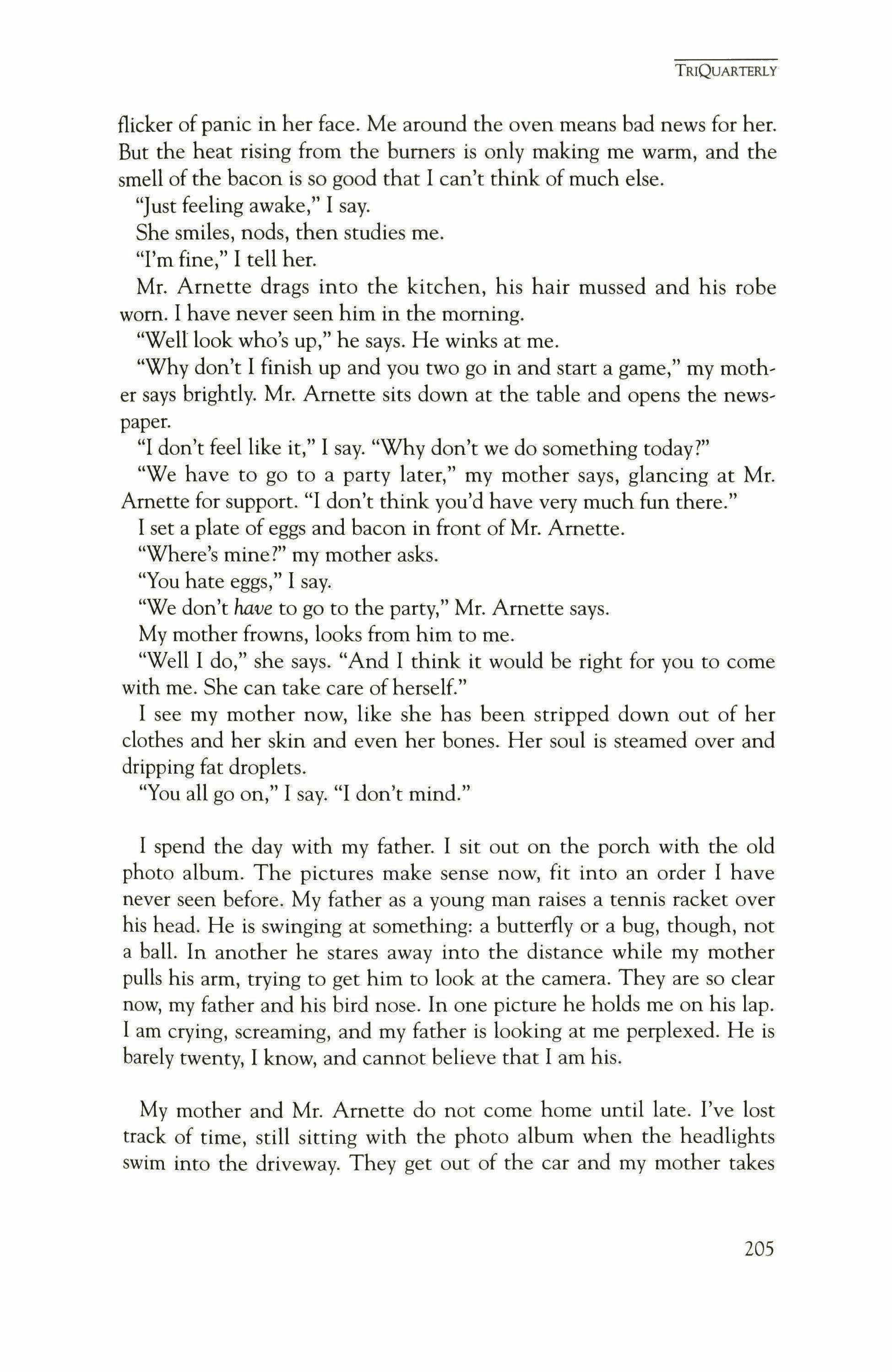
flicker of panic in her face. Me around the oven means bad news for her. But the heat rising from the burners is only making me warm, and the smell of the bacon is so good that I can't think of much else.
"Just feeling awake," I say.
She smiles, nods, then studies me.
"I'm fine," I tell her.
Mr. Arnette drags into the kitchen, his hair mussed and his robe worn. I have never seen him in the morning.
"Welt look who's up," he says. He winks at me.
"Why don't I finish up and you two go in and start a game," my mother says brightly. Mr. Arnette sits down at the table and opens the newspaper.
"I don't feel like it," I say. "Why don't we do something today?"
"We have to go to a party later," my mother says, glancing at Mr. Arnette for support. "I don't think you'd have very much fun there."
I set a plate of eggs and bacon in front of Mr. Arnette.
"Where's mine?" my mother asks.
"You hate eggs," I say.
"We don't have to go to the party," Mr. Arnette says.
My mother frowns, looks from him to me.
"Well I do," she says. "And I think it would be right for you to come with me. She can take care of herself."
I see my mother now, like she has been stripped down out of her clothes and her skin and even her bones. Her soul is steamed over and dripping fat droplets.
"You all go on," I say. "I don't mind."
I spend the day with my father. I sit out on the porch with the old photo album. The pictures make sense now, fit into an order I have never seen before. My father as a young man raises a tennis racket over his head. He is swinging at something: a butterfly or a bug, though, not a ball. In another he stares away into the distance while my mother pulls his arm, trying to get him to look at the camera. They are so clear now, my father and his bird nose. In one picture he holds me on his lap. I am crying, screaming, and my father is looking at me perplexed. He is barely twenty, I know, and cannot believe that I am his.
My mother and Mr. Arnette do not come home until late. I've lost track of time, still sitting with the photo album when the headlights swim into the driveway. They get out of the car and my mother takes
TRIQUARTERLY
205
TRIQUARTERLY

Mr. Arnette's hand, swings it wildly around.
"Oh, darling!" my mother exclaims. I am not sure if it is to me or Mr. Arnette.
They are both drunk. My mother stumbles going through the door and Mr. Arnette catches her, leads her inside. Then he comes back out, grunts, and sits down on the porch step.
"What have you been doing all night?" he asks.
"Looking through this," I say, holding up the album.
He is quiet for a moment. Then he says: "You ever see your father?"
He says it almost as an afterthought, but to something that wasn't said. He says it like we've been on the porch together all night, discussing my father for hours like he was really one of the family.
"Just in here," I say.
"Think he's still a good-looking guy?"
"Dashing, I imagine," I say.
He snorts out a laugh.
"Why'd you marry her?" I hear myself ask.
He leans back, rests his head on the wood inches from my feet.
"Company," he says. He yawns. And I can see him now, too. Safety glass that still shatters. He begins to snore.
"Mr. Arnette?" I say. I reach down and just barely touch the top of his head. He doesn't move.
I go into the house and up the stairs. Their bedroom door is closed, and I imagine my mother is in about the same shape as he is, but that they will sleep it off in different places, with dreams of different people's arms.
When I open my door, my mother is standing in my room, the empty bottle of Xanax in one hand, the other hand palm up, as if she were questioning someone even before I arrived.
"Wait a minute," I say. "Just wait."
"I knew it," she says. "I knew there was something wrong."
"Nothing's wrong," I say. "What are you doing in my room? You scared me, standing there like that."
Her mouth opens. "I scared you?"
"I don't think I need those anymore," I say.
"Forgive me if I find it difficult to trust your judgment," she says.
I want a cigarette bad. I had to go all night without them, and I go to the dresser for my pack.
"A light," I say. "Do you have a light?"
"Not on your life," she says.
206

"I'm fine," I say. I accidentally break the cigarette between my fingers and reach for another one.
She sits down on the bed. "You hurt people," she says quietly. "Not just me. You think you take those pills because I don't want you to hurt me?"
"I never hurt anybody," I say.
"You are so lucky," she says. "You could have killed both of us five times over. In the dressing room, did you ever think about the woman in the next one?"
"I wasn't trying to hurt anybody," I say. "You don't understand."
"You're right about that," she says. She sets the empty bottle on the bed and stands up. "I'm sorry," she says. "I can only live with this for so long."
She leaves. I hear her bedroom door close. The house is silent. Below me, Mr. Arnette sleeps on the porch.
I sit down on the bed. I am crazy, all right. I have always been crazy. I see my mother standing on the front porch as I get out of my first police car, only fourteen, braces squeezing my teeth. She stares at me in disbelief when the police tell her that I have caused over a thousand dollars in damage at the record store, a thousand dollars with only one match. It is then that she begins to look at me like a stranger.
It's Monday again, and she is in her bedroom preparing. Mr. Arnette sits in the rocking chair watching a basketball game. I am on the couch. Cheers from the crowd.
"She wants you to go back into the hospital," he says. He doesn't look at me. He moves his glasses from hand to hand.
"I know," I say. "It's O.K. It's not so bad there."
"Anybody play Parcheesi?"
A man on the court has lost his contact lens. Players are on their knees, hunting.
"Cards mostly," I say. "Lots ofjigsaw puzzles." He nods. "You take those drugs today?"
"No," I say. "Soon enough. It's funny, being able to see so well. But not great so much."
My mother comes into the room and picks up her purse. "Have a good game," she says. She kisses Mr. Arnette on the top of the head, presses her lips into his hair for a long time, until he moves away.
"What was that for?" he asks. He really wants to know, I can tell.
"It doesn't have to be for anything, does it?" she says. She smiles at
TRIQUARTERLY
207
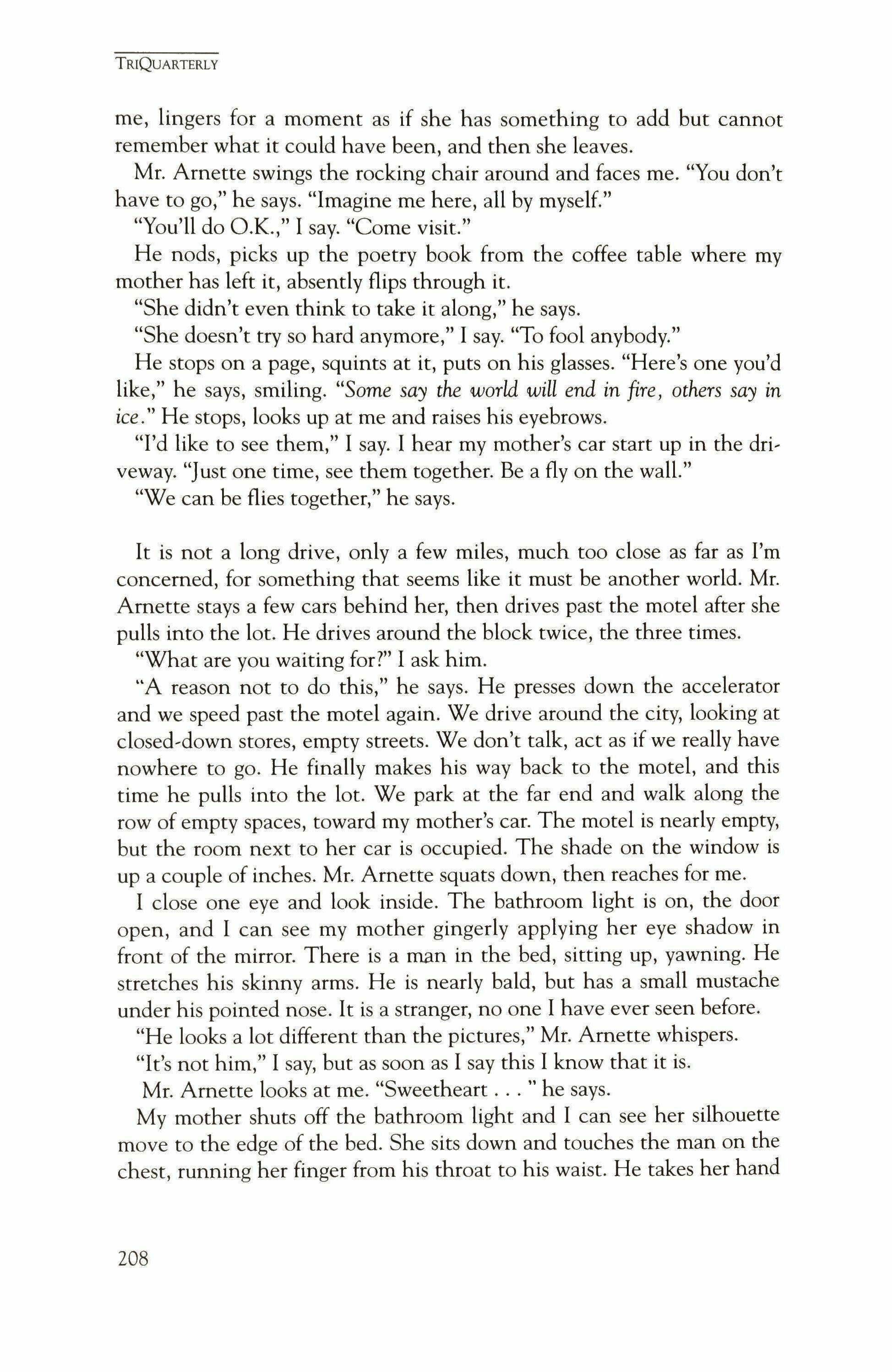
me, lingers for a moment as if she has something to add but cannot remember what it could have been, and then she leaves.
Mr. Arnette swings the rocking chair around and faces me. "You don't have to go," he says. "Imagine me here, all by myself."
"You'll do O.K.," I say. "Come visit."
He nods, picks up the poetry book from the coffee table where my mother has left it, absently flips through it.
"She didn't even think to take it along," he says.
"She doesn't try so hard anymore," I say. "To fool anybody."
He stops on a page, squints at it, puts on his glasses. "Here's one you'd like," he says, smiling. "Some say the world will end in fire, others say in ice. He stops, looks up at me and raises his eyebrows.
"I'd like to see them," I say. I hear my mother's car start up in the driveway. "Just one time, see them together. Be a fly on the wall."
"We can be flies together," he says.
It is not a long drive, only a few miles, much too close as far as I'm concerned, for something that seems like it must be another world. Mr. Arnette stays a few cars behind her, then drives past the motel after she pulls into the lot. He drives around the block twice, the three times.
"What are you waiting for?" I ask him.
"A reason not to do this," he says. He presses down the accelerator and we speed past the motel again. We drive around the city, looking at closed-down stores, empty streets. We don't talk, act as if we really have nowhere to go. He finally makes his way back to the motel, and this time he pulls into the lot. We park at the far end and walk along the row of empty spaces, toward my mother's car. The motel is nearly empty, but the room next to her car is occupied. The shade on the window is up a couple of inches. Mr. Arnette squats down, then reaches for me.
I close one eye and look inside. The bathroom light is on, the door open, and I can see my mother gingerly applying her eye shadow in front of the mirror. There is a man in the bed, sitting up, yawning. He stretches his skinny arms. He is nearly bald, but has a small mustache under his pointed nose. It is a stranger, no one I have ever seen before.
"He looks a lot different than the pictures," Mr. Arnette whispers.
"It's not him," I say, but as soon as I say this I know that it is.
Mr. Arnette looks at me. "Sweetheart he says.
My mother shuts off the bathroom light and I can see her silhouette move to the edge of the bed. She sits down and touches the man on the chest, running her finger from his throat to his waist. He takes her hand
TRIQUARTERLY
208
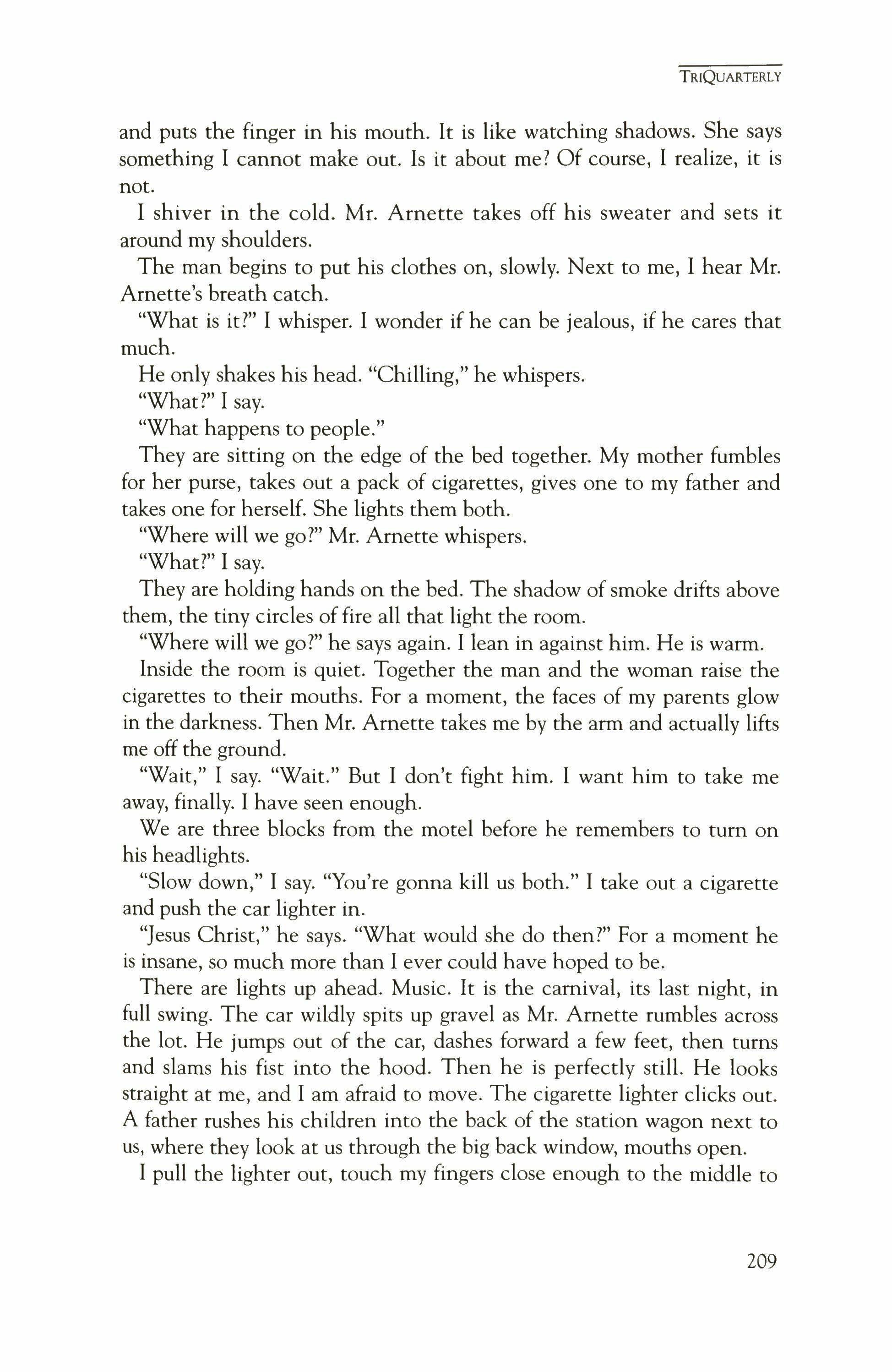
and puts the finger in his mouth. It is like watching shadows. She says something I cannot make out. Is it about me? Of course, I realize, it is not.
I shiver in the cold. Mr. Arnette takes off his sweater and sets it around my shoulders.
The man begins to put his clothes on, slowly. Next to me, I hear Mr. Arnette's breath catch.
"What is it?" I whisper. I wonder if he can be jealous, if he cares that much.
He only shakes his head. "Chilling," he whispers.
"What?" I say.
"What happens to people."
They are sitting on the edge of the bed together. My mother fumbles for her purse, takes out a pack of cigarettes, gives one to my father and takes one for herself. She lights them both.
"Where will we go?" Mr. Arnette whispers.
"What?" I say.
They are holding hands on the bed. The shadow of smoke drifts above them, the tiny circles of fire all that light the room.
"Where will we go?" he says again. I lean in against him. He is warm.
Inside the room is quiet. Together the man and the woman raise the cigarettes to their mouths. For a moment, the faces of my parents glow in the darkness. Then Mr. Arnette takes me by the arm and actually lifts me off the ground.
"Wait," I say. "Wait." But I don't fight him. I want him to take me away, finally. I have seen enough.
We are three blocks from the motel before he remembers to turn on his headlights.
"Slow down," I say. "You're gonna kill us both." I take out a cigarette and push the car lighter in.
"Jesus Christ," he says. "What would she do then?" For a moment he is insane, so much more than I ever could have hoped to be.
There are lights up ahead. Music. It is the carnival, its last night, in full swing. The car wildly spits up gravel as Mr. Arnette rumbles across the lot. He jumps out of the car, dashes forward a few feet, then turns and slams his fist into the hood. Then he is perfectly still. He looks straight at me, and I am afraid to move. The cigarette lighter clicks out. A father rushes his children into the back of the station wagon next to us, where they look at us through the big back window, mouths open.
I pull the lighter out, touch my fingers close enough to the middle to
TRIQUARTERLY
209

feel the raw heat. Then I light my cigarette and blow smoke into the windshield. Mr. Arnette watches me. I know now that he will never go back to my mother, will probably never lay eyes on her again. Something about seeing them, even though he knew. Something about seeing them.
He turns and starts walking towards the ticket booth. I get out of the car and follow him, stand behind him smoking while he buys two tickets.
"Ferris wheel," he says, turning to me. He smiles slightly. "None of those puke rides. Slow. Slow rides tonight."
We get into a car that I'm sure is broken. It swings differently than the others, crooked somehow. I start to say something, but a girl with yellow teeth and matching hair closes the bar over us and we are suddenly moving in a great lurch forward.
"Hey, hey!" Mr. Arnette says, squeezing the bar and looking down onto the park.
"These things are dangerous," I say.
"Bullshit," he says. "We're safer up here than anywhere else in the world."
We screech to a halt near the top, for the loading of passengers into the cars below us. We swing crookedly over the game booths, and I can see us, crashing down into the middle of the ring toss. So many ways to buy it, so few to stay alive.
"I've always liked the looks of Canada," Mr. Arnette says. He is smiling pleasantly, innocent as the dawn.
We start moving again. The motion is hypnotizing, and I no longer feel sick, but only strange, detached.
"Nice night for driving," I hear myself say.
He doesn't answer. He is looking at my hands, which are open, palms up on my lap, as if I am waiting for something on this ride. He reaches into his sweater pocket and takes out his pack of gum. He sets it in my hand, and my fingers close around it.
We swing around again. Below me, I see a circle of teenagers standing around a small bonfire, warming their hands. Sparks pop around them and die in the grass as the flame reaches higher. The Ferris wheel whips us towards it, and then away again, up into the night.
TRIQUARTERLY
210
Miles Away from Home
Robert S. Nelsen
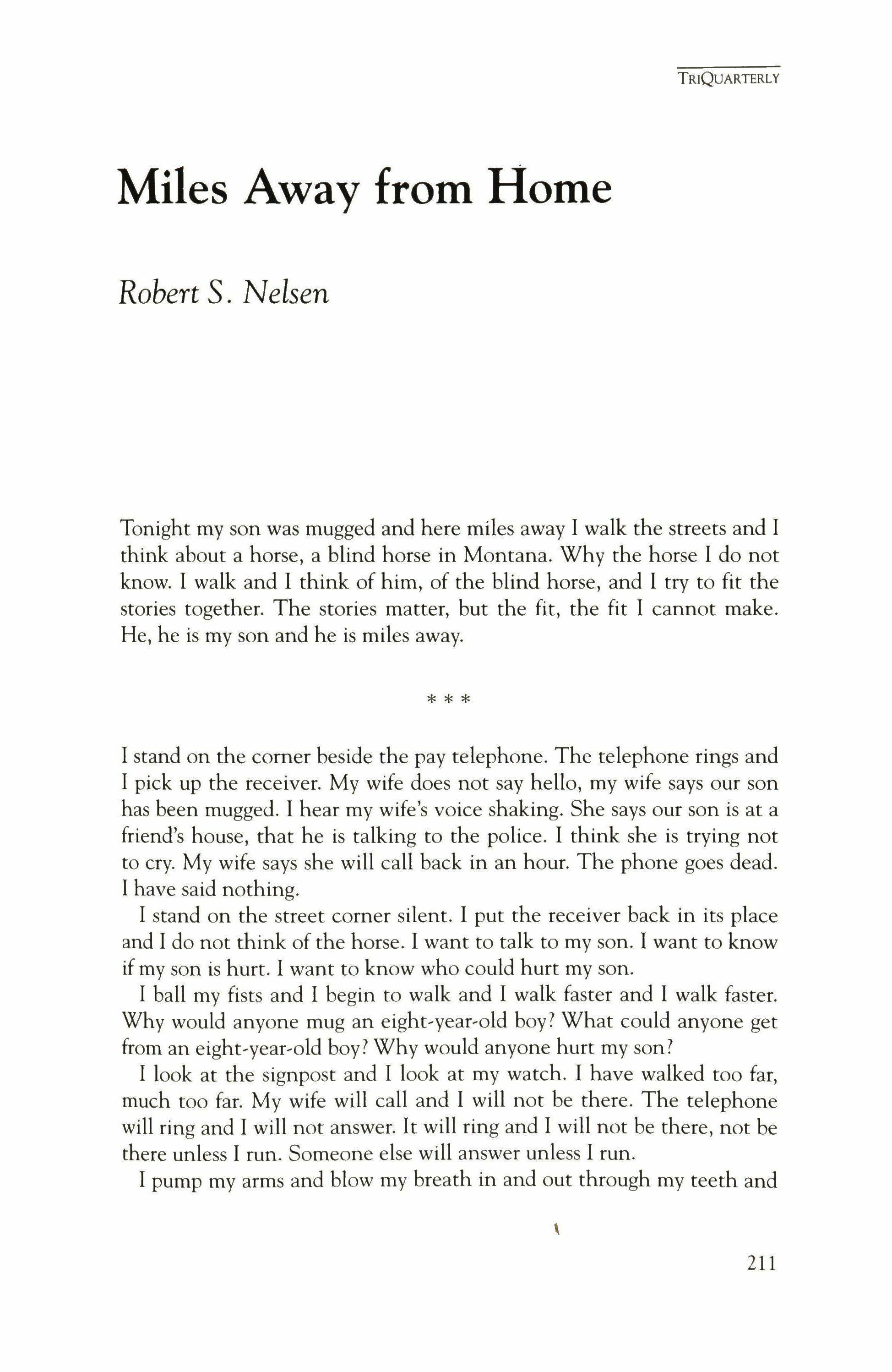
Tonight my son was mugged and here miles away I walk the streets and I think about a horse, a blind horse in Montana. Why the horse I do not know. I walk and I think of him, of the blind horse, and I try to fit the stories together. The stories matter, but the fit, the fit I cannot make. He, he is my son and he is miles away.
I stand on the comer beside the pay telephone. The telephone rings and I pick up the receiver. My wife does not say hello, my wife says our son has been mugged. I hear my wife's voice shaking. She says our son is at a friend's house, that he is talking to the police. I think she is trying not to cry. My wife says she will call back in an hour. The phone goes dead. I have said nothing.
I stand on the street comer silent. I put the receiver back in its place and I do not think of the horse. I want to talk to my son. I want to know if my son is hurt. I want to know who could hurt my son.
I ball my fists and I begin to walk and I walk faster and I walk faster. Why would anyone mug an eight-year-old boy? What could anyone get from an eight-year-old boy? Why would anyone hurt my son?
I look at the signpost and I look at my watch. I have walked too far, much too far. My wife will call and I will not be there. The telephone will ring and I will not answer. It will ring and I will not be there, not be there unless I run. Someone else will answer unless I run.
I pump my arms and blow my breath in and out through my teeth and
TRIQUARTERLY
* * *
211
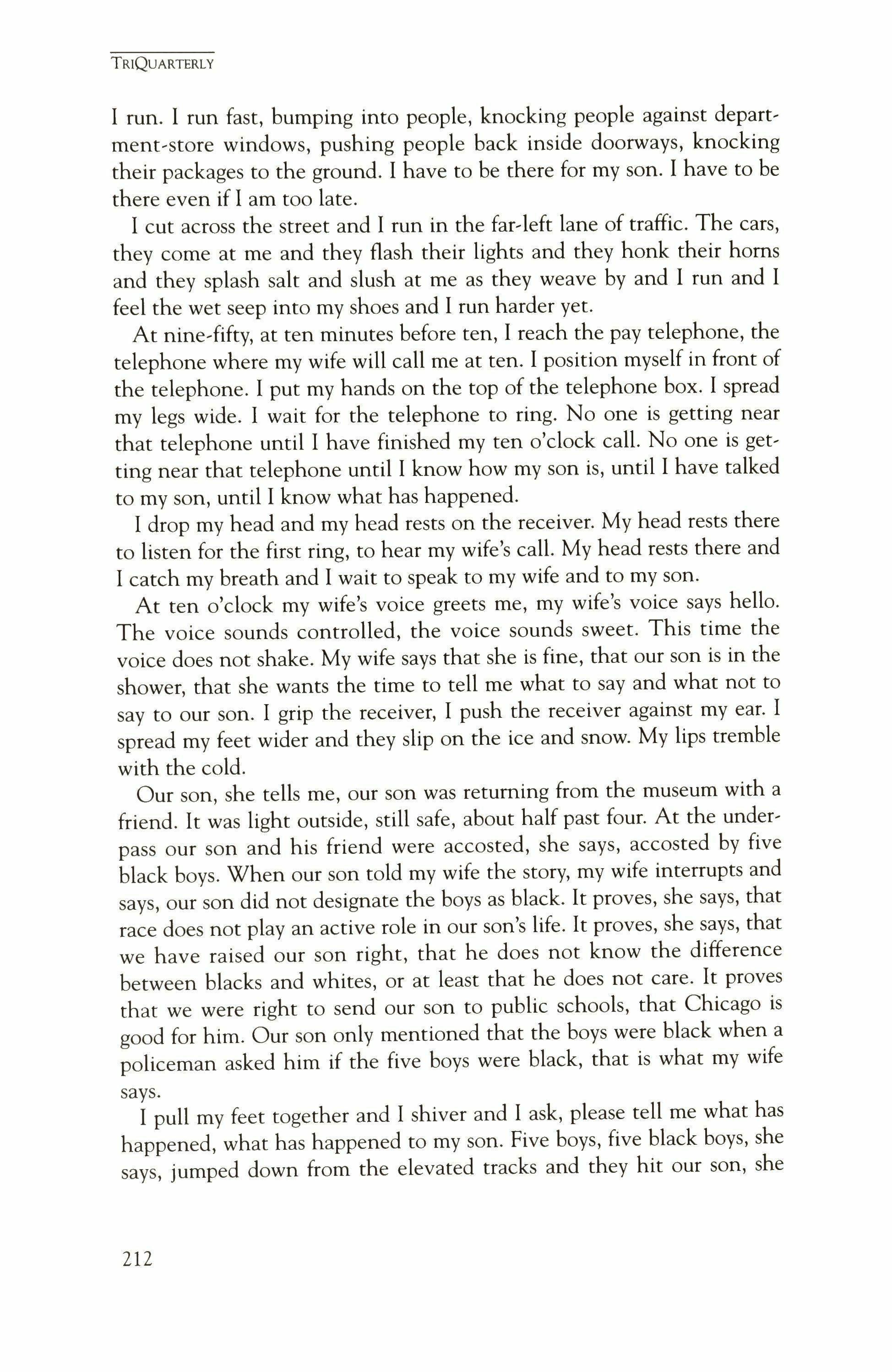
I run. I run fast, bumping into people, knocking people against department-store windows, pushing people back inside doorways, knocking their packages to the ground. I have to be there for my son. I have to be there even if I am too late.
I cut across the street and I run in the far-left lane of traffic. The cars, they come at me and they flash their lights and they honk their horns and they splash salt and slush at me as they weave by and I run and I feel the wet seep into my shoes and I run harder yet.
At nine-fifty, at ten minutes before ten, I reach the pay telephone, the telephone where my wife will call me at ten. I position myself in front of the telephone. I put my hands on the top of the telephone box. I spread my legs wide. I wait for the telephone to ring. No one is getting near that telephone until I have finished my ten o'clock call. No one is getting near that telephone until I know how my son is, until I have talked to my son, until I know what has happened.
I drop my head and my head rests on the receiver. My head rests there to listen for the first ring, to hear my wife's call. My head rests there and I catch my breath and I wait to speak to my wife and to my son.
At ten o'clock my wife's voice greets me, my wife's voice says hello. The voice sounds controlled, the voice sounds sweet. This time the voice does not shake. My wife says that she is fine, that our son is in the shower, that she wants the time to tell me what to say and what not to say to our son. I grip the receiver, I push the receiver against my ear. I spread my feet wider and they slip on the ice and snow. My lips tremble with the cold.
Our son, she tells me, our son was returning from the museum with a friend. It was light outside, still safe, about half past four. At the underpass our son and his friend were accosted, she says, accosted by five black boys. When our son told my wife the story, my wife interrupts and says, our son did not designate the boys as black. It proves, she says, that race does not play an active role in our son's life. It proves, she says, that we have raised our son right, that he does not know the difference between blacks and whites, or at least that he does not care. It proves that we were right to send our son to public schools, that Chicago is good for him. Our son only mentioned that the boys were black when a policeman asked him if the five boys were black, that is what my wife says.
I pull my feet together and I shiver and I ask, please tell me what has happened, what has happened to my son. Five boys, five black boys, she says, jumped down from the elevated tracks and they hit our son, she
TRIQUARTERLY
212
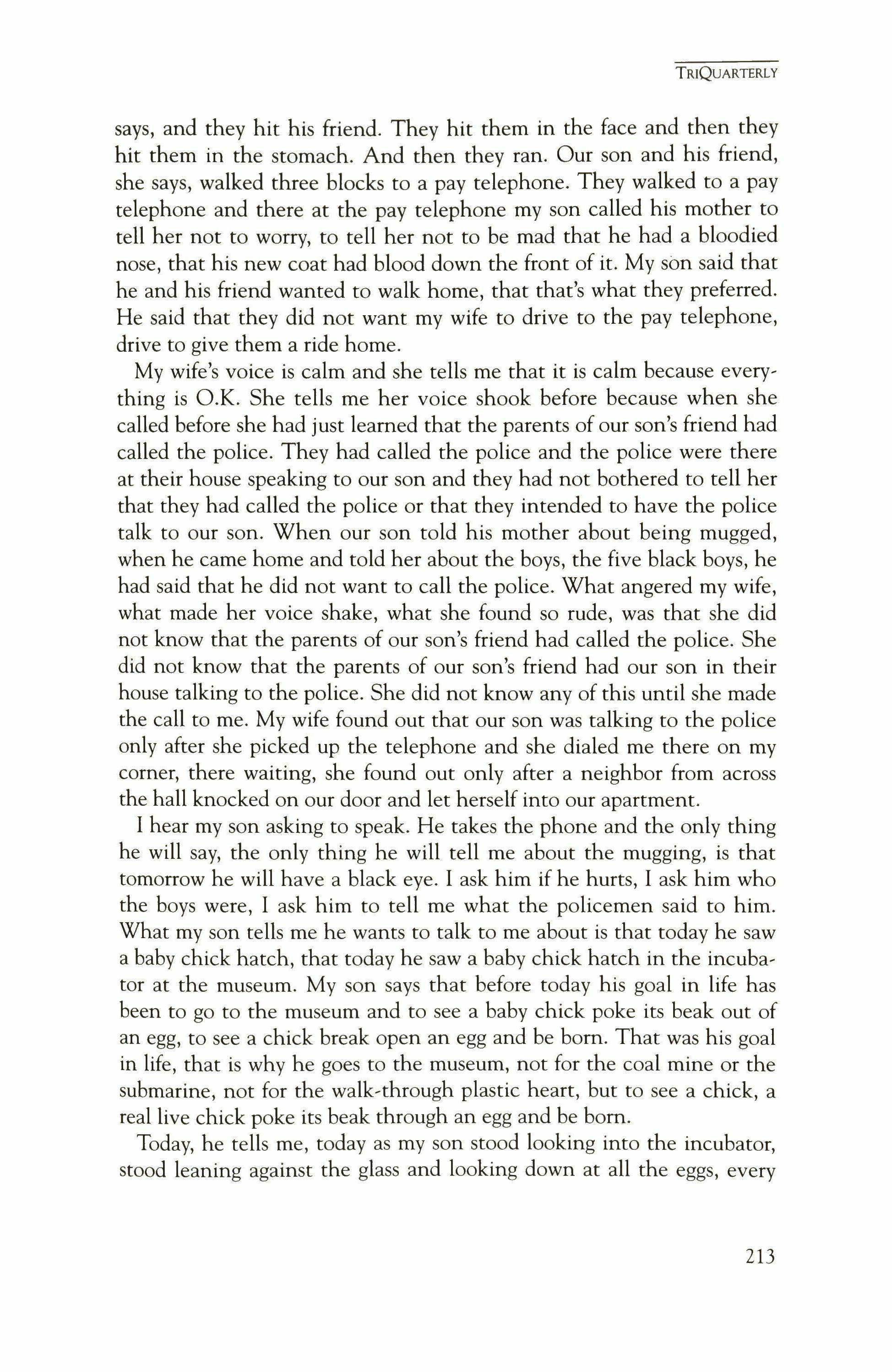
says, and they hit his friend. They hit them in the face and then they hit them in the stomach. And then they ran. Our son and his friend, she says, walked three blocks to a pay telephone. They walked to a pay telephone and there at the pay telephone my son called his mother to tell her not to worry, to tell her not to be mad that he had a bloodied nose, that his new coat had blood down the front of it. My son said that he and his friend wanted to walk home, that that's what they preferred. He said that they did not want my wife to drive to the pay telephone, drive to give them a ride home.
My wife's voice is calm and she tells me that it is calm because everything is O.K. She tells me her voice shook before because when she called before she had just learned that the parents of our son's friend had called the police. They had called the police and the police were there at their house speaking to our son and they had not bothered to tell her that they had called the police or that they intended to have the police talk to our son. When our son told his mother about being mugged, when he came home and told her about the boys, the five black boys, he had said that he did not want to call the police. What angered my wife, what made her voice shake, what she found so rude, was that she did not know that the parents of our son's friend had called the police. She did not know that the parents of our son's friend had our son in their house talking to the police. She did not know any of this until she made the call to me. My wife found out that our son was talking to the police only after she picked up the telephone and she dialed me there on my comer, there waiting, she found out only after a neighbor from across the hall knocked on our door and let herself into our apartment.
I hear my son asking to speak. He takes the phone and the only thing he will say, the only thing he will tell me about the mugging, is that tomorrow he will have a black eye. I ask him if he hurts, I ask him who the boys were, I ask him to tell me what the policemen said to him. What my son tells me he wants to talk to me about is that today he saw a baby chick hatch, that today he saw a baby chick hatch in the incubator at the museum. My son says that before today his goal in life has been to go to the museum and to see a baby chick poke its beak out of an egg, to see a chick break open an egg and be born. That was his goal in life, that is why he goes to the museum, not for the coal mine or the submarine, not for the walk-through plastic heart, but to see a chick, a real live chick poke its beak through an egg and be born.
Today, he tells me, today as my son stood looking into the incubator, stood leaning against the glass and looking down at all the eggs, every
TRIQUARTERLY
213
TRIQUARTERLY
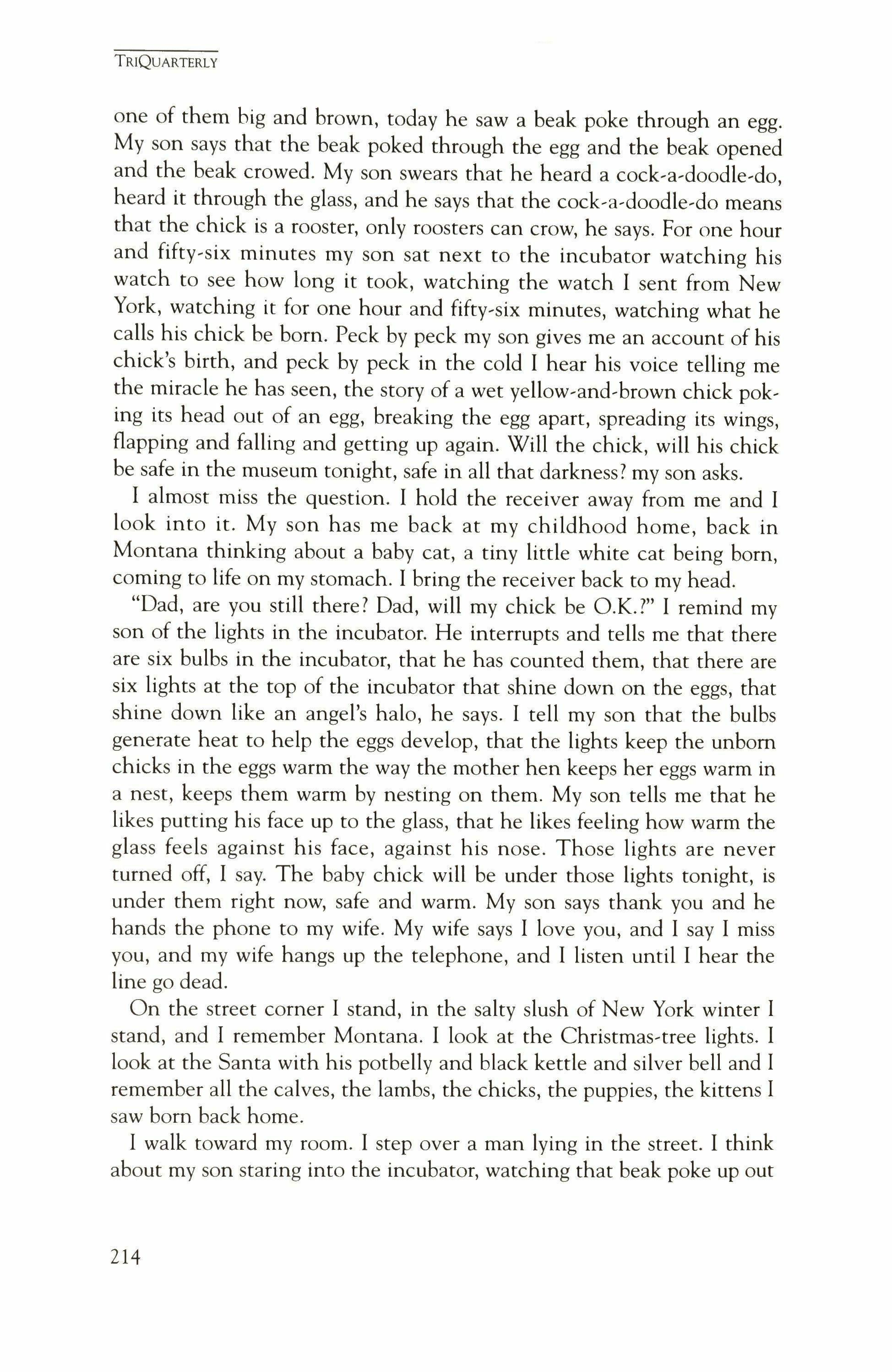
one of them big and brown, today he saw a beak poke through an egg. My son says that the beak poked through the egg and the beak opened and the beak crowed. My son swears that he heard a cock-a-doodle-do, heard it through the glass, and he says that the cock-a-doodle-do means that the chick is a rooster, only roosters can crow, he says. For one hour and fifty-six minutes my son sat next to the incubator watching his watch to see how long it took, watching the watch I sent from New York, watching it for one hour and fifty-six minutes, watching what he calls his chick be born. Peck by peck my son gives me an account of his chick's birth, and peck by peck in the cold I hear his voice telling me the miracle he has seen, the story of a wet yellow-and-brown chick poking its head out of an egg, breaking the egg apart, spreading its wings, flapping and falling and getting up again. Will the chick, will his chick be safe in the museum tonight, safe in all that darkness? my son asks.
I almost miss the question. I hold the receiver away from me and I look into it. My son has me back at my childhood home, back in Montana thinking about a baby cat, a tiny little white cat being born, coming to life on my stomach. I bring the receiver back to my head.
"Dad, are you still there? Dad, will my chick be O.K.?" I remind my son of the lights in the incubator. He interrupts and tells me that there are six bulbs in the incubator, that he has counted them, that there are six lights at the top of the incubator that shine down on the eggs, that shine down like an angel's halo, he says. I tell my son that the bulbs generate heat to help the eggs develop, that the lights keep the unborn chicks in the eggs warm the way the mother hen keeps her eggs warm in a nest, keeps them warm by nesting on them. My son tells me that he likes putting his face up to the glass, that he likes feeling how warm the glass feels against his face, against his nose. Those lights are never turned off, I say. The baby chick will be under those lights tonight, is under them right now, safe and warm. My son says thank you and he hands the phone to my wife. My wife says I love you, and I say I miss you, and my wife hangs up the telephone, and I listen until I hear the line go dead.
On the street corner I stand, in the salty slush of New York winter I stand, and I remember Montana. I look at the Christmas-tree lights. I look at the Santa with his potbelly and black kettle and silver bell and I remember all the calves, the lambs, the chicks, the puppies, the kittens I saw born back home.
I walk toward my room. I step over a man lying in the street. I think about my son staring into the incubator, watching that beak poke up out
214
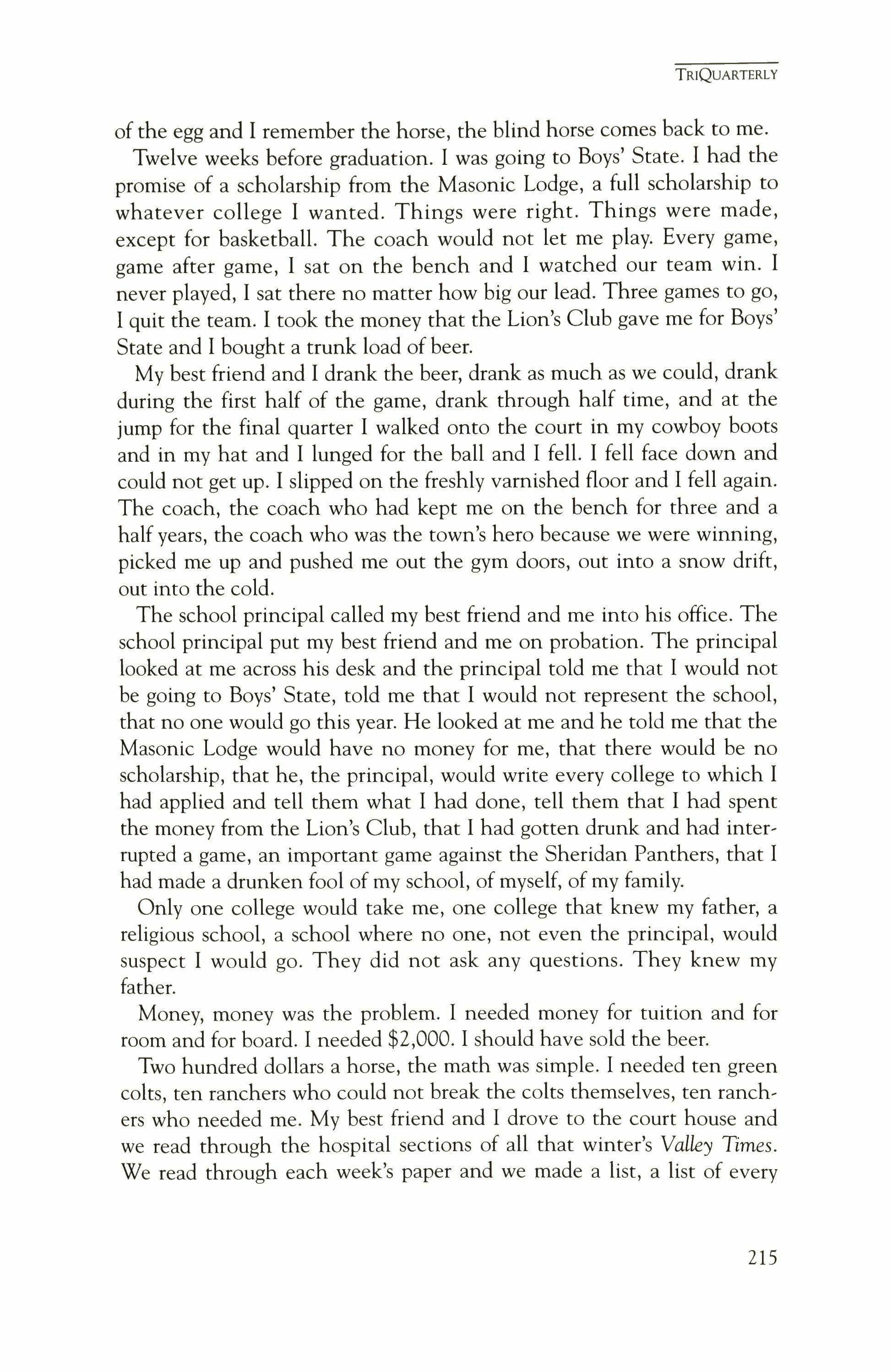
of the egg and I remember the horse, the blind horse comes back to me. Twelve weeks before graduation. I was going to Boys' State. I had the promise of a scholarship from the Masonic Lodge, a full scholarship to whatever college I wanted. Things were right. Things were made, except for basketball. The coach would not let me play. Every game, game after game, I sat on the bench and I watched our team win. I never played, I sat there no matter how big our lead. Three games to go, I quit the team. I took the money that the Lion's Club gave me for Boys' State and I bought a trunk load of beer.
My best friend and I drank the beer, drank as much as we could, drank during the first half of the game, drank through half time, and at the jump for the final quarter I walked onto the court in my cowboy boots and in my hat and I lunged for the ball and I fell. I fell face down and could not get up. I slipped on the freshly varnished floor and I fell again. The coach, the coach who had kept me on the bench for three and a half years, the coach who was the town's hero because we were winning, picked me up and pushed me out the gym doors, out into a snow drift, out into the cold.
The school principal called my best friend and me into his office. The school principal put my best friend and me on probation. The principal looked at me across his desk and the principal told me that I would not be going to Boys' State, told me that I would not represent the school, that no one would go this year. He looked at me and he told me that the Masonic Lodge would have no money for me, that there would be no scholarship, that he, the principal, would write every college to which I had applied and tell them what I had done, tell them that I had spent the money from the Lion's Club, that I had gotten drunk and had interrupted a game, an important game against the Sheridan Panthers, that I had made a drunken fool of my school, of myself, of my family.
Only one college would take me, one college that knew my father, a religious school, a school where no one, not even the principal, would suspect I would go. They did not ask any questions. They knew my father.
Money, money was the problem. I needed money for tuition and for room and for board. I needed $2,000. I should have sold the beer.
Two hundred dollars a horse, the math was simple. I needed ten green colts, ten ranchers who could not break the colts themselves, ten ranchers who needed me. My best friend and I drove to the court house and we read through the hospital sections of all that winter's Valley Times. We read through each week's paper and we made a list, a list of every
TRIQUARTERLY
215

rancher who had been in the hospital that winter, every rancher who might still be stoved up, every rancher who could use me, and I called them all, called each and everyone and asked if I could break their colts, lied and told them that my father would help.
What surprised me was that my father was impressed. He looked at the list and he listened to my calls and he agreed to pay me to break the gray colt he had bought that winter, the gray colt with blood going back to the King Ranch in Texas, the gray colt he had always wanted.
I arranged a schedule, two colts every five weeks, two colts until all ten colts were broken and I had $2,000 and it was time to enroll in my father's university. Our neighbor had fallen off a haystack and had broken his hip and had had to crawl in the snow, in forty-below weather, had had to crawl two miles to the county road where the school bus came by and turned around and took him and all the school children to the county hospital. I began with his horse, a bay colt, and my father's gray colt.
I rode my horse to our neighbor's ranch and found the bay colt in the corral where the neighbor said it would be. I moved my horse into the corral. My horse sidled up next to the bay colt and I slipped a noose over the bay colt's head. The colt looked too wide at the withers and too thick in the legs to be a two-year-old; it came up flush with my horse and looked at least as old. The neighbor rolled his wheelchair into the corral and I asked the neighbor how old the bay colt was. Our neighbor stroked his bay colt up and down the colt's front legs. Without looking up at me, with his attention focused on the colt, our neighbor told me that the colt was four years old. Still not looking at me and still stroking the colt's legs, my neighbor asked if I had a problem with the colt's age. I told him no and, keeping the colt tight against my horse, the two horses and I headed home at a stiff trot.
I put the neighbor's four-year-old bay colt in the corral. I unsaddled my horse and let him loose. I took the halter and the rope with which my father worked his gray each night, making the colt circle in ever bigger circles in the corral, head up at a full run, rope taut between him and my father, and I walked to where my father's gray stood beside the barn. My father's gray saw me with my outstretched hand and nuzzled up to me. The gray colt ate the oats from my hand and I slipped the halter on the colt. I tied the rope to the halter. I led my father's gray to the corral and placed him in the corral with the neighbor's bay colt.
The two colts nuzzled each other, smelling each other's smell, then they bared their teeth, pinned back their ears, and nipped at each
TRIQUARTERLY
216
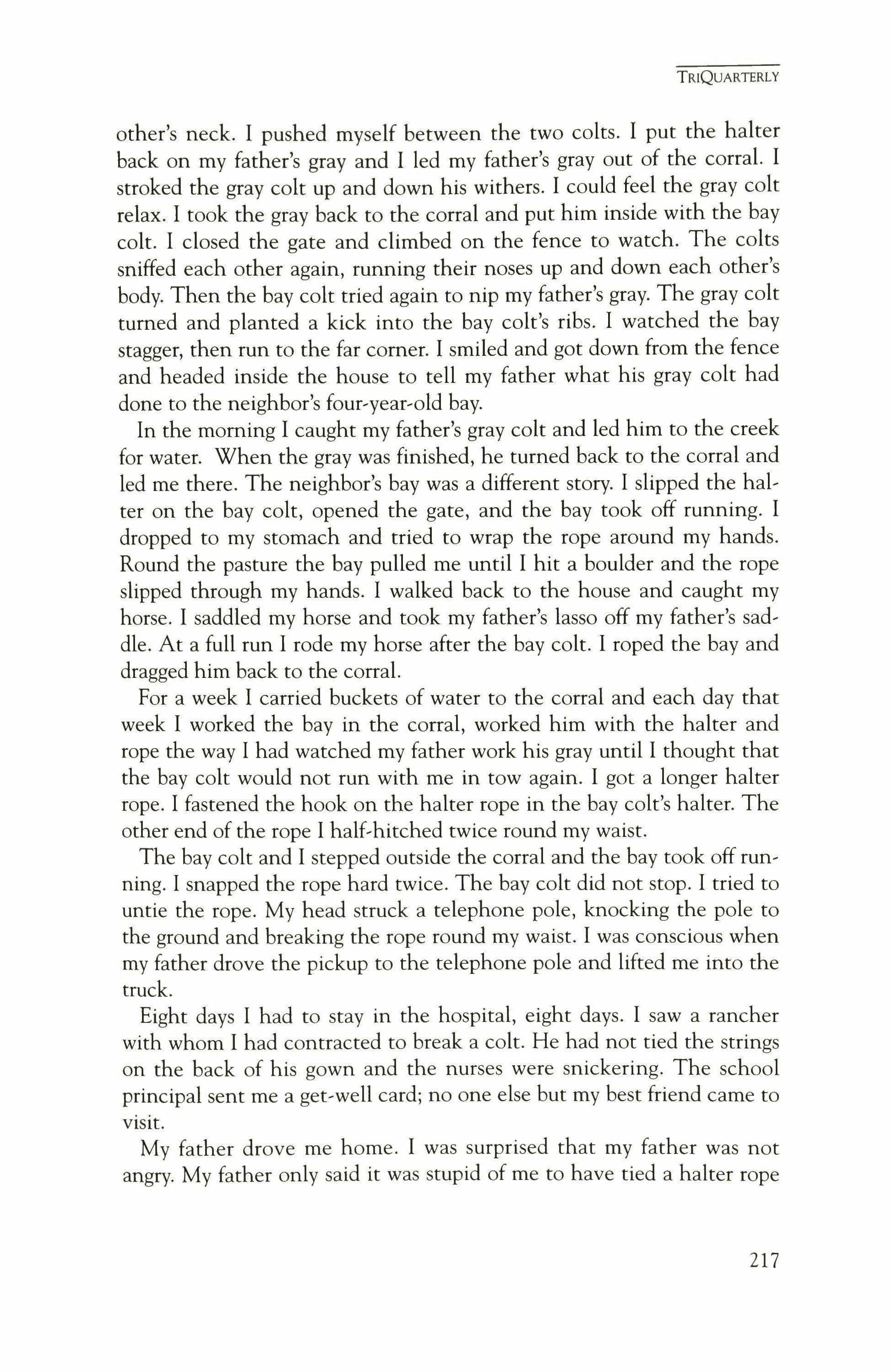
other's neck. I pushed myself between the two colts. I put the halter back on my father's gray and I led my father's grayout of the corral. I stroked the gray colt up and down his withers. I could feel the gray colt relax. I took the gray back to the corral and put him inside with the bay colt. I closed the gate and climbed on the fence to watch. The colts sniffed each other again, running their noses up and down each other's body. Then the bay colt tried again to nip my father's gray. The gray colt turned and planted a kick into the bay colt's ribs. I watched the bay stagger, then run to the far corner. I smiled and got down from the fence and headed inside the house to tell my father what his gray colt had done to the neighbor's four-year-old bay.
In the morning I caught my father's gray colt and led him to the creek for water. When the gray was finished, he turned back to the corral and led me there. The neighbor's bay was a different story. I slipped the halter on the bay colt, opened the gate, and the bay took off running. I dropped to my stomach and tried to wrap the rope around my hands. Round the pasture the bay pulled me until I hit a boulder and the rope slipped through my hands. I walked back to the house and caught my horse. I saddled my horse and took my father's lasso off my father's saddle. At a full run I rode my horse after the bay colt. I roped the bay and dragged him back to the corral.
For a week I carried buckets of water to the corral and each day that week I worked the bay in the corral, worked him with the halter and rope the way I had watched my father work his gray until I thought that the bay colt would not run with me in tow again. I got a longer halter rope. I fastened the hook on the halter rope in the bay colt's halter. The other end of the rope I half-hitched twice round my waist.
The bay colt and I stepped outside the corral and the bay took off running. I snapped the rope hard twice. The bay colt did not stop. I tried to untie the rope. My head struck a telephone pole, knocking the pole to the ground and breaking the rope round my waist. I was conscious when my father drove the pickup to the telephone pole and lifted me into the truck.
Eight days I had to stay in the hospital, eight days. I saw a rancher with whom I had contracted to break a colt. He had not tied the strings on the back of his gown and the nurses were snickering. The school principal sent me a get-well card; no one else but my best friend came to visit.
My father drove me home. I was surprised that my father was not angry. My father only said it was stupid of me to have tied a halter rope
TRIQUARTERLY
217

to my waist.
The afternoon of my return I began working with the gray colt and the bay colt again. I worked the two colts in the corral with the halter rope and with the buggy whip. My father had been working the colts while I was in the hospital, I could tell. One at a time, I walked the colts to water, the gray first then the bay. Both colts, even the neighbor's bay colt, walked calmly to the water, drank, and calmly walked back to the corral. I worked with the colts in the corral for two hours more. I put bridles, saddle blankets, and saddles on them. Then I took off the bridles, saddle blankets, and saddles. I repeated the process five times.
In the evening I took the colts out to drink without a warm-up in the corral. I took the neighbor's bay to the creek first. The bay colt gave me no problem. Then I took my father's gray to the creek. There at the creek bed it happened. The gray took off at a full run. I had the lead rope wrapped round my waist again. This time, the lead rope unwrapped on its own and I fell to the ground, fell on top of a long, thick branch. I picked up the branch and grabbed it by one end. I threw the branch at the gray colt. End over end I watched the branch fly toward the gray colt, fly into the gray's eye, fly into that eye and stick. The colt shook his head back and forth and the branch stayed stuck in his eye. The colt bucked high, flying up into the air, and the branch dropped to the ground.
I knew what I had done. I ran to my father's gray to soothe him. Every time I got close to the gray he ran away from me.
Not until hours later would the gray let me touch him. I stroked his jaw and I stared at his eye, at the eye into which I had stuck the branch. The eye was bloody, blood trickled out of it. Around the edge of the eye pink flesh and small yellow globules of fat protruded. Where the branch had stuck, there where I had stuck that branch, there, there was nothing but darkness. I stroked the gray, I stroked my father's gray colt and I cried. I knelt next to the gray, knelt down by his legs, and I prayed. I prayed that the gray colt's eye would heal, I prayed that the gray colt would forgive me, I prayed that my father would forgive me.
I knew that nobody would forgive me. My father came up from behind me still out there in that field and I told my father the truth. I told him that I had thrown a branch at his gray colt. I told him that I had blinded his gray colt. I was crying hard, my father was crying hard. My father slapped my face. My father put his arms round his gray colt's neck and he led his gray colt back to the corral.
I remained in the pasture that night. The next morning I went back
TRIQUARTERLY
218
to the house. I changed my clothes and I went to school. I did not see my father then or ever again. I stayed out late every night, until after midnight, until he was in bed, I stayed out with my best friend and we drank beer, drank the beer that we had stashed down by the lake, the beer that I had bought with the money from the Lion's Club, the money for Boys' State. The day school ended, my best friend and I loaded the trunk of my car with the last of the beer. I left that night for my father's alma mater.
To pay for tuition I worked as a janitor from four o'clock until eight o'clock each morning and each night I locked the university's buildings. I did not have to worry about board. I lived in my car up Canyon Creek, just above my father's university, up where I could coast down to work every morning without having to start the engine and use gas.
My best friend never did manage to attend college. He wrote me occasionally, wrote me one letter that has stuck with me all these years. He wrote that my father broke all eight remaining colts. I do not know if he broke them for me or if he broke them for the money. But break the colts my father did.

Now I walk and I wait for the stories to fit, to fit together, to make sense of each other. I walk these cold streets and I look at people shopping, buying Christmas presents, carrying packages home. I try to understand but I cannot. The thing I do know, the thing that does make sense, the fit that I see, the thing I think now as I walk these streets is, my father is two thousand miles away and my son, my only son is almost a thousand miles away and maybe, please Father in Heaven no, please no, maybe going farther still.
TRIQUARTERLY
* * *
219
Comparing Stephen Dixon
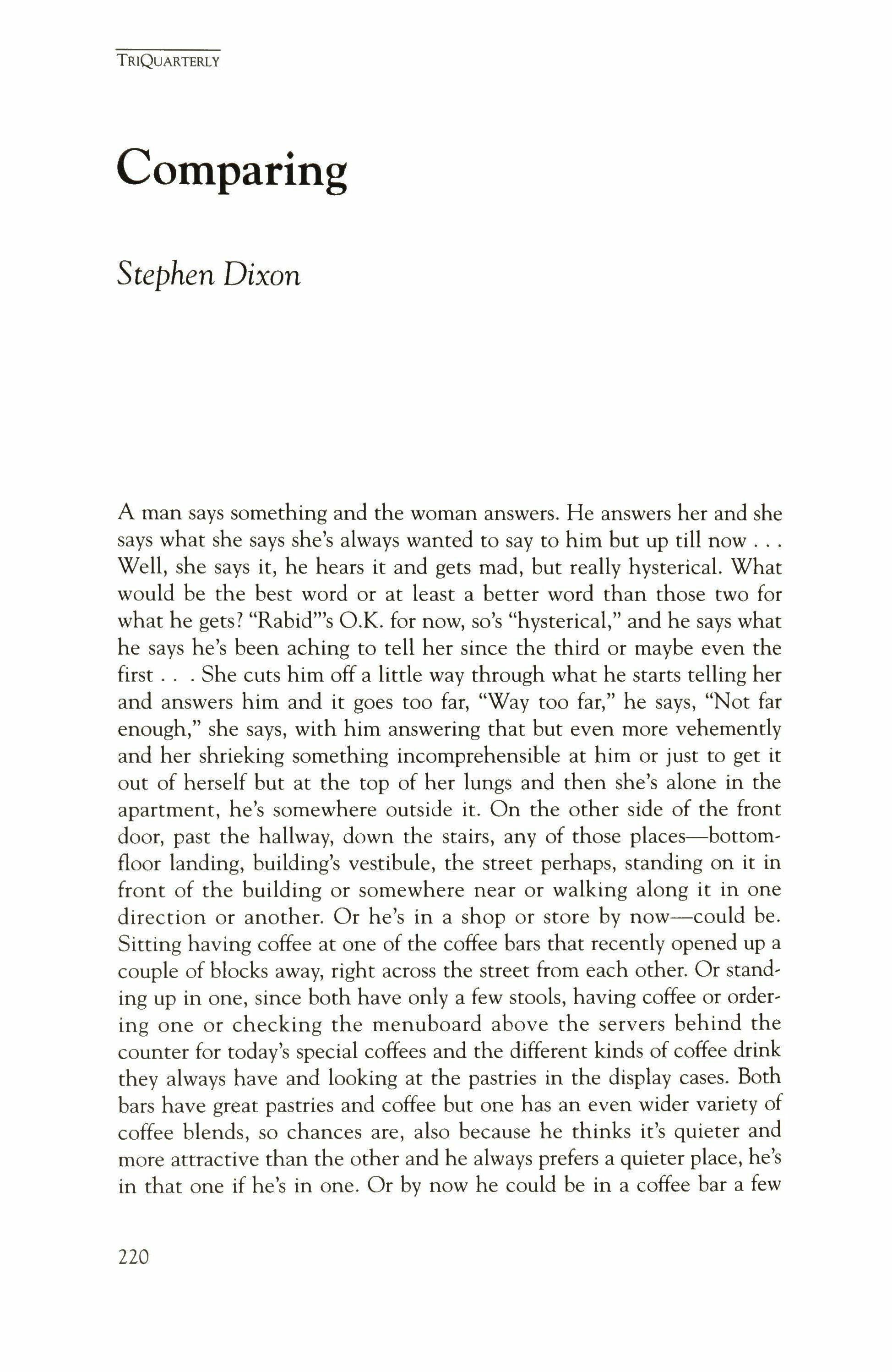
A man says something and the woman answers. He answers her and she says what she says she's always wanted to say to him but up till now Well, she says it, he hears it and gets mad, but really hysterical. What would be the best word or at least a better word than those two for what he gets? "Rabid"'s O.K. for now, so's "hysterical," and he says what he says he's been aching to tell her since the third or maybe even the first She cuts him off a little way through what he starts telling her and answers him and it goes too far, "Way too far," he says, "Not far enough," she says, with him answering that but even more vehemently and her shrieking something incomprehensible at him or just to get it out of herself but at the top of her lungs and then she's alone in the apartment, he's somewhere outside it. On the other side of the front door, past the hallway, down the stairs, any of those places-bottomfloor landing, building's vestibule, the street perhaps, standing on it in front of the building or somewhere near or walking along it in one direction or another. Or he's in a shop or store by now-could be. Sitting having coffee at one of the coffee bars that recently opened up a couple of blocks away, right across the street from each other. Or standing up in one, since both have only a few stools, having coffee or ordering one or checking the menuboard above the servers behind the counter for today's special coffees and the different kinds of coffee drink they always have and looking at the pastries in the display cases. Both bars have great pastries and coffee but one has an even wider variety of coffee blends, so chances are, also because he thinks it's quieter and more attractive than the other and he always prefers a quieter place, he's in that one if he's in one. Or by now he could be in a coffee bar a few
TRIQUARTERLY
220

blocks away-he loves coffee and a coffee bar or just a more ordinary or typical or �tandard place for coffee like a luncheonette or cafe is often where he'll go when he's tired or irritable or needs to do a little thinking, which is what he might think he needs to do now. Or he could be in a different kind of shop or store a few blocks away or waiting in a bus shelter or on a subway platform for a bus or train or already in a bus or subway car, with or without coffee. Probably without. Much as he loves coffee and might now think he needs it, he doesn't like walking around or taking a subway or bus with a container of coffee, especially a hot one, which is what his would be since he only takes his black. So definitely without coffee, if he's on the street or in a subway or bus or waiting for one, and if he only wanted to go one or two stops on the subway and it wasn't delayed or about twenty blocks on the bus, he could by now be at the station he wanted to get off at or halfway to his stop on the bus. But that's about as far as he could be now from the apartment unless he got a taxi in front of the building the moment he stepped outside and there were no delays going downstairs and the cab didn't have to contend with lots of traffic and lights. Then he'd be some twenty to thirty blocks away, somewhat farther than two subway stops, going someplace, where, though, well that's a question.
She, though-she's home, their apartment, now hers. That's what they agreed on: he'd go, she'd stay. Not so much "agreed on." Last thing she shouted was that she wanted nothing more in life right now than for him to be gone for good and he shouted back just before he left: "You bet, same here, you ugly bitch: for good, for good." It was his apartment when they met. She gave up hers to move into it and they've been living here for several years, married for more than two of them, have no child or pet. She's pregnant, though, but he doesn't know it. Right now she's thinking there are two possibilities regarding this: should she have the child or abort it? That's easy enough to answer: have the child. She'll tell him she's had it only after it's born and maybe, if she can get away with it, not even then. But that's no good since he's sure to learn she's pregnant from one of their friends or a neighbor in her building or colleague at work or even one of her own relatives or if he just happens to bump into her on the street or comes to see her. If he does find out and says he wants to come back to be with her during her pregnancy and then stay with her to be with his child, what will she do? That's not so easy to answer. For she's sure he will want to come back and be with her for both of those. He's always wanted to be a father. By "always" she means since he was a grown man, or that's what he's told her and other
TRIQUARTERLY
221
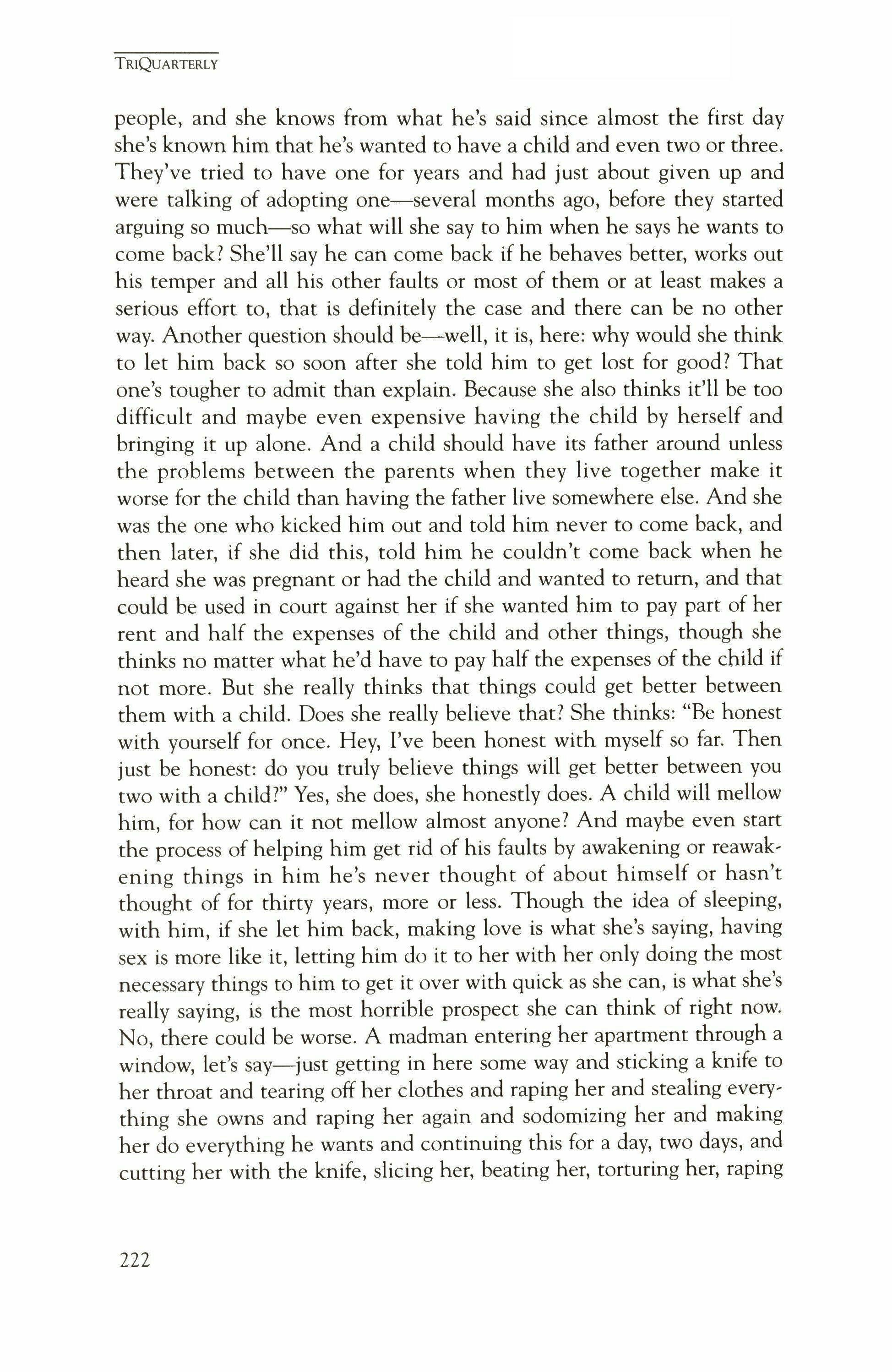
people, and she knows from what he's said since almost the first day she's known him that he's wanted to have a child and even two or three. They've tried to have one for years and had just about given up and were talking of adopting one-several months ago, before they started arguing so much-so what will she say to him when he says he wants to come back? She'll say he can come back if he behaves better, works out his temper and all his other faults or most of them or at least makes a serious effort to, that is definitely the case and there can be no other way. Another question should be-well, it is, here: why would she think to let him back so soon after she told him to get lost for good? That one's tougher to admit than explain. Because she also thinks it'll be too difficult and maybe even expensive having the child by herself and bringing it up alone. And a child should have its father around unless the problems between the parents when they live together make it worse for the child than having the father live somewhere else. And she was the one who kicked him out and told him never to come back, and then later, if she did this, told him he couldn't come back when he heard she was pregnant or had the child and wanted to return, and that could be used in court against her if she wanted him to pay part of her rent and half the expenses of the child and other things, though she thinks no matter what he'd have to pay half the expenses of the child if not more. But she really thinks that things could get better between them with a child. Does she really believe that? She thinks: "Be honest with yourself for once. Hey, I've been honest with myself so far. Then just be honest: do you truly believe things will get better between you two with a child?" Yes, she does, she honestly does. A child will mellow him, for how can it not mellow almost anyone? And maybe even start the process of helping him get rid of his faults by awakening or reawakening things in him he's never thought of about himself or hasn't thought of for thirty years, more or less. Though the idea of sleeping, with him, if she let him back, making love is what she's saying, having sex is more like it, letting him do it to her with her only doing the most necessary things to him to get it over with quick as she can, is what she's really saying, is the most horrible prospect she can think of right now. No, there could be worse. A madman entering her apartment through a window, let's say-just getting in here some way and sticking a knife to her throat and tearing off her clothes and raping her and stealing everything she owns and raping her again and sodomizing her and making her do everything he wants and continuing this for a day, two days, and cutting her with the knife, slicing her, beating her, torturing her, raping
TRIQUARTERLY
222

her repeatedly every which way, that would be so much worse it's impossible to compare the two, the madman doing all that and her husband having sex with her first time after he returns if she let him back. Or a fire, that would be worse. Where she's burned and the apartment destroyed and all her favorite things gone: paintings, prints, furniture she's inherited-that would be worse. Certainly getting burns over twenty to thirty percent of her body would be much worse. Having a small fire, though, one she could put out herself, a few things lost-one painting, a couple of prints, an old chair she loved and where she only got minor burns-that wouldn't be worse. They'd be even, having sex with her husband and that kind of fire. Losing an eye would be worse. Losing both eyes incomparably worse and maybe as bad as getting forty to fifty percent of her body burned. Getting a disease, one that would incapacitate her, make her incontinent, feeble, feeling sickly and weak every hour of the day, dependent on others for getting around, confined to a wheelchair-strapped into one-that would be infinitely worse than sex with her husband that first time if she let him back and all the times after that. Just having a minor illness-stomach flu that passes in several days or even a week, even that would be worse than having sex with her husband if the sex wasn't prolonged and she didn't have to participate in it much. But a stomach flu of one day, even one where she throws up a lot and has some agonizing pains: they'd be even, or the flu might not be as bad as having sex with him. For in having sex she could just lie back, not enjoy it, ignore it best as she can, let him do it quickly, tell him to, pretend it isn't even him, get into the most comfortable position for her where she doesn't have to do anything and can almost even fall asleep. If he said "Move a little, why don't you," she might move. If he said to touch it with her hand, she might do that a little too. Still, compared to a really bad one-day flu, one where you feel for a while you're going to die: even. But a cold-well, don't get silly. Losing the child, though, even at this early stage, that would be much worse than having sex with him numerous times that first day and maybe even as bad as losing an eye or a fire where she's severely burned, say ten to twenty percent of her body, even that twenty to thirty percent, plus all her possessions gone in it, she wouldn't care. For it took so long for her to get pregnant with this one-this is her first time ever-and she doesn't know if another one will come.
He's on the subway heading downtown. He doesn't know where he's going. Just wanted to get out and far away from her as fast as he could. Where should he go? It's Saturday, not a workday. Should he get a hotel
TRIQUARTERLY
223
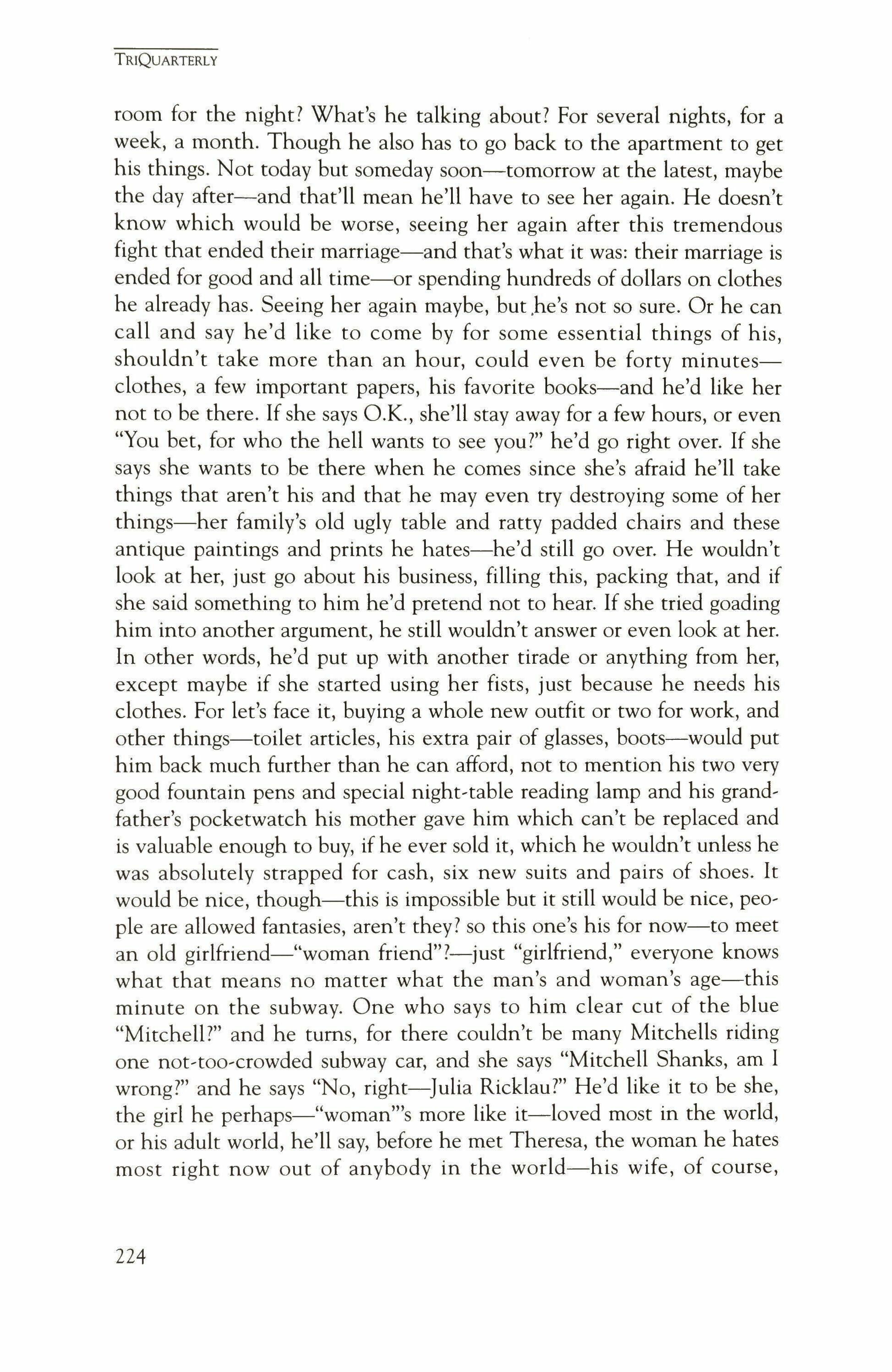
room for the night? What's he talking about? For several nights, for a week, a month. Though he also has to go back to the apartment to get his things. Not today but someday soon-tomorrow at the latest, maybe the day after-and that'll mean he'll have to see her again. He doesn't know which would be worse, seeing her again after this tremendous fight that ended their marriage-and that's what it was: their marriage is ended for good and all time-or spending hundreds of dollars on clothes he already has. Seeing her again maybe, but .he's not so sure. Or he can call and say he'd like to come by for some essential things of his, shouldn't take more than an hour, could even be forty minutesclothes, a few important papers, his favorite books-and he'd like her not to be there. If she says O.K., she'll stay away for a few hours, or even "You bet, for who the hell wants to see you?" he'd go right over. If she says she wants to be there when he comes since she's afraid he'll take things that aren't his and that he may even try destroying some of her things-her family's old ugly table and ratty padded chairs and these antique paintings and prints he hates-he'd still go over. He wouldn't look at her, just go about his business, filling this, packing that, and if she said something to him he'd pretend not to hear. If she tried goading him into another argument, he still wouldn't answer or even look at her. In other words, he'd put up with another tirade or anything from her, except maybe if she started using her fists, just because he needs his clothes. For let's face it, buying a whole new outfit or two for work, and other things-toilet articles, his extra pair of glasses, boots-would put him back much further than he can afford, not to mention his two very good fountain pens and special nighHable reading lamp and his grandfather's pocketwatch his mother gave him which can't be replaced and is valuable enough to buy, if he ever sold it, which he wouldn't unless he was absolutely strapped for cash, six new suits and pairs of shoes. It would be nice, though-this is impossible but it still would be nice, people are allowed fantasies, aren't they? so this one's his for now-to meet an old girlfriend-"woman friend"?-just "girlfriend," everyone knows what that means no matter what the man's and woman's age-this minute on the subway. One who says to him clear cut of the blue "Mitchell?" and he turns, for there couldn't be many Mitchells riding one not-too-crowded subway car, and she says "Mitchell Shanks, am I wrong?" and he says "No, right-Julia Ricklau?" He'd like it to be she, the girl he perhaps-"woman"'s more like it-loved most in the world, or his adult world, he'll say, before he met Theresa, the woman he hates most right now out of anybody in the world-his wife, of course,
TRIQUARTERLY
224
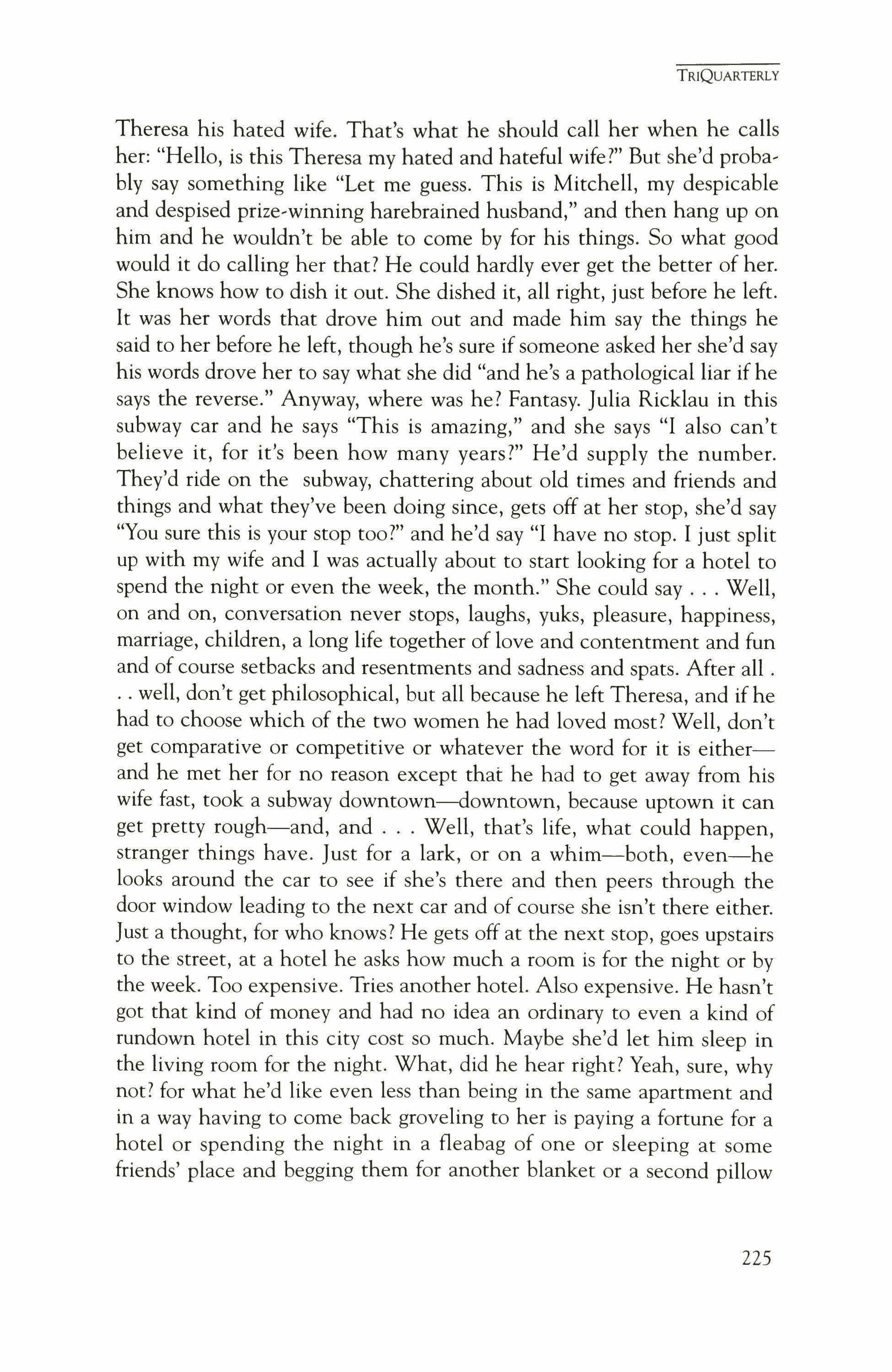
Theresa his hated wife. That's what he should call her when he calls her: "Hello, is this Theresa my hated and hateful wife?" But she'd probably say something like "Let me guess. This is Mitchell, my despicable and despised prize-winning harebrained husband," and then hang up on him and he wouldn't be able to come by for his things. So what good would it do calling her that? He could hardly ever get the better of her. She knows how to dish it out. She dished it, all right, just before he left. It was her words that drove him out and made him say the things he said to her before he left, though he's sure if someone asked her she'd say his words drove her to say what she did "and he's a pathological liar if he says the reverse." Anyway, where was he? Fantasy. Julia Ricklau in this subway car and he says "This is amazing," and she says "I also can't believe it, for it's been how many years?" He'd supply the number. They'd ride on the subway, chattering about old times and friends and things and what they've been doing since, gets off at her stop, she'd say "You sure this is your stop too?" and he'd say "I have no stop. I just split up with my wife and I was actually about to start looking for a hotel to spend the night or even the week, the month." She could say Well, on and on, conversation never stops, laughs, yuks, pleasure, happiness, marriage, children, a long life together of love and contentment and fun and of course setbacks and resentments and sadness and spats. After all well, don't get philosophical, but all because he left Theresa, and if he had to choose which of the two women he had loved most? Well, don't get comparative or competitive or whatever the word for it is eitherand he met her for no reason except that he had to get away from his wife fast, took a subway downtown-downtown, because uptown it can get pretty rough-and, and Well, that's life, what could happen, stranger things have. Just for a lark, or on a whim-both, even-he looks around the car to see if she's there and then peers through the door window leading to the next car and of course she isn't there either. Just a thought, for who knows? He gets off at the next stop, goes upstairs to the street, at a hotel he asks how much a room is for the night or by the week. Too expensive. Tries another hotel. Also expensive. He hasn't got that kind of money and had no idea an ordinary to even a kind of rundown hotel in this city cost so much. Maybe she'd let him sleep in the living room for the night. What, did he hear right? Yeah, sure, why not? for what he'd like even less than being in the same apartment and in a way having to come back groveling to her is paying a fortune for a hotel or spending the night in a fleabag of one or sleeping at some friends' place and begging them for another blanket or a second pillow
TRIQUARTERLY
225
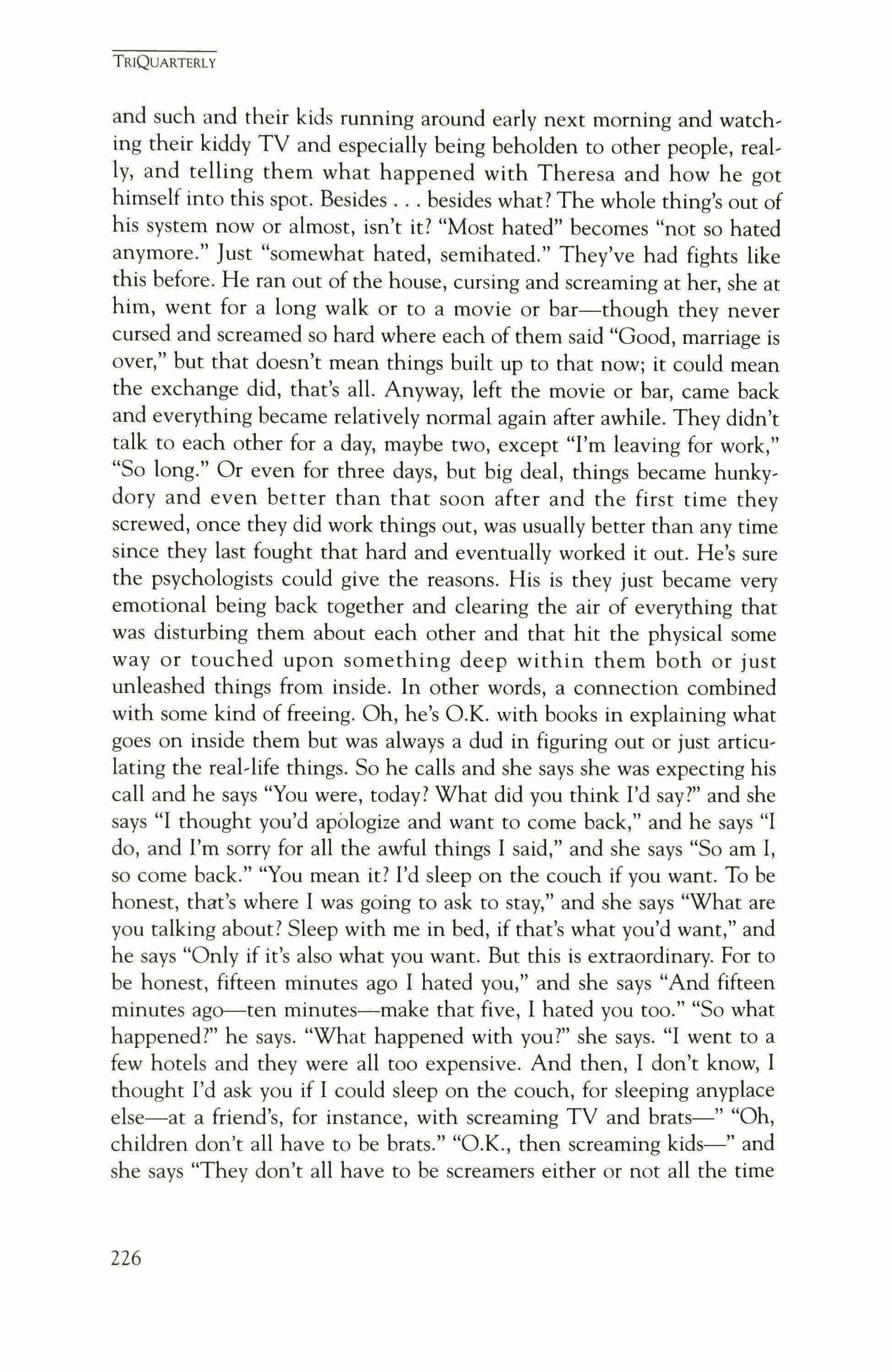
and such and their kids running around early next morning and watching their kiddy TV and especially being beholden to other people, really, and telling them what happened with Theresa and how he got himself into this spot. Besides besides what? The whole thing's out of his system now or almost, isn't it? "Most hated" becomes "not so hated anymore." Just "somewhat hated, semihated." They've had fights like this before. He ran out of the house, cursing and screaming at her, she at him, went for a long walk or to a movie or bar-though they never cursed and screamed so hard where each of them said "Good, marriage is over," but that doesn't mean things built up to that now; it could mean the exchange did, that's all. Anyway, left the movie or bar, came back and everything became relatively normal again after awhile. They didn't talk to each other for a day, maybe two, except "I'm leaving for work," "So long." Or even for three days, but big deal, things became hunkydory and even better than that soon after and the first time they screwed, once they did work things out, was usually better than any time since they last fought that hard and eventually worked it out. He's sure the psychologists could give the reasons. His is they just became very emotional being back together and clearing the air of everything that was disturbing them about each other and that hit the physical some way or touched upon something deep within them both or just unleashed things from inside. In other words, a connection combined with some kind of freeing. Oh, he's O.K. with books in explaining what goes on inside them but was always a dud in figuring out or just articulating the real-life things. So he calls and she says she was expecting his call and he says "You were, today? What did you think I'd say?" and she says "I thought you'd apologize and want to come back," and he says "I do, and I'm sorry for all the awful things I said," and she says "So am I, so come back." "You mean it? I'd sleep on the couch if you want. To be honest, that's where I was going to ask to stay," and she says "What are you talking about? Sleep with me in bed, if that's what you'd want," and he says "Only if it's also what you want. But this is extraordinary. For to be honest, fifteen minutes ago I hated you," and she says "And fifteen minutes ago--ten minutes-make that five, I hated you too." "So what happened?" he says. "What happened with you!" she says. "I went to a few hotels and they were all too expensive. And then, I don't know, I thought I'd ask you if I could sleep on the couch, for sleeping anyplace else-at a friend's, for instance, with screaming TV and brats-" "Oh, children don't all have to be brats." "O.K., then screaming kids-" and she says "They don't all have to be screamers either or not all the time
TRIQUARTERLY
226
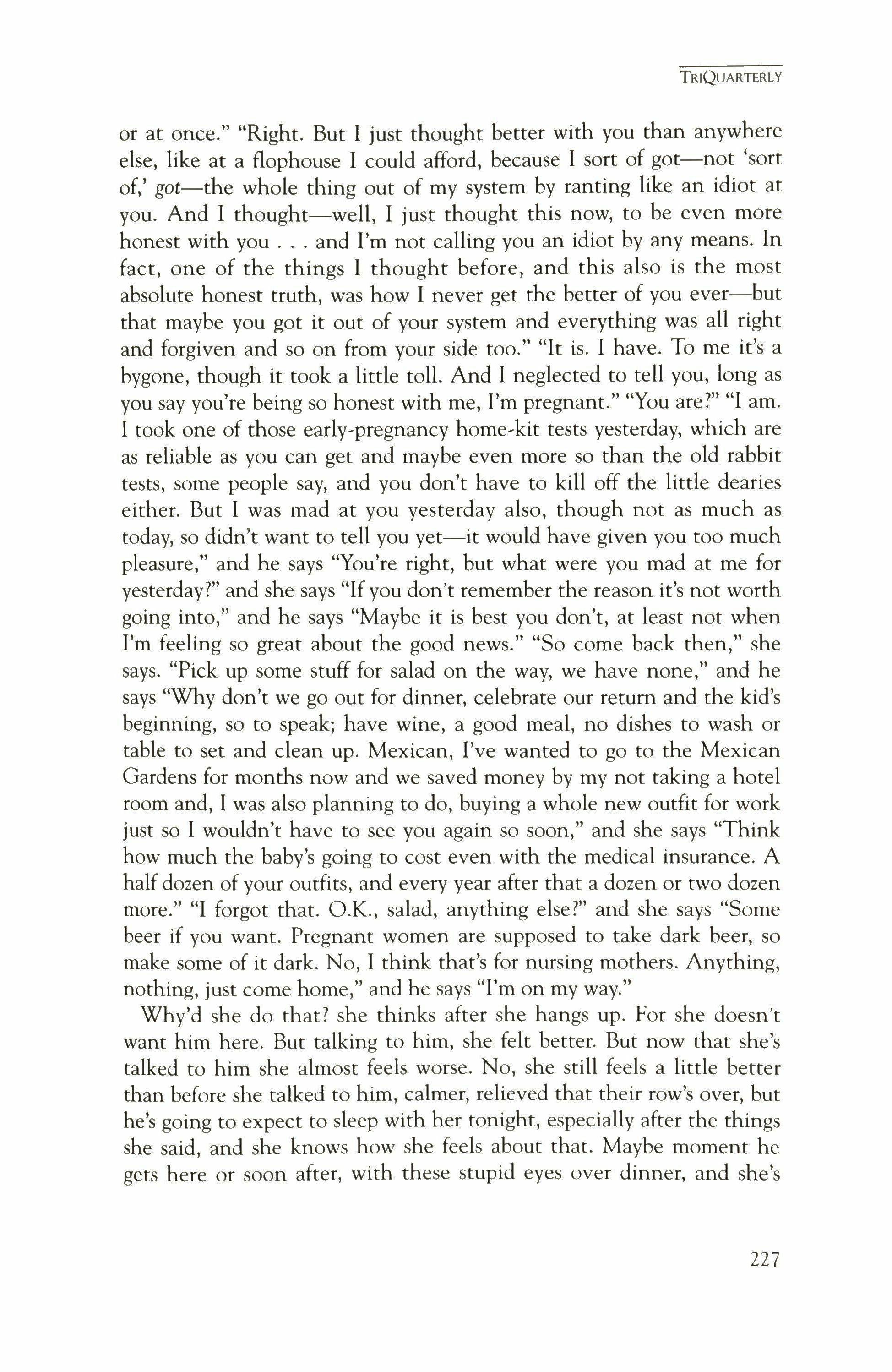
or at once." "Right. But I just thought better with you than anywhere else, like at a flophouse I could afford, because I sort of got-not 'sort of,' got-the whole thing out of my system by ranting like an idiot at you. And I thought-well, I just thought this now, to be even more honest with yOU and I'm not calling you an idiot by any means. In fact, one of the things I thought before, and this also is the most absolute honest truth, was how I never get the better of you ever-but that maybe you got it out of your system and everything was all right and forgiven and so on from your side too." "It is. I have. To me it's a bygone, though it took a little toll. And I neglected to tell you, long as you say you're being so honest with me, I'm pregnant." "You are?" "I am. I took one of those early-pregnancy horne-kit tests yesterday, which are as reliable as you can get and maybe even more so than the old rabbit tests, some people say, and you don't have to kill off the little dearies either. But I was mad at you yesterday also, though not as much as today, so didn't want to tell you yet-it would have given you too much pleasure," and he says "You're right, but what were you mad at me for yesterday?" and she says "If you don't remember the reason it's not worth going into," and he says "Maybe it is best you don't, at least not when I'm feeling so great about the good news." "So come back then," she says. "Pick up some stuff for salad on the way, we have none," and he says "Why don't we go out for dinner, celebrate our return and the kid's beginning, so to speak; have wine, a good meal, no dishes to wash or table to set and clean up. Mexican, I've wanted to go to the Mexican Gardens for months now and we saved money by my not taking a hotel room and, I was also planning to do, buying a whole new outfit for work just so I wouldn't have to see you again so soon," and she says "Think how much the baby's going to cost even with the medical insurance. A half dozen of your outfits, and every year after that a dozen or two dozen more." "I forgot that. O.K., salad, anything else?" and she says "Some beer if you want. Pregnant women are supposed to take dark beer, so make some of it dark. No, I think that's for nursing mothers. Anything, nothing, just come home," and he says "I'm on my way."
Why'd she do that? she thinks after she hangs up. For she doesn't want him here. But talking to him, she felt better. But now that she's talked to him she almost feels worse. No, she still feels a little better than before she talked to him, calmer, relieved that their row's over, but he's going to expect to sleep with her tonight, especially after the things she said, and she knows how she feels about that. Maybe moment he gets here or soon after, with these stupid eyes over dinner, and she's 227
TRIQUARTERLY
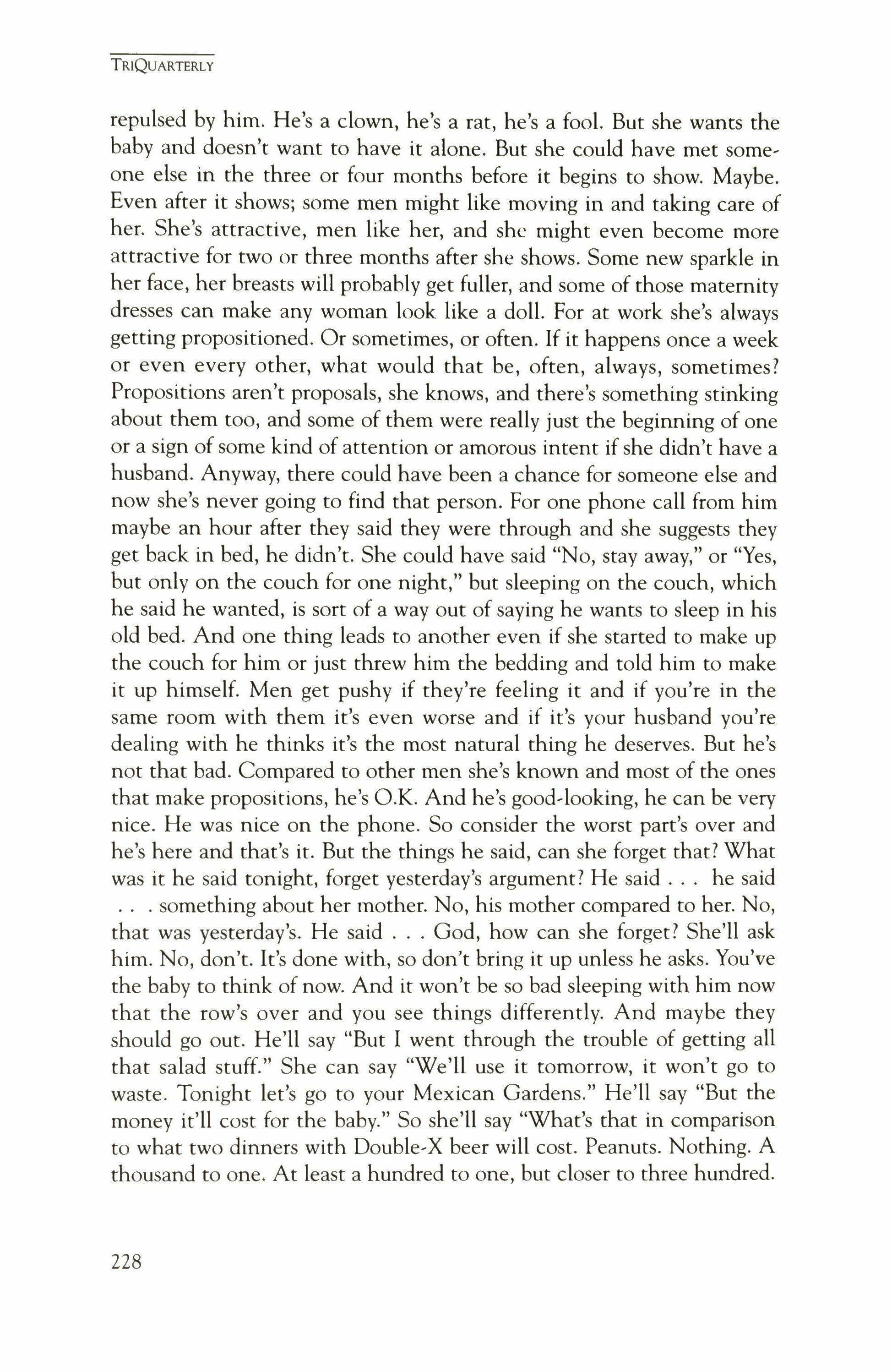
repulsed by him. He's a clown, he's a rat, he's a fool. But she wants the baby and doesn't want to have it alone. But she could have met some, one else in the three or four months before it begins to show. Maybe. Even after it shows; some men might like moving in and taking care of her. She's attractive, men like her, and she might even become more attractive for two or three months after she shows. Some new sparkle in her face, her breasts will probably get fuller, and some of those maternity dresses can make any woman look like a doll. For at work she's always getting propositioned. Or sometimes, or often. If it happens once a week or even every other, what would that be, often, always, sometimes? Propositions aren't proposals, she knows, and there's something stinking about them too, and some of them were really just the beginning of one or a sign of some kind of attention or amorous intent if she didn't have a husband. Anyway, there could have been a chance for someone else and now she's never going to find that person. For one phone call from him maybe an hour after they said they were through and she suggests they get back in bed, he didn't. She could have said "No, stay away," or "Yes, but only on the couch for one night," but sleeping on the couch, which he said he wanted, is sort of a way out of saying he wants to sleep in his old bed. And one thing leads to another even if she started to make up the couch for him or just threw him the bedding and told him to make it up himself. Men get pushy if they're feeling it and if you're in the same room with them it's even worse and if it's your husband you're dealing with he thinks it's the most natural thing he deserves. But he's not that bad. Compared to other men she's known and most of the ones that make propositions, he's O.K. And he's good,looking, he can be very nice. He was nice on the phone. So consider the worst part's over and he's here and that's it. But the things he said, can she forget that? What was it he said tonight, forget yesterday's argument? He said he said something about her mother. No, his mother compared to her. No, that was yesterday's. He said God, how can she forget? She'll ask him. No, don't. It's done with, so don't bring it up unless he asks. You've the baby to think of now. And it won't be so bad sleeping with him now that the row's over and you see things differently. And maybe they should go out. He'll say "But I went through the trouble of getting all that salad stuff." She can say "We'll use it tomorrow, it won't go to waste. Tonight let's go to your Mexican Gardens." He'll say "But the money it'll cost for the baby." So she'll say "What's that in comparison to what two dinners with Double-X beer will cost. Peanuts. Nothing. A thousand to one. At least a hundred to one, but closer to three hundred.
TRIQUARTERLY
228
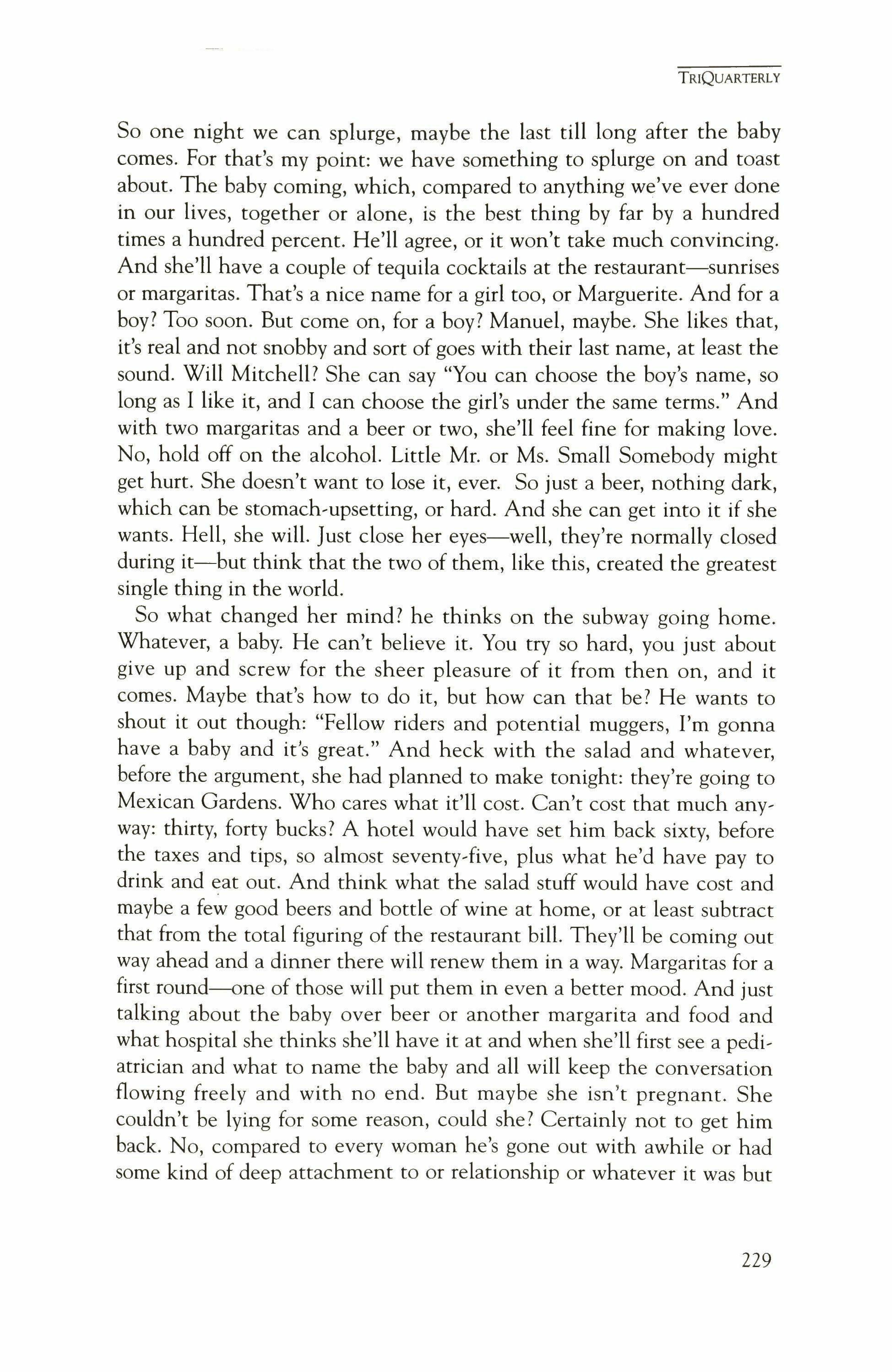
So one night we can splurge, maybe the last till long after the baby comes. For that's my point: we have something to splurge on and toast about. The baby coming, which, compared to anything we've ever done in our lives, together or alone, is the best thing by far by a hundred times a hundred percent. He'll agree, or it won't take much convincing. And she'll have a couple of tequila cocktails at the restaurant-sunrises or margaritas. That's a nice name for a girl too, or Marguerite. And for a boy? Too soon. But come on, for a boy? Manuel, maybe. She likes that, it's real and not snobby and sort of goes with their last name, at least the sound. Will Mitchell? She can say "You can choose the boy's name, so long as I like it, and I can choose the girl's under the same terms." And with two margaritas and a beer or two, she'll feel fine for making love. No, hold off on the alcohol. Little Mr. or Ms. Small Somebody might get hurt. She doesn't want to lose it, ever. So just a beer, nothing dark, which can be stomach-upsetting, or hard. And she can get into it if she wants. Hell, she will. Just close her eyes-well, they're normally closed during it-but think that the two of them, like this, created the greatest single thing in the world.
So what changed her mind? he thinks on the subway going home. Whatever, a baby. He can't believe it. You try so hard, you just about give up and screw for the sheer pleasure of it from then on, and it comes. Maybe that's how to do it, but how can that be? He wants to shout it out though: "Fellow riders and potential muggers, I'm gonna have a baby and it's great." And heck with the salad and whatever, before the argument, she had planned to make tonight: they're going to Mexican Gardens. Who cares what it'll cost. Can't cost that much anyway: thirty, forty bucks? A hotel would have set him back sixty, before the taxes and tips, so almost seventy-five, plus what he'd have pay to drink and eat out. And think what the salad stuff would have cost and maybe a fe� good beers and bottle of wine at home, or at least subtract that from the total figuring of the restaurant bill. They'll be coming out way ahead and a dinner there will renew them in a way. Margaritas for a first round-one of those will put them in even a better mood. And just talking about the baby over beer or another margarita and food and what hospital she thinks she'll have it at and when she'll first see a pediatrician and what to name the baby and all will keep the conversation flowing freely and with no end. But maybe she isn't pregnant. She couldn't be lying for some reason, could she? Certainly not to get him back. No, compared to every woman he's gone out with awhile or had some kind of deep attachment to or relationship or whatever it was but
TRIQUARTERLY
229
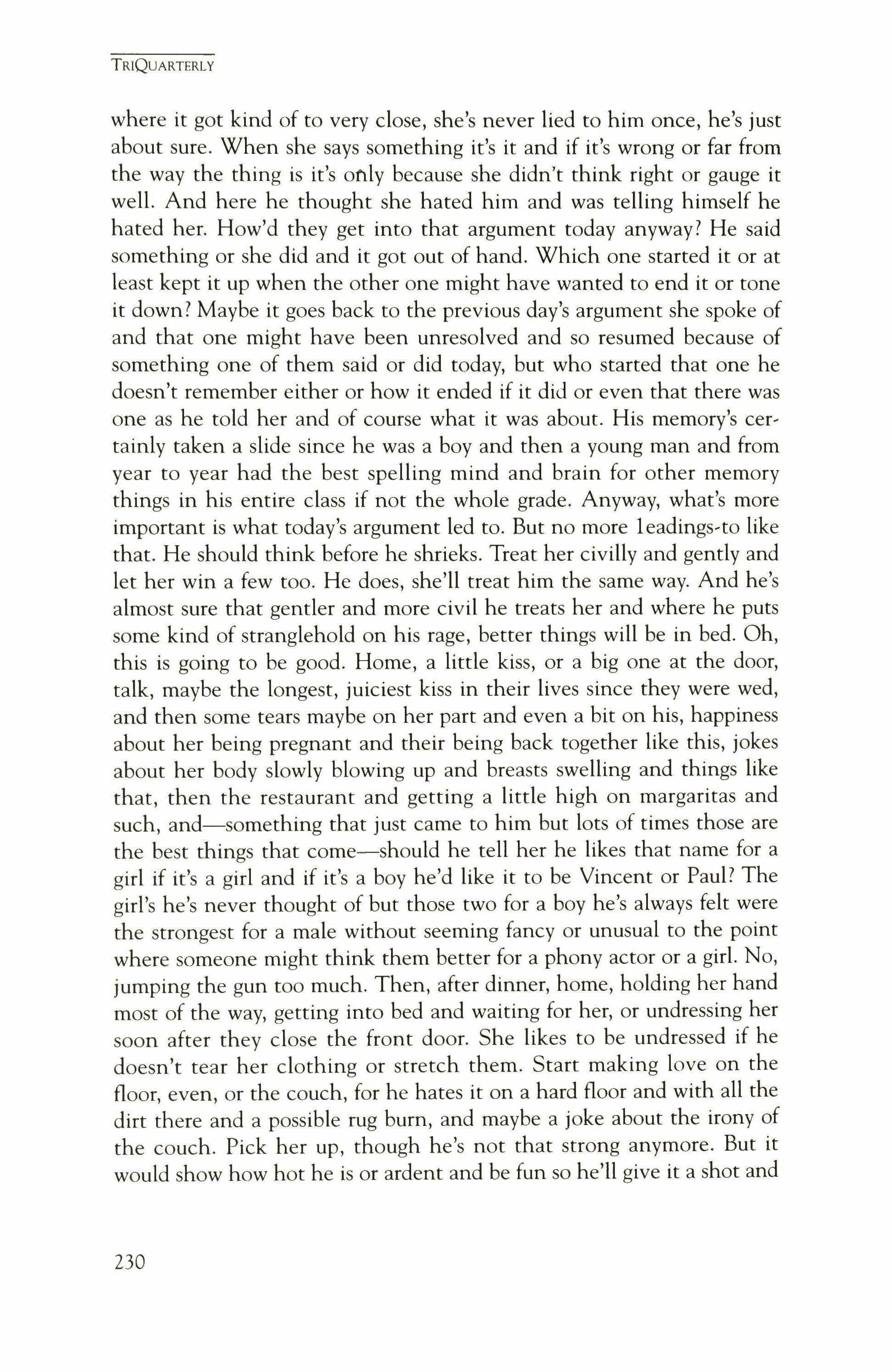
where it got kind of to very close, she's never lied to him once, he's just about sure. When she says something it's it and if it's wrong or far from the way the thing is it's only because she didn't think right or gauge it well. And here he thought she hated him and was telling himself he hated her. How'd they get into that argument today anyway? He said something or she did and it got out of hand. Which one started it or at least kept it up when the other one might have wanted to end it or tone it down? Maybe it goes back to the previous day's argument she spoke of and that one might have been unresolved and so resumed because of something one of them said or did today, but who started that one he doesn't remember either or how it ended if it did or even that there was one as he told her and of course what it was about. His memory's certainly taken a slide since he was a boy and then a young man and from year to year had the best spelling mind and brain for other memory things in his entire class if not the whole grade. Anyway, what's more important is what today's argument led to. But no more leadings-to like that. He should think before he shrieks. Treat her civilly and gently and let her win a few too. He does, she'll treat him the same way. And he's almost sure that gentler and more civil he treats her and where he puts some kind of stranglehold on his rage, better things will be in bed. Oh, this is going to be good. Home, a little kiss, or a big one at the door, talk, maybe the longest, juiciest kiss in their lives since they were wed, and then some tears maybe on her part and even a bit on his, happiness about her being pregnant and their being back together like this, jokes about her body slowly blowing up and breasts swelling and things like that, then the restaurant and getting a little high on margaritas and such, and-something that just came to him but lots of times those are the best things that come-should he tell her he likes that name for a girl if it's a girl and if it's a boy he'd like it to be Vincent or Paul? The girl's he's never thought of but those two for a boy he's always felt were the strongest for a male without seeming fancy or unusual to the point where someone might think them better for a phony actor or a girl. No, jumping the gun too much. Then, after dinner, home, holding her hand most of the way, getting into bed and waiting for her, or undressing her soon after they close the front door. She likes to be undressed if he doesn't tear her clothing or stretch them. Start making love on the floor, even, or the couch, for he hates it on a hard floor and with all the dirt there and a possible rug burn, and maybe a joke about the irony of the couch. Pick her up, though he's not that strong anymore. But it would show how hot he is or ardent and be fun so he'll give it a shot and
TRIQUARTERLY
230
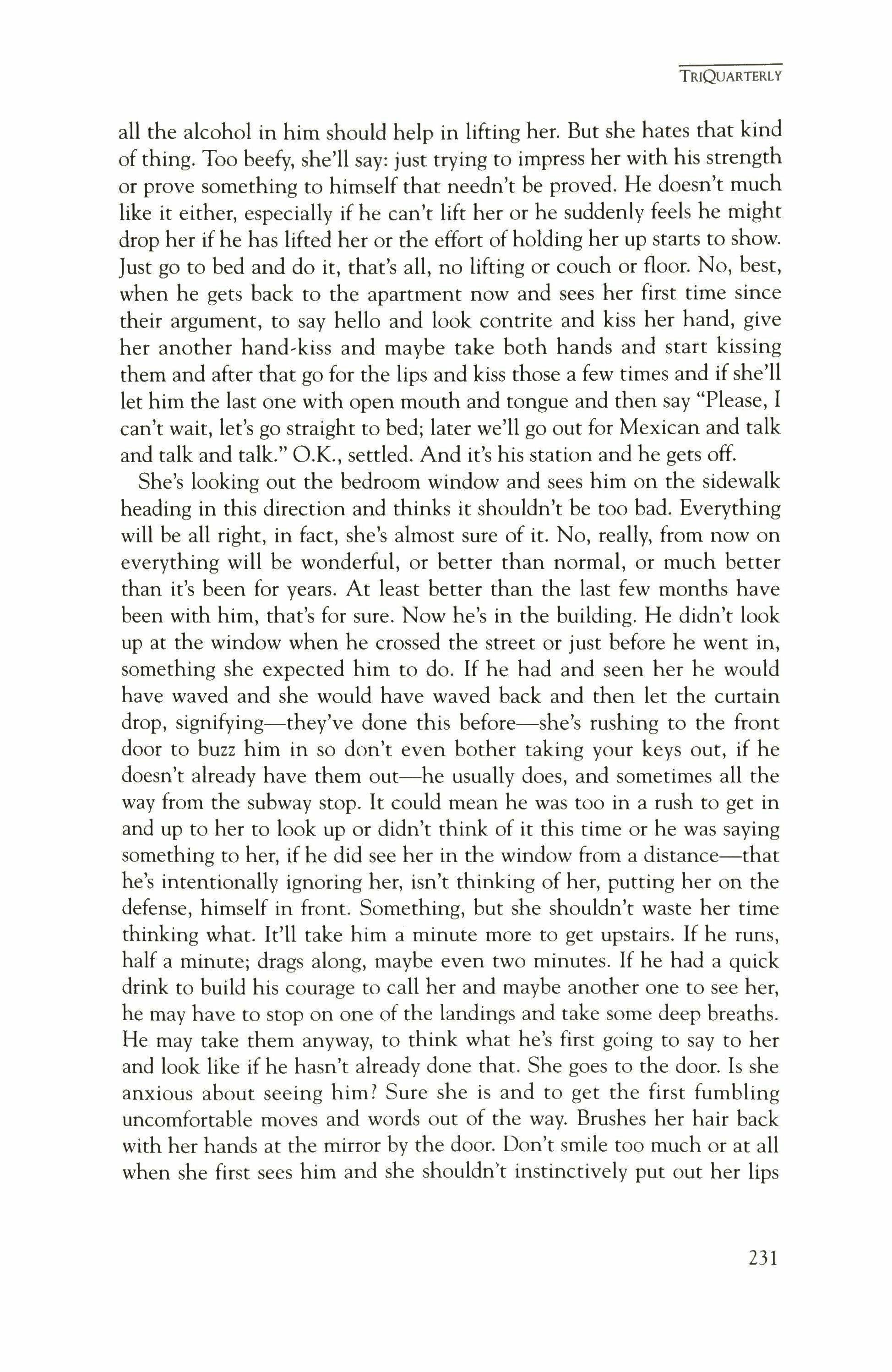
all the alcohol in him should help in lifting her. But she hates that kind of thing. Too beefy, she'll say: just trying to impress her with his strength or prove something to himself that needn't be proved. He doesn't much like it either, especially if he can't lift her or he suddenly feels he might drop her if he has lifted her or the effort of holding her up starts to show. Just go to bed and do it, that's all, no lifting or couch or floor. No, best, when he gets back to the apartment now and sees her first time since their argument, to say hello and look contrite and kiss her hand, give her another hand-kiss and maybe take both hands and start kissing them and after that go for the lips and kiss those a few times and if she'll let him the last one with open mouth and tongue and then say "Please, I can't wait, let's go straight to bed; later we'll go out for Mexican and talk and talk and talk." O.K., settled. And it's his station and he gets off.
She's looking out the bedroom window and sees him on the sidewalk heading in this direction and thinks it shouldn't be too bad. Everything will be all right, in fact, she's almost sure of it. No, really, from now on everything will be wonderful, or better than normal, or much better than it's been for years. At least better than the last few months have been with him, that's for sure. Now he's in the building. He didn't look up at the window when he crossed the street or just before he went in, something she expected him to do. If he had and seen her he would have waved and she would have waved back and then let the curtain drop, signifying-they've done this before-she's rushing to the front door to buzz him in so don't even bother taking your keys out, if he doesn't already have them out-he usually does, and sometimes all the way from the subway stop. It could mean he was too in a rush to get in and up to her to look up or didn't think of it this time or he was saying something to her, if he did see her in the window from a distance-that he's intentionally ignoring her, isn't thinking of her, putting her on the defense, himself in front. Something, but she shouldn't waste her time thinking what. It'll take him a minute more to get upstairs. If he runs, half a minute; drags along, maybe even two minutes. If he had a quick drink to build his courage to call her and maybe another one to see her, he may have to stop on one of the landings and take some deep breaths. He may take them anyway, to think what he's first going to say to her and look like if he hasn't already done that. She goes to the door. Is she anxious about seeing him? Sure she is and to get the first fumbling uncomfortable moves and words out of the way. Brushes her hair back with her hands at the mirror by the door. Don't smile too much or at all when she first sees him and she shouldn't instinctively put out her lips
TRIQUARTERLY
231

and move her face toward his if he makes some sign he's going to kiss her. All that later, maybe much later. For now let him suffer some more. She doesn't like being so premeditative but this is how she thinks she has to be for now. Let him know she's still conscious of what happened before and that she wants fights like that to be a thing of the past. That today's and yesterday's and last week's and the big one last month and so on are the last ones. Spiffs and spats and such are to be taken for granted from time to time, but none of the other kind where they act like they want to shed blood. Say to him, before they do anything, "Let's sit down, have some coffee, and talk." His key is in the door and she lets him open it. "Hello," he says and she says hello.
TRIQUARTERLY
232
In the Graveyard of Afterbirth
Sue Monk Kidd
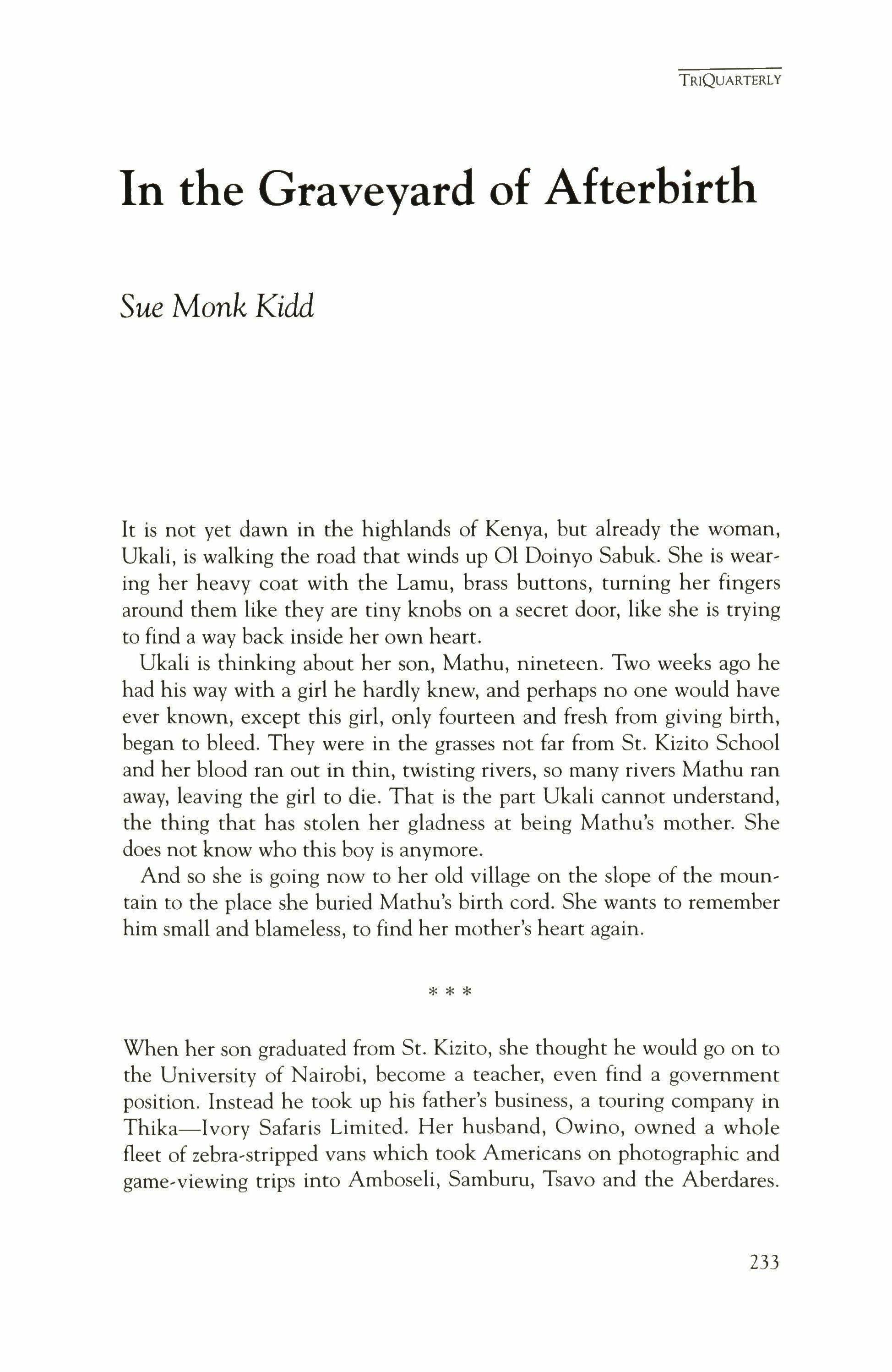
It is not yet dawn in the highlands of Kenya, but already the woman, Ukali, is walking the road that winds up 01 Doinyo Sabuk. She is wearing her heavy coat with the Lamu, brass buttons, turning her fingers around them like they are tiny knobs on a secret door, like she is trying to find a way back inside her own heart.
Ukali is thinking about her son, Mathu, nineteen. Two weeks ago he had his way with a girl he hardly knew, and perhaps no one would have ever known, except this girl, only fourteen and fresh from giving birth, began to bleed. They were in the grasses not far from St. Kizito School and her blood ran out in thin, twisting rivers, so many rivers Mathu ran away, leaving the girl to die. That is the part Ukali cannot understand, the thing that has stolen her gladness at being Mathu's mother. She does not know who this boy is anymore.
And so she is going now to her old village on the slope of the mountain to the place she buried Mathu's birth cord. She wants to remember him small and blameless, to find her mother's heart again.
When her son graduated from St. Kizito, she thought he would go on to the University of Nairobi, become a teacher, even find a government position. Instead he took up his father's business, a touring company in Thika-Ivory Safaris Limited. Her husband, Owino, owned a whole fleet of zebra-stripped vans which took Americans on photographic and game-viewing trips into Amboseli, Samburu, Tsavo and the Aberdares.
TRIQUARTERLY
* * *
233
TRIQUARTERLY

But it is no secret from Ukali that most of their money, the money that bought her coat with the fine Lamu buttons, came from tusks sold on the black market and even rhino horn when the elephants were scarce. Her son was becoming an expert in killing animals by night, and she does not know what this has to do with the dead girl, but in her mind they are vaguely connected with threads she cannot quite identify.
At night Ukali dreams of the girl. She never appears as her actual self, however. Ukali simply knows it is she in that odd way you know things in dreams. One time the girl was a dung beetle scurrying across the floor. In another dream she was an elephant, lying slaughtered and missing her tusks. Last night the girl was the legless woman who lives in a cardboard box near Kabau and they were all spitting on her-Mathu, Owino, even herself.
Ukali has asked Owino a dozen times how their son could have done this and his answer is always the same. He says Mathu did not know the girl had given birth a week ago, that he was too ashamed to go for help, that he did not know how serious it all was. Once Owino told her, "Stop fretting. Mathu did not mean to hurt the girl. Besides, she was nothing much. She was just a village girl and not even a good one."
When she left the house, the air was dark and laced with mist, but now light breaks suddenly across the hump of the mountain, streaking pale blue, striking Ukali's face, glazing it ink-gold. For a moment she forgets about her son and stares a little dazed at the top of 01 Doinyo Sabuk, the Sleeping Buffalo.
It is said that long ago before the mountain there was a young chief who had no mother to soften his heart. He killed a buffalo calf and when its mother came after him, he changed her into a mountain. Into 01 Doinyo Sabuk. It is also said one day the mother buffalo will wake up and when she does, the earth will shake with her fury. And even now Ukali can see vapors rising like smoke along her back.
She crosses the bridge over the Athi River, taking the high road that will lead her to the outskirts of her old village. The road is deserted. She no longer believes in spirits, but still she looks behind her. Right and left also. On both sides the savannas are lit pink. It makes her think of the grasses where the girl's body was found. She cannot say what possessed her to do it, but she went to see the place for herself. The grass was pressed down and stained. She could make out plainly where the curve of the girl's back had been, how she drew herself into a tiny sickle.
She saw the girl's mother that same day, her face like a slice of dark-
234

ness shining through the slit of a shawl, jeweled with flies she did not bother to brush away. Once when Ukali stood on her porch, she thought she saw the woman crouched like a green shadow among the trees. Now walking along, she begins to see the woman again in that same half-glimpsed way.
The old ones from her village used to say a person, if they had reason enough, could change into a hyena or any sort of thing and Ukali knew this to be plain silliness, but even so she gets a strange feeling when she sees an egret floating in the eye of the volcano lake down the escarpment. It lifts off the water and flies up the mountain, skimming the air over her head, screaming at her as if it knows.
When she passes the Indian duka, even one of the Sikhs, wearing a turban like a beehive of gauze, seems to be the girl's mother.
He calls to her. "You are looking for tea and biscuits, yes? Come in."
He gestures to the doorway and Ukali, suddenly panicked, breaks into a run, hurling herself straight uphill. She runs until her lungs throb.
As a child, when she was scared, when her father stayed away too long drinking and her mother sent her to bring him home, she would repeat things as fast as she could-tongue twisters, missionary verses, things her mother said-saying them so fast there was not a crevice for fear to slip in. And this is what she does the rest of the way. She makes a litany. "Don't worry," she says. "The girl was nothing much. She was just a village girl. And not even a good one."
Finally she is calm again. She sets her mind on Mathu small and blameless. She remembers the day he was born. It was the dry season, in a storm without rain. The dust swept down in torrents and when the brown veil stopped beating, Ukali and her sister took the cord and membranes and knelt under the acacias, poking fun at the twisted coil, how it smelled like decaying mangoes. It was so slick with juices it wriggled from her hand onto the ground and her sister in her green kitengi, her scarf wound into a bright python on her head, hopped in a circle, shrieking "Nyoka! Snake."
That day the earth was dry and hard-caked. Ukali could barely scratch the surface with her digging stick. All her strength had gone into pushing Mathu out. Her sister took the stick and chiseled a hole the distance from her shoulder to her wrist. When Ukali laid the cord and mernbranes inside in a circle, her sister said, "Look, the snake bites its tail," and they fell on the mountain laughing.
TRIQUARTERLY
235
TRIQUARTERLY

Ukali heaped the dirt over the afterbirth and said the thing her mother and her grandmothers had said when they knelt in this same place, "The cord is cut, but the connection will not be broken." She marked the place with a stone. They rose to their feet, dancing, Ukali only swaying a little on her ankles, but her sister clapping, whirling around the white bark of the trees.
Baboons materialized from nowhere and looped through the branches, rousing the birds, which rose like cinders until everything seemed to flutter and soar over their heads, to rejoice in the coming of Mathu. Ukali's heart leapt like those baboons, flew like those birds. And Owino had been proud too. When he first looked on Mathu, he said, "Now I will never die."
Ukali reaches her old village at midday, but the sun, which was staring so bright, has sunk back in the sky, turning opaque and milky like an old man's eye. The graveyard of afterbirth lies dim under the thorn trees, marbled with old stones and surrounded by a wire fence red with age. She finds Mathu's stone and kneels beside it. She is thinking now God will swoop down like those baboons long ago and make her heart leap again at being Mathu's mother.
The clouds thicken and sift down the hill. Rain starts to fall, at first touching her like feathers, then pelting hard, running down the slope in gorged veins. It seems to Ukali the whole mountain is crying, that 01 Doinyo Sabuk is finally awake and weeping.
Her coat with the brass buttons grows soaked and dripping, but still she does not move. Her knees sink into soft ruts. Beyond the fence a few people hurry by, seeking a dry place, their voices floating to her through a watery curtain.
"Look, that is Ukali from Thika. What is she doing out there?"
"Look how she kneels in the mud, getting wet."
"She can't be very well, can she?"
Ukali feels. herself sinking into the shoulder of 01 Doinyo Sabuk. All day her thoughts have darted like tiny shadows, like shards of black glass flying everywhere, but now they coalesce all at once into an awareness, into a fathomless shape. She says, "When I became Mathu's mother, I promised myself I would keep his heart soft. When Owino stole eggs from the ostrich to sell, Mathu and I went all the way to her nest to say we were sorry. We picked up beetles, geckos, chameleons, every small thing, and carried them from the porch so his father could not stomp them with his shoe. Twice, crying, I showed Mathu the bloody tusk of
236

an elephant Owino poached and Mathu cried with me, wailing like his heart was split apart. And each time his father spit on the legless woman in the cardboard box, I gave Mathu a shilling and sent him to drop it in her cup."
As Ukali speaks, there are flashes and rumbles and clouds shaking. The rain beats harder. She says, "But all these things were too difficult to keep up. The other boys, even Mathu's father, called him girlish names and I could not bear his shame. I was afraid I had made his heart too soft and so I let him stomp the beetles and go with his father to kill the elephants. I let him steal eggs from the ostrich. I stopped giving him shillings for the legless woman."
Ukali looks up at the drowned sky. She opens her mouth and the rain falls in. She starts to cry, to rock, to pull her fingers through the black mud and rub it on her face.
"Ukali." Turning, she sees her sister walking toward her on silver puddles like they are carpets. She is holding a piece of old tin over her head. She comes and kneels beside Ukali. Her hands pat Ukali's face, stroke her shoulders, fuss everywhere about her like tiny black wings. She kisses Ukali's cheek and mud sticks to her lips. She does not say "Look at you, making a fool of yourself out here in the rain. Everyone in the village is talking."
She says, "Here Sister, I will hold the tin over you while you cry."
The drops strike the tin, landing like hooves and Ukali thinks she will never forget the sound they make, falling on her like a stampede, beating on this tiny roof of love her sister has made for them.
When the rain stops and Ukali's tears have run their course, her sister says, "Is this Mathu you are crying about?"
Ukali peers up with the taste of mud on her tongue. "Do you know, one day I saw Mathu spit on the legless woman over near Kabau?"
They are quiet. Ukali lifts the stone and starts to dig. Her sister digs, too. When their fingers touch in the wet dirt, they look at one another like they are conspirators in something too solemn to put in words. They form a hole the length of their arms, until their fingernails scrape the piece of plastic over Mathu's cord.
Ukali eases her hand beneath the plastic and draws out the cord, only now this thing that once held him swimming in her is nothing but a piece of blackened root.
They walk holding hands, Ukali and her sister coming down 01 Ooinyo Sabuk with the soggy wind on their backs and the cord deep in Ukali's pocket.
TRIQUARTERLY
237
TRIQUARTERLY

At the Athi River, Ukali's sister picks her way through the brush down to the bank and, stooping, dips her skirt in the water. She returns and cleans the mud from Ukali's face. She washes Ukali until she is shining.
They move onto the bridge. After the rain, the river is churning. Ukali reaches in her pocket and lifts out the shriveled ligament. She tosses it high. It rides the wind, then grows small like a moth flying away from her. It makes no splash when it touches the water.
Staring at the place it disappeared, Ukali says, "The girl was a person." "Yes," her sister says. "She was a person."
That night in Ukali's dream, the dead girl comes again. She returns as the legless woman, but instead of spitting on her, this time Ukali is patting her face, draping her with the brass-button coat, holding a piece of tin over their heads.
238
Mariah
Dabney Stuart
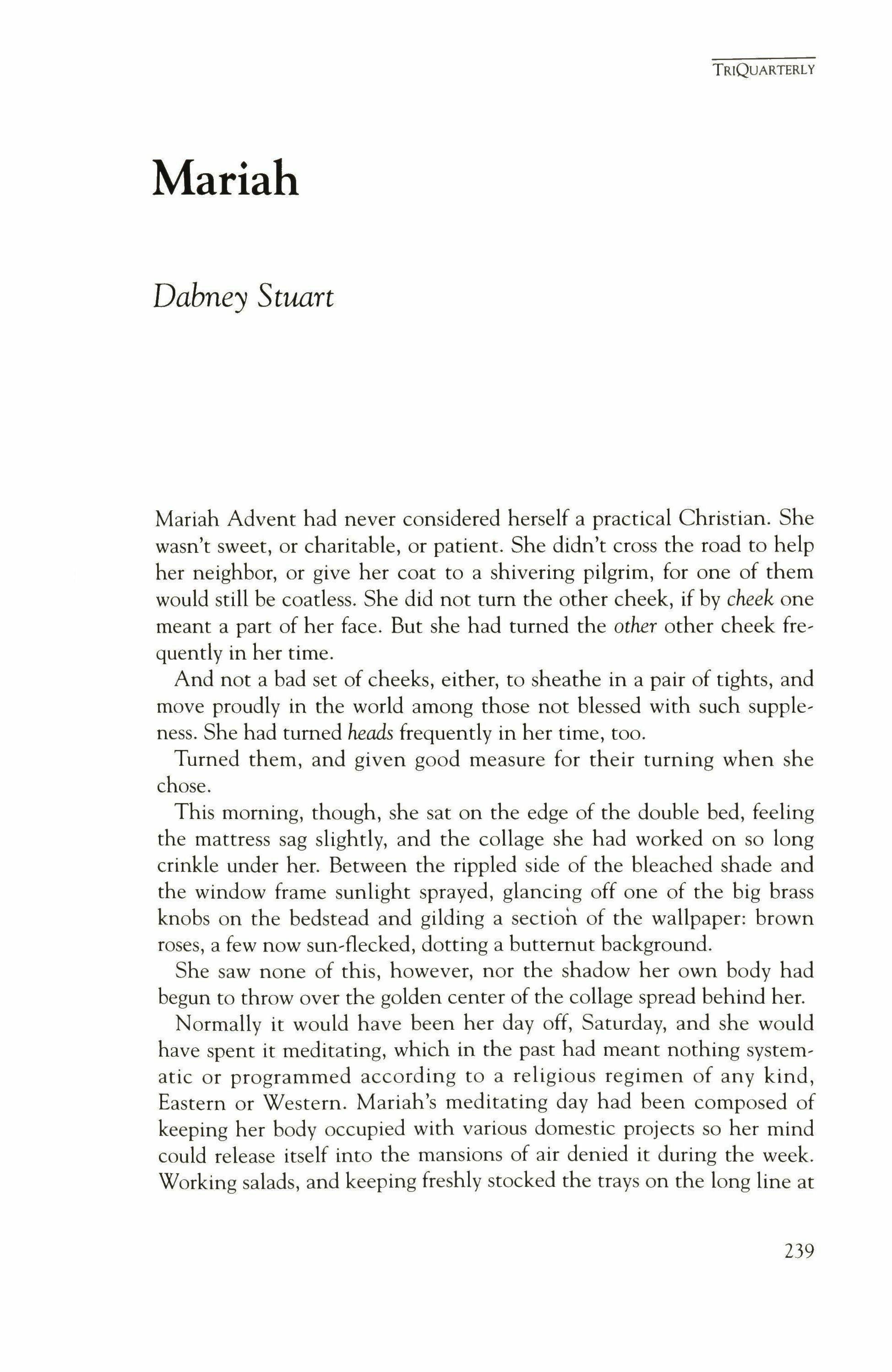
Mariah Advent had never considered herself a practical Christian. She wasn't sweet, or charitable, or patient. She didn't cross the road to help her neighbor, or give her coat to a shivering pilgrim, for one of them would still be coatless. She did not turn the other cheek, if by cheek one meant a part of her face. But she had turned the other other cheek frequently in her time.
And not a bad set of cheeks, either, to sheathe in a pair of tights, and move proudly in the world among those not blessed with such suppleness. She had turned heads frequently in her time, too. Turned them, and given good measure for their turning when she chose.
This morning, though, she sat on the edge of the double bed, feeling the mattress sag slightly, and the collage she had worked on so long crinkle under her. Between the rippled side of the bleached shade and the window frame sunlight sprayed, glancing off one of the big brass knobs on the bedstead and gilding a section of the wallpaper: brown roses, a few now sun-flecked, dotting a butternut background.
She saw none of this, however, nor the shadow her own body had begun to throw over the golden center of the collage spread behind her.
Normally it would have been her day off, Saturday, and she would have spent it meditating, which in the past had meant nothing systematic or programmed according to a religious regimen of any kind, Eastern or Western. Mariah's meditating day had been composed of keeping her body occupied with various domestic projects so her mind could release itself into the mansions of air denied it during the week. Working salads, and keeping freshly stocked the trays on the long line at
TRIQUARTERLY
239
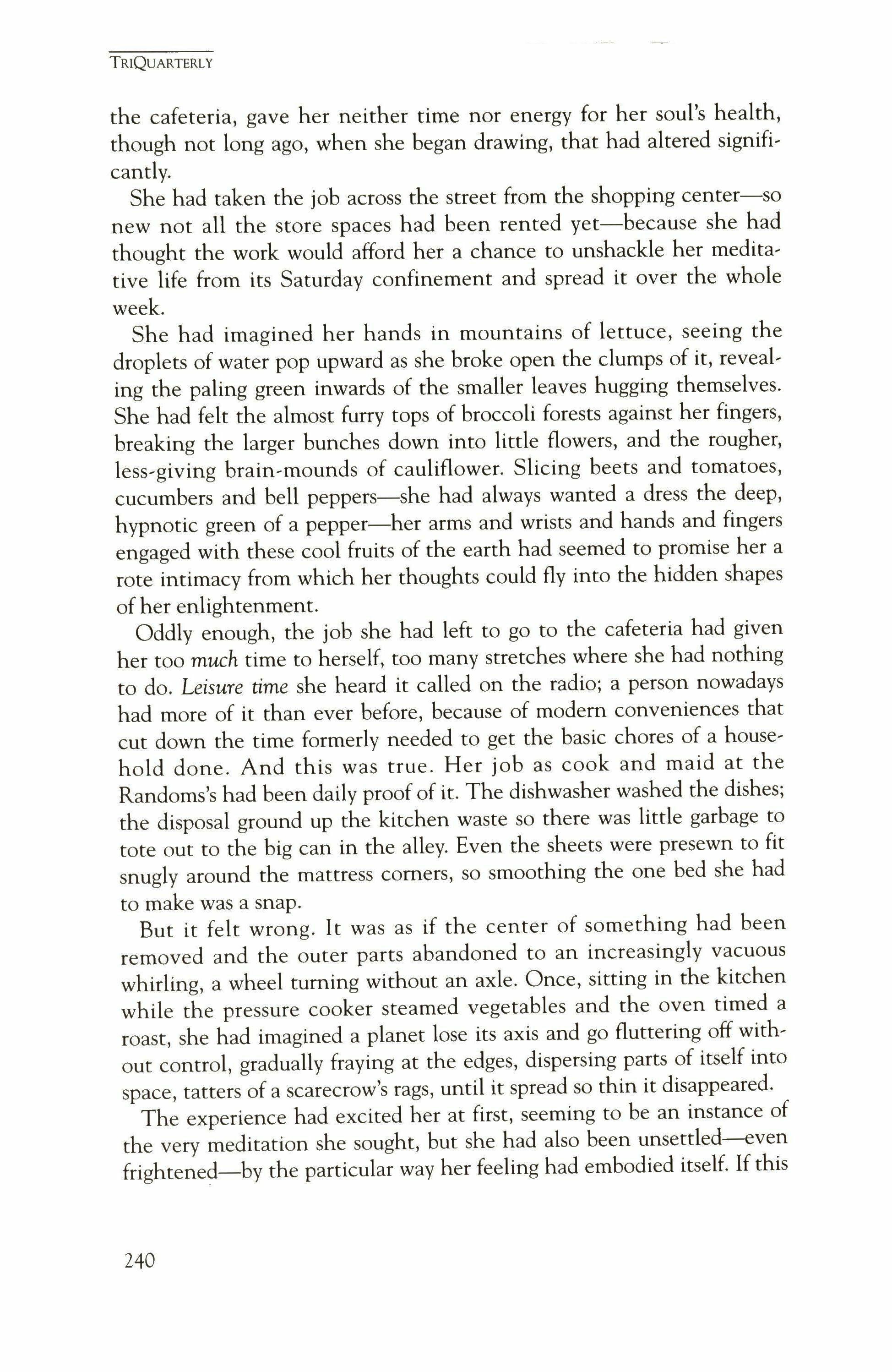
the cafeteria, gave her neither time nor energy for her soul's health, though not long ago, when she began drawing, that had altered significantly.
She had taken the job across the street from the shopping center-so new not all the store spaces had been rented yet-because she had thought the work would afford her a chance to unshackle her meditative life from its Saturday confinement and spread it over the whole week.
She had imagined her hands in mountains of lettuce, seeing the droplets of water pop upward as she broke open the clumps of it, revealing the paling green inwards of the smaller leaves hugging themselves. She had felt the almost furry tops of broccoli forests against her fingers, breaking the larger bunches down into little flowers, and the rougher, less-giving brain-mounds of cauliflower. Slicing beets and tomatoes, cucumbers and bell peppers-she had always wanted a dress the deep, hypnotic green of a pepper-her arms and wrists and hands and fingers engaged with these cool fruits of the earth had seemed to promise her a rote intimacy from which her thoughts could fly into the hidden shapes of her enlightenment.
Oddly enough, the job she had left to go to the cafeteria had given her too much time to herself, too many stretches where she had nothing to do. Leisure time she heard it called on the radio; a person nowadays had more of it than ever before, because of modem conveniences that cut down the time formerly needed to get the basic chores of a household done. And this was true. Her job as cook and maid at the Randoms's had been daily proof of it. The dishwasher washed the dishes; the disposal ground up the kitchen waste so there was little garbage to tote out to the big can in the alley. Even the sheets were presewn to fit snugly around the mattress comers, so smoothing the one bed she had to make was a snap.
But it felt wrong. It was as if the center of something had been removed and the outer parts abandoned to an increasingly vacuous whirling, a wheel turning without an axle. Once, sitting in the kitchen while the pressure cooker steamed vegetables and the oven timed a roast, she had imagined a planet lose its axis and go fluttering off without control, gradually fraying at the edges, dispersing parts of itself into space, tatters of a scarecrow's rags, until it spread so thin it disappeared.
The experience had excited her at first, seeming to be an instance of the very meditation she sought, but she had also been unsettled-even frightened-by the particular way her feeling had embodied itself. If this
TRIQUARTERLY
240

was the direction in which leisure time cast her inner thoughts, she wanted no more of it. In spite of the generous raise old Mr. Random had offered her, and the amiable way he and his sweet wife treated her, she had given two weeks' notice and filled out an application for the cafeteria opening.
How could she explain to Mr. Random that his proposal to rearrange her duties so she have more time for herself would have only made things worse? As it was, Mrs. Random fried chicken herself because her husband wouldn't eat anyone else's. The only time Mariah really enjoyed her six months with the elderly couple was their July Fourth dinner for their relatives.
They had come from all over, including as far away as Arkansas and Florida, and as close as two blocks over in Ginter Park where three of the Randoms's daughters and their one son lived, all within a mile of each other. Mariah had worked for all of them at one time or another, filling in when their help got sick, or lending a hand at parties and local family gatherings, usually on Sundays. They each had children, too, nine altogether, a hodgepodge of grimy, loud energies spinning about interchangeably.
Except for one. Mariah remembered how one of the grandsons, Mr. Random's son's son-Seth was it? Most of them had funny, one-syllabled names, names with no music in them, so when you said them it sounded like you were whining or barking or coughing: Jane and Hank and Mark-Mark, that was the one. Seth was his father.
She had heard old Mr. Random's standard joke about how hard it was to keep everybody straight anymore, there were so many, and the more who arrived the worse his memory got. He had hired somebody to fill out the family tree as far back as he could dig, but had told him nevermind when he found out an immediate forbear had been a corporal in the Confederate army who had deserted to sell mules to both sides.
She remembered how Mark had closed the oven door on her when she was substituting at the son's house. Hovering around the kitchen like he'd emerged from the wall or might vanish into it at any minute. Couldn't have been more than five or six years old. Not saying anything. Mariah had wondered if he was just interested in what she was doing, which at that moment was baking rolls.
"They're not quite brown enough," she said, glancing from the rolls to the boy and back. "See?"
He approached and, standing beside her, bent toward the four cast� iron pans, out of which puffed twenty-four nearly lighter-than-air caps of homemade bread.
TRIQUARTERLY
241
TRIQUARTERLY

"Aren't they gems?" Mariah smiled at him. Instead of answering, or even looking at her, the boy had put both hands under the door and brought it abruptly up as Mariah slid the rack back in the oven, trapping her right arm momentarily in the hot interior. She'd been unable not to cry out, though she hadn't been burned. A little sun of fear and surprise burst in her eyes, seeming to her as if the true location of this widening bud of flame had been inside her forehead-and she dropped the hot pad in the stove. The only injury turned out to be a bruise on her forearm where she bumped it when she jerked free of the heat, knocking the oven door open again. It had bounced, she remembered, flapping on its hinges, making a noise like one of the Randoms's names.
The boy disappeared. His mother made a fuss, but even as Mariah was telling her it was nothing, she was retreating toward the bustle of people in the living room, tinkling their glasses in the pre-dinner haze of cigarette smoke and bourbon.
She remembered less the boy than the bright blossom in her head, and after that the phrase lend a hand-a favorite of old Mr. Randomhad acquired an overtone she would have preferred to forget.
There had been so much to do for that [uly-Fourth reunion that she had become engrossed beyond her desire. A week of preparation, and the unending day of the festivities themselves, had freed her deepest flights. She had lost track of time in the rising and widening of vision; while her hands kneaded dough or chopped scallions or speared cloves into the plump hams, and her body adapted itself to the postures of bending and sidling and lifting, her spirit had found shapes it settled in and abandoned-the smell of a flower, or a butterfly lost in a field and suddenly fluttering up, seeming to lift the whole expanse of grass and blossom with its rising.
She had flown with a Tuskegee airman, his co-pilot, on a dangerous mission covering a bombing run to central Germany. The silent puffs of exploding anti-aircraft shells-she knew the name for that, flak, a word that seemed itself an explosion, the sound of an atmosphere-s-interspersed with spurts of fire from the guns of another world she remernbered from the newspapers years ago, Messerschmitts, as many consonants clustered as there were bullets spewing from the wings of the plane. In the midst of this turmoil she noticed the pilot had disappeared; the seat was as empty as a grounded bird's nest in February. As the plane began to veer and plummet she grabbed the stick, righting it, feeling herself not merely at ease with the controls but drawing from them into
242
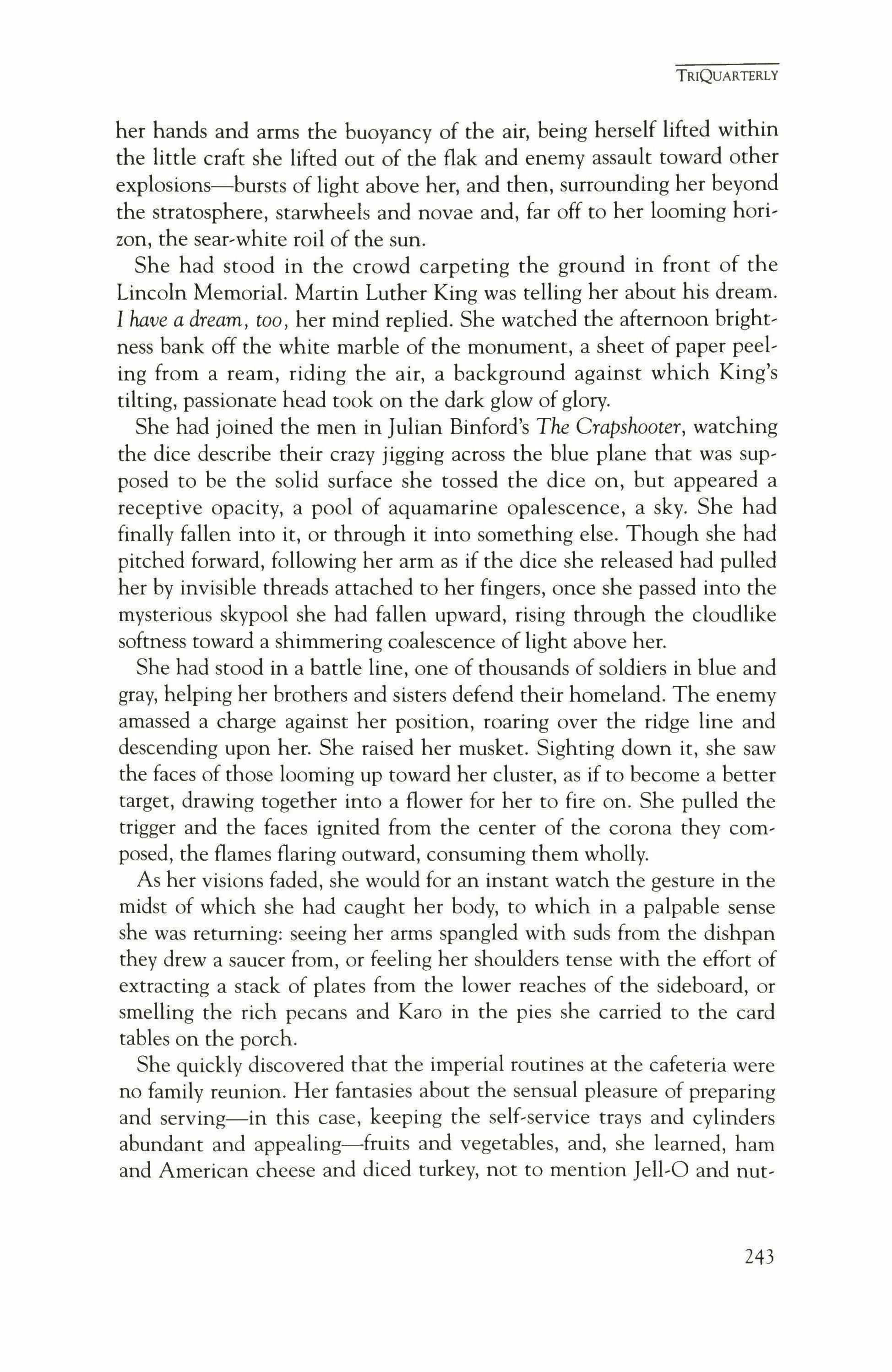
her hands and arms the buoyancy of the air, being herself lifted within the little craft she lifted out of the flak and enemy assault toward other explosions-bursts of light above her, and then, surrounding her beyond the stratosphere, starwheels and novae and, far off to her looming horizon, the sear-white roil of the sun.
She had stood in the crowd carpeting the ground in front of the Lincoln Memorial. Martin Luther King was telling her about his dream. I have a dream, too, her mind replied. She watched the afternoon brightness bank off the white marble of the monument, a sheet of paper peeling from a ream, riding the air, a background against which King's tilting, passionate head took on the dark glow of glory.
She had joined the men in Julian Binford's The Crapshooter, watching the dice describe their crazy jigging across the blue plane that was supposed to be the solid surface she tossed the dice on, but appeared a receptive opacity, a pool of aquamarine opalescence, a sky. She had finally fallen into it, or through it into something else. Though she had pitched forward, following her arm as if the dice she released had pulled her by invisible threads attached to her fingers, once she passed into the mysterious skypool she had fallen upward, rising through the cloudlike softness toward a shimmering coalescence of light above her.
She had stood in a battle line, one of thousands of soldiers in blue and gray, helping her brothers and sisters defend their homeland. The enemy amassed a charge against her position, roaring over the ridge line and descending upon her. She raised her musket. Sighting down it, she saw the faces of those looming up toward her cluster, as if to become a better target, drawing together into a flower for her to fire on. She pulled the trigger and the faces ignited from the center of the corona they cornposed, the flames flaring outward, consuming them wholly.
As her visions faded, she would for an instant watch the gesture in the midst of which she had caught her body, to which in a palpable sense she was returning: seeing her arms spangled with suds from the dishpan they drew a saucer from, or feeling her shoulders tense with the effort of extracting a stack of plates from the lower reaches of the sideboard, or smelling the rich pecans and Karo in the pies she carried to the card tables on the porch.
She quickly discovered that the imperial routines at the cafeteria were no family reunion. Her fantasies about the sensual pleasure of preparing and serving-in this case, keeping the self-service trays and cylinders abundant and appealing-fruits and vegetables, and, she learned, ham and American cheese and diced turkey, not to mention [ell-O and nut-
TRIQUARTERLY
243
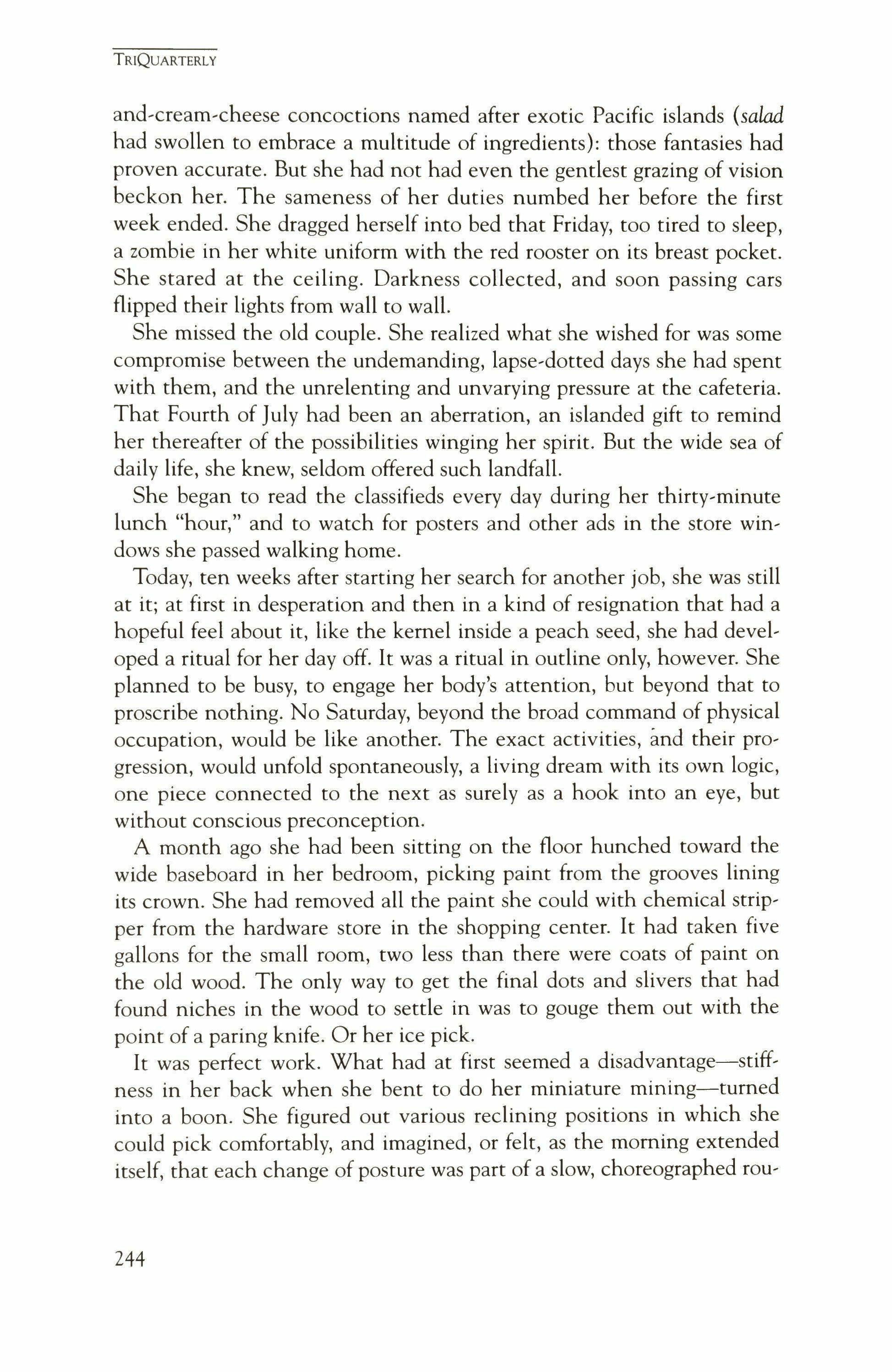
and-cream-cheese concoctions named after exotic Pacific islands {salad had swollen to embrace a multitude of ingredients}: those fantasies had proven accurate. But she had not had even the gentlest grazing of vision beckon her. The sameness of her duties numbed her before the first week ended. She dragged herself into bed that Friday, too tired to sleep, a zombie in her white uniform with the red rooster on its breast pocket. She stared at the ceiling. Darkness collected, and soon passing cars flipped their lights from wall to wall.
She missed the old couple. She realized what she wished for was some compromise between the undemanding, lapse-dotted days she had spent with them, and the unrelenting and unvarying pressure at the cafeteria. That Fourth of July had been an aberration, an islanded gift to remind her thereafter of the possibilities winging her spirit. But the wide sea of daily life, she knew, seldom offered such landfall.
She began to read the classifieds every day during her thirty-minute lunch "hour," and to watch for posters and other ads in the store win' dows she passed walking home.
Today, ten weeks after starting her search for another job, she was still at it; at first in desperation and then in a kind of resignation that had a hopeful feel about it, like the kernel inside a peach seed, she had developed a ritual for her day off. It was a ritual in outline only, however. She planned to be busy, to engage her body's attention, but beyond that to proscribe nothing. No Saturday, beyond the broad command of physical occupation, would be like another. The exact activities, and their pro' gression, would unfold spontaneously, a living dream with its own logic, one piece connected to the next as surely as a hook into an eye, but without conscious preconception.
A month ago she had been sitting on the floor hunched toward the wide baseboard in her bedroom, picking paint from the grooves lining its crown. She had removed all the paint she could with chemical strip' per from the hardware store in the shopping center. It had taken five gallons for the small room, two less than there were coats of paint on the old wood. The only way to get the final dots and slivers that had found niches in the wood to settle in was to gouge them out with the point of a paring knife. Or her ice pick.
It was perfect work. What had at first seemed a disadvantage-stiff, ness in her back when she bent to do her miniature mining-turned into a boon. She figured out various reclining positions in which she could pick comfortably, and imagined, or felt, as the morning extended itself, that each change of posture was part of a slow, choreographed rou-
TRIQUARTERLY
244

tine she was performing. She moved clockwise. To her left along the edge of the baseboard little flecks of paint, mostly cream and faded vellow, trailed after her like cosmic dust in a starfall.
In the midst of a like trail of associations in her mind she had remembered Serena Peoples in the vegetable aisle of the Safeway, telling her about the big house where she did cleaning. More rooms than your heavenly mansion itself, she had told Mariah. Even the rooms have rooms, like they reproduce in the dark. Mariah had laughed with Serena at this, but uneasily, for the image of procreating darkness was familiar to her from the edges of some of her visions, and she always turned away from it, though at times it meant a withdrawal from her transport.
Serena had said her employers had names for all those rooms. Some after colors-the blue room and like that-and some after their children, only one of whom-there were six-still lived in the palace, as she referred to it. Others had names of battles from The War-Serena came down icily on the two syllables; she couldn't pronounce those and wished she'd never asked Mr. Bowers what they meant, because he had commenced a lecture that went on and on.
Mariah had begun to have a similar reaction to Serena's lengthening list, and had almost tuned her into the rhythms of the sentences and out of their words, when Serena said drawing room. It was nothing to her but another stage in her story, but it struck Mariah. She had paused in her selection of red potatoes, as if to store this phrase securely for future access when she had the appropriate context for it.
That context occurred-though Mariah had forgotten the train of thought that had chugged into the station-as she was lost in dislodging paint the following Saturday.
Her hand had stopped, the ice pick poised above a little well of dead yellow, much as her hand had hovered over the potato bin. It was her tum of mind to see what words described-to take them literally-and to entertain, usually with delight, the layers of meaning phrases often carried with them unintentionally. Though sometimes phrases-like Serena's darkly reproductive rooms-would lead her into more thorny places. She had been undone for a week once by having to untangle all your waking life.
Drawing room, however, occasioned first a childlike enjoyment. She imagined a cartoon in which a room, equipped with arms and legs, was able to draw. It created fish for ponds and sea gulls for beaches, trees for girls to climb and swings for boys to swing in. It even drew a large, beautifully appointed room for itself to live in, furnished with a draftsman's
TRIQUARTERLY
245

table for it to draw on-another drawing room.
Having reached that point she let the first depiction fade, and saw herself in the drawing room, the room to draw in (to withdraw to), standing before the table with a long feathered pen in her hand, its sharp point hovering above a brilliantly blank expanse of paper.
The pen faded, too, as it descended, Mariah's conscious attention returning to the ice pick, which she needled into the edge of a spot of recalcitrant paint.
As she dug gently, she had decided to make herself a drawing room. It wouldn't be a room, of course. She had only two, plus the kitchenette and bathroom. She would rearrange the bedroom-put the bed jam-up against the far wall, move the table into the sitting room, hang a gooseneck light over the headboard-and create a space to draw next to the window.
Even before she had agreed with herself about this adjustment, she had realized she didn't have to limit herself to drawing. About this time, too, she had had a vision different in its overall feel and tonality from those she was accustomed to. She thought of it more as a dream, for it had come at night as she lay in bed, doing nothing. She had thought she was asleep at first, but the experience had a waking dimension that made her doubt her precise relationship to it. It was brief, hardly more than a vignette, but vivid and sharp, as if it were etched on her eyeballs. She saw a set of concentric rings, becoming brighter as they approached the smallest zero at the center, which was where she was. She was the center, the bull's-eve of this target of gathering brilliance. That was all. Except she knew the archer about to release his arrow of light was Jesus, and he was aiming at her.
Over the succeeding four weeks two dimensions of her life noticeably altered.
All the spaces in her apartment opened to her new pursuit; the apartment itself became a drawing room. Whenever she cooked she had to remove from the stove a set of drying brushes, or trays starred with cracked, unused watercolors. Before she could flop on the bed after a day at the cafeteria she spent a few minutes laying in the corner next to the closet the scraps of paper she had pieced out on the spread that morning, to test color or shape combinations. Paper of various sizes and hues draped over her sagging couch, the two cane-bottom chairs and the old pine table she ate off of. Pencils, brushes and drawing markers, pairs of scissors and artists' knives, littered the floors. She did her experimenting and practicing wherever she took a notion to.
TRIQUARTERLY
246

The one neat spot was the comer next to the window in the bedroom, the original drawing room. Its focal object was the table Mariah had rigged to work on. She had found two identical end tables at the junk shop around the comer. Twoballs the store was called, as was its owneran obese man whose pudgy little fingers had played on Mariah's arms and shoulders and back like she was a piccolo-because the pawnshop emblem hanging over its recessed doorway lacked a third of the usual equipment. By the time Mariah got out of there, the leering proprietor holding the screen for her, she was sure the designation advertised a personal service as well.
She stacked one end table on the other, and on top of them she angled a piece of plyboard, four feet by four feet, by nailing the near edge on one-inch blocks and the edge turned toward the wall on fiveinch ones. These blocks she had first nailed to the top of the second end table. Finding the upper table had a tendency to slide, she had fastened an L-brace to each leg and anchored them to the top of the lower table.
She kept the table dusted, and ran the carpet sweeper in the comer late every evening. The drawing-she adopted the generic term for all her projects-she was focused on at any particular time lay on the slanting board; the supplies she anticipated needing she arranged in rows on the top of the undertable, as she called it. She thought of the two tables in various ways-as the undertow and the waves, or the viscera and the mind, or the undersoul and the oversoul-all determined by their vertical relationship. She saw herself sometimes in a medieval tower, sometimes at the top of a skyscraper, sometimes on a mountainous crag. Accompanying all these aspiring images-their soul, as it were-was Mariah's sense that the structure she worked with had become a person, an identity standing before her, its absolute stillness both a dependence and an offering drawing her outward and deepening her at once.
Time was the other dimension she had reconstructed. The hours she had spent buying equipment, and setting up the drawing table, had disconcerted her. The activity had delayed the moment she could settle in and begin making the pictures and assemblages which had unconsciously stirred as soon as Serena Peoples had uttered the fateful Sesame. As much as Mariah enjoyed the little art shop next to the hardware store, buying brushes and special pencils she never knew existed before her need for them, she was impatient with the practical requirements it represented. She learned here, too, the word-collage-for plans that already roiled in her mind, and she found, under pressure from both her purse and her imagination, that she didn't have to buy most of what she
TRIQUARTERLY
247

envisioned as pieces in her compositions.
She started collecting posters from the trash piles behind the stores in the shopping center, planning to use the reverse sides, but discovering as she worked that fragments of words and designs sometimes suited her purpose, too. Other employees at the caf (a short, hard word she liked because it was pronounced like a baby cow) brought her scraps of wrap� ping paper and leftover sewing material; one of the women who prepared entrees, a sullen, whiplike person who never spoke to anyone, brought her a stack of actual watercolor pads she said her daughter would never use. Serena had swiped two shining XvActo knives and a set of blades from a palace tool room no one ever entered.
All of this occupied time, but it was Mariah's actual work that transformed it.
Perhaps her release from unfelt pressure to have her visions while she wasat the cafeteria caused the change; perhaps the daily anticipation of her life outside the salad division; or the removal of the barrier between physical and visionary energy: whatever the cause, her hours at the caf passed quickly, even with a sort of enjoyment in the rhythms of the work and her developing rapport with some of the other employees.
She came home as fresh as if she'd just awakened from the rejuvenating sleep of a fairy tale. She ate her chicken or ham sandwich, holding a glass of milk in the other hand, moving from bedroom to living room to kitchen, surveying the scraps and partial assemblages spread about like wildflowers in a meadow. Some evenings she would get no farther than this ambulatory rumination, adjusting a piece of one grouping or adding color to the edge of an abstract scene daubed on the back of a poster. Other days brought heightened intensity to the central project atop the oversoul. Whatever her focus, she worked regardless of time, a presence moving among her material as if it were pieces of herself she was drawing together into a transcendent singularity.
Over the next couple of months she felt she had accomplished this frequently. A round dozen collages-ranging in size from three feet by five feet to six by six-hung in a row around the living-room walls, a growing environment. The irony of having to continue--of going on to another collage after she had seemed to assemble and gamer the heart of illumination in the one she had just finished-wasn't lost on her. She spent Saturdays cleaning the apartment, absorbed in domestic chores, collecting the plates and glasses from the floor and chair arms and the side of the tub, making the rest of the place look as good as the drawing room always did, and drawing back from herself to consider where she
TRIQUARTERLY
248

was in her quest. She sensed that not knowing what she sought was an indispensable dimension of the search itself, and rather than being troubled or frustrated by this she was energized instead.
Two weeks before, scrubbing the bathroom floor, drawing the brush in rhythmic arcs across the small black-and-white tiles, feeling the suds tingle as they evaporated on the left hand and forearm which bore her leaning weight, her neck and shoulders rolling gently with the brush, she had had a breakthrough.
As she scrubbed she envisioned Jesus on the cross, not once but twelve times, the repeated crucifixions making a circle on the crest of a hill. She always imagined Jesus as having skin the same light brown as her own, with an undertone tending vaguely toward olive, but this Jesus, all twelve of him, was stark black, with the deepest possible blue glowing from within. His head hung to the right, as if it wanted to nestle against his own shoulder. Though they never actually moved, his eyes were closing, in spite of the rigid, two-inch strands of wire stuck vertically through them into his cheekbones. The cast of the whole man was sorrowful; he was pulled toward the earth, not as if gravity wanted to drag him off the cross but as if he were being drawn through it, or merged with it, into one being.
Mariah's body, on all fours except for the arm wielding the brush, had begun to sway and dip, and little moans escaped her lips, parted as if to whisper some impending secret. Her experience of the vision split into two perspectives: she watched simultaneously from above, seeing the circle composed by the twelve kinky-haired heads of Jesus atop their severely foreshortened bodies, and from a vantage an inch from the eyes of one Jesus, although she knew the eyes of the others burned with the same fury, making a white speck in their deepest centers.
These two perspectives merged slowly as the circle tightened, gradually becoming a black dot-one head coalesced from twelve-which superimposed itself over the burning core of the eye of Christ. The aura of the fire around the compressed black dot looked like an eclipse of the sun for an instant, and then the depth of the white heat consumed the black coal and a brilliance beyond relief or forbearance spread to the edges and plunged to the bottom of Mariah's vision.
She uttered an 0, her secret and revelation, no louder or more forceful than the series of moans which had preceded it, and her body, without twitch or seizure, rolled gently on its side, letting the brush rest untended on its bristles against the tile.
When she woke she gathered herself and sat on the lip of the tub. She 249
TRIQUARTERLY
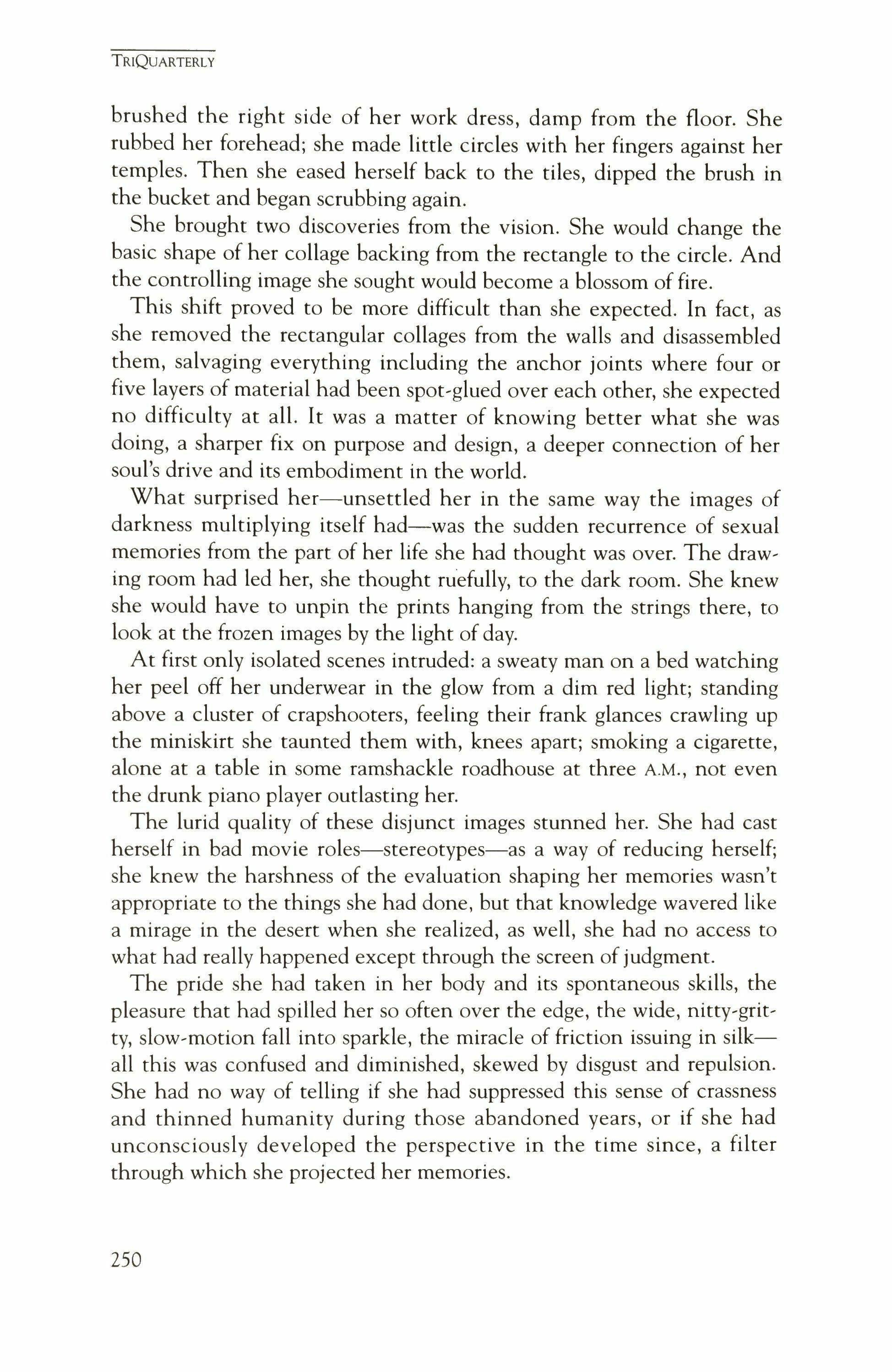
brushed the right side of her work dress, damp from the floor. She rubbed her forehead; she made little circles with her fingers against her temples. Then she eased herself back to the tiles, dipped the brush in the bucket and began scrubbing again.
She brought two discoveries from the vision. She would change the basic shape of her collage backing from the rectangle to the circle. And the controlling image she sought would become a blossom of fire.
This shift proved to be more difficult than she expected. In fact, as she removed the rectangular collages from the walls and disassembled them, salvaging everything including the anchor joints where four or five layers of material had been spot-glued over each other, she expected no difficulty at all. It was a matter of knowing better what she was doing, a sharper fix on purpose and design, a deeper connection of her soul's drive and its embodiment in the world.
What surprised her-unsettled her in the same way the images of darkness multiplying itself had-was the sudden recurrence of sexual memories from the part of her life she had thought was over. The drawing room had led her, she thought ruefully, to the dark room. She knew she would have to unpin the prints hanging from the strings there, to look at the frozen images by the light of day.
At first only isolated scenes intruded: a sweaty man on a bed watching her peel off her underwear in the glow from a dim red light; standing above a cluster of crapshooters, feeling their frank glances crawling up the miniskirt she taunted them with, knees apart; smoking a cigarette, alone at a table in some ramshackle roadhouse at three A.M., not even the drunk piano player outlasting her.
The lurid quality of these disjunct images stunned her. She had cast herself in bad movie roles-stereotypes-as a way of reducing herself; she knew the harshness of the evaluation shaping her memories wasn't appropriate to the things she had done, but that knowledge wavered like a mirage in the desert when she realized, as well, she had no access to what had really happened except through the screen of judgment.
The pride she had taken in her body and its spontaneous skills, the pleasure that had spilled her so often over the edge, the wide, nitty-gritty, slow-motion fall into sparkle, the miracle of friction issuing in silkall this was confused and diminished, skewed by disgust and repulsion. She had no way of telling if she had suppressed this sense of crassness and thinned humanity during those abandoned years, or if she had unconsciously developed the perspective in the time since, a filter through which she projected her memories.
TRIQUARTERLY
250

In a few days, the frequency and extension of such scenes multiplied. No coherence connected them other than Mariah's self,laceration; no person appeared more than once to give her a figure on which to shift her burden, to ease her blame by sharing it. The gradual increase in the number of scenes seemed a sexual experience itself, as if each specific memory were a stroke in her, deeper and swifter and more lubricious, the sequence stimulating her toward some final focus that would explode and release like orgasm.
Even in the growing anticipation of this, she admitted to herselfmore by accretion than by sudden understanding-that, for all their sweetness and elation, sometimes brutal, her orgasms had never trans' ported her in the same way her friends recounted theirs. Giving them the leeway of hyperbole, of their need for self-elevation, Mariah never felt she quite apprehended the ecstasy they described. Without their standard to measure against, she suspected she would still feel a vague disorientation, as if while walking on a path which appeared clear before her, she had snagged her skirt on a thorn.
And there had always been that distance in which she had watched herself, a bird on a wire. Until someone had told her how she just shot loose of the universe, fell apart in the stars, spread into the light of the world, Mariah had thought being a spectator at her own coming was a normal part of the experience. After a while she concluded that, for her, it was. For all her friends' wild fables of melting into the deep lavawhich she neither believed nor disbelieved, but loved for the rich appeal of their speech-she made no effort to change her way of drawing the groove to a climax.
So she was not surprised when the insistence of her memories began to fade, their frequency to diminish, the process reversing itself until, after a few days of random disruptions similar to the cinematic blips the whole series had started with, they disappeared altogether.
She realized that this two'week rush of memory recapitulated the course the years of her sexual life had followed. She had begun by experimenting, moved more by curiosity than lust-though she knew that beneath every stage of every entanglement she was searching for some, one to love her wholly, to whom she would give herself without stintand had gradually involved herself as an addict with a drug, testing the fine and deadly edges of all its illusory rapture. Then she withdrew. There had been no addiction. The bird on the wire called its image back into itself and flew away.
The ease with which Mariah had extracted herself was not matched,
TRIQUARTERLY
251

however, by those people from whom she walked away. Men sought her out, strangers and castoffs alike, taking her explanations and denialswhich grew more terse and rankling with the passing weeks and months-as just new routines of seduction and foreplay. They understood her various forms of refusal as merely covering her willingness, her yearning, much as they saw their limp foreskins as a momentary disguise over the hard proof of desire that always emerged from them.
She had cut most of that off finally by moving to the neighborhood she currently lived in, though it was shrinking, the result of urban "improvement." The shopping center where she worked sprawled over land where many of her acquaintances once carried on their lives. Yet, even now, fifteen years after the cajoling and wheedling and cursing had begun to die off-her reputation becoming a legend as separate from her as a discarded dress-she had to fend off an occasional pass.
During the period of her memories' disruption she had accomplished very little with her art, but when it was over she renewed her daily immersion; it was not that she came again to her new vision as if nothing had happened, but as if she had brought decision into what had been an accidental phase of her life. The sequence of memories struck her now as an invitation to re-enter what she had passed through, to take up a way of living she had drifted into and out of. She had endured the compressed version of her past with impatience, feeling intruded upon by another person, and had with relief and gladness repudiated it. The release she enjoyed was enhanced by her rejection of the tawdry judgment the memories had come wrapped in. She knew that whatever had caused that perspective was as dead now as the alien woman who had carried it inside her.
Once she started to draw and cut and shape again, further changes, fundamental as they were, went unnoticed.
She began to forget to change the sunflower seeds or the breadsticks at work, or someone would have to remind her to eat her lunch (which some days she neglected to pack, meaning she had to eat caf food), or an odd color or shape on the tray line would suddenly register on her eye and she would tum to find she'd put out two bins of lettuce and omitted something else. Two Fridays she missed dates for supper with Serena, not realizing it either time until Serena dropped by later to see if she was sick.
At home she would perform her Saturday-morning rounds of the apartment-now a studio--and find no dishes to wash, or at best a plate or two whose surfaces the mice had polished so thoroughly she put them back on the shelf.
TRIQUARTERLY
252

These incidental ticks were signs of a more fundamental shift. Her old way of releasing herself through physical labor-especially when it spread sensual contentment through her body, as preparing vegetables did-for the visions that promised her spiritual fulfillment, underwent a reversal. After she witnessed Jesus draw himself twelvefold into a coal, which he then consumed in the fire of his own eye, she lived in and for her visions. She let the exterior world fade, paying no attention to the messages of its former appeal which her senses still tried to relay to her.
She did notice, but only barely, as one notices the presence of an insect in the next room, that her eyesight was deteriorating. She developed small shimmers of opacity, a kind of beige glare, in the centers of both eyes, which she had to look around in order to gauge color and shape for her collages. She would cock her head, resembling a robin searching the ground, and view everything from her periphery.
Her visions changed, too, or their locations did. They didn't come to her now, as visitations entering her the way guests came to call; they resided in her, and sought instead to be released and given exterior shapes. No, not shapes, but a shape, a single incarnation encompassing the intractable extremes of darkness and brilliance, of compression and release, of depth and height, that she had become part of that Saturday as she lay moaning gently on the bathroom tiles.
So she roved her studio, an extension in all directions of the focus of her central assemblage, itself moved to the bed since the surface of the makeshift double table was no longer big enough for the scale on which Mariah engaged her conception. The edges of the circular backing spilled over the bed, which she had pulled away from the walls, rising slightly over the head and foot boards. This was the foundation piece, burgundy poster board she had glued together, whose darkness she had deepened and thickened with repeated washes of Prussian blue and forest green, eventually applying the paint in thick blobs she spread about with a kitchen knife. Unadulterated colors no longer satisfied her. She ravaged the trash bins at the shopping center, her head tilting from side to side, often in the early mornings. One day a city trash truck blared its klaxons at her. She raised herself from the stack of flattened brassiere cartons she had been bowed to and found herself surrounded by noon: she was supposed to be at the cafeteria.
A panel of velvet black covering for ad boards gave her the final dimension of richness she needed for the backing circle-the sphere of heads and one head, the farthest cup of the galaxies, the deepest cave of the earth. She spent a week on the living-room floor cutting the materi-
TRIQUARTERLY
253
TRIQUARTERLY

al into minutely narrow strips which she carried one by one, like offerings, into the bedroom and embedded into the miniature ranges of paint that had given the burgundy paperboard the appearance of a relief map. Looking at the result as a dawn filtered through her bedroom window, she saw its light fall effortlessly forever into the subtle gradations of midnight she had blended, seeming at once to be absorbed into an immeasurable depth and to be generated there as well.
Another month and she had almost achieved the eye-sun, a concatenation of shreds of cotton and aluminum wound inextricably together in a frayed circle concentric with, and glued to, the darkness surrounding it. Over this tangle of strips and coils and spirals she trickled gold house paint from two quart cans she had had mixed at the hardware store, the same day she'd gotten the tin snips for the aluminum scraps. The boy who had waited on her had kept his distance and spoken deliberately, as if he thought she was an alien child, or deranged, a madwoman who might go berserk suddenly if he made the wrong move.
She hadn't blamed him for this once she looked at herself in the bathroom mirror when she got home. Her dress, with its speckles of paint and little bits of scrap paper stuck randomly about, resembled one of her early collages. Above it, her face repeated the impression, more flamboyantly because of the smears of paint on her cheeks and forehead where she had drawn her hand across them, brushing her straggling hair aside, or trying somehow to wipe away the blind spots in her eyes. By now the spots had enlarged so much she had to aim her head at the corner of the bathroom, forcing herself to focus there, before she could see her face, poorly, in the mirror.
"Clown," she said aloud. "Nothing but a clown."
But her eyes burned with another name. She felt it stall in her chest before it could rise and form a growl in her throat. The precise expression evaded her, but when she gave into the muscular pressure of years of habit and looked directly at her reflection, it seemed for an instant she had set the beige opacities into two wells of molten flame.
She went back to her art as if she'd seen nothing.
She spent a sleepless night on the floor beside the bed, while the gold paint she had dripped on the central tangle of aluminum and cloth dried. It formed a complex threaded overlay, some of which sagged like miniature power lines into the gaps between the thin coils of metal. When she had fitted the top of the can into its paint-clogged groove she had thought she was finished, but something nagged at her and pushed her away, alternately making her want to stare a hole through this
254
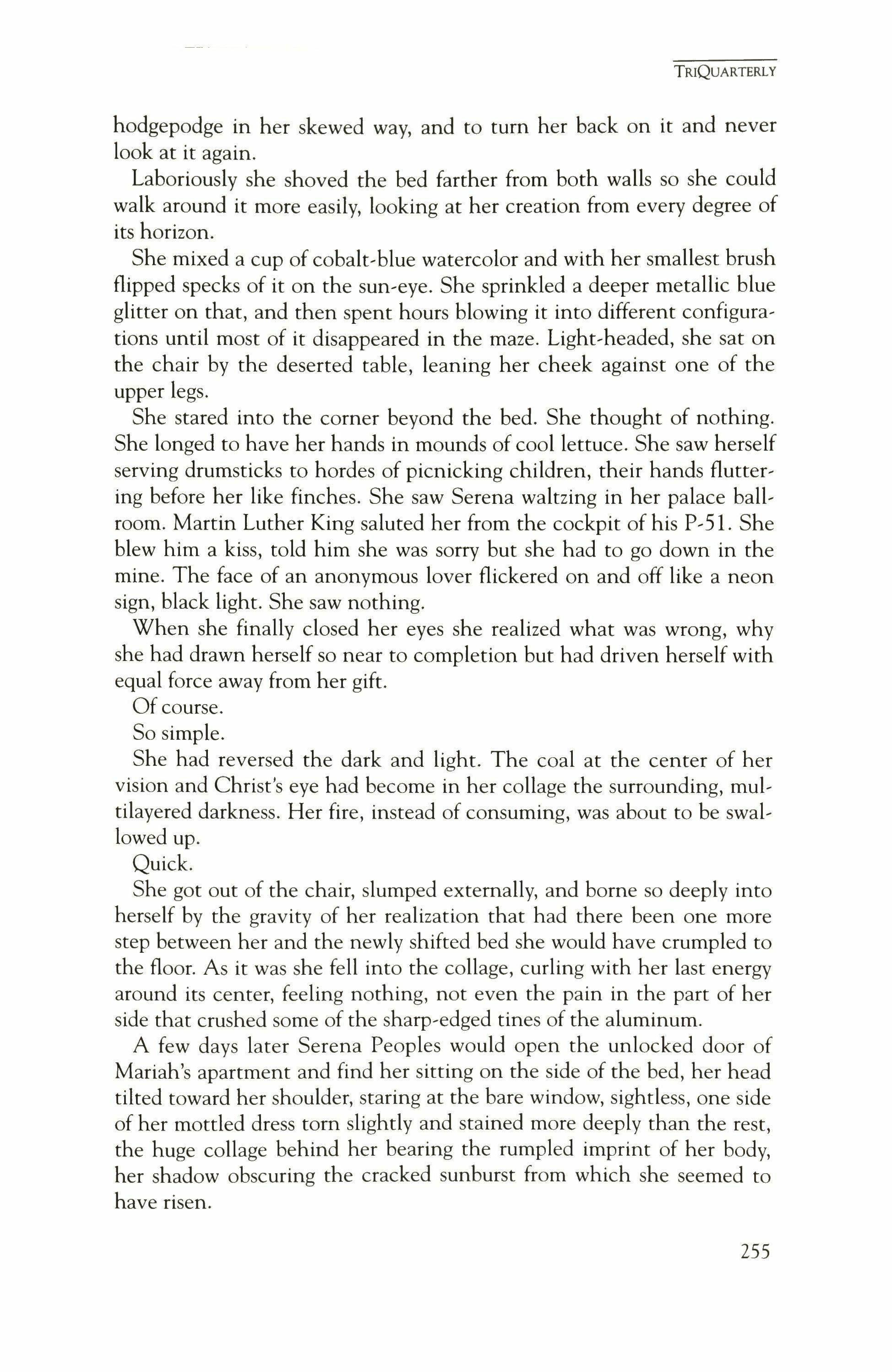
hodgepodge in her skewed way, and to turn her back on it and never look at it again.
Laboriously she shoved the bed farther from both walls so she could walk around it more easily, looking at her creation from every degree of its horizon.
She mixed a cup of cobalt-blue watercolor and with her smallest brush flipped specks of it on the sun-eye. She sprinkled a deeper metallic blue glitter on that, and then spent hours blowing it into different configurations until most of it disappeared in the maze. Light-headed, she sat on the chair by the deserted table, leaning her cheek against one of the upper legs.
She stared into the corner beyond the bed. She thought of nothing. She longed to have her hands in mounds of cool lettuce. She saw herself serving drumsticks to hordes of picnicking children, their hands fluttering before her like finches. She saw Serena waltzing in her palace ballroom. Martin Luther King saluted her from the cockpit of his P - 51. She blew him a kiss, told him she was sorry but she had to go down in the mine. The face of an anonymous lover flickered on and off like a neon sign, black light. She saw nothing.
When she finally closed her eyes she realized what was wrong, why she had drawn herself so near to completion but had driven herself with equal force away from her gift.
Of course.
So simple.
She had reversed the dark and light. The coal at the center of her vision and Christ's eye had become in her collage the surrounding, multilayered darkness. Her fire, instead of consuming, was about to be swallowed up.
Quick.
She got out of the chair, slumped externally, and borne so deeply into herself by the gravity of her realization that had there been one more step between her and the newly shifted bed she would have crumpled to the floor. As it was she fell into the collage, curling with her last energy around its center, feeling nothing, not even the pain in the part of her side that crushed some of the sharp-edged tines of the aluminum.
A few days later Serena Peoples would open the unlocked door of Mariah's apartment and find her sitting on the side of the bed, her head tilted toward her shoulder, staring at the bare window, sightless, one side of her mottled dress torn slightly and stained more deeply than the rest, the huge collage behind her bearing the rumpled imprint of her body, her shadow obscuring the cracked sunburst from which she seemed to have risen.
TRIQUARTERLY
255
Two Poems
Yannis Ritsos
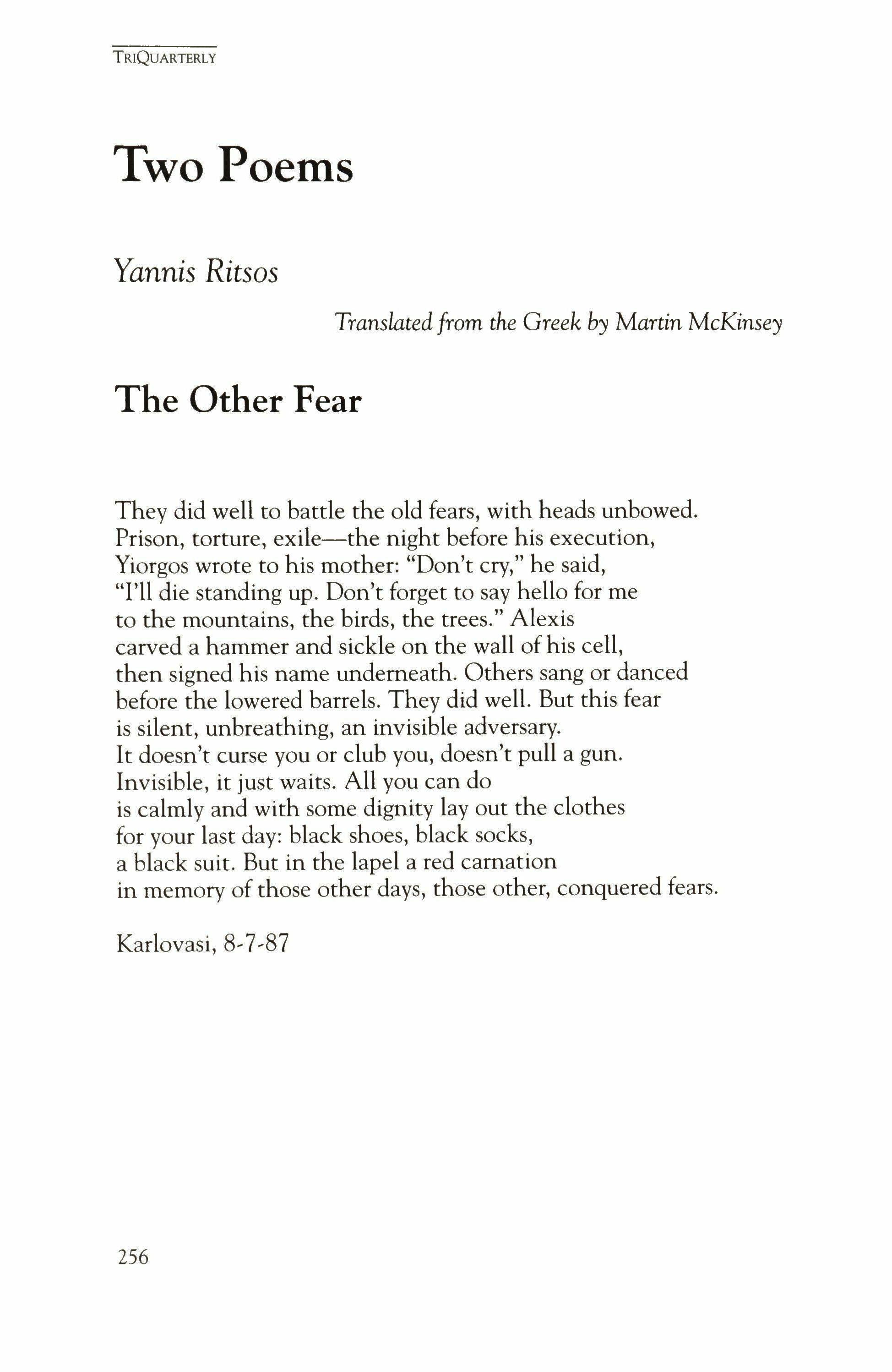
Translated from the Greek by Martin McKinsey
The Other Fear
They did well to battle the old fears, with heads unbowed. Prison, torture, exile-the night before his execution, Yiorgos wrote to his mother: "Don't cry," he said, "I'll die standing up. Don't forget to say hello for me to the mountains, the birds, the trees." Alexis carved a hammer and sickle on the wall of his cell, then signed his name underneath. Others sang or danced before the lowered barrels. They did well. But this fear is silent, unbreathing, an invisible adversary. It doesn't curse you or club you, doesn't pull a gun. Invisible, it just waits. All you can do is calmly and with some dignity layout the clothes for your last day: black shoes, black socks, a black suit. But in the lapel a red carnation in memory of those other days, those other, conquered fears.
Karlovasi, 8�7�87
TRIQUARTERLY
256

On Silence
It is precisely the things you never said that pumped blood into the words you did say, that hung suspended in air, equivocal, opaque-notes from some dark music out of the future. Now, you have nothing to say because you have nothing to hide. Silence muscles you out of things-so you eavesdrop on the mating cry of motorcycles out on the coast road, you hear the whistles of the Samena, the lkaros, the Aegean as they depart, night and day, in rough seas and calm, their final destination that vast, unlighted anchorage.
Karlovasi, 8�7�87
TRIQUARTERLY
257
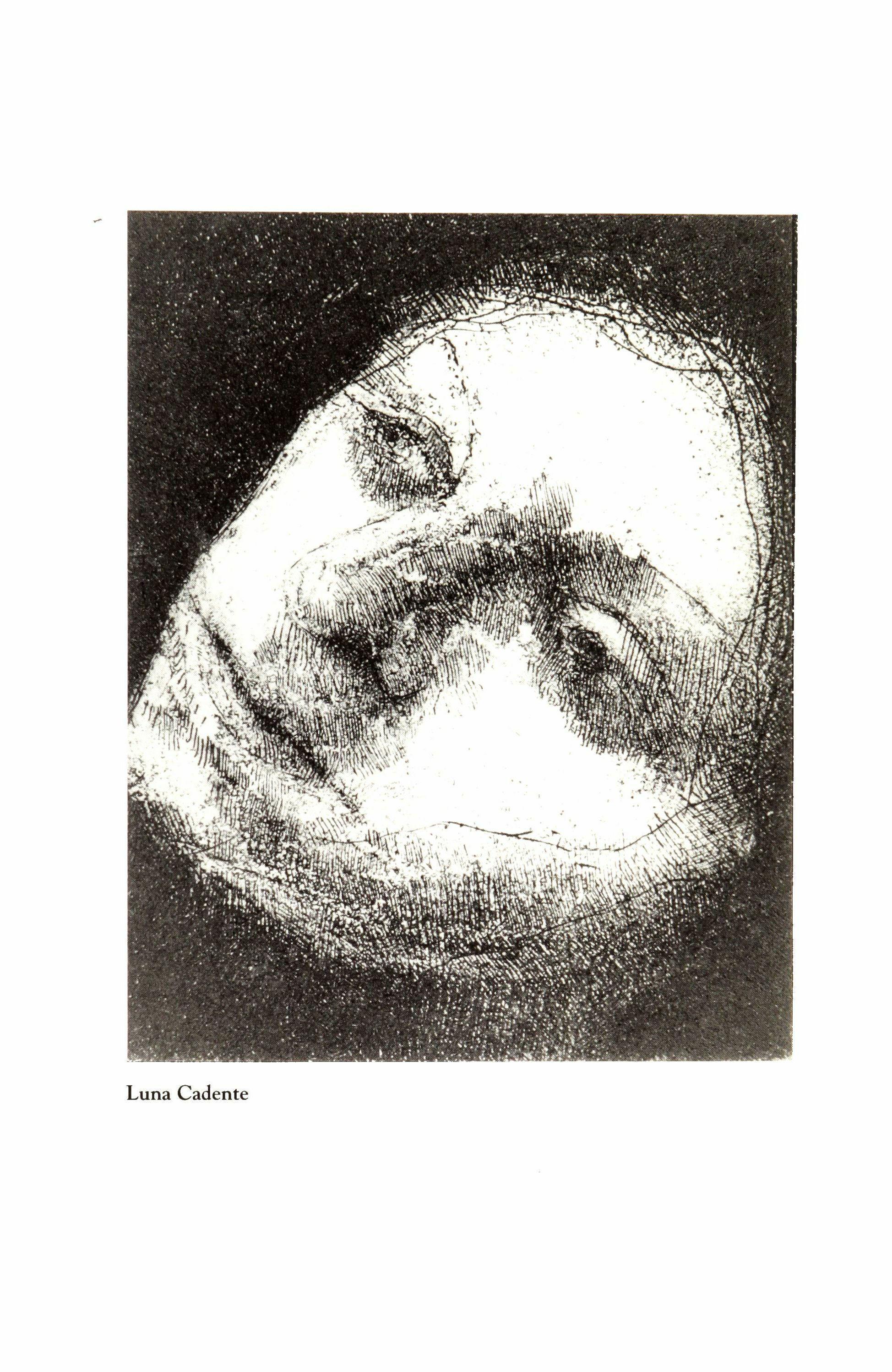 Luna Cadente
Luna Cadente
Contributors
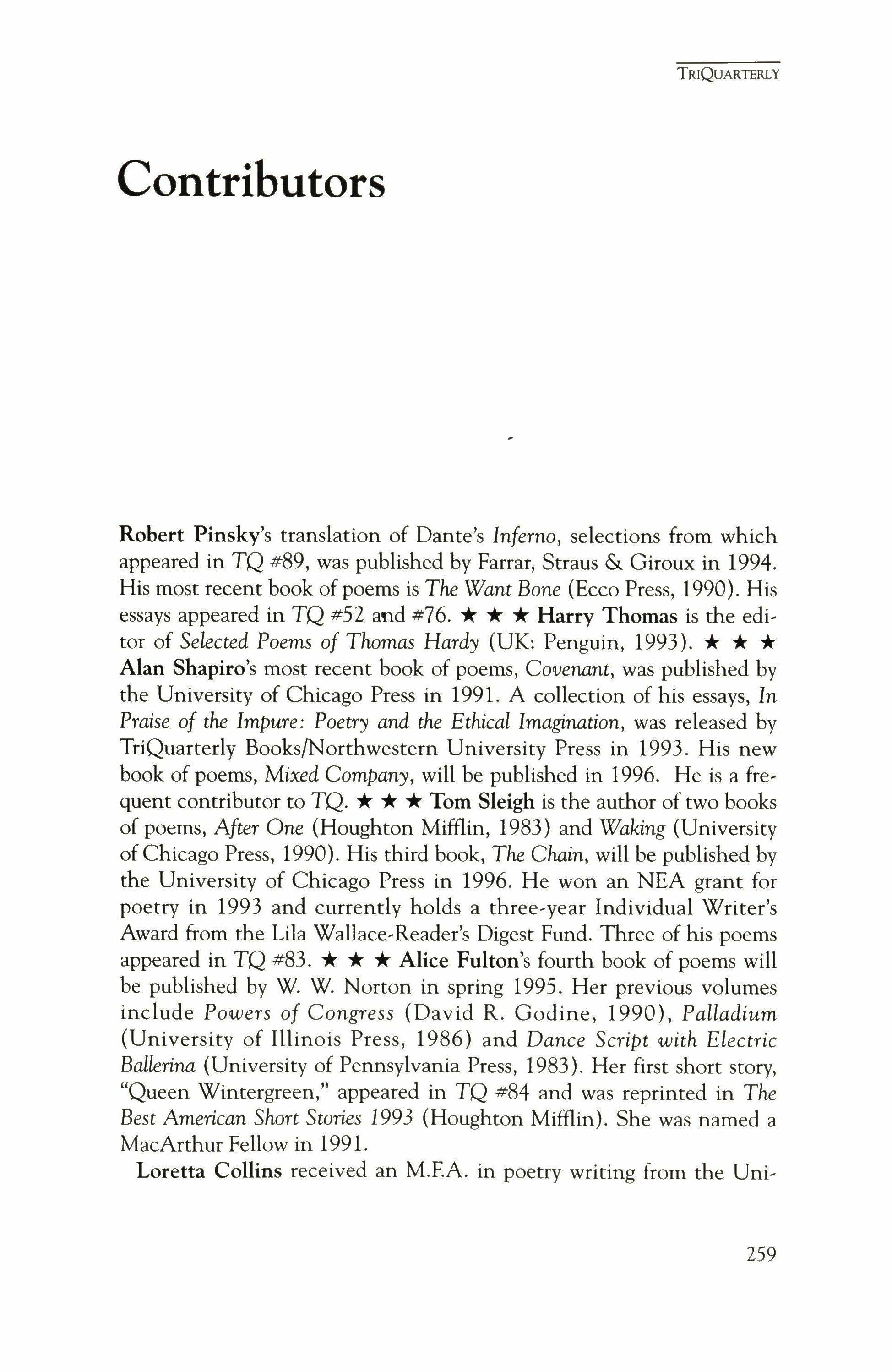
Robert Pinsky's translation of Dante's Inferno, selections from which appeared in TQ #89, was published by Farrar, Straus & Giroux in 1994. His most recent book of poems is The Want Bone (Ecco Press, 1990). His essays appeared in TQ #52 and #76. * * * Harry Thomas is the editor of Selected Poems of Thomas Hardy (UK: Penguin, 1993). * * *
Alan Shapiro's most recent book of poems, Covenant, was published by the University of Chicago Press in 1991. A collection of his essays, In Praise of the Impure: Poetry and the Ethical Imagination, was released by TriQuarterly Books/Northwestern University Press in 1993. His new book of poems, Mixed Company, will be published in 1996. He is a frequent contributor to TQ. * * * Tom Sleigh is the author of two books of poems, After One (Houghton Mifflin, 1983) and Waking (University of Chicago Press, 1990). His third book, The Chain, will be published by the University of Chicago Press in 1996. He won an NEA grant for poetry in 1993 and currently holds a three-year Individual Writer's Award from the Lila Wallace-Reader's Digest Fund. Three of his poems appeared in TQ #83. * * * Alice Fulton's fourth book of poems will be published by W. W. Norton in spring 1995. Her previous volumes include Powers of Congress (David R. Godine, 1990), Palladium (University of Illinois Press, 1986) and Dance Script with Electric Ballerina (University of Pennsylvania Press, 1983). Her first short story, "Queen Wintergreen," appeared in TQ #84 and was reprinted in The Best American Short Stories 1993 (Houghton Mifflin). She was named a MacArthur Fellow in 1991.
Loretta Collins received an M.F.A. in poetry writing from the Uni-
TRIQUARTERLY
259

versity of Iowa Writers' Workshop, where she is currently a Ph.D. candidate in Twentieth Century American and Caribbean literature. Her poems have appeared in the Antioch Review, the Missouri Review, the Black Warrior Review, Quarterly West and other journals. * * * Jason Sommer is the author of a book of poems, Lifting the Stone (Forest Books, 1991). He teaches literature and writing at Fontbonne College, in St. Louis. * * * Ira Sadoff is the author of The Ira Sadoff Reader (University Press of New England, 1992) and of New and Selected Poems, which will be published by David R. Godine in 1996. He teaches at Colby College and in the M.F.A. in Writing Program at Warren Wilson College. * * * David Rivard's first book of poems, Torque (University of Pittsburgh Press, 1988), received the Agnes Lynch Starrett Poetry Prize. He teaches at Tufts University and in the M.F.A. in Writing Program at Vermont College. * * * Cathleen Calbert's poems have appeared in the Nation, the New Republic, the North American Review and Poetry Northwest, and are forthcoming in Feminist Studies and the Paris Review. * * * David Barber's poems have appeared in the Paris Review, Poetry, the New Republic, the Gettysburg Review, Pamassus and other journals. * * * Billy Collins's most recent collection of poems is Questions About Angels (William Morrow, 1991), which was a selection in the National Poetry Series. He received a Guggenheim Fellowship for 1993-94.
Laura Newbern recently received her M.F.A. in Writing from Warren Wilson College. "The Walking Stick" is part of her manuscript-inprogress, Love and the Eye. * * * Kathleene West's most recent books are Water Witching (Copper Canyon Press, 1984) and The Farmer's Daughter (Sandhills Press, 1989). She is an associate professor of English at New Mexico State University, Las Cruces. * * * Meredith Bergmann is an artist and writer who lives in New York City. She writes regularly for the New York Review of Art, and her sculpture, in addition to having been exhibited widely, appears in several corporate and private collections. She is currently at work on several sculpture projects, including a memorial to the poet Countee Cullen for Woodlawn Cemetery, in New York City. * * * Charles Wells is a carver of stone and wood, henge builder, and etcher who lives in the Delaware Valley. The winner of the Prix de Rome in 1964, he spent more than ten years in Italy, working in Pietrasanta, in the marble district of Tuscany. His work appears in several public collections, including the National Museum of American Art, the Library of Congress, the Whitney Museum, and the Massachusetts Institute of Technology. * * * David
TRIQUARTERLY
260
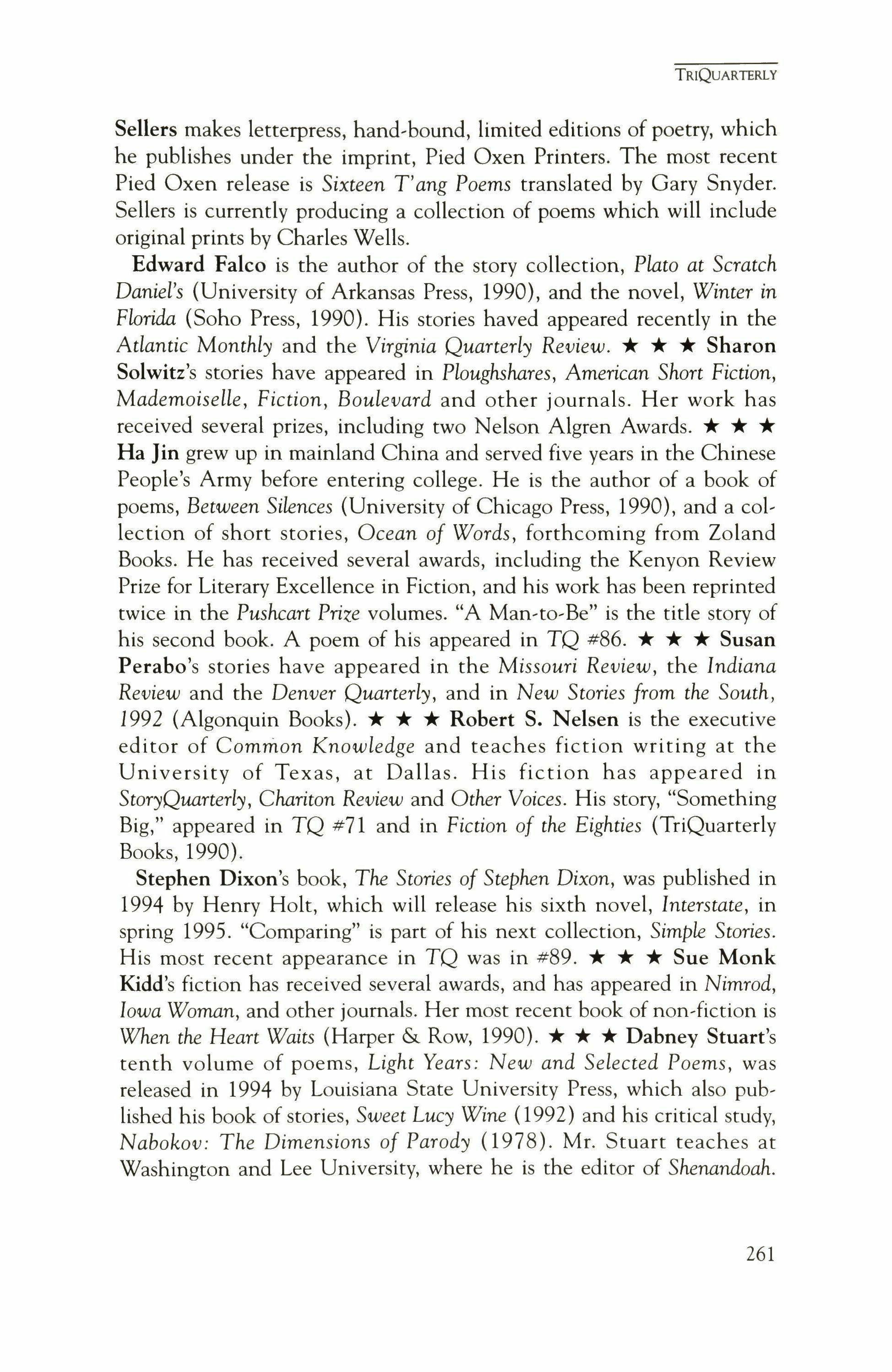
Sellers makes letterpress, hand-bound, limited editions of poetry, which he publishes under the imprint, Pied Oxen Printers. The most recent Pied Oxen release is Sixteen T'ang Poems translated by Gary Snyder. Sellers is currently producing a collection of poems which will include original prints by Charles Wells.
Edward Falco is the author of the story collection, Plato at Scratch Daniel's (University of Arkansas Press, 1990), and the novel, Winter in Florida (Soho Press, 1990). His stories haved appeared recently in the Atlantic Monthly and the Virginia Quarterly Review. * * * Sharon Solwitz's stories have appeared in Ploughshares, American Short Fiction, Mademoiselle, Fiction, Boulevard and other journals. Her work has received several prizes, including two Nelson Algren Awards. * * * Ha Jin grew up in mainland China and served five years in the Chinese People's Army before entering college. He is the author of a book of poems, Between Silences (University of Chicago Press, 1990), and a col, lection of short stories, Ocean of Words, forthcoming from Zoland Books. He has received several awards, including the Kenyon Review Prize for Literary Excellence in Fiction, and his work has been reprinted twice in the Pushcart Prize volumes. "A Man-to-Be" is the title story of his second book. A poem of his appeared in TQ #86. * * * Susan Perabo's stories have appeared in the Missouri Review, the Indiana Review and the Denver Quarterly, and in New Stories from the South, 1992 (Algonquin Books). * * * Robert S. Nelsen is the executive editor of Comriwn Knowledge and teaches fiction writing at the University of Texas, at Dallas. His fiction has appeared in StoryQuarterly, Chariton Review and Other Voices. His story, "Something Big," appeared in TQ #71 and in Fiction of the Eighties (TriQuarterly Books, 1990).
Stephen Dixon's book, The Stories of Stephen Dixon, was published in 1994 by Henry Holt, which will release his sixth novel, Interstate, in spring 1995. "Comparing" is part of his next collection, Simple Stories. His most recent appearance in TQ was in #89. * * * Sue Monk Kidd's fiction has received several awards, and has appeared in Nimrod, Iowa Woman, and other journals. Her most recent book of non-fiction is When the Heart Waits (Harper & Row, 1990). * * * Dabney Stuart's tenth volume of poems, Light Years: New and Selected Poems, was released in 1994 by Louisiana State University Press, which also pub, lished his book of stories, Sweet Lucy Wine (1992) and his critical study, Nabokov: The Dimensions of Parody (1978). Mr. Stuart teaches at Washington and Lee University, where he is the editor of Shenandoah.
TRIQUARTERLY
261
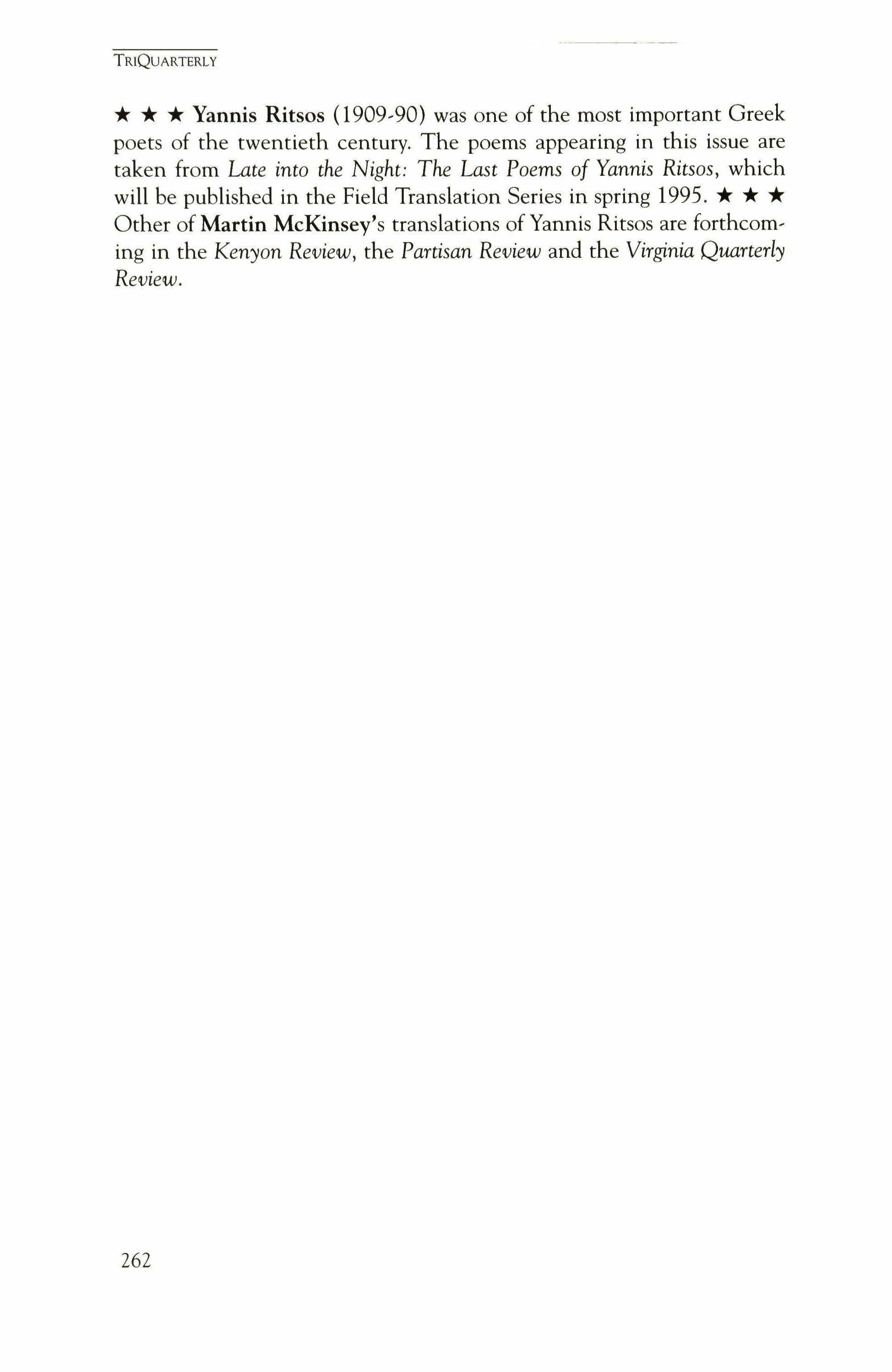
* * * Yannis Ritsos (1909-90) was one of the most important Greek poets of the twentieth century. The poems appearing in this issue are taken from Late into the Night: The Last Poems of Yannis Ritsos, which will be published in the Field Translation Series in spring 1995. * * * Other of Martin McKinsey's translations of Yannis Ritsos are forthcoming in the Kenyon Review, the Partisan Review and the Virginia Quarterly Review.
TRIQUARTERLY
262

On October 31, 1994, TriQuarterly-among many others here and in South Africa-lost an irreplacable friend when Elkin Sithole died in an American Eagle plane crash in northwest Indiana.
A South African of the Zulu tribe, the sixty-three-year-old Sithole was a renowed ethnomusicologist at Northeastern Illinois University and the composer of over thirty songs; he also wrote a book of Zulu poems and a book of Zulu praise and family names. According to Conrad Worrill, chairman of Northeastern's Department of Inner City Studies, "Sithole was the godfather, the grandfather and the high priest of most South African students who came to this country, particularly those who came close to the Midwest."
Just a week before his death, Sithole's sabbatical request to work with Nelson Mandela's government on a plan to reorganize the country's higher-education music programs had been approved. Less than a month before that, Sithole (along with South African writer Tony Eprile) appeared at a reading and performance event co-sponsored by TriQuarterly and the Mary and Leigh Block Gallery at Northwestern University. With a drum and record player to assist him, he sang, danced, and recited poems in English and Zulu, demonstrating a range of poetry far wider than most of his audience had expected. Elkin Sithole was an extraordinary cultural resource and a person of great energy, talent and humanity.
Spoleto Writers' Workshop '95
JULY 21 TO AUGUST 1, 1995
Spoleto, Italy �
FICTION & CREATIVE NONFICTION: ROSELLEN BROWN
NOVELIST, ESSAYIST, POET
POETRY: REGINALD GIBBONS POET, NOVELIST & EDITOR,TRIQUARTERLY MAGAZINE
�
One of America's most gifted teachers and one of the foremost literary editors join to present an intense, small-scale workshop like no other. Set in the magical Umbrian region of Italy, workshop and writing sessions focus on craft, reading and writing, and the writer's vocation. Lodging in a 15th-century convent or local pensions, superb eating and optional Italian language classes. Concurrent programs in voice and flute.
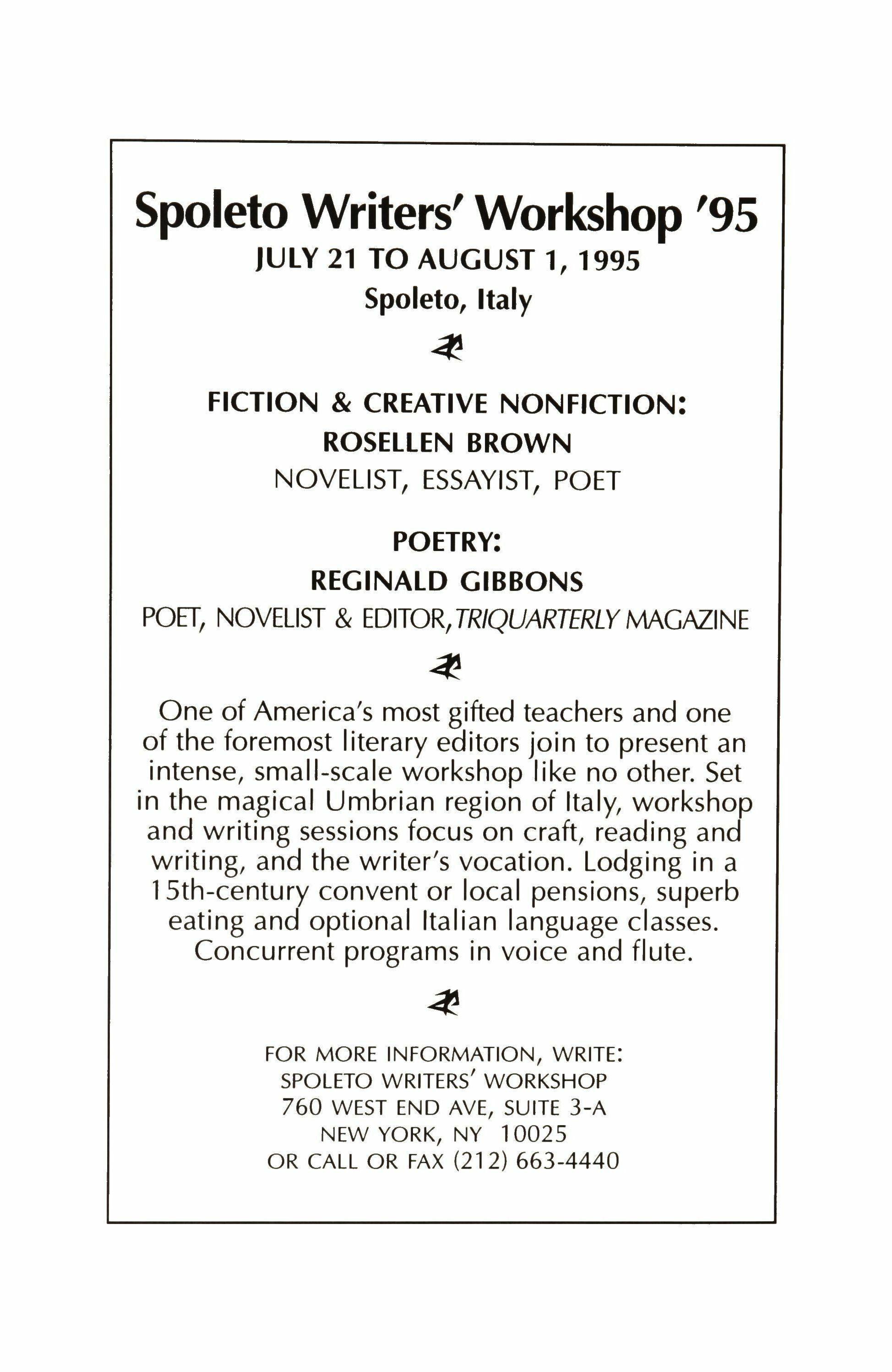
FOR MORE INFORMATION, WRITE: SPOLETO WRITERS' WORKSHOP
760 WEST END AVE, SUITE 3-A NEW YORK, NY 10025 OR CALL OR FAX (212) 663-4440
THE PUSHCART PRIZE XIX
 EDITED
EDITED
BY
BILL HENDERSON WITH
THE
EDITORS
"It's hard not to get too excited about the latest enormous volume of the best of the noncommercial world of short stories, poetry and essays a surprising, vital collection that should hearten all serious readers."
Kirkus Reviews
"It just keeps getting bigger (630 pages) and better this collection is more than just a recommended purchase. It's mandatory."
Library Journal
"A truly remarkable collection small presses continue to be a bastion of excellence in the increasingly sloppy world of commercial publishing.
Booklist
"Pushcart's nineteenth anthology from a year's worth of American small press publishing is striking in its literary breadth and accomplishment There is so much to choose from here that readers may not want to choose at all-they can just read on and on."
Publishers Weekly (starred review)
PUSHCART PRIZE
630 PAGES $29.50 HARDBOUND JUST PUBLISHED PUSHCART PRESS P.O. BOX 380 WAINSCOlT, N Y. 11975 1994 1995 BEST OF THE SMALL
PRESSES
An
Audio Series on American Poets and Their Art
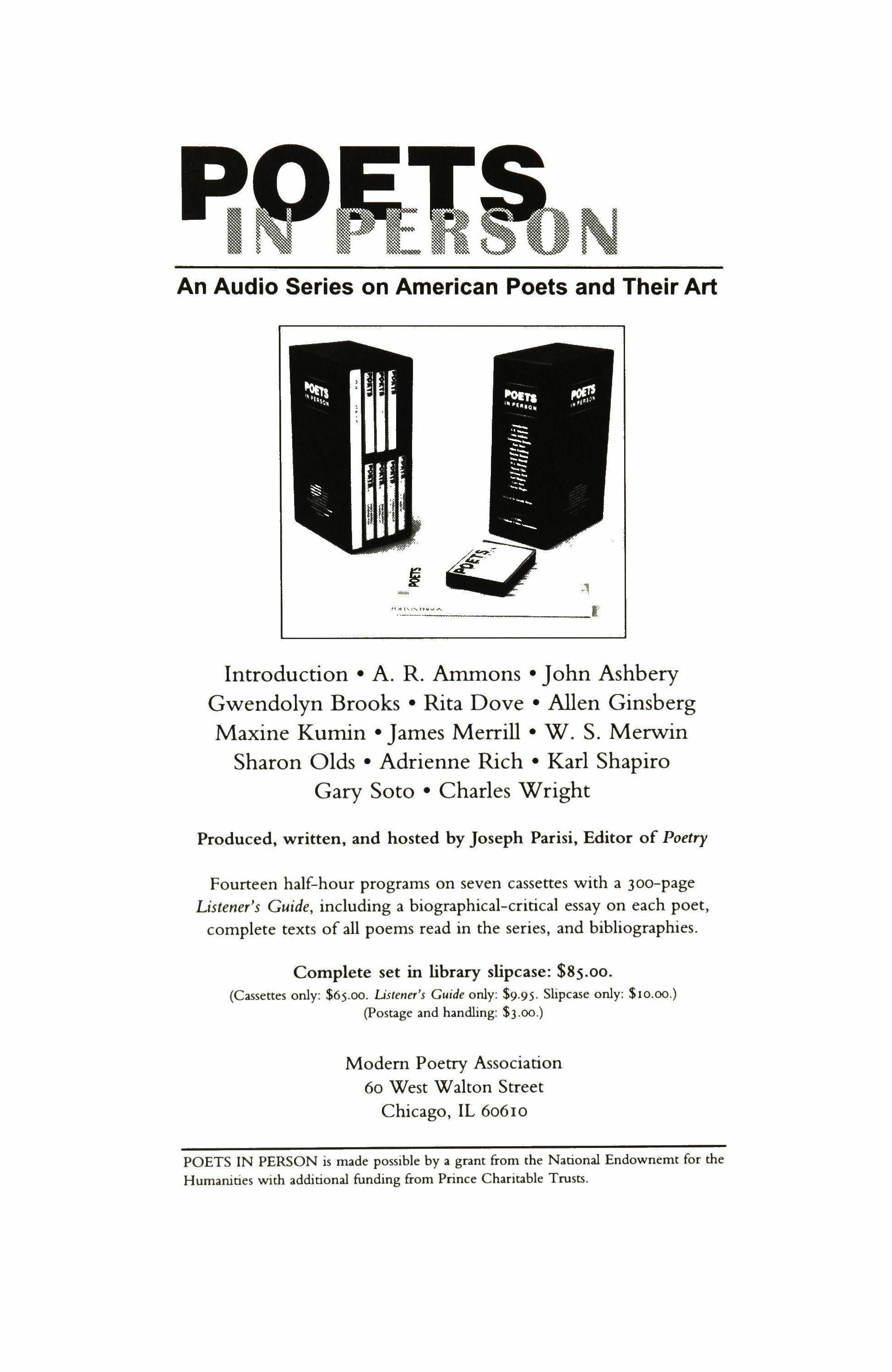
., l
Introduction A. R. Ammons John Ashbery
Gwendolyn Brooks Rita Dove Allen Ginsberg
Maxine Kumin James Merrill W. S. Merwin
Sharon Olds • Adrienne Rich Karl Shapiro
Gary Soto Charles Wright
Produced, written, and hosted by Joseph Parisi, Editor of Poetry
Fourteen half-hour programs on seven cassettes with a joo-page Listener's Guide, including a biographical-critical essay on each poet, complete texts of all poems read in the series, and bibliographies.
Complete set in library slipcase: $85.00.
(Cassettes only: $65.00. Listener's Guide only: $9.95. Slipcase only: $10.00.) (postage and handling: $3.00.)
Modem Poetry Association
60 West Walton Street Chicago, IL 60610
POETS IN PERSON is made possible by a grant from the National Endownemt for the Humanities with additional funding from Prince Charitable Trusts.
continues to make history
1�,9ETRy
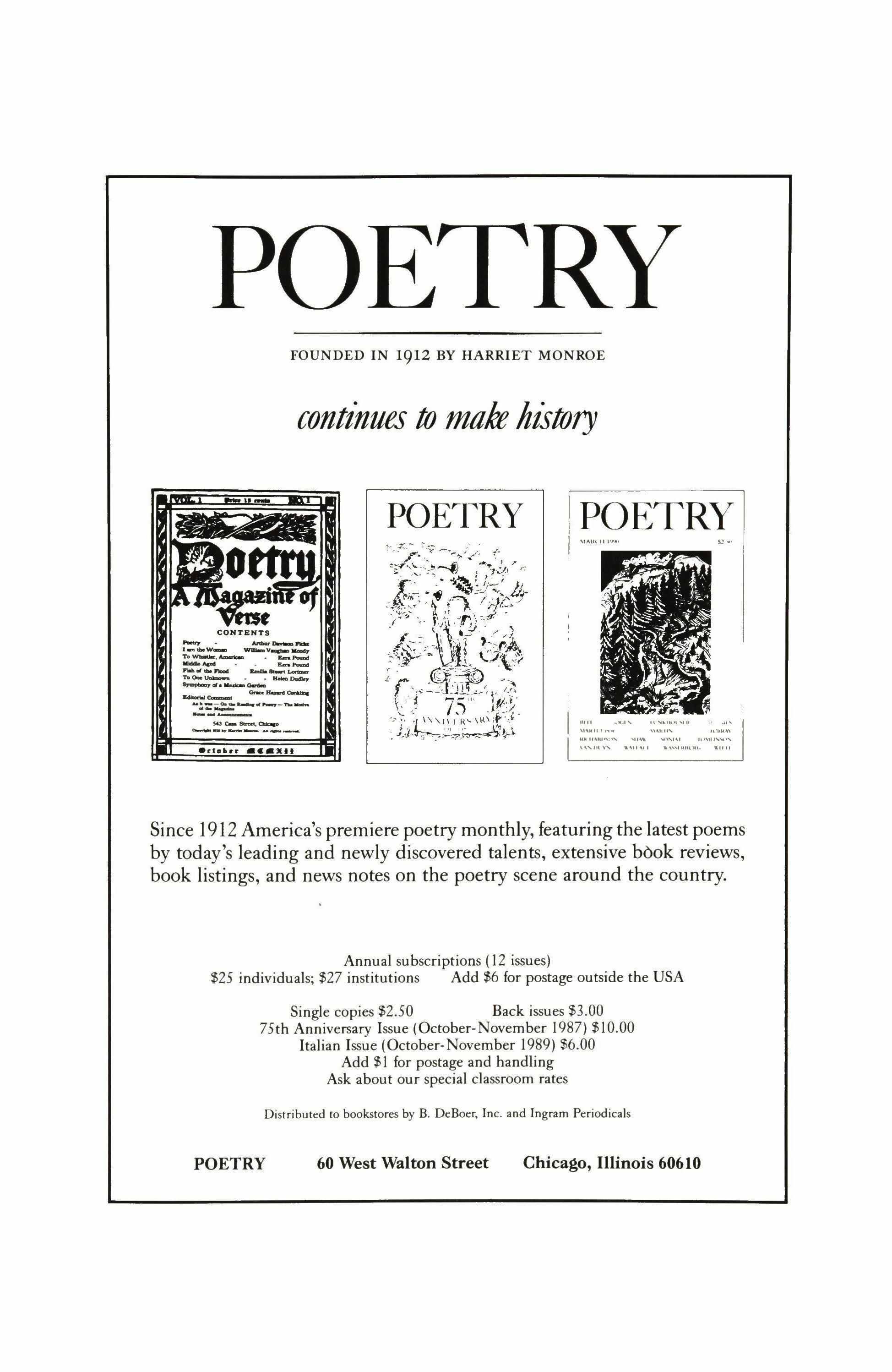
Since 1912 America's premiere poetry monthly, featuring the latest poems by today's leading and newly discovered talents, extensive book reviews, book listings, and news notes on the poetry scene around the country.
Annual subscriptions (12 issues) $25 individuals; $27 institutions Add $6 for postage outside the USA
Single copies $2.50 Back issues $3.00 75th Anniversary Issue (October-November 1987) $10.00 Italian Issue (October-November 1989) $6.00 Add $1 for postage and handling Ask about our special classroom rates
Distributed to bookstores by B. DeBoer, Inc. and Ingram Periodicals
IN 1912 BY HARRIET
POETRY FOUNDED
MONROE
CONTENTS ��I_",,"W_ "'_v_.........,. 'T'>_.� _PvaDd --_ PIIoIofll _1IIun� TIroo...,......... �o.ao,. �"'.�a.KdborWC-�CIInkIIoc ::.�-== .__fto_ -= '=-��Xlt
�..:_v.
POETRY
West Walton Street Chicago, Illinois 60610
60
The Prose Poem
AN INTERNATIONAL JOURNAL
THE CHURCH OF INSOMNIA
The huge congregation is in the dark. The altaris a bedwith a canopy. The minister reads by candlelighttheworksofJonathan Edwards. Ifyou listen hard you'll hear pages being turned, the ash of his cigarette falling into the abyss. The cat with the mouse in its mouth issimplypassing through.
- Charles Simic
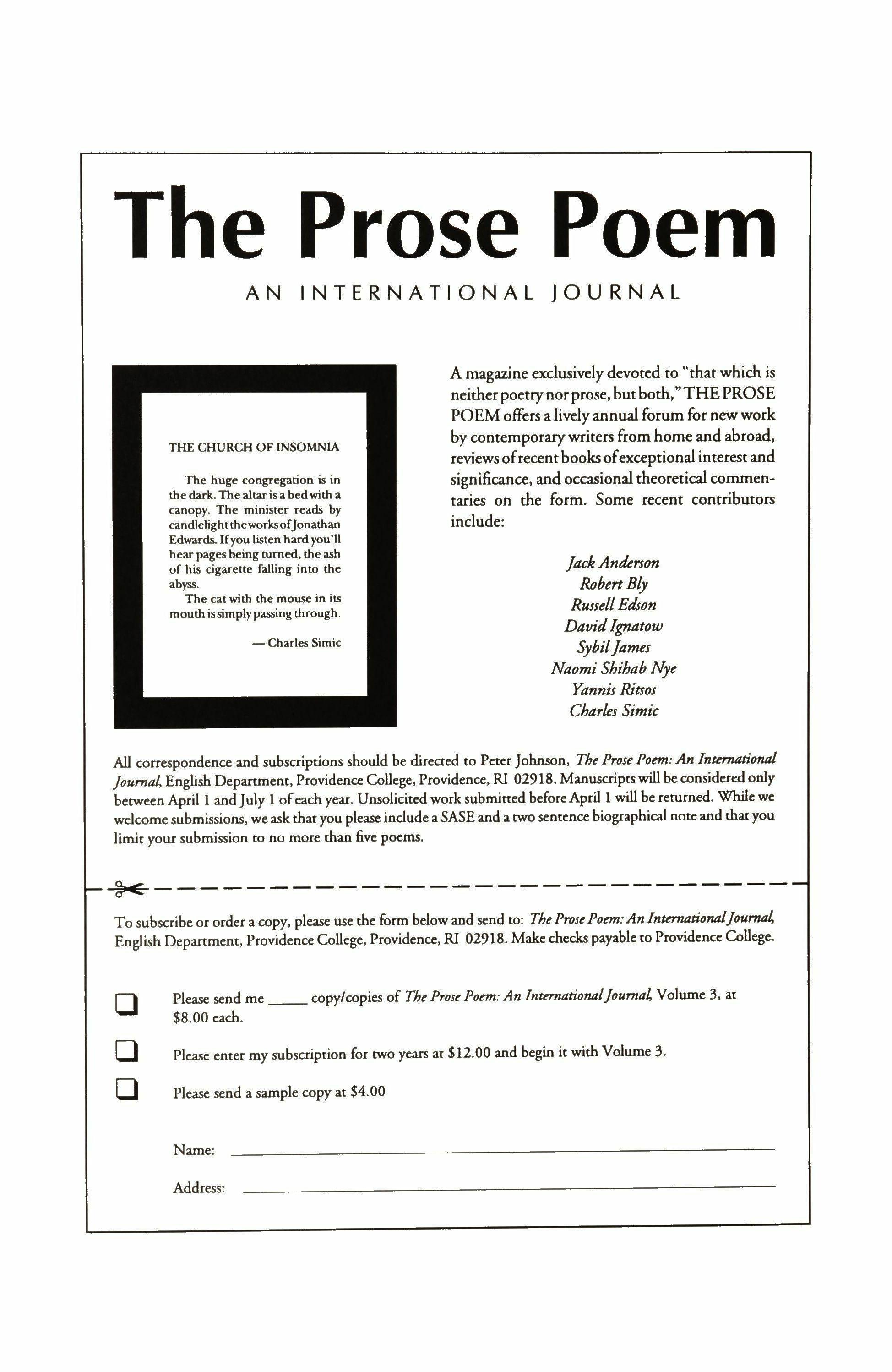
A magazine exclusively devoted to "that which is neitherpoetry nor prose, butboth,"THEPROSE POEM offers a lively annual forum for new work by contemporary writers from home and abroad, reviewsofrecent booksofexceptional interestand significance, and occasional theoretical commentaries on the form. Some recent contributors include:
JackAnderson
Robert Ely
RussellEdson
DavidIgnatow
SybilJames
Naomi Shihab Nye
Yannis Ritsos
Charles Simic
All correspondence and subscriptions should be direcred to Peter Johnson, The Prost! Poem: An International Journal, EnglishDepartment, ProvidenceCollege, Providence, Rl 02918. Manuscriptswill be consideredonly between April 1 and July 1 ofeach year. Unsolicited work submitted beforeApril 1 will be returned. While we welcome submissions, we ask that you please include a SASE and a two sentence biographical note and that you limit your submission to no more than five poems.
To subscribe or order a copy, please use the form below and send to: ThePrasePoem:An Internationalfoumal; English Department, Providence College, Providence, RI 02918. Make checks payable to Providence College.
o Please send me copy/copies of The Prose Poem: An Intemationalfoumal; Volume 3, at $8.00 each.
o
o Please enter my subscription for two years at $12.00 and begin it with Volume 3.
Please send a sample copy at $4.00
Name:
Address:
�----------------------------
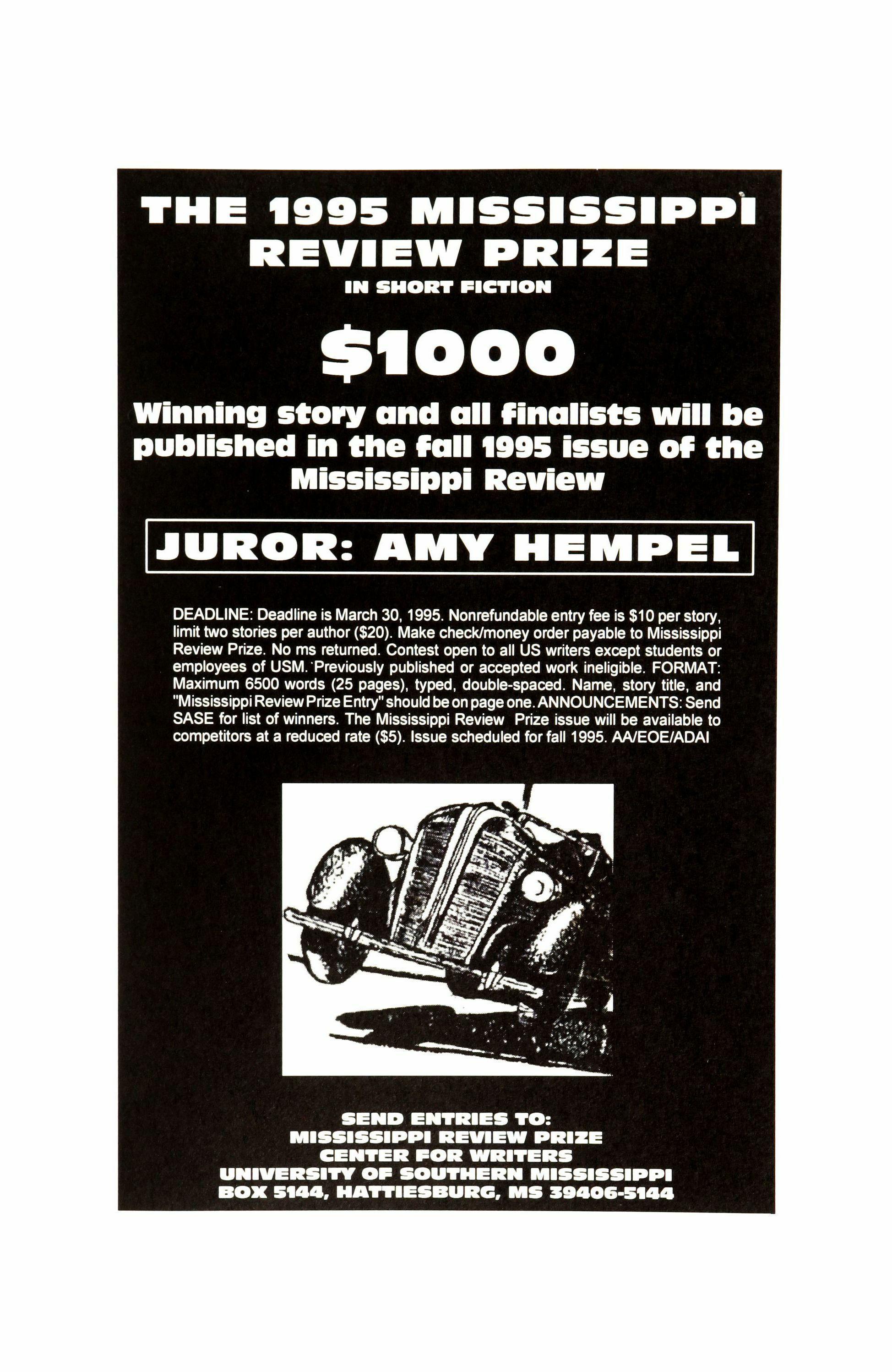
A.Hecht
R.
Hochman
QRL announces its
Anniversary Anthology
Quarterly Reviewof Literature -se
High notes from the past, New poems from the present
With new poems by QRL's Poetry Book Series' winners-and from the greatest voices ofQRL's acclaimed past-the Fiftieth Anniversary Volume is a landmark of our literary times.
"A national treasure.. QRL's dazzling roster of writers is a tribute to their unerring eye for talent and their pursuit of excellence. But though committed to bringing the rich catholicity of American voices to QRL's pages, the editors were never parochial in their leanings. They scouted the world of letters to showcase writers from Kafka and Celine to Celan and Mistral."
=Pamassus
"The Weisses were assiduous in publishing not only writers like Stevens, Williams, cummings, and M. Moore, but a great many of their younger, utterly unknown successors as well. The truth is, it was largely in magazines like QRL that much of the literature now studied as a matter of course in colleges and universities first appeared."
-The New York Times
NEW POEMS
• 0 I',

Warren Carrier
Anne Carson
NaomiOark
Reuel Denney
Nancy Esposito
B. H. Fairchild
David Galler II
Frederick Feirstein
Jane Flanders
Jeanne Foster
"The roster of young, little known writers presented in its early days reads like a page from a Who's Who of Modern American Literature."
-Poets and Writers
"The editors, whose eclectic international taste is to be commended, continue their search for the best in poetry." They now print 4-6 poetry books under one cover each year.
-Library Journal
One of QRL's prize-winning poetry books was a "Favorite book of the year. QRL publishes book-length manusripts and pays authors real money." ($1000 and 100 books!)-The Village Voice
For I1UlI1USCript submission information, send SASE.
QRL 50th Anniversary - $20 26 Haslet Ave. Princeton, NJ 08540
Jean Nordbaus
Joseph Powell
Reg Saner
Peter Stambler
Levertov
Lieberman
Lowell \Iandelslam
\lallhe"'s \lerrill \Ierlon \luwin \liddlelon \liles \lonlale \1. Moore
R. !\Ioore \lorris \loss
Xathan :"emerov Orlovitz Paslan
Patchen
Peck
Perse Piccolo Plalh
Plumley Ponge
Pound Rakosi Rexroth
Rich
Rosenthal Rudnik
Schubert
Seferis
Sexton
Shapiro
Simon
Simpson Sitwell
Snodgrass
Solzhenitsyn
Stafford
Stevens
Strand
Swenson
Tale
Tomlinson
L'rdang
Valery Van DU)'n Walkins
ry Kramer
dine C. Uttle
Sidney Sulkin
Brian Swann
W. Szymborska
Phyllis ompson
Jeanne Walker
Weiss Whihnan Wilhur
Williams Wrighl Zukofsky
(rom QRL'S PAST: Amichai Ammons Andrade Ashbery Belill Benedikt Benn Bishop Bly Bobrowski Carruth Cavafy Ct'lan Char cummings Davit' Deutch Dickey Duncan Eaton Ebuhardt Engels Enslin
Enzt'nsbt'rger Essenin
Fagt'ls Finkel FOll Gardien
Garrigue Golffing Goll Graham Gregor
Heath Stubbs
Gregory Harper
Hecht
Hoskins Howard Hughes
(gnato", Jarrell Jacob Kaufman Kinnell
Kinr Koch Kot'tht' Kunze Laughlin
Hugo
Kinst'11a
Fiftieth
:. : �.
JACK KEROUAC IS PREGNANT
stories
by Aurelie Sheehan
"Dramatic collisions of images, swerving versions of what is called 'the truth,' and audacious shifts in tone make Aurelie Sheehan's debut collection of stories something exhilarating to read, extraordinary to hold inside."
-Carole Maso

"Jack Kerouac Is Pregnant is a marvelous introduction to Aurelie Sheehan's musical, muscular prose. She writes about the explosive warfare between women and men with heartbreak and naughty delight. "
-Jerome Charyn
Too smart to be secretaries, too pregnant to be on the road, Sheehan's characters experiment with varying degress of rebellion and "pansyhood."
$19.95 cloth, ISBN 1-56478 060-0
Available from your bookstore or from Dalkey Archive Press 4241 lllinois State University Normal, IL 61790-4241 (309) 438-7555 $19.95 cloth
TriQuarterly thanks the following donors and life subscribers:
David C. Abercrombie
Mr. and Mrs. Walter L. Adams
Amin Alimard
Lois Ames
Richard H. Anderson
Roger K. Anderson
Sandy Anderson
I. N. C. Aniebo
Anonymous
University of Arizona Poetry Center
Gayle Arnzen
Michael Attas
Asa Baber
Hadassah Baskin
Tom G. Bell
Sandra Berris
Simon J. Blattner, Jr.
Mr. and Mrs. Andrew K. Block
Louise Blosten
Carol Bly
Susan DeWitt Bodemer
Kay Bonetti
Robert Boruch
Mr. and Mrs. Richard S. Brennan
Van K. Brock
Gwendolyn Brooks
Timothy Browne
Paul Bundy
Eric O. Cahn
David Cassak
Stephen Chapman
Anthony Chase
Michael Chwe
Willard Cook
Mr. and Mrs. William Cottle
Robert A. Creamer
Andrew Cvr
Doreen Davie
Kenneth Day
Mark W. DeBree
Elizabeth Des Pres
Alan Distler
Anstiss Drake
J. A. Dufresne
Mr. and Mrs. Donald Egan
John B. Elliott
Christopher English
Carol Erickson
Steven Finch

David R. Fine
Mr. and Mrs. H. Bernard Firestone
Melvin P. Firestone, M.D.
Mr. and Mrs. Solway Firestone
Paul Fjelstad
Torrence Fossland
Mr. and Mrs. C. Dwight Foster
Jeffrey Franklin
Martha Friedberg
Peter S. Fritz
Mrs. Angela M. Gannon
Kathy M. Garness
Robert Gislason
Mr. and Mrs. Stanford J. Goldblatt
Lawrence J. Gorman
Maxine Groffsky
Rev. Dr. Elliott Hagle
Jack Hagstrom
Mrs. Donald Haider
Mrs. Heidi Hall-jones
Mrs. James E. Hayes
Joanna Hearne
Ross B. Heath
Charles Hedde
Gene Helton
Donald Hey
Donald A. Hillel
Mr. and Mrs. David C. Hilliard
Mr. and Mrs. Thomas D. Hodgkins
Craig V. Hodson
Irwin L. Hoffman
Irwin T. Holtzman
P. Hosier
Mary Gray Hughes
Charles Huss
Curtis Imrie
Helen Jacob
Del Ivan Janik
Fran Katz
Gary Michael Katz
Dr. Alfred D. Klinger
Loy E. Knapp
Sydney Knowlton
Mr. and Mrs. Martin Koldyke
Mr. and Mrs. Carl A. Kroch
Greg Kunz
Judy Kunz
Conrad A. Langenberg
John Larroquette
Isaac Lassiter
Dorothy Latiak
Elizabeth Leibik
Patrick A. Lezark
Patricia W. Linton
Philip Lister
Mr. and Mrs. W. J. Lorentz de Haas
Kubet Luchterhand
Ellen L. Marks
Richard Marmulstein
James Marquardt
Charles T. Martin, Jr.
Ms. Jane Mayer
Kevin McCanna
Robert D. McChesney
Charles Gene McDaniel
Martin H. McGrath
Robert McMillan
Mr. and Mrs. Andrew McNally
Michael Meaney
George Meredith
Lois Adele Meyer
Cliff Michel Gallery
University of Michigan Hopwood Room
Michal Miller
Ralph Miller
Kenneth Monroe
William T. Morgan
James E. Morrison IV
Max Nathan
Dean Neprud
Fred S. Novy
Lenrie Peters
Paul Peters and Rosemarie Kozdron
Scott Peters
Jane Petro
Lee Phillip
Mrs. Marlene Welsh Phillips
Evelyn Pine
Doyle Pitman
Fran Podulka
Geraldine R. Pratt
Alex T. Primm
Richard Prinz, M.D.
Honora Rankine-Gallowav
Anne Katheryn Ream
J. M. Reese
Peter Reich
Susan Reiners
Don Reynolds

Mary Ellen Reynolds
Christopher Richter
Diane Rider
Mrs. Richard Rinella
Jennie Ritchie
Rivier College
Deborah Rosen
Sam Rosenthal
Jim Rowe
Roberta Rubin
Patricia Ruby
Joan Rybka
Joel Schilling, D.D.S.
Paul and June Schlueter, Ph.D.«
Mrs. H. C. Schmidt
Robert I. Schneideman
Hart Frank Schulz
Koji Seki
David A. Selby
Gilaine Shindelman
Herbert Shore
John Silbersack
Martin Silverman
Allen R. Smart
Gregory F. Smolarek
Dr. Wanda Sorgente
Laurel Speer
Jane M. Starkey
Michael O. Stearns
Ken Stevens
Lawrence D. Stewart
Mrs. Robert Stuart
Mr. and Mrs. Raymond Suekoff
Mr. and Mrs. W. H. Sullivan
Geraldine Szymanski
Judith Thornburg
Miriam Treger-Honig
Geoffrey Ward Turner
Scott Turow
Tutt Library, Colorado College
University Club of San Francisco
University Liggett School
Carol Upham
William E. Waechter
Daniel Wegner
Anne R. Whipple
Scott R. White
Eleanor Wilner
Eric Wilson
Life subscriptions are available at the rate of $500 from TriQuarterly, 2020 Ridge Ave., Evanston, IL 60208.

Robert Pinsky
Alan Shapiro
Tom Sleigh
Alice Fulton
Loretta Collins
Jason Sommer
Ira Sadoff
David Rivard
Cathleen Calbert
David Barber
Billy Collins
Laura Newbern
Kathleene West
Edward Falco
Sharon Solwitz
Ha Iin
Susan Perabo
Robert S. Nelsen
Stephen Dixon
Sue Monk Kidd
Dabney Stuart
Yannis Ritsos
plus a portfolio of artwork by
with an essay by
o 74470 79069 3 54 $9.95 TriQuarterly
Charles Wells
Meredith Bergmann




















 Luna Crescente
Luna Crescente





























































































 Zelfportret / "Man in a Mirror"
Zelfportret / "Man in a Mirror"

 Mozart II
Mozart II
 Walt Whitman
Walt Whitman

 Hart Crane
Hart Crane
 Einstein
Einstein
 Rimbaud
Rimbaud
 James Joyce
James Joyce

 Ramon Benitez
Ramon Benitez

 Wooden Floor
Wooden Floor


 Balanced Figure
Balanced Figure
 Passenger
Passenger

 Winged Figure
Winged Figure
 Winged Figure
Winged Figure
 Fossil Angel
Fossil Angel
 Angel
Angel
 Tumbling Angel
Tumbling Angel

 Charles Wells in his stoneyard, 1974, Pietrasanta, Italy
Charles Wells in his stoneyard, 1974, Pietrasanta, Italy























































































































 Luna Cadente
Luna Cadente






 EDITED
EDITED








